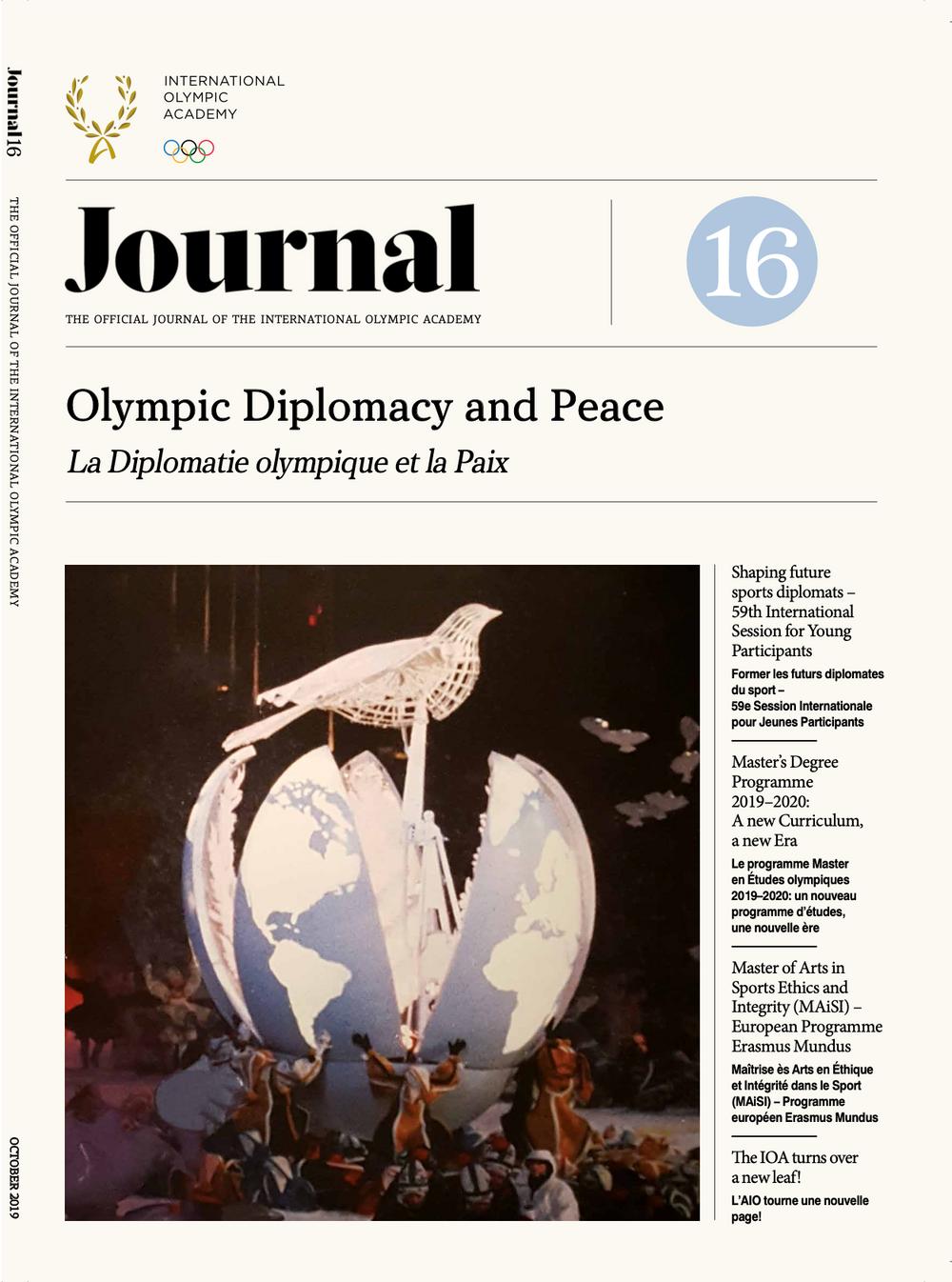
International Olympic Academy
Periodical publication
October 2019
IOA Press Ofce
Dimos Bouloukos
Editing
Roula Vathi
Layout
Eptalofos S.A.
Printing
Eptalofos S.A.
The cover photo is from the Opening Ceremony of the Lillehammer Winter Olympic Games in 1994 and it has been kindly ofered by Sebastian Kühn and the Norwegian Olympic Museum in Lillehammer.
No article of this edition may be reproduced without prior permission of the IOA Press Ofce (tel. +30.210.6878809-12, fax +30.210.6878840, e-mail: ioa@ioa.org.gr).
Académie Internationale Olympique
Publication périodique
Οctobre 2019
Bureau de presse de l’AIO
Dimos Bouloukos
Editing
Roula Vathi
Conception graphique
Eptalofos S.A.
Impression
Eptalofos S.A.
La photo de la couverture est de la cérémonie d’ouverture des Jeux Olympiques d’hiver de Lillehammer en 1994 et elle a été aimablement oferte par Sebastian Kühn et le Musée olympique norvégien à Lillehammer.
Aucune partie des articles publiés ne peut être reproduite sans l’accord préalable du Bureau de presse de l’AIO (tél. +30.210.6878809-12, fax +30.210.6878840, e-mail: ioa@ioa.org.gr).
Olympic Diplomacy and Peace
La Diplomatie olympique et la Paix
ISSN: 2241-3626
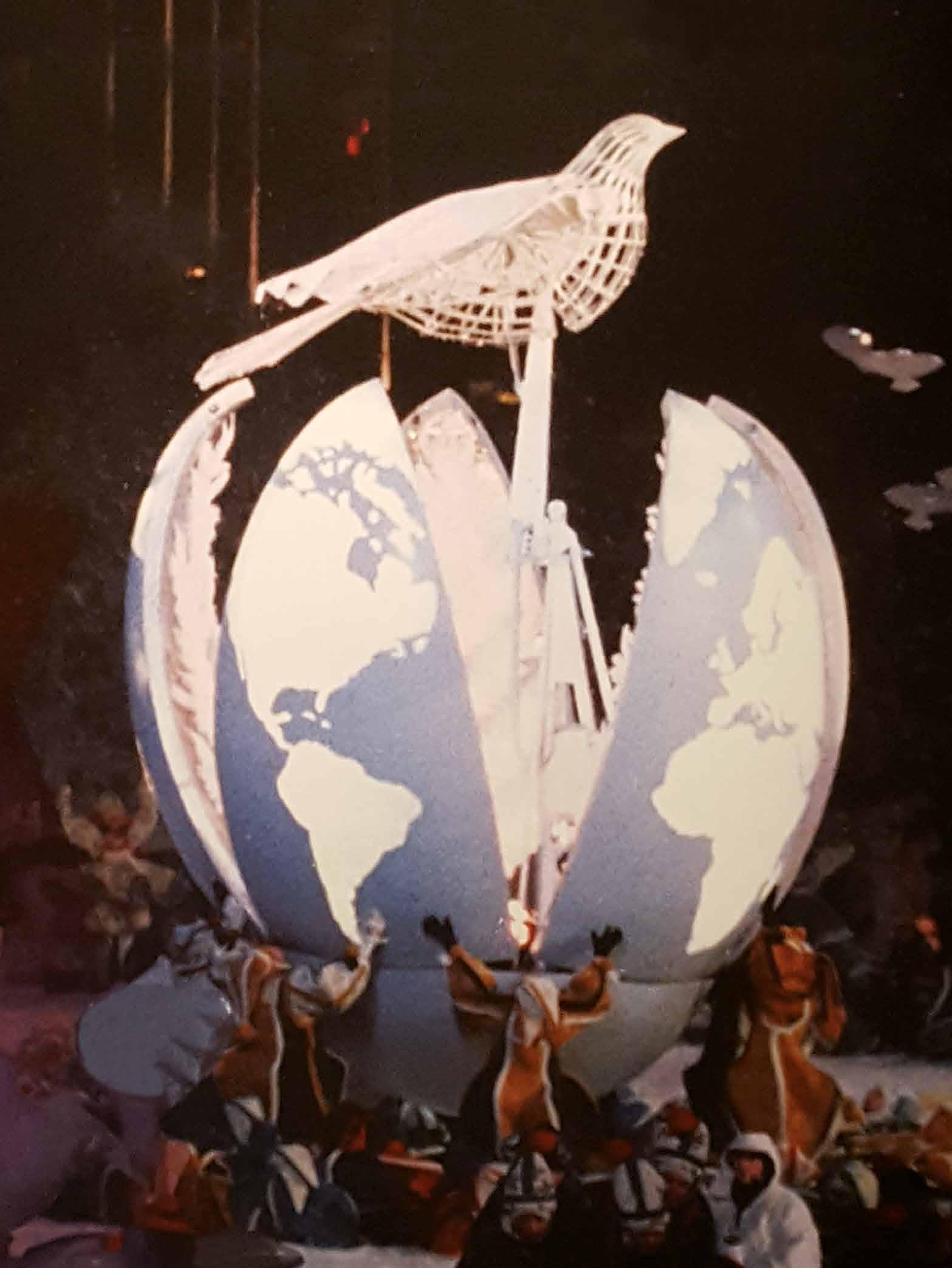
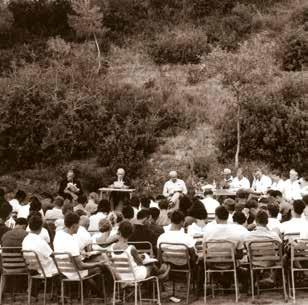

Table des matières
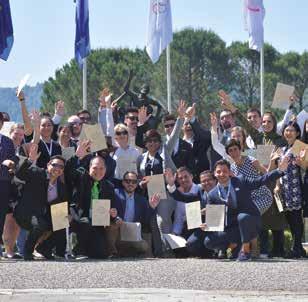

IOA Journal 16 – 3 04 — Address by the IOA President, Isidoros Kouvelos 06 — The International Olympic Academy turns over a new leaf! 12 — The IOC President at the Opening Ceremony of the 59th International Session for Young Participants 17 — Shaping future sports diplomats – 59th International Session for Young Participants 22 — Master’s Degree Programme 2019–2020: A new Curriculum, a new Era 26 — 15th International Session for Directors of NOAs – Global Peace Forum 32 — Post-graduate students meeting in Olympia for a 3-week international Seminar 36 — Olympia welcomes once more eminent PE Professors 41 — “Olympic Diplomacy and Peace” according to the Lecturers of the IOA Sessions – Extracts 46 — The CHS of Harvard University at the IOA – 8th International Scholars’ Symposium “Sports, Society, & Culture” 50 — NOC Culture and Education Champions’ Network 52 — Master of Arts in Sports Ethics and Integrity (MAiSI) – European Programme Erasmus Mundus 56 — Scientifc network between the IOA and Higher Education Institutes of Greece 60 — The IOA at the EU Sport Forum in Bucharest 64 — Stoiximan: Sport and communication above and beyond marketing 67 — IOAPA brings Olympism to the world: Activities’ report for 2019 70 — The NOAs around the world 94 — IOA News Contents 50 06 12 32
05 — Salutation du président de l’AIO, Isidoros Kouvelos 06 — L’Académie Internationale Olympique tourne une nouvelle page! 12 — Le Président du CIO à la Cérémonie d’Ouverture de la 59e Session Internationale pour Jeunes Participants 17 — Former les futurs diplomates du sport – 59e Session Internationale pour Jeunes Participants 22 — Le programme Master en Études olympiques 2019–2020: un nouveau programme d’études, une nouvelle ère 26 — 15e Session Internationale pour Directeurs des ANO – Forum Mondial sur la Paix 32 — Des étudiants post-gradués se réunissent à Olympie pour un séminaire international de 3 semaines 36 — Olympie accueille à nouveau d’éminents professeurs d’éducation physique 41 — «La diplomatie olympique et la paix» selon les conférenciers/ères des Sessions de l’AIO –Extraits 46 — Le Centre d’Études Helléniques de l’université Harvard à l’AIO – 8e Symposium Scientifque International «Sport, Société & Culture» 50 — Réseau des Champions de la Culture et de l'Éducation des CNO 52 — Maîtrise ès Arts en Éthique et Intégrité dans le Sport (MAiSI) – Programme européen Erasmus Mundus 56 — Réseau scientifque entre l’AIO et les établissements d’enseignement supérieur de Grèce 60 — L’AIO au Forum européen du sport à Bucarest 64 — Stoiximan: Sport et communication au-delà du marketing 67 — L’IOAPA apporte l’Olympisme au monde: Rapport d’activités 2019 70 — Le tour du monde avec les ANO 94 — Les nouvelles de l’AIO
Address by the President of the International Olympic Academy, Isidoros Kouvelos
“Τhe Ephoria of the IOA chose the contribution of the Olympic Movement to World Peace as its main theme.”
Dear friends, The International Olympic Academy is turning over a new leaf!
As 2019 draws to a close, another activity-filled year comes to an end, throughout which the IOA carried out many educational events and seminars, the most important of which are outlined in the following pages.
This year, the Ephoria of the IOA chose the contribution of the Olympic Movement to World Peace as its main theme. IOC President, Dr Thomas Bach, in his inspired speech at Pnyx, during the opening ceremony of the 59th International Session for Young Participants, highlighted the role that the Movement is called upon to play in a new era: “In a world drifting apart, the Olympic Games stand out as the only event that brings the whole world together in peaceful competition... From the beginning, the Olympic Games were always more than simply a sporting event. When Coubertin revived the Olympic Games, he saw them as a way to promote peace among nations and all people in the world. Always the visionary, he said: ‘Should the institution of the Olympic Games prosper, it can become a potent factor in securing universal peace’.”
These words, spoken at the historic Hill of Democracy, shall remain engraved in our memory, because they remind us of the real purpose of the Movement – and of all those who serve it – each from their own different starting point. Indeed, Pierre de Coubertin, who revived the Games, believed that Olympic Education is instrumental in supporting such a pursuit.
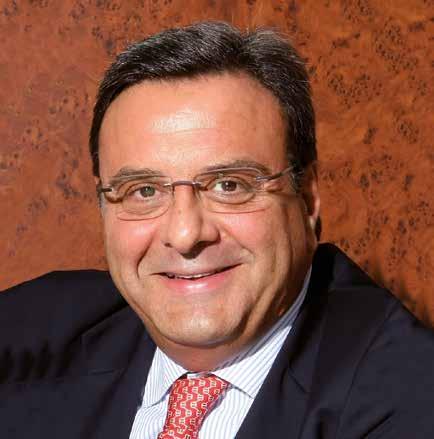
The role of the IOA in developing and promoting Olympic Values had been acclaimed internationally, from its establishment to the present day. In recent years, we have strived to develop and extend our activities, so as to better respond to our role within the Olympic Movement, a fact that was recognised in a tangible manner by the IOC, which interceded dynamically in order to improve the IOA’s infrastructures and educational programme.
President Bach and the Executive Board of the IOC, in a historic meeting concerning the future of the IOA on October 3rd, decided: a) to invest a large monetary amount to completely overhaul the premises that host the Academy events and b) to prepare a new broader educational programme, which, as of 2022, will make the IOA into the main Institution supporting Olympic Education, under the aegis of the IOC.
Yes – the International Olympic Academy is turning over a new leaf!
In this edition of the IOA’s official Journal, I would like to limit my message to warmly thanking President T. Bach and the members of the Executive Board of the IOC, who through this decision about the future of the Institution placed their trust in us. I would also like to thank all the IOA staff, who worked systematically over recent years, in order to lay the ground work for such improvements. And, finally, further thanks to IOC executives, who so diligently prepared the plan for the future of the Academy.
This is only the beginning… The best is yet to come... – J
4 – IOA Journal 16
Salutation du président de l’Académie Internationale Olympique, Isidoros Kouvelos
«L’Éphorie de l’AIO a choisi comme sujet principal la contribution du Mouvement olympique à la paix mondiale.»
Chers amis, L’Académie Internationale Olympique tourne une nouvelle page!
Alors que 2019 touche à sa fin, une autre année pleine d’activités s’achève, au cours de laquelle l’AIO a organisé de nombreux événements et séminaires éducatifs, dont les plus importants sont décrits dans les pages qui suivent.
Cette année, l’Éphorie de l’AIO a choisi comme sujet principal la contribution du Mouvement olympique à la paix mondiale. Le président du CIO, le Dr Thomas Bach, dans son discours inspiré à la Pnyx, lors de la cérémonie d’ouverture de la 59e Session Internationale pour Jeunes Participants, a souligné le rôle que le Mouvement est appelé à jouer dans une nouvelle ère: «Dans un monde qui se divise, les Jeux Olympiques se distinguent comme le seul événement qui rassemble le monde entier dans une compétition pacifique… Dès le début, les Jeux Olympiques ont toujours été plus qu’un simple événement sportif. Lorsque Coubertin a fait revivre les Jeux Olympiques, il a vu en eux un moyen de promouvoir la paix entre les nations et entre tous les peuples du monde. Toujours visionnaire, il disait: ‘Si l’institution des Jeux Olympiques prospère, elle peut devenir un puissant facteur de paix universelle’.»
Ces paroles, prononcées sur la Colline historique de la Démocratie, resteront gravées dans notre mémoire, car elles nous rappellent le but réel du Mouvement – et de tous ceux qui le servent – chacun à partir de son point de départ différent. En effet, Pierre de Coubertin, le rénovateur des Jeux, était convaincu que l’éducation olympique est essentielle pour soutenir un tel projet.
Le rôle de l’AIO dans le développement et la promotion des valeurs olympiques a été reconnu à l’échelle internationale, depuis sa création jusqu’à nos jours. Ces dernières années, nous nous sommes efforcés de développer et d’étendre nos activités afin de mieux répondre à notre rôle au sein du Mouvement olympique, ce qui a été reconnu de manière tangible par le CIO, qui est intervenu de manière dynamique pour améliorer les infrastructures et le programme éducatif de l’AIO.
Le président Bach et la Commission exécutive du CIO, lors d’une réunion historique sur l’avenir de l’AIO le 3 octobre dernier, ont décidé: a) d’investir une importante somme d’argent pour rénover complètement les locaux qui accueillent les manifestations de l’Académie et b) de préparer un nouveau programme éducatif plus vaste qui, à partir de 2022, fera de l’AIO la principale institution d’éducation olympique, sous l’égide du CIO.
Oui, l’Académie Internationale Olympique est en train de tourner une nouvelle page!
Dans ce numéro du Journal officiel de l’AIO, je voudrais limiter mon message à remercier chaleureusement le président T. Bach et les membres de la Commission exécutive du CIO qui, par cette décision sur l’avenir de l’Institution, nous ont accordé leur confiance. Je voudrais également remercier tout le personnel de l’AIO, qui a travaillé systématiquement au cours des dernières années, afin de jeter les bases de ces améliorations. Enfin, nous remercions également les dirigeants du CIO, qui ont préparé avec tant de diligence le plan pour l’avenir de l’Académie.
Ce n’est que le début... Le meilleur est encore à venir... – J
IOA Journal 16 – 5
The International Olympic Academy turns over a new leaf!
L’Académie Internationale Olympique tourne une nouvelle page!
by Dr Dionyssis Gangas Advisor to the IOA President IOA’s Development Projects Consultant Member of the IOC Culture and Olympic Heritage Commission
par le
Dr Dionyssis Gangas
Conseiller auprès du président de l’AIO Consultant en projets de développement de l’AIO Membre de la Commission de la Culture et du Patrimoine Olympique du CIO
Research historians disagree as to who the visionary, who thought of creating the International Olympic Academy in Ancient Olympia was. However they do not disagree that 40 years after the revival of the Olympic Games, their visionary founder Baron Pierre de Coubertin was very concerned about the attempt to distort the meaning of the Olympics, in the 1936 Berlin Games, even though he did not actually attend those Games, and he expressed his concern about the future of the Institution by noting: “…unfortunately, I was not able to complete what I wanted to do. I believe that the creation of a Centre for Olympic Studies would contribute more than anything else in preserving and continuing my work and would protect it from deviations, which I am afraid will occur in the future”.
Already however, the initial idea to create an Olympic Studies Centre in the form of an ancient “gymnasium” had been expressed a lot earlier, by Ioannis Chrysafis, a professor at the University of
Les avis des historiens diffèrent sur la question de savoir qui fut réellement l’inspirateur de l’idée de fonder l’Académie Internationale Olympique à Ancienne Olympie. Mais ils s’accordent sur le fait que c’est le baron Pierre de Coubertin qui fut le rénovateur des Jeux Olympiques et qui, quarante ans plus tard, empli d’amertume face à la tentative de distorsion de l’idée olympique lors de l’organisation des Jeux de Berlin, auxquels il n’assista pas, exprima sa préoccupation quant à l’avenir de l’institution: «… malheureusement, je n’ai pas pu terminer ce que je devais accomplir. Je pense qu’un centre d’études olympiques aiderait plus que n’importe quoi au maintien et au progrès de mon œuvre et la préserverait des déviations que je redoute».
Cependant, l’idée initiale de créer un Centre d’Études Olympiques inspiré du «gymnase» antique avait déjà été exprimée beaucoup plus tôt par Ioannis Chrysafis, professeur à l’université d’Athènes, qui, en 1927, avait rencontré Coubertin, son ami proche, lors
6 – IOA Journal 16
Les conférences en plein air à l’AIO (1964).

Athens, who, in 1927, met his close friend Coubertin, when he visited Ancient Olympia and possibly discussed this idea with him.
When in 1938, Carl Diem, an important German stakeholder in sports and great philhellene visited Ancient Olympia on the occasion of the ceremony for placing the heart of the late Pierre de Coubertin in the well-known commemorative stele, which now dominates the area of the Academy according to the wishes of this great man, it appears that he conceived the idea of carrying out Coubertin’s vision to create this Centre for Studies, in the sacred space that was so beloved by the founder of the Olympic Games.
The following year during the 39th IOC Session in London, the IOC member for Greece, Angelos Volanakis, informed its General Assembly that Greece (i.e. the Hellenic Olympic Committee) had created a Sports Academy in Ancient Olympia and that the IOC had decided to place it under its aegis.
The plan for a comprehensive Olympic Studies Centre was presented by John Ketseas, President of the Hellenic Olympic Committee and second member of the IOC for Greece, during the 44th IOC Session in 1949, who in collaboration with Carl Diem lay the groundwork to create the IOA in Ancient Olympia. Ketseas and Diem envisaged an Olympic Academy placed under the protection of the IOC and which would operate with the financial support of the Hellenic Olympic Committee, whose aim would be “… to spread the Olympic idea and ideals and to help in the education and training of young men to become worthy heralds of the Olympic ideals”.
de sa visite à Ancienne Olympie et aurait discuté de cette idée avec lui.
C’est en 1938, quand il se rend à Ancienne Olympie pour la déposition du cœur de Pierre de Coubertin dans la célèbre stèle commémorative qui domine désormais l’enceinte de l’Académie, selon le désir qu’avait exprimé le grand homme, que Carl Diem, personnalité allemande importante dans le monde du sport et grand philhellène, semble avoir conçu l’idée de réaliser la vision de Coubertin de créer ce Centre d’Études dans le lieu sacré tant aimé par le rénovateur des Jeux Olympiques.
L’année suivante, lors de la 39e Session du CIO à Londres, le membre grec du CIO, Angelos Volanakis, informait l’Assemblée Générale que la Grèce (c’est-àdire le Comité Olympique Hellénique) avait créé une Académie sportive à Ancienne Olympie et que le CIO avait décidé de la placer sous son égide.
Le projet d’un Centre d’Études Olympiques complet fut présenté par Jean Ketseas, président du Comité Olympique Hellénique et deuxième membre du CIO pour la Grèce, lors de la 44e Session du CIO en 1949; en collaboration avec Carl Diem, il posa les bases de la création de l’AIO à Ancienne Olympie. Ketseas et Diem envisageaient une Académie Olympique placée sous la protection du CIO, qui fonctionnerait avec le soutien financier du Comité Olympique Hellénique et dont le but serait «... de diffuser l’idée et les idéaux olympiques et d’aider à l’éducation et à la formation de jeunes hommes pour en faire des hérauts dignes des idéaux olympiques».
L’AIO ouvrit ses portes en 1961, et un an plus
IOA Journal 16 – 7 01
01 Outdoor lectures at the IOA (1964).
“The educational activities were multiplied and now are offered to more than 1,200 young women and men each year.”
tard, à l’occasion de sa 2e Session internationale, Avery Brundage, alors président du CIO, soulignait: «Nous avons beaucoup de problèmes à cause de la croissance étonnamment rapide des Jeux, car nous n’avons pas eu le temps, avec notre organisation de volontaires, d’éduquer tout le monde aux principes olympiques. Le Comité International Olympique a été désigné responsable du Mouvement olympique, avec le devoir de préserver ses idéaux et de défendre ses principes. Nous devons réaffirmer et définir clairement nos objectifs et rédiger nos règles en conséquence, et il n’y a pas de meilleur endroit pour y parvenir qu’en Grèce, un pays véritablement olympique ...»
In 1961, the IOA opened its gates and a year later and on the occasion of the 2nd International Session, Avery Brundage, then President of the IOC, characteristically stated: “We have many problems due to the astonishingly rapid growth of the Games, since there has not been time with our organization of volunteers to educate everyone in Olympic principles. The International Olympic Committee was placed in charge of the Olympic Movement, with the duty to maintain its ideals and defend its principles. We must restate and clearly define our objectives and draft our rules accordingly, and there is no better place to accomplish this than in Greece, a truly Olympic country…”.
Cinquante-sept ans se sont écoulés depuis cette déclaration et de nombreuses étapes ont été franchies jusqu’à la pleine reconnaissance du travail accompli en ce lieu historique de l’Olympisme, à l’ombre du mont Cronion. Les structures d’hébergement se sont progressivement améliorées. Les premières tentes qui accueillaient les participants ont été remplacées à la fin des années soixante par des chambres et des dortoirs, et au cours de la même période, les conférences ont cessé d’être données en plein air et ont été présentées dans la première salle de conférence, puis, en 1994, dans le nouveau et impressionnant Centre de Conférences. Les activités éducatives se sont multipliées et désormais plus de 1200 jeunes gens en profitent chaque année. La forme juridique de l’AIO a changé. En 2001, elle a été constituée en personne morale de droit privé et, après 2009, le COH a concédé l’utilisation exclusive de ses installations à l’AIO, qui a assumé le coût financier total de son
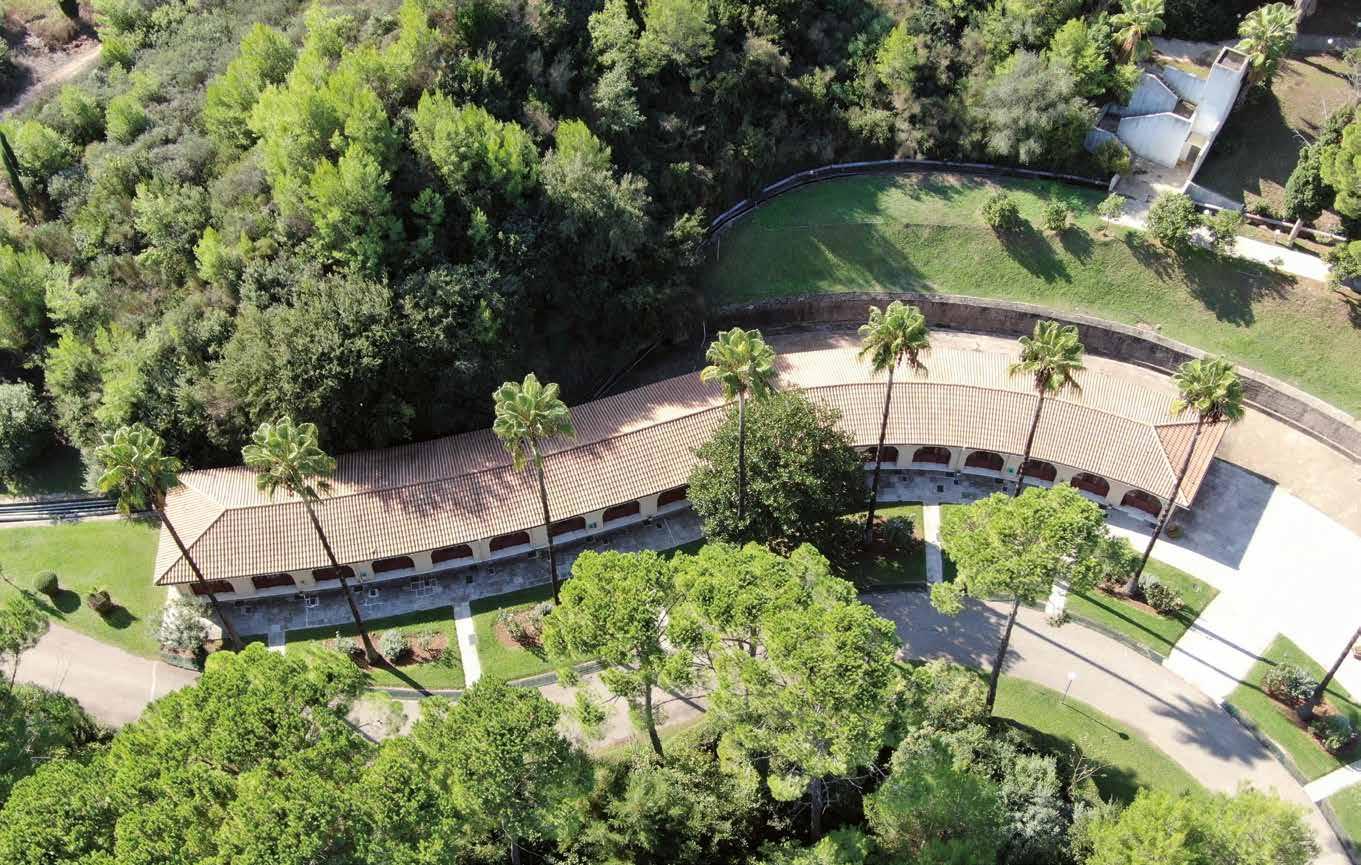
8 – IOA Journal 16
Le nouveau Centre de Conférences de l’AIO inauguré en 1994.
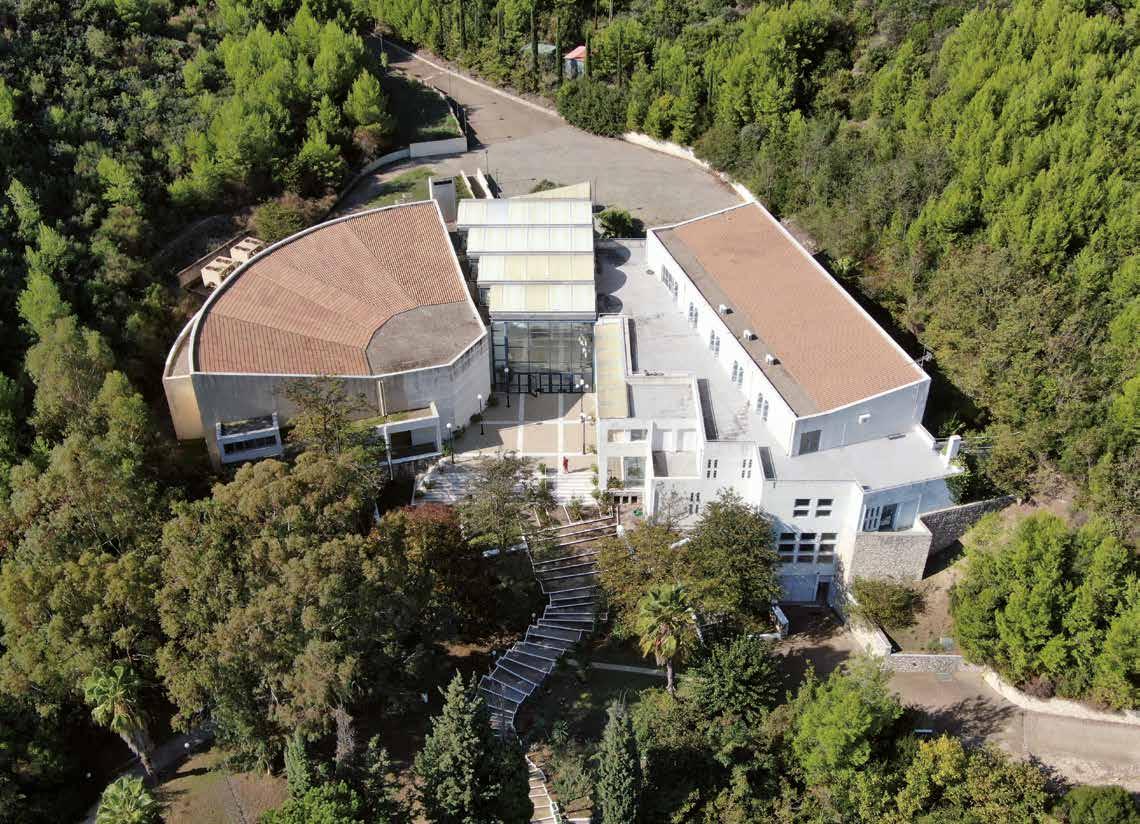
Fifty-seven years have gone by since this statement and there have been many phases up to the full recognition of the work carried out in this historic corner of Olympism, in the shadow of the Cronion hill. The building facilities have gradually improved. The initial tents that accommodated the event participants were replaced by the end of the sixties with rooms and dormitories, and during the same period lectures stopped being delivered outdoors and were moved to the first lecture hall and then, in 1994, to the new impressive Conference Centre. The educational activities were multiplied and now are offered to more than 1,200 young women and men each year. The legal structure of the IOA was changed into an independent Legal Entity Governed by Private Law in 2001 and, after 2009, the HOC conceded the exclusive use of the facilities to the IOA, which took on the total financial cost of its operations for the educational purposes set forth in its Statutes.
In 2007 the trees within the IOA premises were burnt in destructive fires, leaving the landscape bare and a large part of the structural materials supporting the facilities were destroyed and could not be restored because of the scarce economic means of the Academy.
Despite these difficult operating conditions, against such a backdrop the IOA managed to increase its educational events and to cooperate with reputable Universities in Greece and abroad, mainly supported by the IOC and some major donors, without managing, despite the hard work of its staff, to become self-sustainable with a strong financial independence.
«Les activités éducatives se sont multipliées et désormais plus de 1200 jeunes gens en profitent chaque année.»
fonctionnement aux fins éducatives énoncées dans ses statuts.
Le grand incendie de 2007 dans la région d’Olympie, après avoir réduit en cendres les arbres autour de l’enceinte de l’AIO, a également brûlé une grande partie des infrastructures de l’AIO, qui n’ont pu être restaurées en raison des moyens financiers limités de l’Académie.
Malgré ces conditions de fonctionnement difficiles, l’AIO a réussi à multiplier ses activités éducatives et à coopérer avec des universités réputées en Grèce et à l’étranger, principalement grâce au soutien du CIO et de certains donateurs importants, sans parvenir, malgré le travail acharné de son personnel, à devenir autosuffisante et à acquérir une forte indépendance financière.
IOA Journal 16 – 9
02
02
The new Conference Centre of the IOA was inaugurated in 1994.
From the first months that Isidoros Kouvelos became President of the IOA, he attempted and contrived to gather the necessary grants, so as to replace the state subsidy, which to that point had covered 60% of the total operating expense of the IOA and, due to the economic crisis had been dramatically reduced to 7–8%. The proposal put forth by President Isidoros Kouvelos to the HOC Plenary that full use of the facilities be ceded to the IOA, proved a great success, as the Academy – being a Legal Entity Governed by Private Law – showed itself able to handle many matters related to facilities operation with greater flexibility. At that point, the IOC decided to provide greater financial support to the IOA, in essence covering any deficit at the end of each year.
In October 2016, during a work meeting with a high-level IOC team, the IOA President underscored the need for the accommodation and sports facilities in Ancient Olympia to be renovated, in order to become more attractive for holding high calibre Conferences and events. Isidoros Kouvelos repeated this
Isidoros Kouvelos, dès les premiers mois de sa présidence à l’AIO, a mis tous ses efforts à obtenir les subventions nécessaires afin de remplacer la subvention de l’État qui, jusque-là, avait couvert 60% des dépenses totales de fonctionnement de l’AIO et qui, en raison de la crise économique, avait été considérablement réduite, à 7 ou 8 %. La proposition du président Isidoros Kouvelos à la plénière du COH, suggérant de céder le plein usage des installations à l’AIO, a été un grand succès, car l’Académie, en tant que personne juridique de droit privé, s’est avérée capable de traiter avec plus de flexibilité de nombreuses questions liées au fonctionnement des installations. C’est à ce moment que le CIO a décidé d’apporter un soutien financier accru à l’AIO, en couvrant le déficit éventuel à la fin de chaque année.
En octobre 2016, lors d’une réunion de travail avec une équipe de cadres du CIO, le président de l’AIO a souligné la nécessité de rénover les installations d’hébergement et de sport d’Ancienne Olympie afin de les rendre plus attractives pour l’accueil de conférences et événements de très haut niveau. Isidoros Kouvelos l’a également répété au président Bach, deux mois plus tard, lors d’une rencontre. Le président du CIO et ses plus proches collaborateurs, Christophe De Kepper et Pere Miró, ont immédiatement convenu que l’AIO devait procéder à un sérieux «lifting» et se moderniser pour pouvoir répondre aux exigences de notre époque, attirer davantage d’événements et couvrir une grande partie de ses besoins opérationnels.
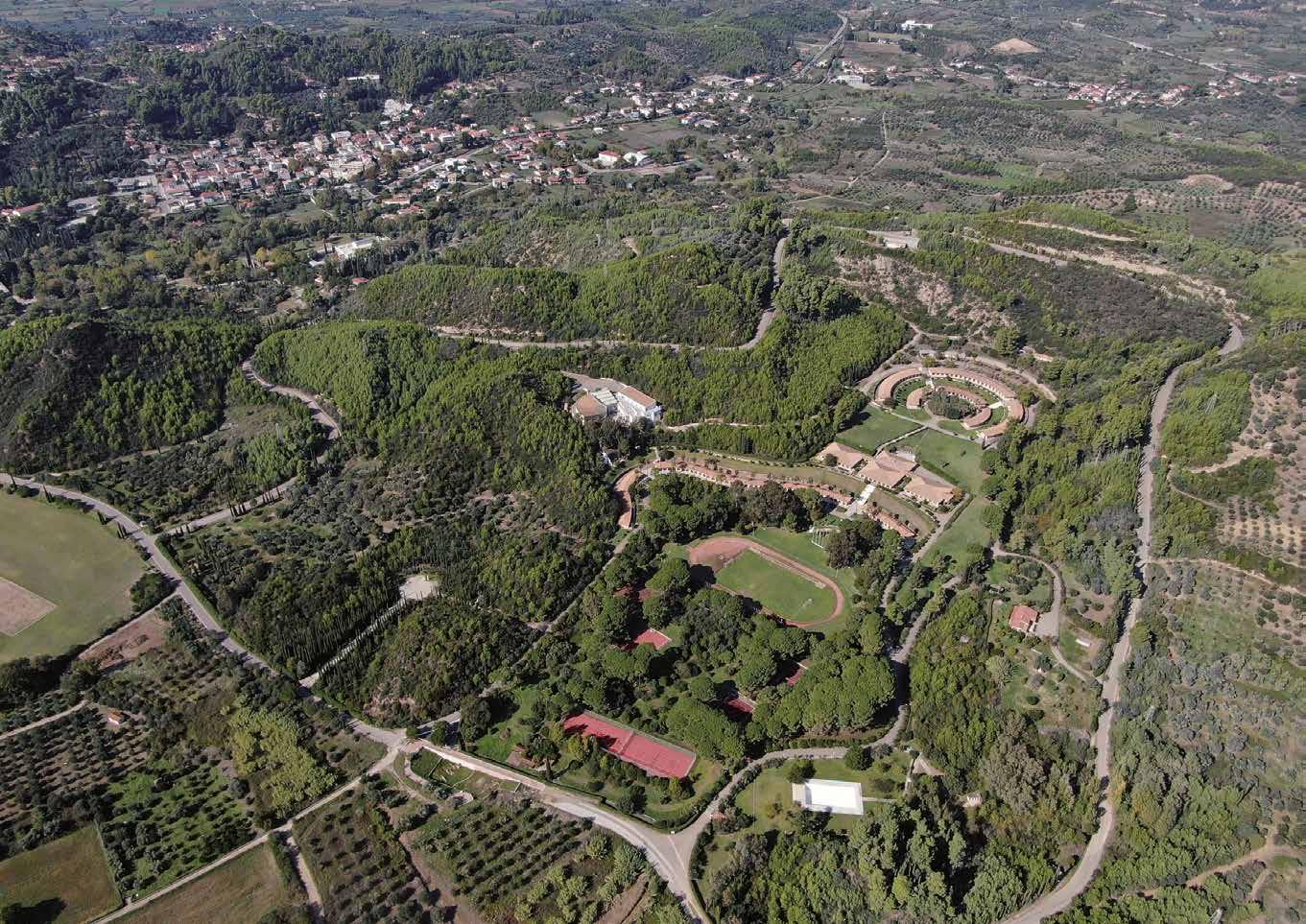
10 – IOA Journal 16
also to President Bach, two months later at a meeting between the two. Both the IOC President and his immediate associates, Christophe De Kepper and Pere Miró, immediately agreed that the IOA had to undergo a serious face lift and modernise itself, so that it could address changing demands, attracting more events and covering its operational needs to a great extent.
Immediately after the re-election of I. Kouvelos at the presidency of the IOA, the IOC took up the matter again, appointing Francis Gabet in charge of the working group, then IOC Director of the Olympic Foundation for Culture and Heritage, with the intention that the renovation requirements for the facilities be recorded swiftly. Initially, the IOA President and associates had limited themselves to proposing a bare minimum of renovations to the accommodation and sports facilities. However, after a subsequent meeting of Presidents Kouvelos and Bach, the latter gave instructions: a) to take complete stock of the facilities’ needs, so that the entire space could be fully renovated; and b) to design the IOA educational programme on a new and more comprehensive basis, so that it corresponds to the role assigned to it historically by the Olympic Movement: i.e. preserving and developing Olympic Education.
This was the reasoning behind the visit by Francis Gabet and Panos Tzivanidis, Director of the IOC Corporate Events and Services, and it was with these instructions that they visited the premises and took detailed stock of the needs for an overhaul of the facilities, so that they can be ready for June 2021. Indeed, the latter put the relevant project to the IOC Executive Board on 3 October 2019 and it was unanimously accepted.
The decision of the IOC’s Executive Board opens a new chapter in the history of the International Olympic Academy. The renovation cost shall amount to approximately 12.5 million euros, in conjunction with the more comprehensive new educational programme of the IOA, which is being prepared in collaboration with the IOC Olympic Studies Centre, it will certainly give great impetus to the Academy’s activities, but will also be a significant boost to tourism for the entire area of Ancient Olympia from 2021 onwards.
Thanks to the persistence of IOA President, Isidoros Kouvelos and the President Bach’s love of the Academy and his faith in the role it plays within the Olympic Movement, as well as the recognition of its successful course by all IOC members, in 2021, exactly sixty years after embarking on this timeless course, another inauguration of the facilities will take place and a new era for the IOA will be ushered in, under the continuous aegis and protection of the IOC. – J
Tout de suite après la réélection de I. Kouvelos à la présidence de l’AIO, le CIO a repris le flambeau en nommant comme chef du groupe de travail Francis Gabet, alors directeur de la Fondation olympique pour la culture et le patrimoine du CIO, afin que l’inventaire des besoins de rénovation soit dressé le plus vite possible. Au départ, le président de l’AIO et ses associés s’étaient limités à proposer un strict minimum de rénovations aux installations d’hébergement et de sport. Cependant, après une réunion ultérieure des présidents Kouvelos et Bach, ce dernier a donné le mandat suivant: a) faire une inventaire complet des besoins des installations, afin que l’ensemble de l’espace puisse être entièrement rénové; b) concevoir le programme éducatif de l’AIO sur une base nouvelle et plus détaillée, afin que l’AIO corresponde plus efficacement au rôle que le Mouvement olympique lui a historiquement confié, à savoir préserver et développer l’Éducation olympique.
C’est dans cet esprit que Francis Gabet et Panos Tzivanidis, directeur du département des événements et services institutionnels du CIO, se sont rendus sur les lieux et ont dressé un inventaire détaillé des besoins en matière de rénovation des installations, afin qu’elles soient prêtes pour juin 2021. Le 3 octobre 2019, P. Tzivanidis a soumis le projet en question à la Commission exécutive du CIO, qui l’a approuvé à l’unanimité.
La décision de la Commission exécutive du CIO ouvre un nouveau chapitre dans l’histoire de l’Académie Internationale Olympique. Le coût de la rénovation s’élèvera à environ 12,5 millions d’euros, en conjonction avec le nouveau programme éducatif plus complet de l’AIO qui est en cours de préparation en collaboration avec le Centre d’Études Olympiques du CIO; cela donnera certainement un grand élan aux activités de l’Académie et apportera aussi une impulsion significative au tourisme dans toute la région d’Ancienne Olympie dès 2021.
Grâce à la persévérance du président de l’AIO, Isidoros Kouvelos, à l’attachement du président Bach envers l’Académie et à sa foi dans le rôle de l’AIO au sein du Mouvement olympique, grâce aussi à la reconnaissance de son parcours réussi par tous les membres du CIO, en 2021, soixante ans exactement après le début de ce parcours intemporel, les nouvelles installations de l’AIO seront inaugurées ainsi qu’une ère nouvelle pour l’Académie, sous l’égide et la protection permanentes du CIO. – J
IOA Journal 16 – 11
The IOC President at the Opening Ceremony of the 59th International Session for Young Participants
Le Président
du
CIO à la Cérémonie d’Ouverture de la 59e Session
Internationale pour Jeunes Participants
by Dimos Bouloukos
par Dimos Bouloukos
On the Pnyx, in the presence of the President of the International Olympic Committee Mr Thomas Bach, the President of the Hellenic Republic, Mr Prokopios Pavlopoulos, opened the works of the 59th International Session for Young Participants held in Ancient Olympia.
The Ceremony was attended, among others, by the former Prime Minister and Vice-Chairperson of the International Olympic Truce Foundation, Mr George Papandreou, the Ambassador of the USA to Greece, Mr Geoffrey Pyatt, the President and the General Secretary of the Hellenic Olympic Committee, Messrs. Spyros Capralos and Manolis Kolympadis, the IOC Honorary Member in Greece, Lambis Nikolaou, the General Secretary of the International Committee of Mediterranean Games, Mr Iakovos Philippoussis, and the Member of the IOA Ephoria, Mr Gordon Tang.
The President of the IOA, Isidoros Kouvelos, welcomed the young men and women from all over the world, stressing inter alia: “The International Olympic Academy has been entrusted with the dissemina-
Le président de la République hellénique, M. Prokopios Pavlopoulos a déclaré, sur la colline de la Pnyx, en présence du Président du CIO, M. Thomas Bach, l’ouverture des travaux de la 59e Session Internationale pour Jeunes Participants qui s’est tenue à Ancienne Olympie.
Ont assisté à la cérémonie, entre autres, l’ancien Premier ministre et vice-président de la Fondation Internationale pour la Trêve Olympique, M. George Papandreou, l’ambassadeur des États-Unis en Grèce, M. Geoffrey Pyatt, le président et le secrétaire général du Comité Olympique Hellénique, MM. Spyros Capralos et Manolis Kolympadis, le membre honoraire du CIO en Grèce, Lambis Nikolaou, le secrétaire général du Comité International des Jeux Méditerranéens, M. Iakovos Philippoussis, et le membre de l’Ephorie de l’AIO, M. Gordon Tang.
Le président de l’AIO, Isidoros Kouvelos, a souhaité la bienvenue aux jeunes hommes et femmes du monde entier, en soulignant entre autres: «L’Académie Internationale Olympique a pour mission de
12 – IOA Journal 16
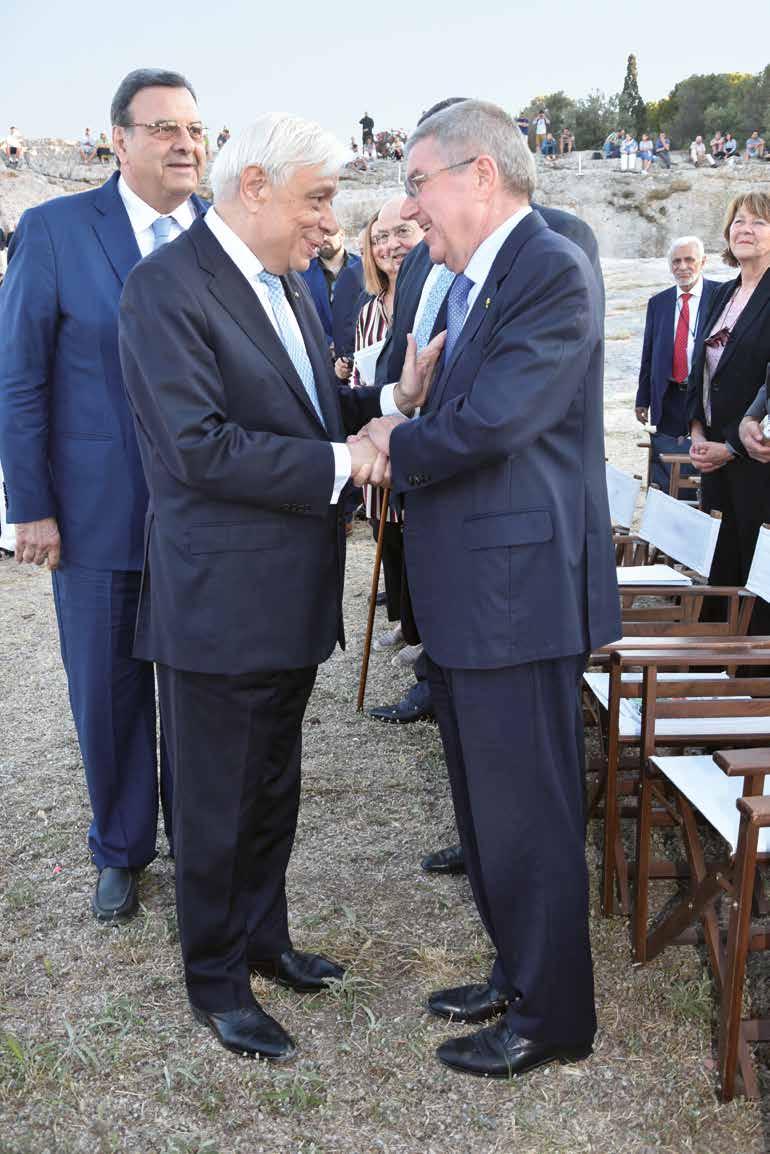
“The President of the IOA, Isidoros Kouvelos, welcomed the young men and women from all over the world.”
«Le président de l’AIO, Isidoros Kouvelos, a souhaité la bienvenue aux jeunes hommes et femmes du monde entier.»
Pavlopoulos and the IOC President, Dr Thomas Bach.
Poignée de main chaleureuse entre le président de la République hellénique, M. Prokopios
Pavlopoulos et le président du CIO, le Dr Thomas Bach.
tion of Olympic Values, which it has been carrying out successfully for almost sixty years, developing Olympic Education with all appropriate educational means, at all levels of the Olympic family members.
Times have changed and the motto Citius – Altius – Fortius, which the reviver of the Olympic Games promoted in order to put across the importance of physical exercise in particular at the beginning of the
diffuser les valeurs olympiques, et elle le fait avec succès depuis presque soixante ans, en développant l’éducation olympique par tous les moyens pédagogiques pertinents, à tous les niveaux des membres de la Famille olympique.
Les temps ont changé, et la devise Citius, Altius, Fortius, que le rénovateur des Jeux Olympiques avait adoptée au début du siècle précédent afin de donner un sens à l’exercice physique, principalement, semble désormais dépassée. Peut-être est-il temps de “relire” Coubertin en tenant compte des données actuelles et des nouveaux défis de notre époque.
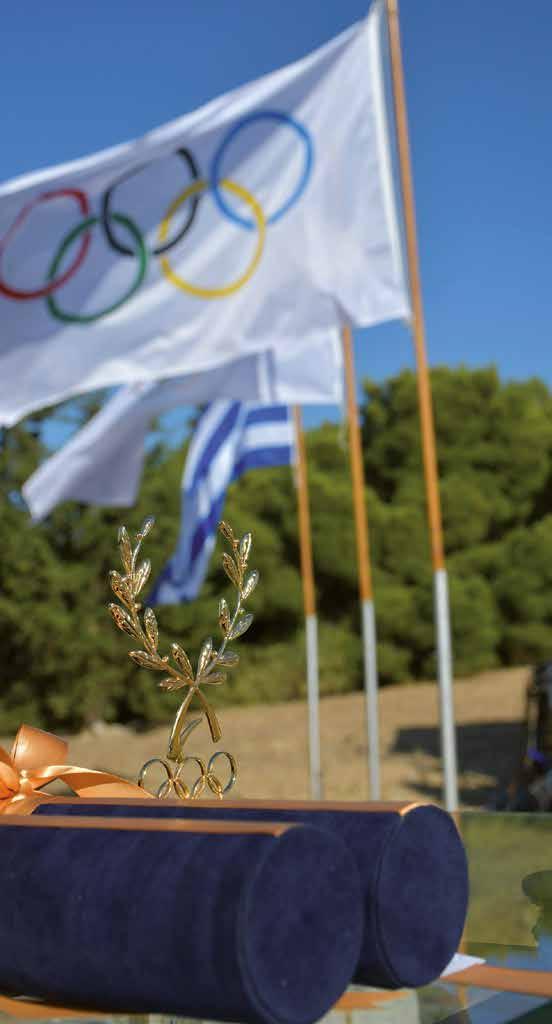
IOA Journal 16 – 13
01
01
Warm handshake between the President of the Hellenic Republic, Mr Prokopios

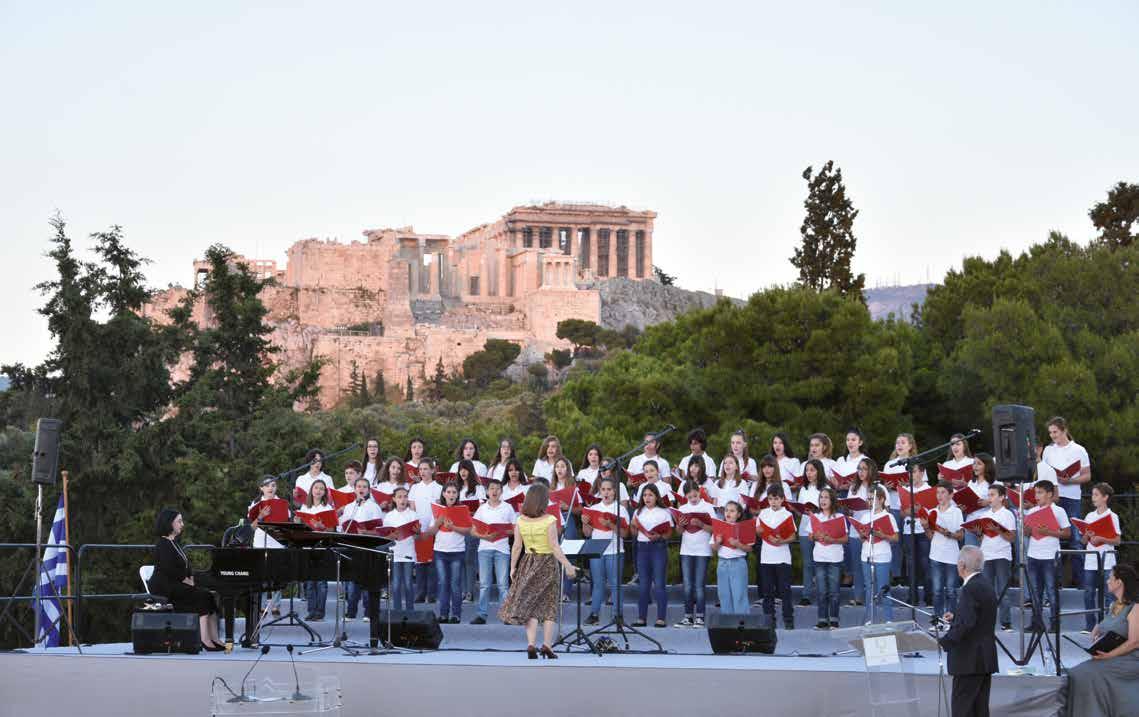
previous century, appears to be something relegated to the past! Perhaps it is time to ‘re-interpret’ Coubertin through the lens of modern developments and the new challenges of our times.
I believe that in the modern, politically fragile world, Olympic education must focus on those chal-
Je suis persuadé que dans la fragilité actuelle de la conjoncture politique mondiale, l’éducation olympique doit se concentrer sur ces défis et insister sur la réponse pratique à leur donner. C’est pourquoi la devise Citius, Altius, Fortius, quand elle s’adresse à l’homme contemporain, devra être complétée et ac-
La Chorale d’enfants de l’Opéra national de Grèce sous la direction de Konstantina
Le président du Comité Olympique Hellénique, Spyros Capralos à la cérémonie de la Pnyx.
Le membre du CIO, Valeriy Borzov reçoit la distinction honorifique de l’AIO «Olympie».
14 – IOA Journal 16 02 02 03 04 05
The Olympic Anthem.
The Children’s Chorus of the Greek National Opera under the direction of Konstantina Pitsiakou.
The President of the Hellenic Olympic Committee, Spyros Capralos at the Pnyx Ceremony.
The IOC Member, Valeriy Borzov was awarded the IOA honorary distinction “Olympia”.
03
L’Hymne olympique.
Pitsiakou.

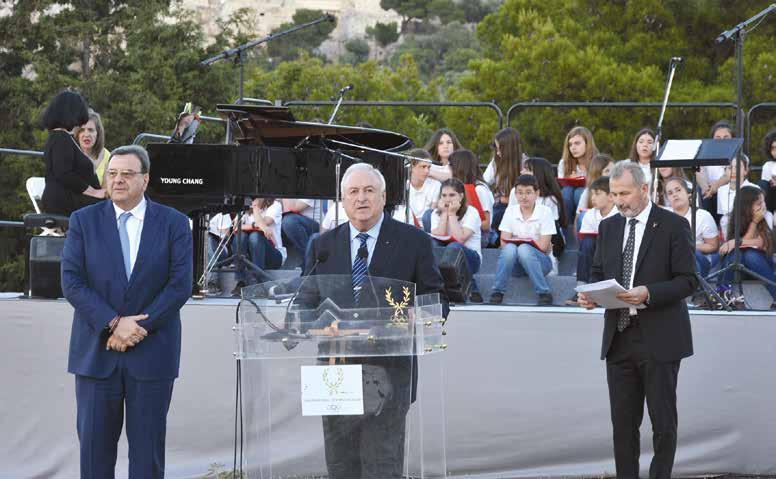

The IOA honorary distinction
“Athena” was awarded to the Chinese Taipei Olympic Academy.
La distinction honorifique de l’AIO «Athéna» attribuée à l’Académie Olympique du Taipei chinois.

Address
Allocution du président de l’AIO, Isidoros Kouvelos.
lenges and attach importance to how to face them from a practical standpoint. That is why, when addressing modern man, we should supplement Citius – Altius – Fortius with the words ‘balanced’, ‘better’, ‘peaceful’ to provide a more modern interpretation of this motto. Because only by achieving all these in07
tualisée par les précisions suivantes: “de manière équilibrée”, “meilleure”, “pacifique”. Car ce n’est qu’en réalisant ces incitations dans leur globalité que l’on peut se rapprocher plus sûrement de la valeur olympique suprême qu’est l’excellence.
C’est dans cette direction, mes chers amis du monde entier, que l’éducation olympique vous emmènera afin de vous faire découvrir la culture olympique!»
Le Président du CIO Thomas Bach a souligné, entre autres: «L’Académie Internationale Olympique a pour objectif de préserver ce précieux patrimoine grec et de promouvoir l’esprit olympique dans le monde d’aujourd’hui. Elle agit à bien des égards comme le pilier académique du Mouvement olympique qui met en œuvre les principes éducatifs et sociaux de l’Olympisme. De cette façon, l’Académie Internationale Olympique soutient le CIO et l’aide à mieux poursuivre sa mission primordiale qui est de mettre le sport au service de l’humanité.
C’est pourquoi je tiens à remercier tous les membres de l’AIO pour leur excellente coopération au fil des ans. Mes remerciements vont en particulier au président de l’Académie Internationale Olym-
IOA Journal 16 – 15
06
07 04 05 06
by the IOA President, Isidoros Kouvelos.
citements can one get safely closer to attaining the supreme Olympic Value of Excellence!
Olympic Education will serve as your guide, dear friends from all over the world, to discover Olympic culture through it!”
The President of the IOC, Thomas Bach stressed that: “The objective of the International Olympic Academy is to preserve this precious Greek heritage and promote the Olympic spirit in our world today. It acts in many ways as the academic pillar of the Olympic Movement, implementing the educational and social principles of Olympism. In this way, the International Olympic Academy helps and supports the IOC to better pursue our overarching mission to put sport at the service of humanity.
This is why I would like to thank everyone at the IOA for their excellent cooperation over the years. In particular, my thanks go to the President of the International Olympic Academy, Isidoros Kouvelos, and the members of the Ephoria. Under their great leadership, the IOA is laying the intellectual foundation for the Olympic spirit to grow strong.
In our fragile world today, we need this Olympic spirit more than ever before. Hardly a day goes by without news of rising nationalism, of mistrust and protectionism. In an age of global crises, we are seeing a worrying trend towards more isolation, more separation and less cooperation. Paradoxically, in our digital age, when there are more opportunities for communication than ever before, there is less dialogue and less engagement with people who hold different views.
In a world drifting apart, the Olympic Games stand out as the only event that brings the whole world together in peaceful competition. As the International Olympic Committee celebrates its 125th anniversary this year, the ideals and values of the Olympic Games, revived by our founder Pierre de Coubertin, are more relevant than ever before.”
During the ceremony on the Pnyx, the IOA “Olympia” prize was awarded to Olympic champion Valeriy Borzov, member of the International Olympic Committee in Ukraine, while the “Athena” prize was awarded to the Olympic Academy of Chinese Taipei.
The musical interludes were interpreted by the Children’s Choir of the Greek National Opera, directed by Konstantina Pitsiakou and accompanied by pianist Maria Neofytidou. – J
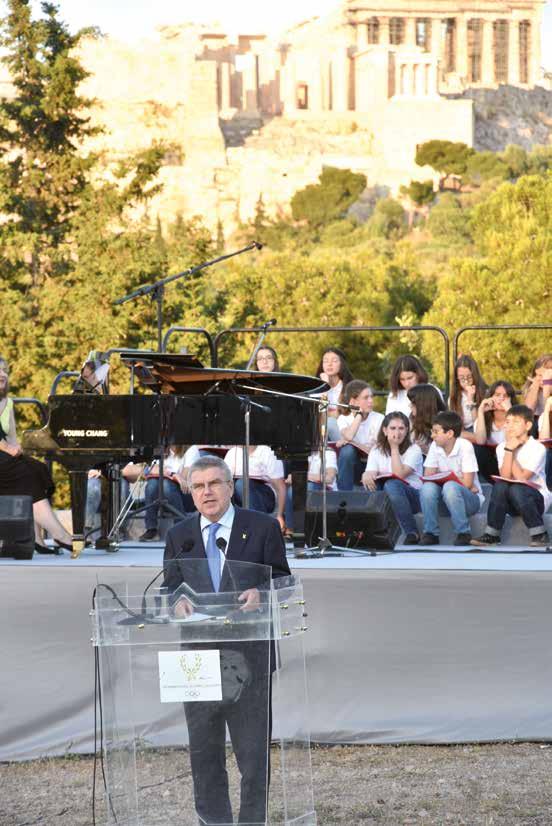
pique, Isidoros Kouvelos, et aux membres de l’Éphorie. Sous leur direction inspirée, l’AIO jette les bases intellectuelles qui permettront à l’esprit olympique de s’épanouir.
Dans notre monde fragile d’aujourd’hui, nous avons plus que jamais besoin de cet esprit olympique.
Il ne se passe pas un jour sans que nous apprenions une montée du nationalisme, de la méfiance et du protectionnisme. À une époque de crises mondiales, nous assistons à une tendance inquiétante vers plus d’isolement, plus de séparation et moins de coopération. Paradoxalement, à notre ère numérique où les possibilités de communiquer sont plus nombreuses que jamais, le dialogue et le contact avec les gens d’opinions différentes sont moindres.»
Lors de la cérémonie sur la colline de la Pnyx, le prix «Olympie» de l’AIO a été décerné au champion olympique Valeriy Borzov, membre du Comité International Olympique en Ukraine, et le prix «Athéna» à l’Académie Olympique du Taipei chinois.
Les interludes musicaux ont été interprétés par le Chœur d’enfants de l’Opéra national grec, dirigé par Konstantina Pitsiakou et accompagné par la pianiste Maria Neofytidou. – J
Le président du CIO s’adresse aux jeunes participants.
16 – IOA Journal 16
07
07
The IOC President addressed the Young Participants.
Shaping future sports diplomats
59th International Session for Young Participants
Former les futurs diplomates du sport
59e Session Internationale pour Jeunes Participants
by Stella Tachtara
par Stella Tachtara
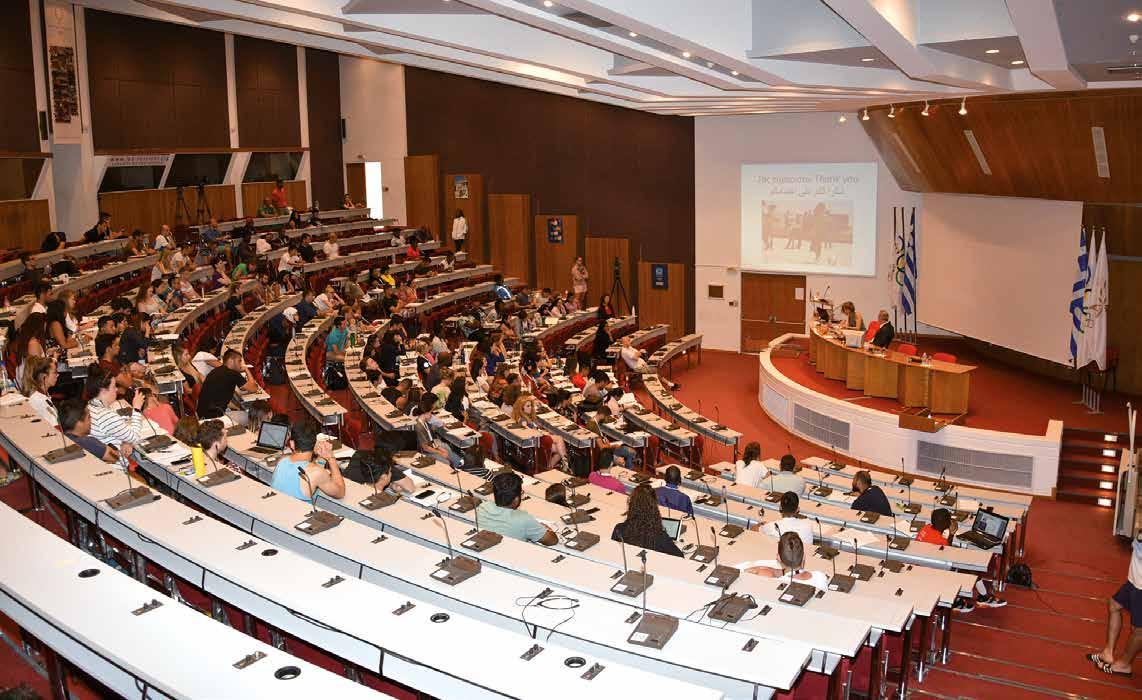
IOA Journal 16 – 17

“The main topic of the Session was ‘Olympic Diplomacy and Peace’.”
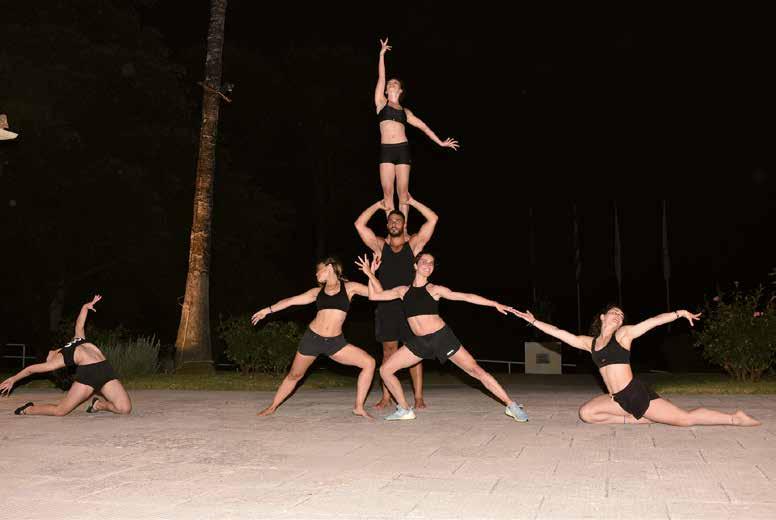
The 59th International Session for Young Participants was held from the 1st to the 15th of June 2019 with the participation of nine lecturers, 17 coordinators and 156 young participants from 86 different countries worldwide. After the official opening ceremony of the Session which was held at the Hill of Pnyx and attended by H.E. the President of the Hellenic Republic, Mr Prokopios Pavlopoulos and the IOC President, Dr Thomas Bach among others, the participants travelled to the IOA premises in Ancient Olympia through Delphi. It was there, that they got to spend eleven days, learning, sharing, practising sports and having fun!
The main topic of the Session was “Olympic Diplomacy and Peace” while the special topic was “Olympic Diplomacy: How can Olympic Sports play a positive role in international diplomacy”. Nine eminent lecturers explored various aspects of the subject:
George Papandreou, former Prime Minister of Greece and Vice-Chairperson of the International
La 59e Session Internationale pour Jeunes Participants s’est tenue du 1er au 15 juin 2019 et a accueilli neuf conférenciers, 17 coordinateurs et 156 jeunes participants de 86 pays du monde entier. Après la cérémonie officielle d’ouverture de la Session qui s’est tenue sur la Colline de la Pnyx en présence, notamment, du président de la République hellénique, M. Prokopios Pavlopoulos, et du président du CIO, Dr Thomas Bach, les participants se sont rendus dans les installations de l’AIO à Ancienne Olympie, via Delphes. C’est là qu’ils ont passé onze jours à apprendre, partager, faire du sport et s’amuser!
Le sujet principal de la session était «La diplomatie olympique et la paix» et le sujet spécial, «La diplomatie olympique: comment les sports olympiques pourraient-ils jouer un rôle positif dans la diplomatie internationale». Neuf éminents conférenciers ont exploré divers aspects du sujet.
Georges Papandreou, ancien Premier ministre grec et vice-président de la Fondation Internatio-
18 – IOA Journal 16
Olympic Truce Foundation spoke on “Olympic Truce as an international institution”. Starting off by making a brief reference to the history and evolution of Olympic Truce he then gave an insight into the work done by the International Olympic Truce Foundation and Centre, which were created by his initiative, both on a diplomatic as well as on an educational level. He underlined the role of sport and Olympic values in the promotion of peace and understanding among people and analysed the example of the PyeongChang Olympic Games.
Dr J. Simon Rofe from Great Britain made a lecture on “Understanding sport as a tool for diplomacy” through which he argued that diplomacy can provide an underpinning contribution to understanding the world of Sport, and at the same time the conceptual framework of Sports Diplomacy allows the realm of sport to contribute to broader diplomatic practices.
Dr Dionyssis Gangas from Greece gave a speech on “Olympic Movement as a soft power in diplomacy” focusing on how sport diplomacy and politics can achieve peacebuilding through image-building, building a platform for dialogue, trust building and reconciliation, integration and anti-racism. He also described the evolution of the relationship between politics and sport and how the Olympic Movement seems to have finally found its own independence in becoming a respected soft power in international politics after a long period of political interventions in sports.
Mr Yves Le Lostecque, Head of Sport Unit at the European Commission, spoke on “The external dimension of the EU sport diplomacy”, covering topics such as the place of sport in the EU policy, the ob-
«Le sujet principal de la session était “La diplomatie olympique et la paix”.»
nale pour la Trêve Olympique, a parlé de «La Trêve olympique en tant qu’institution internationale». Commençant par une brève référence à l’histoire et à l’évolution de la Trêve olympique, il a ensuite donné un aperçu du travail accompli par la Fondation et le Centre International de la Trêve Olympique, créés sur son initiative, tant sur le plan diplomatique que sur le plan éducatif. Il a souligné le rôle du sport et des valeurs olympiques dans la promotion de la paix et de la compréhension entre les peuples et a analysé l’exemple des Jeux Olympiques de PyeongChang.
Le Dr J. Simon Rofe (Grande-Bretagne) a donné une conférence sur le thème «Percevoir le sport comme outil diplomatique», en soulignant que la diplomatie peut apporter une contribution fondamentale à la compréhension du monde du sport et que, dans le même temps, le cadre conceptuel de la diplomatie sportive permet au sport de contribuer aux pratiques diplomatiques plus larges.
Le Dr Dionyssis Gangas (Grèce) a évoqué «Le Mouvement olympique en tant que puissance douce dans la diplomatie», en se concentrant sur la manière dont la diplomatie sportive et la politique peuvent parvenir à la consolidation de la paix par la construc-
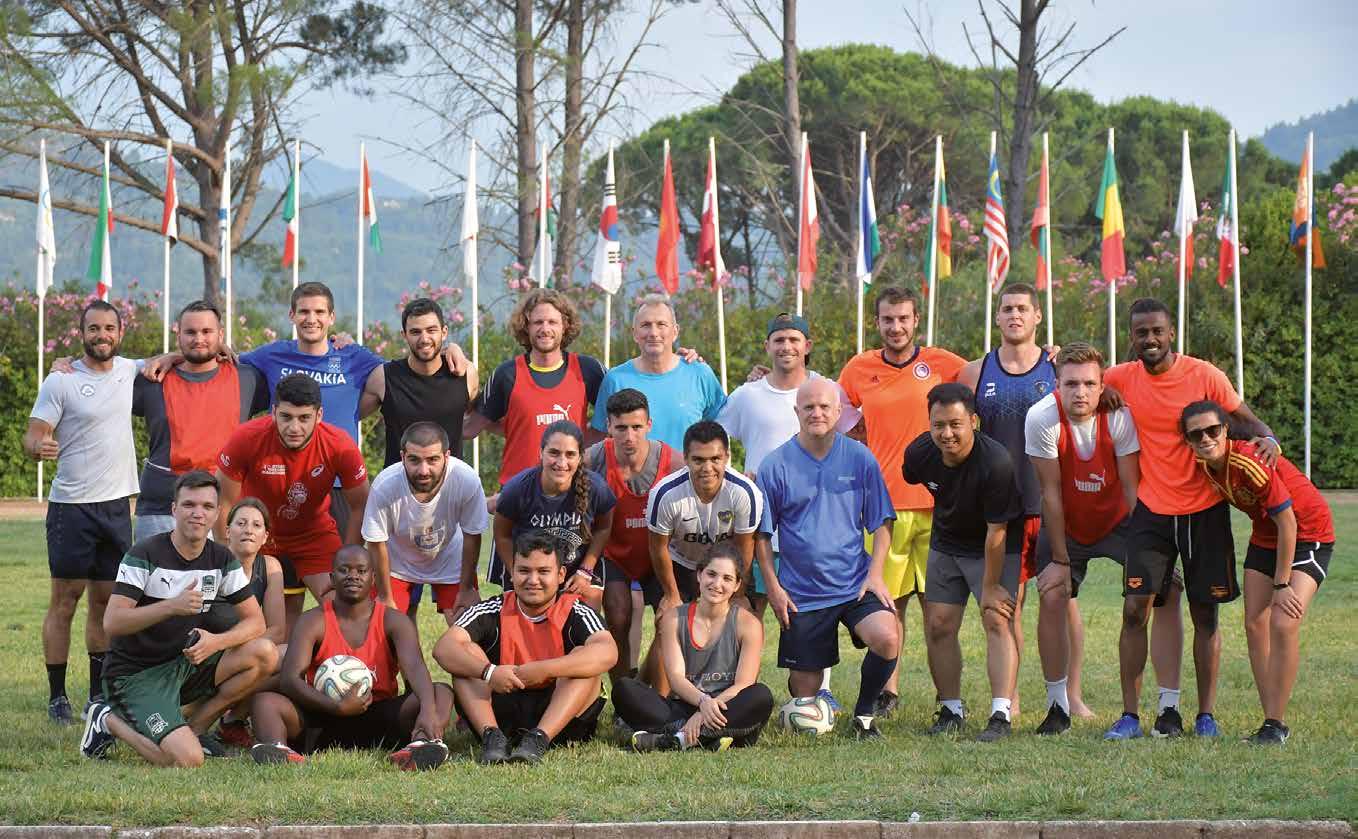
IOA Journal 16 – 19
jectives and activities of the EU, the concept of EU sport diplomacy, recent policy developments in sport, the example of bilateral cooperation in the case of the China dialogue, the Erasmus+ programme and its international dimension, EU funding tools, the European Week of Sport and other EU pilot projects, specifically that of mobility exchanges.
Dr Beatrice Garcia from Spain gave a lecture on “The cultural Olympiad as a platform for cultural diplomacy and representation” by putting emphasis on the importance of artistic expression to advance cultural diplomacy, and the way this manifests in the context of the Olympic Games, in parallel to educational and sporting activities. She underscored the value of the Cultural Olympiad for diplomacy and representation and referred to key moments of various Olympic Games across time that served as defining examples of cultural representation.
Dr Gelly Aroni from Greece made a presentation on “Sport and an active society without walls. Social inclusion of refugees through sport and physical activity”. Her presentation was greatly inspired by her work in the coordination and monitoring of refugee education and offered a valuable insight on how we can educate youth through sport practised without discrimination of any kind and thus contribute to building a peaceful and better world even in the midst of a deep economic, political and migration crisis such as the one we currently experience.
The IOA Honorary Dean, Prof. Konstantinos Georgiadis’ lecture on “The Olympic Games and Peace” explored the notion of peace and offered a retrospective of the steps taken towards the Olympic Movement’s contribution to peace starting from the establishment of Olympic truce in ancient times and moving on to our days where the IOC, the United Nations, National Olympic Committees and Academies as well as the International Olympic Academy and the International Olympic Truce Centre have succeeded in implementing Olympic truce in communities through Olympic education programmes and initiatives.
Dr Ian Brittain from Great Britain delivered a lecture titled “Paralympic Games: Promoting human rights and development”. He examined the possible links between the Paralympic Games, the Paralympic Movement and human rights. He subsequently explored the notion of ableism, and the direct, cultural and structural violence toward people with disabilities as well as the notion of development and the implications that all the above might have for the Paralympic Movement and people with disabilities and he concluded by expressing his strong belief in the power of the Paralympic Games.
Prof. Dr Benu Gupta gave the last speech of the Session on “Sport diplomacy: Panacea for what ails Asia”. She gave an overview on the relation between
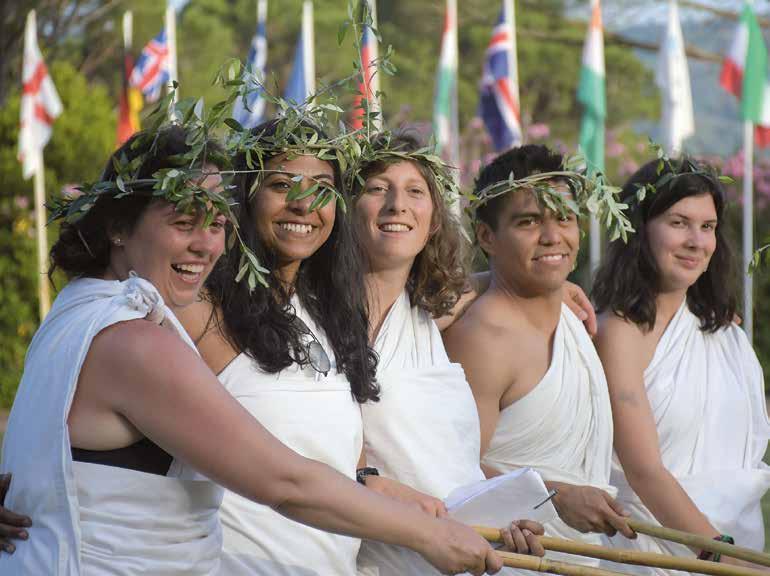
tion de l’image, la construction d’une plate-forme pour le dialogue, la confiance, la réconciliation, l’intégration et la lutte antiraciste. Il a également décrit l’évolution du rapport entre la politique et le sport et la manière dont le Mouvement olympique semble avoir finalement trouvé sa propre indépendance en devenant une puissance douce en politique internationale après une longue période d’interventions politiques dans le sport.
M. Yves Le Lostecque, chef de l’unité Sport de la Commission européenne, a parlé de «La dimension extérieure de la diplomatie sportive de l’UE», abordant des sujets tels que la place du sport dans la politique européenne, les objectifs et les activités de l’UE, le concept de diplomatie sportive européenne, les développements politiques récents du sport, l’exemple de la coopération bilatérale dans le cadre du dialogue avec la Chine, le programme Erasmus+ et sa dimension internationale, les instruments de financement de l’UE, la Semaine européenne du Sport et autres projets pilotes européens, notamment ceux qui concernent la mobilité et les échanges.
La Dr Beatrice Garcia (Espagne) a donné une conférence sur «L’Olympiade culturelle en tant que plate-forme pour la diplomatie et la représentation culturelle», en mettant l’accent sur l’importance de l’expression artistique pour faire progresser la diplomatie culturelle, et la façon dont elle se manifeste dans le contexte des Jeux Olympiques, parallèlement aux activités éducatives et sportives. Elle a souligné la valeur de l’Olympiade culturelle pour la diplomatie et la représentation et s’est référée aux moments clés de diverses éditions des Jeux Olympiques au fil du temps qui ont servi d’exemples de représentation culturelle.
La Dr Gelly Aroni (Grèce) a fait une présentation sur «Le sport et une société active sans cloisonnement. L’inclusion sociale des réfugiés grâce au sport et à l’activité physique». Sa présentation a été grandement inspirée par son travail de coordination et de supervision de l’éducation des réfugiés et a offert un
01
The coordinators play the role of the “Ellanodikes” at the trackand-field competitions.
Les coordinateurs assument le rôle d’ «Héllanodice» lors des compétitions d’athlétisme.
02
The main subject of the Fire Arts Workshop was Olympic diplomacy and peace.
Le thème principal de l’atelier des beaux-arts était la diplomatie olympique et la paix.
20 – IOA Journal 16
01
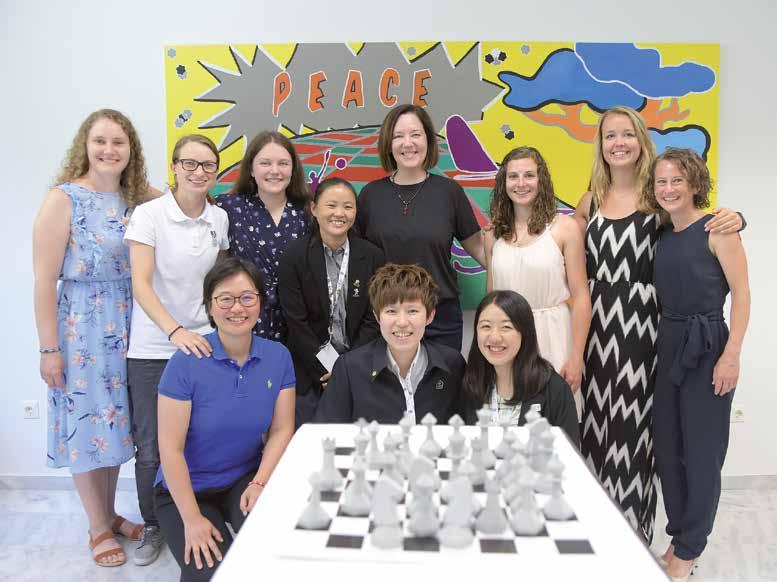
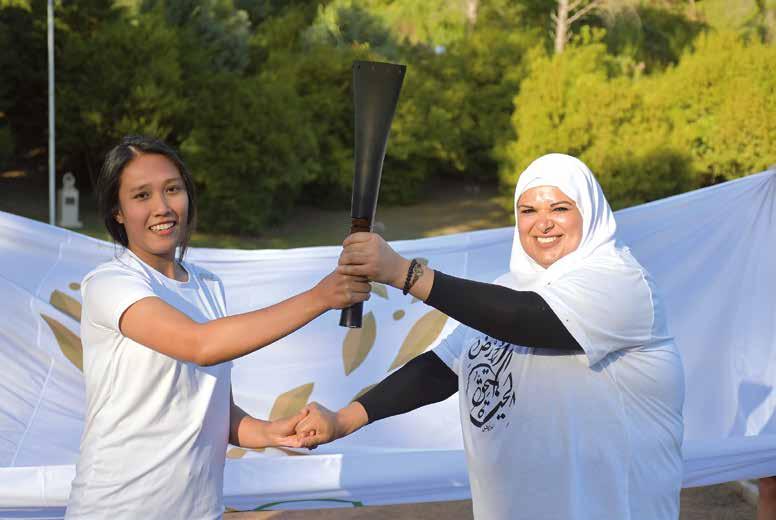
aperçu précieux sur la façon dont nous pouvons éduquer les jeunes par le sport pratiqué sans discrimination d’aucune sorte et contribuer ainsi à construire un monde pacifique et meilleur même au milieu d’une profonde crise économique, politique et migratoire comme celle que nous traversons actuellement.
Le doyen honoraire de l’AIO, le professeur Konstantinos Georgiadis, a parlé sur «Les Jeux Olympiques et la paix». Il a exploré la notion de paix et a offert une rétrospective des étapes franchies dans la contribution du Mouvement olympique à la paix depuis l’instauration de la Trêve olympique dans l’Antiquité jusqu’à nos jours, où le CIO, les Nations unies, les Comités Nationaux Olympiques, les Académies Nationales Olympiques, l’Académie Internationale Olympique et le Centre International pour la Trêve Olympique ont réussi, par des programmes et des initiatives d’éducation olympique, à instaurer la Trêve olympique dans les communautés.
Le Dr Ian Brittain (Grande-Bretagne) a donné une conférence intitulée «Les Jeux Paralympiques: la promotion du développement et des droits de l’homme». Il a examiné les liens possibles entre les Jeux Paralympiques, le Mouvement paralympique et les droits de l’homme. Il a aussi exploré les notions de capacitisme et de violence directe, culturelle et structurelle envers les personnes handicapées, ainsi que la notion de développement et les implications que tout ce qui précède pourrait avoir pour le Mouvement paralympique et les personnes handicapées, et il a conclu en exprimant sa foi profonde dans le pouvoir des Jeux Paralympiques.
Un relais de la flamme a été organisé dans l’enceinte de l’AIO.
sport and diplomacy and examined the effectiveness of sports as a platform for diplomacy, especially in relation to the example of Asia and the ails that the latter faces today with the most indisputable being social discrimination and inequality.
This year’s Young Participants group proved to be particularly active and passionate. There were a lot of questions and debate in the lecture hall, long conversations at the discussion groups which resulted in insightful conclusions, inspiring and moving presentations from Olympians, plethora of sports and cultural activities but above all one could sense a strong feeling of camaraderie throughout the Academy. Hopefully, the Olympic spirit that the IOA inspired to the young participants will be omnipresent in their hearts and souls and will help them become the best ambassadors of the Olympic Movement. – J
La Dr Benu Gupta a présenté la dernière conférence de la Session en parlant de «La diplomatie sportive: une panacée pour les maux qui frappent l’Asie». Elle a donné un aperçu de la relation entre le sport et la diplomatie et a examiné l’efficacité du sport en tant que plate-forme diplomatique, en particulier au regard de l’exemple de l’Asie et des maux auxquels cette dernière est aujourd’hui confrontée, les plus flagrants étant la discrimination et les inégalités sociales.
Cette année, le groupe des jeunes participants s’est avéré particulièrement actif et passionné. Il y a eu beaucoup de questions et de débats dans la salle de conférences, de longues conversations dans les groupes de discussion qui ont abouti à des conclusions pertinentes, mais aussi des présentations inspirantes et émouvantes des Olympiens, une pléthore d’activités sportives et culturelles, et il a régné partout dans l’Académie une grande et très sensible camaraderie. Espérons que l’esprit olympique que l’AIO a insufflé aux jeunes participants sera omniprésent dans leur cœur et dans leur âme et les aidera à devenir les meilleurs ambassadeurs du Mouvement olympique. – J
IOA Journal 16 – 21 02
03 03
A torch relay was organised in the IOA premises.
Master’s Degree Programme in Olympic Studies 2019-2020: A new Curriculum, a new Era
Le programme Master en Études olympiques 2019–2020: un nouveau programme d’études, une nouvelle ère
by Vanda Voudouri
par Vanda Voudouri
The first semester of the Μaster’s Degree Programme “Olympic Studies, Olympic Education, Organisation and Management of Olympic Events” has already been underway since mid-September. A new Olympic Studies cycle has begun, with one more academic year to be added to the previous nine years of unique multicultural educational experience.
During the academic year 2017–2018, the MSc was reestablished, adapting its subject matter to current educational challenges.
As an innovative educational programme, it is based on methods aimed at the development of sporting, social and moral skills and an aesthetic sense, together with the cultivation of a humanistic and democratic awareness.
Starting from the history and philosophy of sport, special emphasis is placed on Olympic pedagogy and, in particular, the establishment and implementation of Olympic Education programmes in schools. The organisation and management of the Olympic Games and of major sporting events in general, sports marketing and matters related to Olympic sponsoring, constitute a large part of the programme.
After a one year “break”, the Master’s Degree
Le premier semestre du Master en études olympiques (MSc) est déjà en cours depuis la mi-septembre. Un nouveau cycle d’études olympiques a commencé avec une année académique qui s’ajoute aux neuf années précédentes d’une expérience éducative multiculturelle unique.
Au cours de l’année académique 2017–2018, le MSc a été refondé et ses matières adaptées aux défis éducatifs actuels.
En tant que programme éducatif novateur, il est fondé sur des méthodes visant à développer des compétences sportives, sociales et morales ainsi qu’un sens esthétique, et à cultiver une conscience humaniste et démocratique.
Commençant par l’histoire et la philosophie du sport, il met un accent particulier sur la pédagogie olympique et notamment sur l’élaboration et la mise en œuvre de programmes d’éducation olympique dans les écoles. L’organisation et la gestion des Jeux Olympiques et, par extension, des grands événements sportifs, du marketing sportif et des questions liées au sponsoring olympique représentent une grande partie du programme.
Après une «pause» d’un an, le programme Master
22 – IOA Journal 16
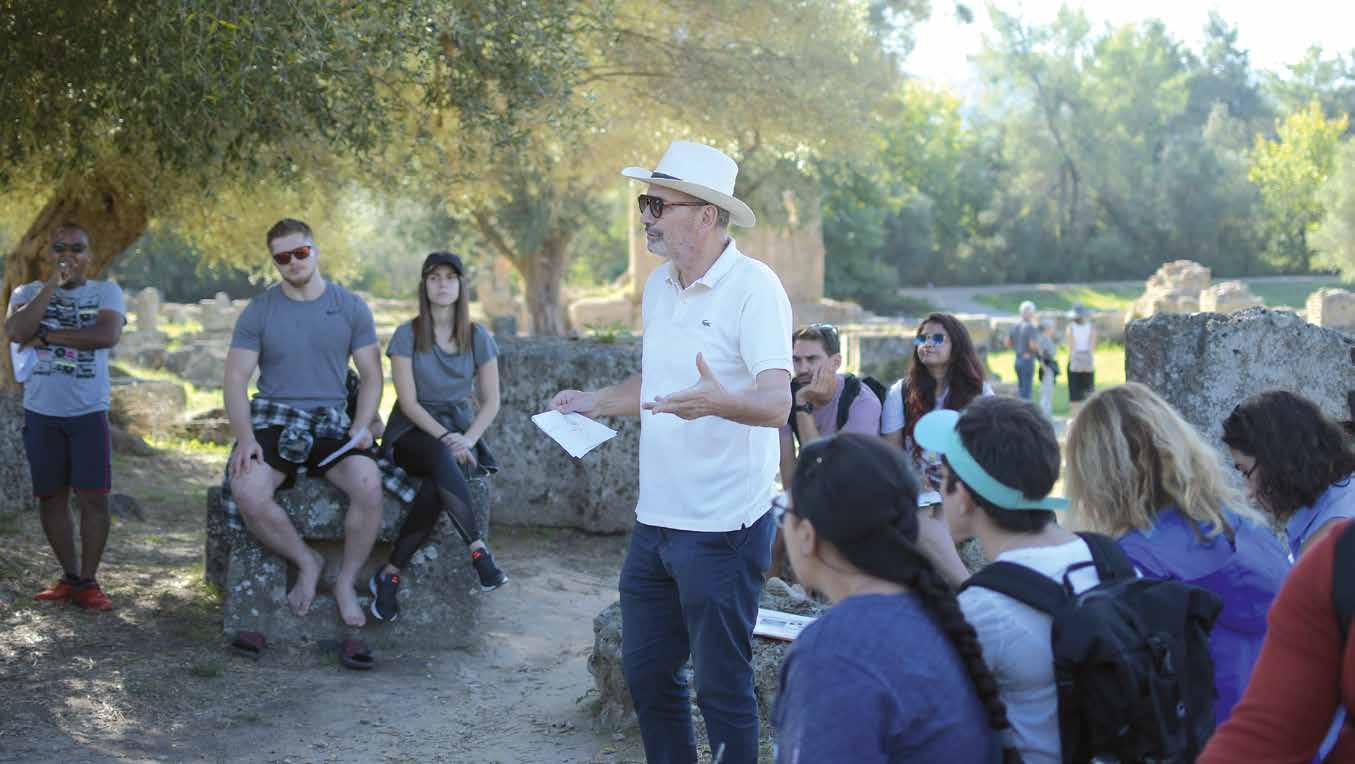
01
The Director of the Master’s Degree Programme, Prof. Konstantinos Georgiadis guides the post-graduate students around the archaeological place.
Le professeur Konstantinos Georgiadis, directeur du programme Master, guide les étudiants post-gradués sur le site archéologique.
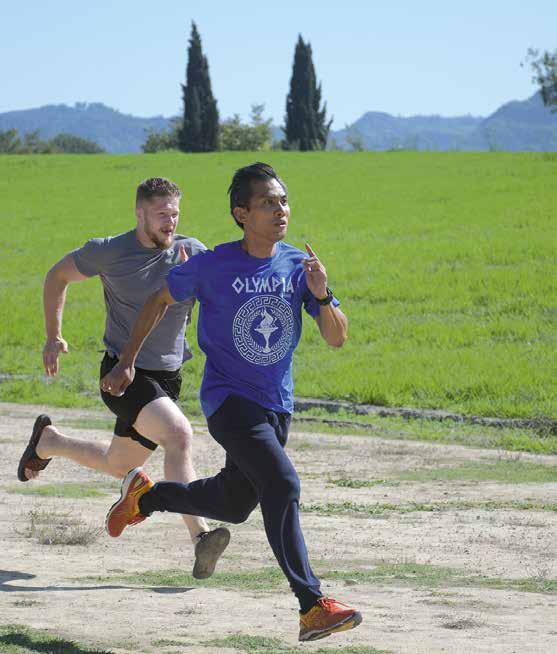
a été relancé de façon dynamique avec 29 étudiants de 22 pays différents. Au départ d’Athènes et grâce à des visites à Nauplie, Épidaure et Mycènes, les étudiants ont eu un premier aperçu de la civilisation grecque antique.
Le 15 septembre, les étudiants sont arrivés dans l’enceinte accueillante de l’Académie Internationale Olympique (AIO) à Ancienne Olympie et le 20 septembre, ils ont assisté à la cérémonie officielle d’ouverture du programme, en présence du président de l’Académie Internationale Olympique, Isidoros Kouvelos, dans une atmosphère agréable et animés de l’envie de travailler sur des questions liées à l’Olympisme et au Mouvement olympique.
Le professeur Konstantinos Georgiadis, directeur du programme de Master, toujours aux côtés des étudiants, leur a parlé de l’histoire de l’Académie et des programmes éducatifs qui se déroulent en son sein, en mettant l’accent sur la création du MSc comme moyen de promouvoir le Mouvement olympique.
Les participants au programme ont la chance de vivre l’expérience de l’Olympisme dans un environnement multiculturel où des relations privilégiées sont créées, comme celles de l’amitié et du respect mutuel.
Olympia.
Programme has energetically resumed, with 29 students from 22 different countries. Starting in Athens, and with visits to Nafplion, Epidauros and Mycenae, the students were given a first taste of ancient Greek civilisation.
On September 15, the students arrived at the welcoming premises of the International Olympic Academy (IOA) in Ancient Olympia. In a warm atmosphere on September 20 and in the presence of the
Après dix ans de fonctionnement, le programme est toujours novateur pour le Mouvement olympique au niveau international, car il est le seul à offrir une approche holistique et multidisciplinaire dans les domaines associés aux études olympiques.
Il soutient les valeurs du Mouvement olympique en matérialisant la phrase de Pierre de Coubertin: «L’avenir de notre civilisation ne repose pas sur des fondations politiques ou économiques. Il dépend totalement de la direction donnée à l’éducation».
IOA Journal 16 – 23
02 01
02
Running at the ancient Stadium of
Courir à l’ancien stade d’Olympie.
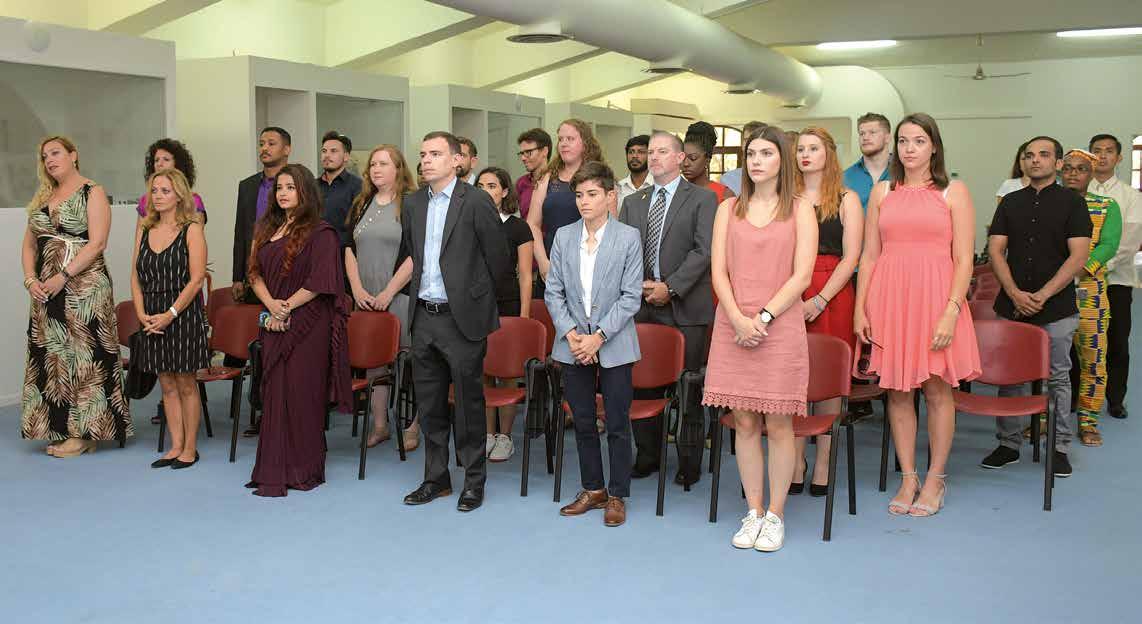
“Participants in the programme are given the opportunity to experience Olympism in a multicultural environment.”
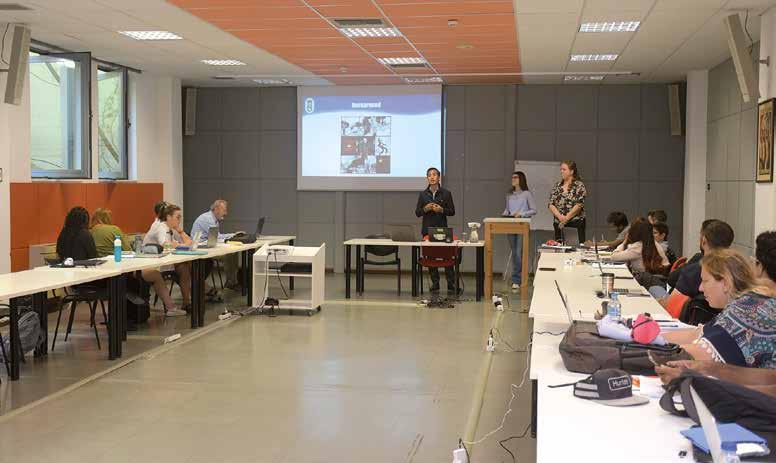
International Olympic Academy President, Isidoros Kouvelos, they attended the official opening ceremony of the Programme, after which they were eager to begin work on issues relating to Olympism and the Olympic Movement.
Present as always at the students’ side was Professor Konstantinos Georgiadis, Director of the Master’s Degree Programme, who briefed them on the history of the Academy and the educational programmes it develops, placing emphasis on the establishment of the MSc course as a means for promoting the Olympic Movement.
Participants in the programme are given the opportunity to experience Olympism in a multicultural environment, where special interactions of friendship and mutual respect are created.
Even after ten years of operation, the programme is still innovative for the Olympic Movement internationally, being the only programme that offers a holistic and multidisciplinary approach to the fields associated with Olympic Studies.
It supports the values of the Olympic Movement, echoing the words of Pierre de Coubertin: “The future
Il convient de noter que le programme suscite un intérêt croissant, notamment de la part de nouveaux pays. Par exemple, cette année, six autres pays se sont ajoutés à ceux qui le mettent en œuvre, portant à 96 le nombre total de pays d’origine des étudiants et à 276 le nombre d’étudiants qui en bénéficient.
Le MSc vise à former des personnes qualifiées qui promouvront au niveau international le développement de programmes d’éducation olympique et de programmes éducatifs en vue de renforcer le dialogue entre les jeunes d’origines culturelles différentes. Ces programmes les aideront également à développer leurs compétences en matière de résolution des différends et à former les formateurs sur des questions liées au dialogue démocratique et à la trêve olympique, à la paix sociale, aux réformes et au renforcement de la cohésion sociale.
En outre, le programme vise à mettre en place des projets qui deviendront des axes de développement des sociétés pour l’éradication de la pauvreté, l’égalité des sexes, la promotion de la santé, la lutte contre les maladies, l’environnement durable, le respect de la diversité, etc.).
24 – IOA Journal 16
of civilisation rests at this moment neither on political nor on economic bases. It depends solely on the direction which will be given to education.”
It must be noted that a growing interest is being shown in the programme especially by previously unrepresented countries. For instance, this year six more countries have been added, bringing to 96 the number of the students’ countries of origin, and the total number of students to 276.
The MSc aims at producing qualified individuals who will promote internationally the development of Olympic education programmes and education programmes in general, bolstering dialogue between young people from different cultural backgrounds. These programmes will also help them to develop dispute-resolution skills and educate trainers in matters related to democratic dialogue and the Olympic truce, social peace, reform and the strengthening of social cohesion.
Furthermore, the Programme aims at creating projects that will become focal points for social development in terms of poverty eradication, gender equality, health promotion, combatting diseases, ensuring environmental sustainability, respecting diversity etc.
Beginning in the academic year 2013–2014, the MSc has been supported by scholarships granted by Olympic Solidarity of the International Olympic Committee. The implementation of the Master’s Degree Programme began nine years ago, thanks to the John S. Latsis Foundation’s sponsorship during the first four years, followed by the sponsorship of Olympiacos FC, and now with the sponsorship of Μ/Maritime.
The reintroduction of the Master’s Degree Programme marks a new era and also the tenth year of its operation, underlining the need for such a programme in a country where the pillars of education and sport struggle to keep their foundations firm. The result justifies such effort, since it demonstrates that it has been obtained through the hard work, persistence and effectiveness of everyone involved. – J
«Les participants au programme ont la chance de vivre l’expérience de l’Olympisme dans un environnement multiculturel.»
Depuis l’année académique 2013–2014, le MSc est soutenu par des bourses de la Solidarité Olympique du Comité International Olympique. La mise en œuvre du programme Master a commencé il y a neuf ans grâce au parrainage de la Fondation Jean S. Latsis pendant les quatre premières années, repris par le parrainage du FC Olympiacos et maintenant par celui de M/Maritime.
La refondation du programme Master a marqué une nouvelle ère et scellé en même temps dix ans de fonctionnement, en soulignant la nécessité d’un tel programme dans un pays où les piliers de l’éducation et du sport luttent pour garder leurs fondations solides. Le résultat justifie cet effort, car il prouve qu’il a été obtenu grâce au travail acharné, à la persévérance et à l’efficacité de tous les intervenants. – J
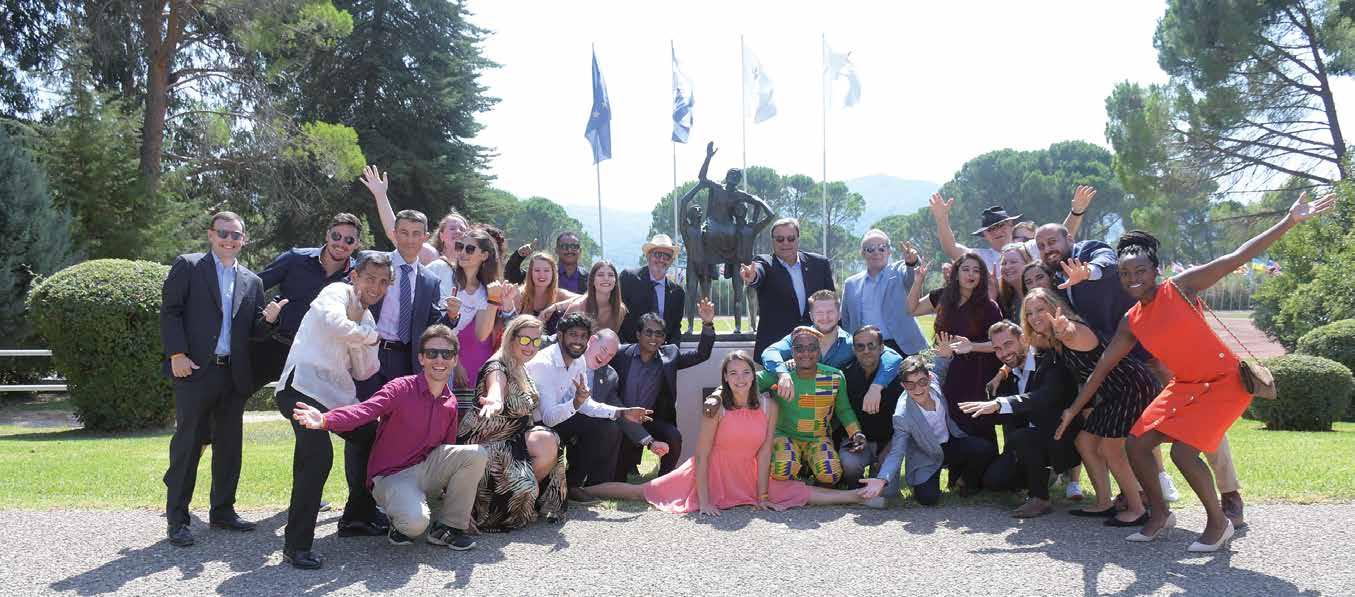
IOA Journal 16 – 25
15th International Session for Directors of NOAs –Global Peace Forum
15e Session Internationale pour Directeurs des ANO – Forum Mondial sur la Paix
by Alexandra Karaiskou
par Alexandra Karaïskou
“Should the institution of the Olympic Games prosper, it can become a potent factor in securing universal peace” (Pierre de Coubertin).
The relevance of these words of the visionary nowadays, and how the concept of peace can be ensured through sports and its educational context, could not be better studied in a place other than Ancient Olympia. The land, where the universal concept of Ekecheiria was founded.
The participation in the IOA Sessions at the premises of the IOA has been considered, throughout its history, by a lot of visitors, as a micrography of the Olympic village. Representatives from diverse backgrounds have been living together in peace, sharing their differences with respect, transforming their gatherings into strong bonds that enhance mutual understanding and become inspiration for peace, learning timeless values that lead to universalism.
In this spirit, the 15th International Session for Directors of National Olympic Academies has been held in Olympia from 10th to 17th May. One hundred and twenty delegates from 81 countries have been present in order to share experiences, study and get valuable feedback from the scientifically based lectures which were delivered throughout the Session,
«Si l’institution des Jeux Olympiques prospère, elle peut devenir un facteur puissant pour assurer la paix universelle» (Pierre de Coubertin).
La pertinence actuelle de ces paroles d’un visionnaire et la manière dont le concept de paix peut être garanti par le sport et son contexte éducatif ne sauraient être mieux analysées qu’en Ancienne Olympie. Le lieu où le concept universel d’Ekecheiria a été conçu.
La participation aux Sessions de l’AIO dans les installations de l’AIO a été considérée par de nombreux visiteurs, tout au long de son histoire, comme une micrographie du village olympique: des représentants d’horizons divers y ont cohabité en paix, partageant leurs différences avec respect, transformant leurs réunions en liens solides qui renforcent la compréhension mutuelle et deviennent une source d’inspiration pour la paix, grâce à l’apprentissage des valeurs éternelles qui conduisent à l’universalisme.
C’est dans cet esprit que s’est tenue à Olympie, du 10 au 17 mai, la 15e Session Internationale pour Directeurs des Académies Nationales Olympiques. Cent vingt délégués de 81 pays étaient présents afin de partager leurs expériences, d’étudier et de tirer parti des précieuses informations découlant des conférences scientifiques qui ont été données tout au long
01
Traditional commemorative photo.
02
The NOAs’ delegates discuss on the lectures’ content and express their opinions.
Les délégués des ANO discutent sur le contenu des conférences et expriment leurs opinions. Photo
26 – IOA Journal 16
commémorative traditionnelle.
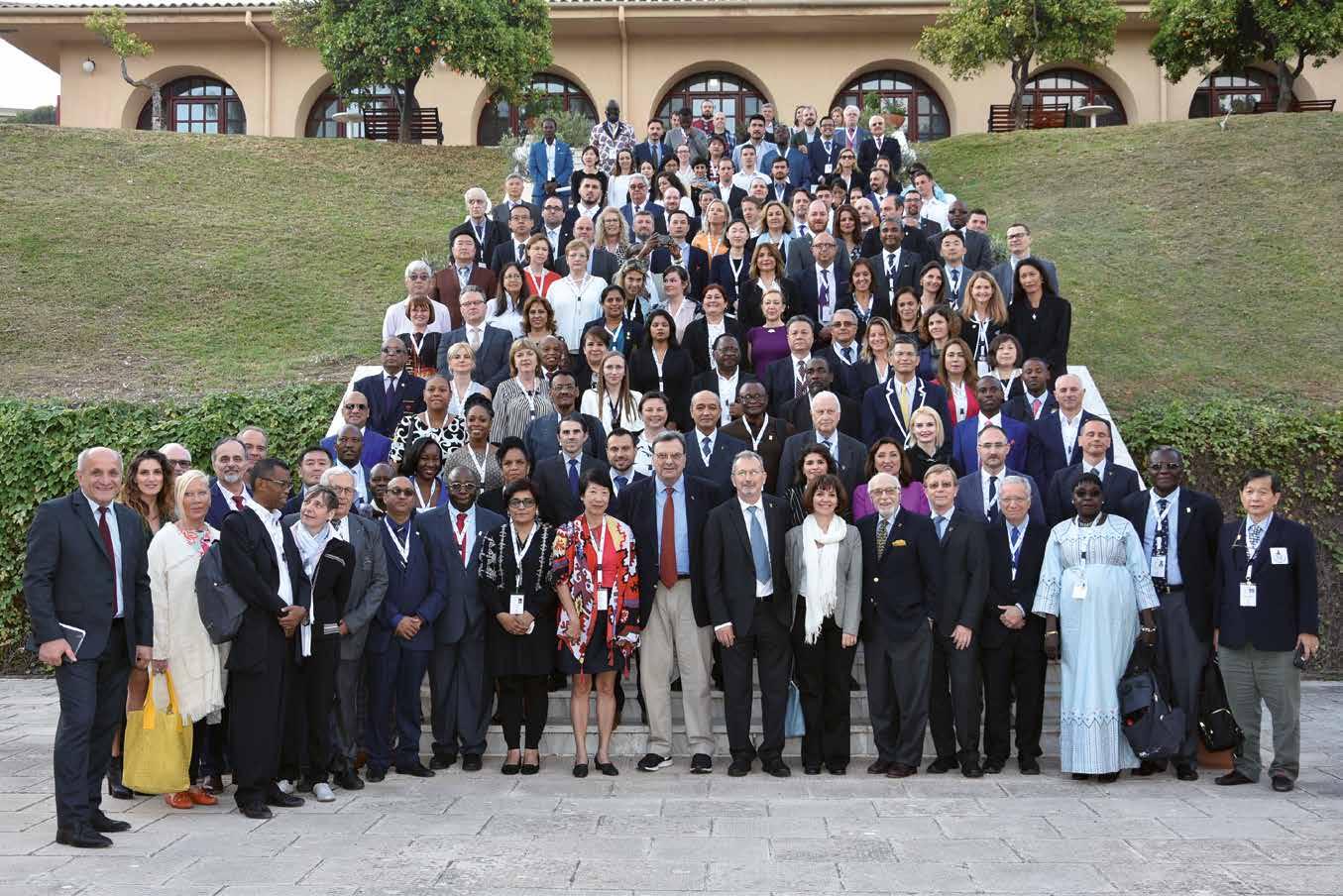
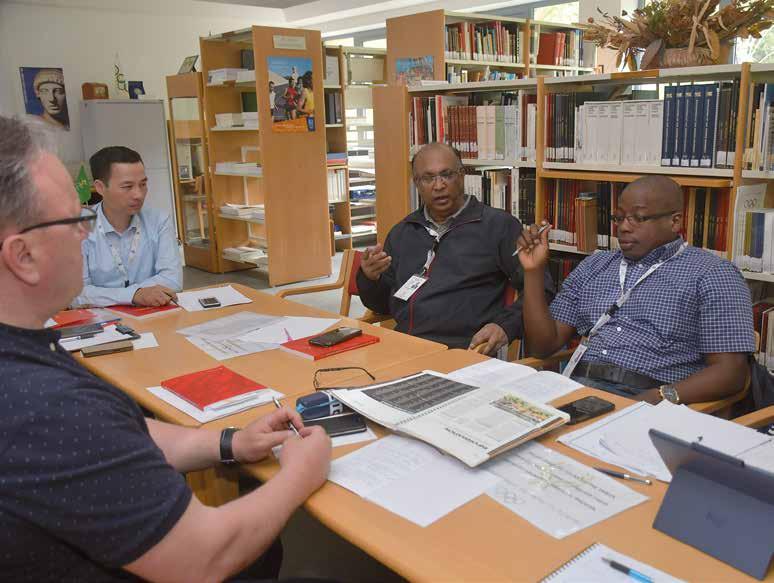
by eminent professors upon the main topic of the Session: “Olympic Diplomacy and Peace” and the special subject: “Peace Education as part of Olympic Education”.
Professor Christina Koulouri during her lecture, explored the link, from a historical point of view, between Olympism and the pursuit of peace, analysing ways in which Olympic education embraces peace education from the very beginning of its creation until
de la Session par d’éminents professeurs sur le sujet principal de la Session: «La diplomatie olympique et la paix», et sur le sujet spécial: «L’éducation pour la paix dans le cadre de l’éducation olympique».
Dans sa conférence, la professeure Christina Koulouri a exploré le lien, d’un point de vue historique, entre l’Olympisme et la recherche de la paix, en examinant comment l’éducation olympique a adopté l’éducation pour la paix depuis sa création jusqu’aux temps modernes. Le professeur Thierry Zintz a conceptualisé la diplomatie sportive en donnant des exemples concrets de la manière dont le sport peut être un instrument influent pour la compréhension et le dialogue interculturels et s’est concentré sur le cadre européen et la manière dont la diplomatie sportive est appliquée. Le professeur assistant Sasa Ceraj a analysé, d’un point de vue scientifique, les moyens par lesquels le sport peut conduire à l’établissement de la paix et il a présenté un aperçu historique de la dynamique des Jeux Olympiques au fil des ans et de leur capacité à contribuer à la paix, en analysant le concept de «Trêve Olympique» dans les temps anciens et sa pertinence actuelle. La professeure associée Sock Miang Teo-Koh a examiné le concept de paix, la relation entre l’éducation olympique et l’éducation pour la paix et le rôle des ANO dans la mise en œuvre des programmes de paix, en expliquant comment elles peuvent concevoir ces programmes. Le Dr Constantinos Filis a donné une conférence basée sur la recherche concernant l’idée de la Trêve et la façon
IOA Journal 16 – 27 01
02
“A reflection of the thought-provoking lectures was also depicted in the well-structured discussion groups.”
«Les groupes de discussion adéquatement structurés ont également bien reflété les conférences stimulantes.»
the modern times. Professor Thierry Zintz conceptualised sport diplomacy, giving concrete examples of how sport can be an influential instrument for understanding and intercultural dialogue and focused on the European framework and how sport diplomacy is applied. Assistant Professor Sasa Ceraj investigated, scientifically, the ways that sports can lead towards establishing peace and made a historical overview of the dynamic of the Olympic Games, throughout the years, and their power to contribute to a peaceful context, analysing the concept of “Olympic Truce” in ancient times and its relevance nowadays. Associate Professor Sock Miang Teo-Koh examined the concept of peace, how Olympic education interrelates with peace education and the role of the NOAs in the implementation of peace programmes, explaining manners in which they can design such programmes. Dr Constantinos Filis delivered a research-based lecture on the idea of Truce and how it can be implemented
dont elle peut être mise en œuvre dans les défis de notre temps. Le professeur associé Arnaud Richard a défini le cadre de la diplomatie sportive et a étudié les représentations médiatiques du sport et des nationalités en fournissant des détails rhétoriques sous l’angle de l’analyse discursive, qui donnent lieu à des sentiments d’allégeance identitaire. Nils Holmegaard a expliqué comment le Mouvement olympique est en constante évolution, au regard des défis sociétaux et des actions menées par le CIO dans différents domaines des valeurs olympiques, concernant la diplomatie olympique et les personnes déplacées, en faisant référence à la création de l’«Olympic Refuge Foundation». Il a également souligné l’usage de
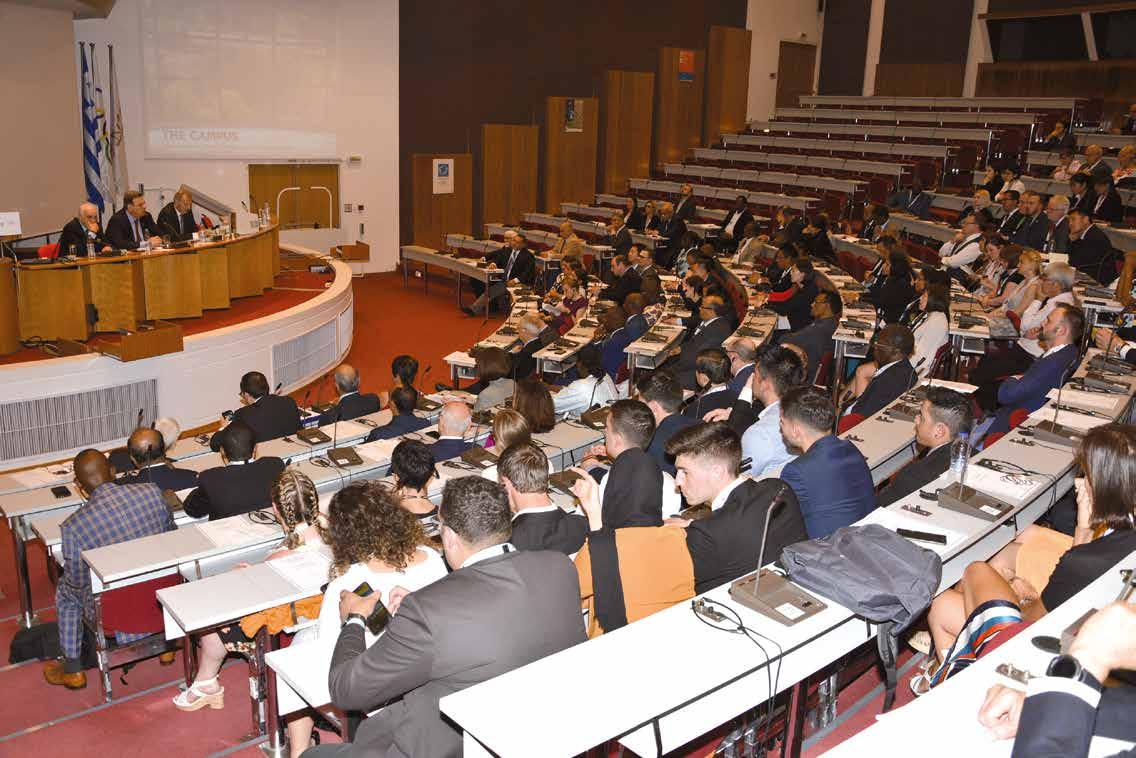
Messrs Dionyssis Gangas, Isidoros Kouvelos, Konstantinos Georgiadis, at the Opening Ceremony.
MM. Dionyssis Gangas, Isidoros Kouvelos, Konstantinos Georgiadis, à la cérémonie d’ouverture.
28 – IOA Journal 16 03
03
The Lecturers of the Session:
(1) Prof. Thierry Zintz (BEL)
(2) Prof. Christina Koulouri (GRE)
(3) Dr Constantinos Filis (GRE)
(4) Asst. Prof. Sasa Ceraj (CRO)
(5) Mr Nils Holmegaard (IOC)
(6) Assoc. Prof. Arnaud Richard (FRA)
(7) Assoc. Prof. Sock Miang
Teo-Koh (SGP)
Les conférenciers/ ères de la Session:
(1) Prof. Thierry
Zintz (BEL)
(2) Prof. Christina Koulouri (GRE)
(3) Dr Constantinos Filis (GRE)
(4) Prof. agrégé
Sasa Ceraj (CRO)
(5) M. Nils Holmegaard (CIO)
(6) Prof. associé
Arnaud Richard (FRA)
(7) Prof. associée Sock Miang
Teo-Koh (SGP)
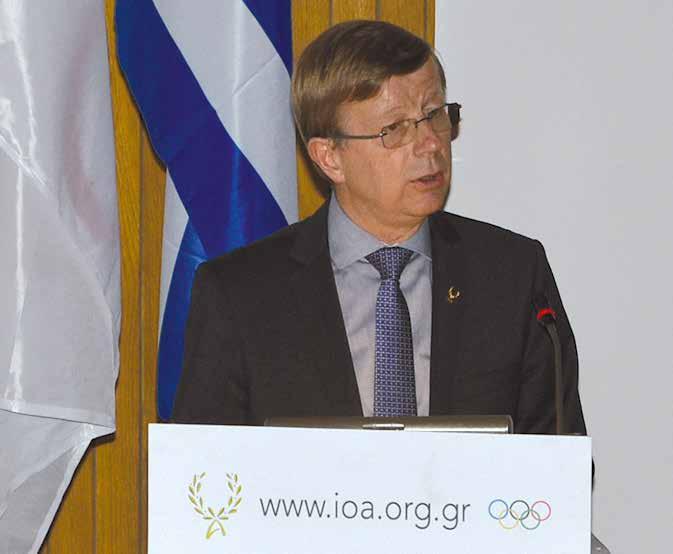
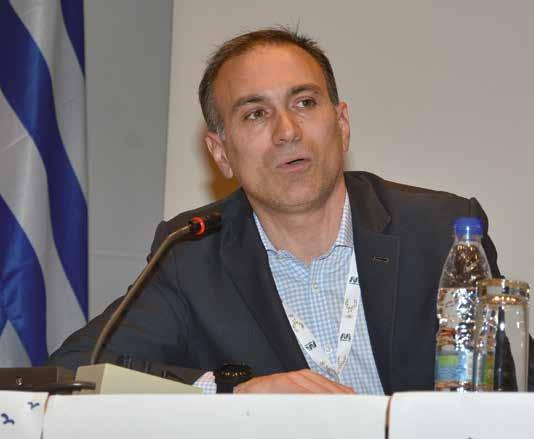
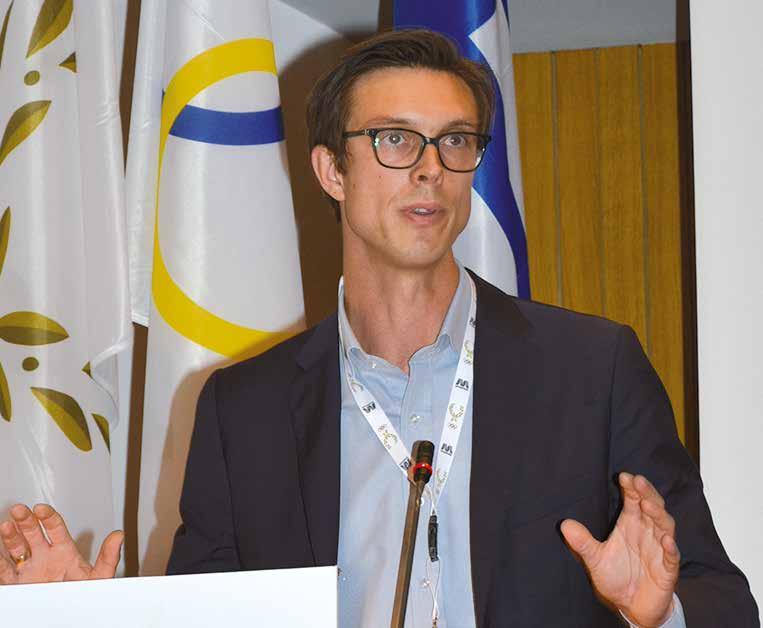
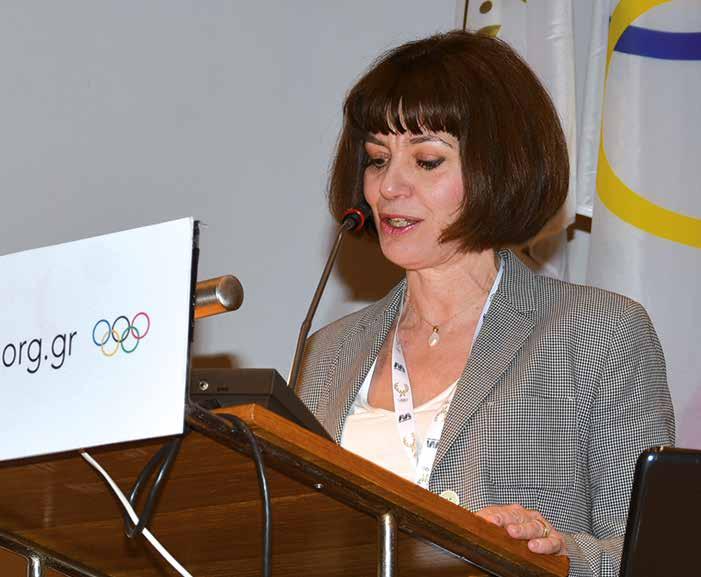
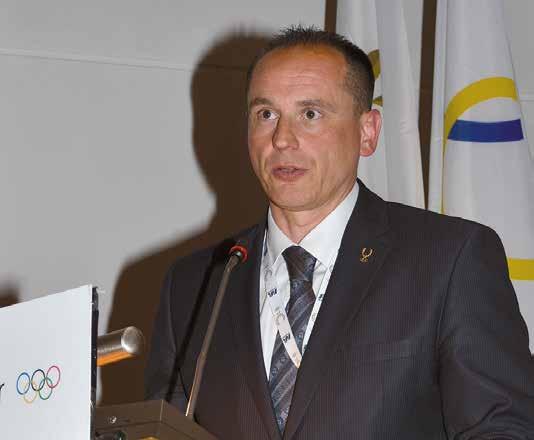
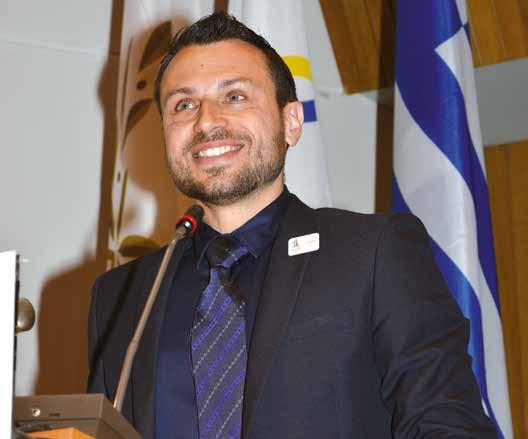
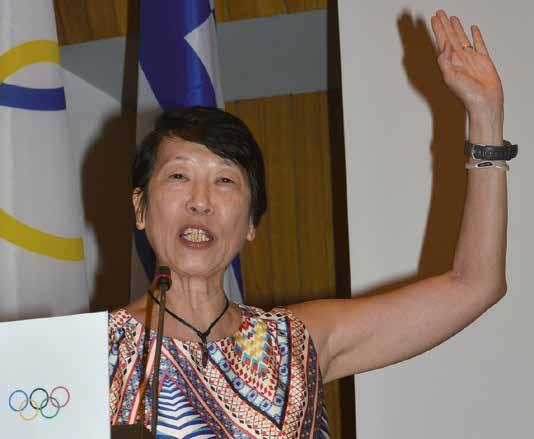
IOA Journal 16 – 29 04
(1)
(3)
(5) (2)
(4)
(6)
04
(7)
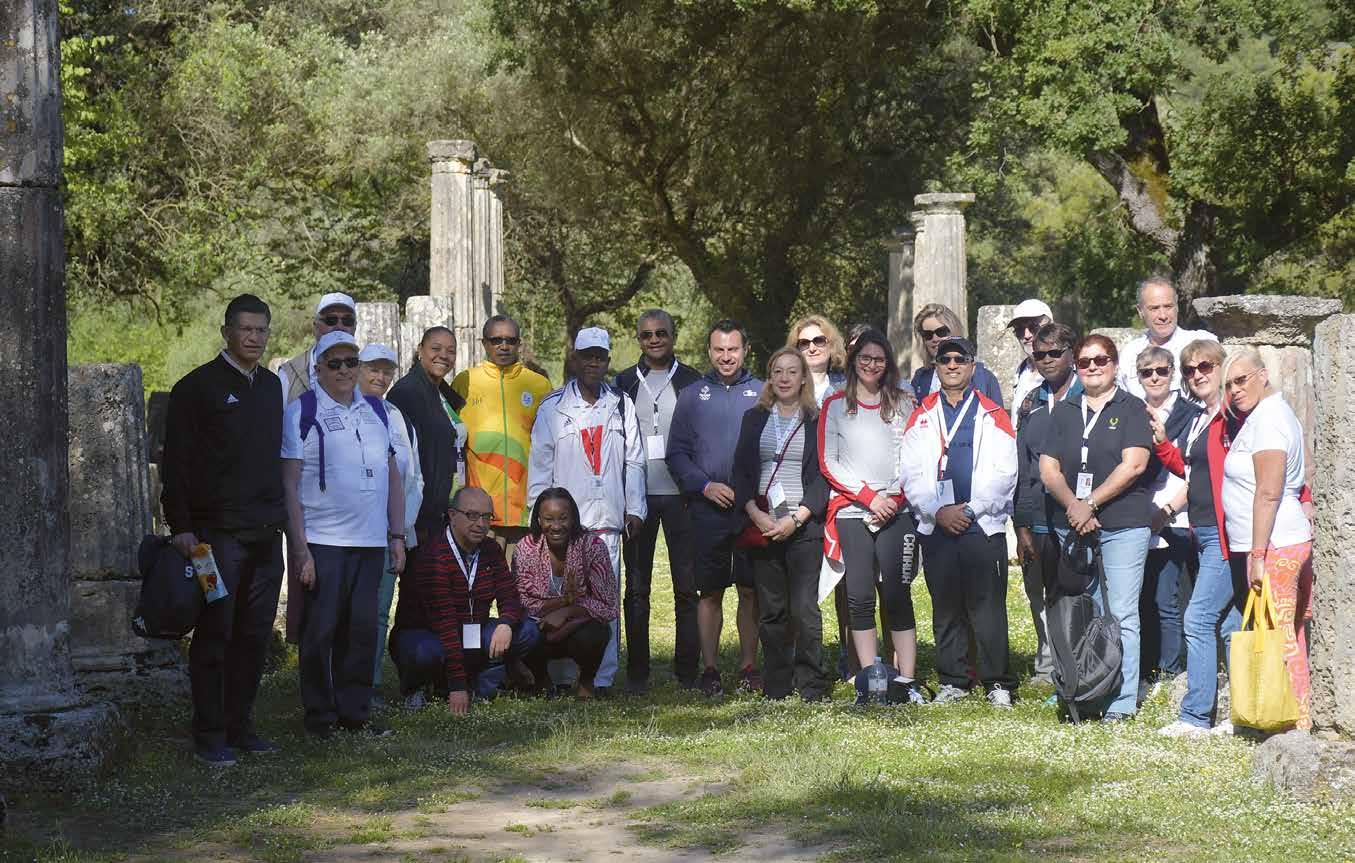
in the challenges of our times. Associate Professor Arnaud Richard set the framework of the diplomacy of sport and studied the media representations of sport and nationalities providing with rhetorical details from the perspective of discourse analysis, which give rise to feelings of identity allegiance. Mr Nils Holmegaard presented how Olympic Movement is in constant evolution, with regard to societal challenges, and the actions being taken on the part of the IOC in different Olympic values areas, regarding Olympic diplomacy and displaced people, making reference to the launch of the Olympic Refuge Foundation. He also highlighted the NOCs’ use of OS promotion of Olympic values programmes within their national context.
A reflection of the thought-provoking lectures was also depicted in the well-structured discussion groups; the delegates, shared their experience and proficient background so that they could form a noteworthy and compound outline of issues that provided capacity for reliable outcomes and speculations around the basic topics. Some of the most common debates that have been raised concerned
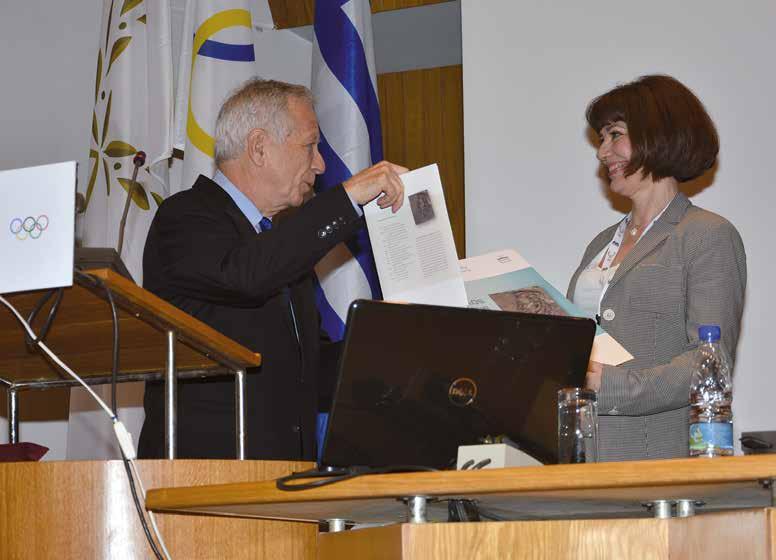
la part des CNO des programmes de promotion des valeurs olympiques dans leur contexte national, soutenus par la Solidarité Olympique. Les groupes de discussion adéquatement structurés ont également bien reflété les conférences stimulantes; les délégués ont partagé leurs expériences et leurs compétences en esquissant les grandes lignes des questions, ce qui a conduit à des résultats fiables et des prises de position sur les principaux sujets.
30 – IOA Journal 16
05 06
05

Guided tour at the archaeological site of Olympia. 07
Visite guidée du site archéologique d’Olympie.
06
Prof. Christina Koulouri was awarded the “Vikelas” plaque by the International Society of Olympic Historians (ISOH).
La Société internationale des historiens olympiques (ISOH) a remis la plaque «Vikelas» à la professeure
Christina Koulouri.
07
Discussion at the amphitheatre.
Discussion à l’amphithéâtre.
the interrelation between Olympic education and peace education, the role of the IOA and the NOAs in peace education strategies and their implementation through Olympic education, the role of the IOC in world diplomacy, examples of sport diplomacy from different countries that can be an inspiration. Suggestions on the form of discussion groups as well as the nature of each NOA’s presentation will be put forward and studied for further development. Furthermore, it is also given the opportunity to the established Continental Associations to hold their annual meetings, proceed with planning and organisational arrangements, coordinate their tasks and discuss with other representatives of NOAs for future cooperation.
The knowledge and expertise of the lecturers in combination with the already established significant network of the National Olympic Academies, which has been created all these years, by all the representatives participating in the IOA Sessions, gives us the conviction that each year, the awareness gained in the field of Olympic education is becoming more profound, and inevitably, sets higher standards, with regard to the challenges being faced within the Olympic Movement. The IOA is currently undergoing a period of transition and is more than willing to restructure and improve the existing frame, living up to the expectations of the times, with flexibility and mindfulness for the future. – J
Parmi les débats les plus courants, il convient de mentionner l’interrelation entre l’éducation olympique et l’éducation pour la paix, le rôle de l’AIO et des ANO dans les stratégies d’éducation pour la paix et leur mise en œuvre à travers l’éducation olympique, le rôle du CIO dans la diplomatie mondiale, des exemples de diplomatie sportive de différents pays qui peuvent servir de modèle. Des suggestions sur la forme des groupes de discussion ainsi que sur la nature de chaque présentation des ANO seront présentées et étudiées en vue de leur élaboration. En outre, les Associations Continentales établies ont la possibilité de tenir leurs réunions annuelles, de procéder à la planification et à l’organisation, de coordonner leurs tâches et de discuter avec d’autres représentants des ANO en vue d’une coopération future.
Nous sommes certains que, grâce aux connaissances et à l’expertise des conférenciers, combinées à l’important réseau déjà établi des Académies Nationales Olympiques, qui a été créé toutes ces années par tous les représentants participant aux Sessions de l’AIO, la sensibilisation à l’éducation olympique deviendra chaque année plus profonde et, inévitablement, haussera les normes concernant les défis auxquels le Mouvement olympique fait face. L’AIO traverse actuellement une période de transition et est plus que disposée à restructurer et à améliorer le cadre existant, à la hauteur des attentes de l’époque, avec souplesse et dans le souci de l’avenir. – J
IOA Journal 16 – 31
Post-graduate students meeting in Olympia for a 3-week international Seminar
Des étudiants post-gradués se réunissent à Olympie pour un séminaire international de 3 semaines
by Gina Tsiotra
par Gina Tsiotra
“Olympic Diplomacy and Peace” was the special topic of the 26th International Seminar on Olympic Studies for Post-graduate Students that was held in Ancient Olympia from May 8 to 30, 2019. The 26 selected participants arrived in Athens on May 8 and had their first, introductory meeting with the IOA Honorary Dean, Professor Konstantinos Georgiadis. On the following day, they visited the Acropolis, Zappeion Μegaron and the Panathenaic Stadium. In the afternoon, after leaving Athens they were guided at the impressive site of Epidaurus and in the evening, they arrived in the beautiful city of Nafplion.
The next morning, sightseeing began at the fortress of Palamidi, situated above the city of Nafplion. Next, the group visited Nemea, one of the four places of the ancient Panhellenic Games where they met Professor Stephen Miller who has devoted his life and professional career to the excavations and the archaeological works at Nemea since the 1970s. In the evening, the students arrived at the premises of the International Olympic Academy in Ancient Olympia.
«La Diplomatie olympique et la Paix» était le sujet spécial du 26e Séminaire International en Études Olympiques pour Étudiants Post-gradués qui s’est tenu à Ancienne Olympie du 8 au 30 mai 2019. Les 26 participants sélectionnés sont arrivés à Athènes le 8 mai et ont eu leur première réunion d’introduction avec le doyen honoraire de l’AIO, le professeur Konstantinos Georgiadis. Le lendemain, ils ont visité l’Acropole, le Palais Zappeion et le stade Panathénaïque. L’après-midi, après avoir quitté Athènes, ils ont été guidés sur le site impressionnant d’Épidaure et le soir, ils sont arrivés dans la belle ville de Nauplie.
Le lendemain matin, les visites ont commencé par la forteresse de Palamidi, qui surplombe la ville de Nauplie. Ensuite, le groupe a visité Némée, l’un des quatre lieux où se déroulaient les Jeux panhelléniques de l’Antiquité. Ils y ont rencontré le professeur Stephen Miller, qui a consacré sa vie et sa carrière aux fouilles et aux travaux archéologiques de Némée depuis les années 1970. Le soir, les étudiants
32 – IOA Journal 16
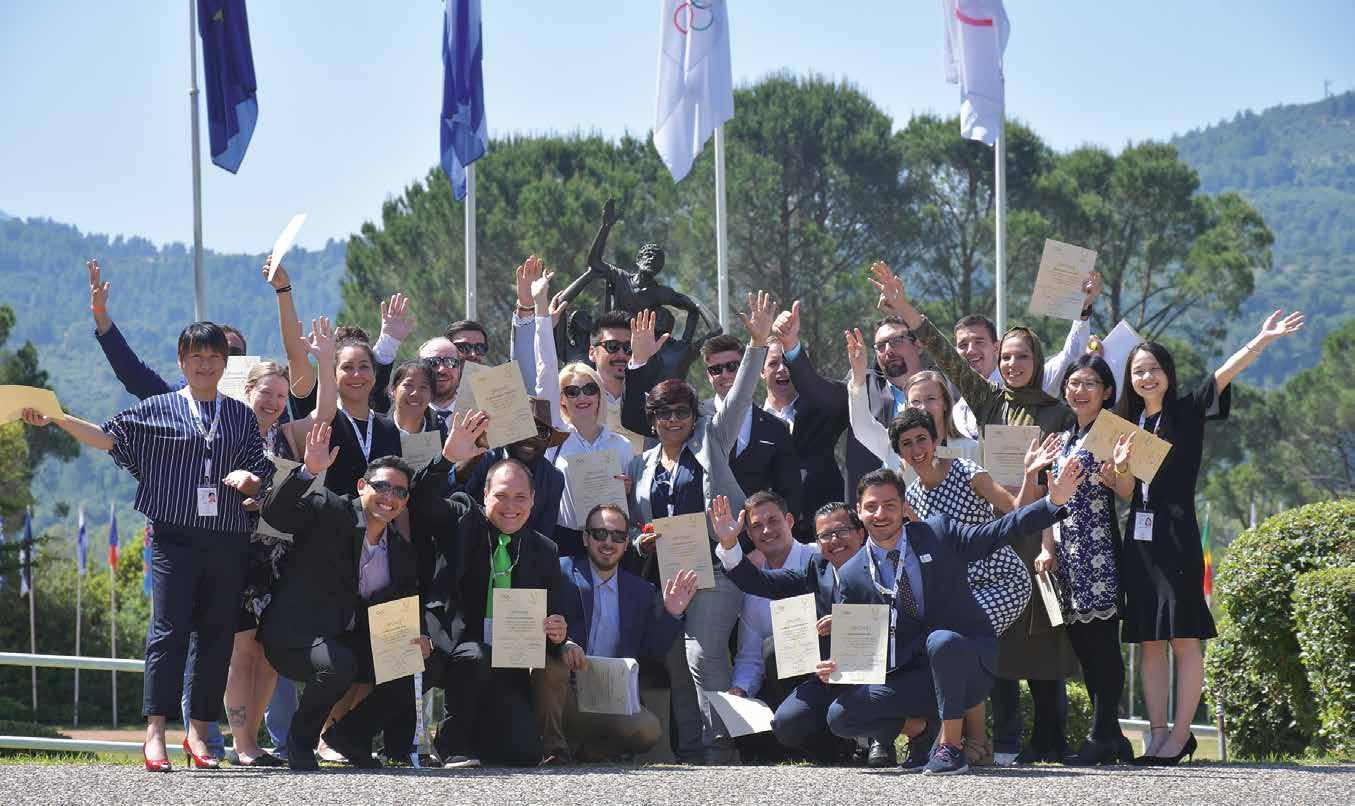
The lectures began with Peter Mauritsch (AUT), Professor at the University of Graz, who gave a brief overview of the history of the Olympic Games in Antiquity. The Professor shared basic information regarding the Olympic Games, such as their mythology, as well as the four Panhellenic Games.
The Opening Ceremony of the 26th International Seminar was jointly held with the Opening Ceremony of the 15th International Session for Presidents or Directors of National Olympic Academies in the afternoon of May 11 at “Dimitrios Vikelas” lecture hall. After the ceremonies, the participants laid wreaths at the commemorative monuments of Pierre de Coubertin, John Ketseas and Carl Diem.
On May 12, the whole group had a guided tour at the archaeological site and the museum of Ancient Olympia. The first lecture on May 13th was conducted by Dr Erofili Kollia (GRE), Director at the Ephorate of Antiquities in Ilia, who talked about the sacred truce during the Olympic Games in Antiquity. Professor Mauritsch continued his lectures by talking on sources for sport in antiquity: literature – art – epigraphy, ancient politics and Olympia, events at Olympia, victors and heros, Olympic diplomacy and peace and concluded the first cycle of lectures “The Ancient Olympic Games and their Philosophy” that he supervised by speaking on “A Man’s World”.
The second cycle of subjects entitled “The modern Olympic Movement and the socio-political aspects of the modern Olympic Games (media and communication, management, organisation and marketing)” was supervised by Professor Dr Norbert Müller (GER), President of the International Pierre de Coubertin Committee, who has dedicated his life to researching the work of the founder of the modern
sont arrivés dans les locaux de l’Académie Internationale Olympique à Ancienne Olympie.
Les conférences ont débuté avec Peter Mauritsch (AUT), professeur à l’Université de Graz, qui a donné un bref aperçu de l’histoire des Jeux Olympiques dans l’Antiquité. Le professeur a partagé des informations de base sur les Jeux Olympiques, telles que leur mythologie, ainsi que sur les quatre Jeux Panhelléniques.
La cérémonie d’ouverture du 26e Séminaire international s’est tenue conjointement avec la cérémonie d’ouverture de la 15e Session Internationale pour Présidents ou Directeurs des Académies Nationales Olympiques dans l’après-midi du 11 mai, dans la salle «Dimitrios Vikelas». Après les cérémonies, les participants ont déposé des couronnes aux monuments commémoratifs de Pierre de Coubertin, John Ketseas et Carl Diem.
Le 12 mai, le groupe a bénéficié d’une visite guidée au site archéologique et au musée d’Ancienne Olympie. La première conférence du 13 mai a été présentée par la Dr Erofili Kollia (GRE), directrice de l’Éphorie des Antiquités d’Élide, qui a parlé de la trêve sacrée pendant les Jeux Olympiques de l’Antiquité. Le professeur Mauritsch a poursuivi ses conférences en parlant des sujets suivants: sources du sport dans l’Antiquité: littérature – art – épigraphie, politique antique et Olympie, événements à Olympie, vainqueurs et héros, diplomatie olympique et paix, concluant ainsi le premier cycle de conférences «Les Jeux Olympiques de l’Antiquité et leur philosophie», qu’il a supervisé en parlant du «Monde masculin».
Le deuxième cycle de sujets, intitulé «Le Mouvement olympique moderne et les aspects sociopolitiques des Jeux Olympiques modernes (médias et com-
IOA Journal 16 – 33
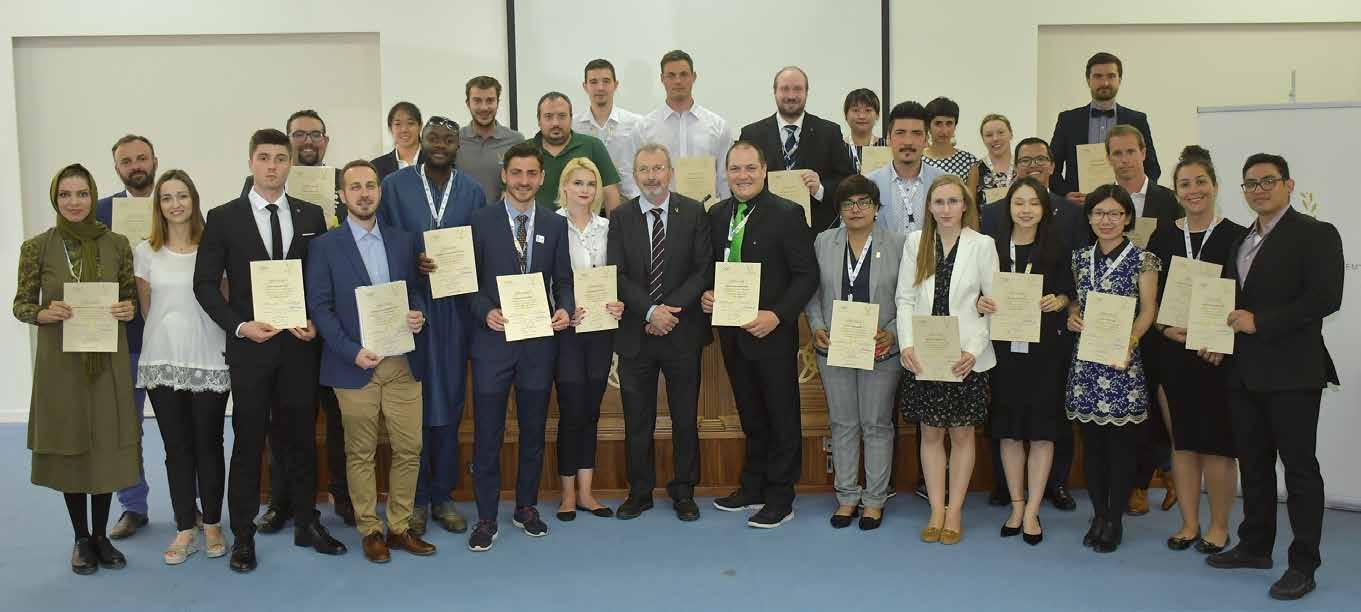
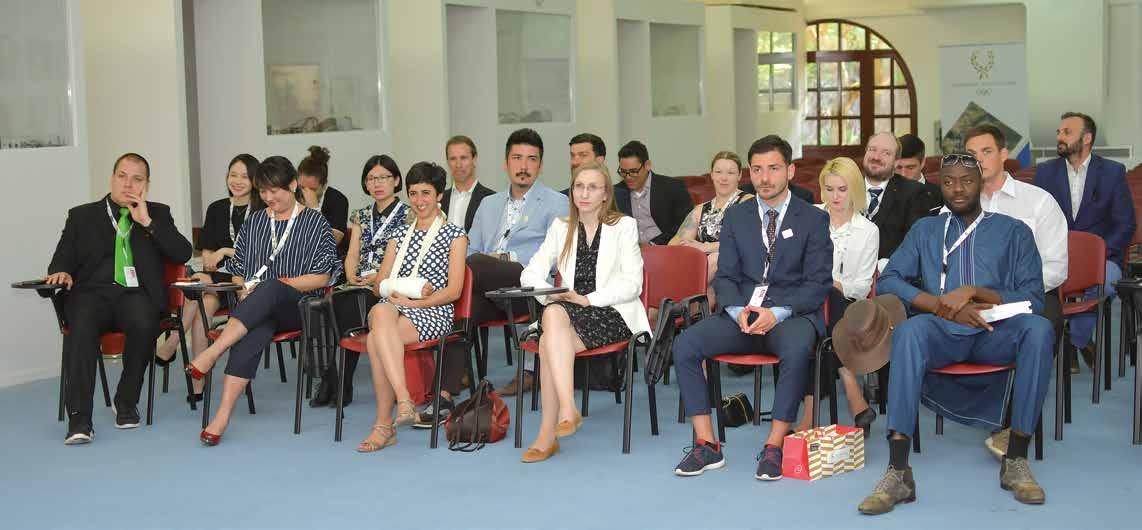
“The Opening Ceremony of the 26th International Seminar was jointly held with the Opening Ceremony of the 15th International Session for Presidents or Directors of National Olympic Academies.”
munication, gestion, organisation et marketing)», a été supervisé par le professeur Norbert Müller (GER), président du Comité international Pierre de Coubertin, qui a consacré sa vie à l’étude de l’œuvre du fondateur du Mouvement olympique moderne, Pierre de Coubertin; par le professeur John MacAloon (USA), anthropologue et historien dont les recherches portent sur la théorie de la performance culturelle et sur le Mouvement olympique moderne et les Jeux Olympiques; et par le professeur Konstantinos Georgiadis (GRE), doyen honoraire de l’AIO et professeur à l’Université du Péloponnèse, expert sur le sujet de la rénovation des Jeux Olympiques.
Les principaux sujets abordés au cours de ce cycle ont été l’histoire des Jeux Olympiques et les idéaux olympiques, les dimensions historiques des Jeux Olympiques, l’importance d’accueillir les Jeux Olympiques, la couverture des Jeux Olympiques modernes ainsi que les aspects éthiques et éducatifs dans la Charte olympique et dans l’Agenda 2020.
Les professeurs Irena Martinkova (CZE), Matthew Llewellyn (USA) et Yiannis Theodorakis (GRE) ont supervisé le troisième cycle, intitulé «Les questions
Les étudiants post-gradués avec leurs diplômes à la clôture du Séminaire.
34 – IOA Journal 16 01 01
The postgraduate students with their diplomas at the closing of the Seminar.
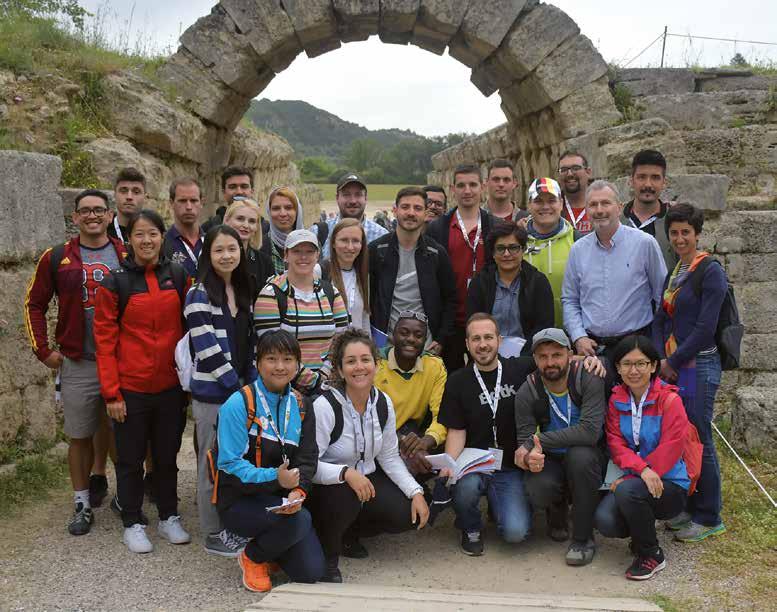
«La cérémonie d’ouverture du 26e Séminaire international s’est tenue conjointement avec la cérémonie d’ouverture de la 15e Session Internationale pour Présidents ou Directeurs des Académies Nationales Olympiques.»
Olympic Movement, Pierre de Coubertin, Professor Dr John MacAloon (USA), anthropologist and historian whose research focuses on cultural performance theory and on the modern Olympic Movement and Olympic Games, and Professor Dr Konstantinos Georgiadis (GRE), IOA Honorary Dean and Professor at the University of Peloponnese, whose expertise is on the revival of the Olympic Games.
The main subjects discussed during this cycle were the history of the Olympic Games and the Olympic ideals, the historical dimensions of the Olympic Games, the importance of hosting the Olympic Games, the coverage of the modern Olympic Games as well as the ethical and educational aspects in the Olympic Charter and in the Agenda 2020.
Professor Dr Irena Martinkova (CZE), Professor Dr Matthew Llewellyn (USA) and Professor Dr Yiannis Theodorakis (GRE) supervised the third cycle of subjects “The ethical and philosophical issues of Olympism as well as the athletes’ rights in the modern Olympic Movement”. The main topics discussed were: instrumentality of sport and its values, sport competition – war or peace?, Coubertin on sport and peace, choices athletes make, nationalism –amateurism – race and the modern Olympic Games, Olympic education, ethics in Sports and the role of the Olympic Movement against doping and changing attitude towards doping, what we learnt for Rio 2016, the role of the Olympic Movement in social inclusion – an exercise programme for refugees.
Apart from attending the lectures, the students presented their Seminar papers, visited the IOA library and participated daily in various sports activities and social events.
Overall, the 26th International Seminar was successfully conducted offering the students not only the opportunity to expand their knowledge on Olympism but also to make true and solid friendships. – J
éthiques et philosophiques de l’Olympisme, ainsi que les droits des athlètes dans le Mouvement olympique moderne». Les principaux sujets abordés ont été: l’instrumentalité du sport et ses valeurs; la compétition sportive – guerre ou paix?; Coubertin sur le sport et la paix; les choix des athlètes; Nationalisme – Amateurisme; la course et les Jeux Olympiques modernes; l’éducation olympique; l’éthique dans le sport et le rôle du Mouvement olympique concernant le dopage et le changement d’attitude envers le dopage; les leçons de Rio 2016; le rôle du Mouvement olympique dans l’inclusion sociale – un programme d’exercices pour les réfugiés.
Tout en ayant assisté aux conférences, les étudiants ont présenté leurs travaux de séminaire, visité la bibliothèque de l’AIO et participé quotidiennement à diverses activités sportives et sociales.
Dans l’ensemble, le 26e Séminaire international s’est déroulé avec succès, offrant aux étudiants non seulement l’occasion d’approfondir leurs connaissances sur l’Olympisme, mais aussi de nouer de vraies et solides amitiés. – J
IOA Journal 16 – 35
02
Olympia welcomes once more eminent PE Professors
Olympie accueille à nouveau d’éminents professeurs d’éducation physique
by Marilena Katsadoraki
par Marilena Katsadoraki
The 13th International Session for Educators of Higher Institutes of Physical Education was organised from 1st to 7th July 2019. Fifty-nine educators from 49 different universities arrived in Athens and departed the following day for Ancient Olympia.
The works of this year’s Session focused on “Olympic Truce as an Educational Tool for Peace”. The IOA President, Isidoros Kouvelos, in his opening address mentioned that “… the Session for Educators is perhaps the Session which offers the greatest contribution to the educational role of the Academy, since outstanding teachers are participating, whose chief duty is to educate the younger generation and shape through their programmes the correct, the balanced character, the ‘decent and honest’ person of ancient Greek philosophy, the model for which Olympism strives.”
University professors from all over the world attended the Session. Eight eminent lecturers were invited to share their knowledge with the participants who were vividly participating in the discussions after the lectures were concluded.
Professor Katerina Mouratidou, from Aristotle University, was the first lecturer and spoke about
La 13e Session Ιnternationale pour Éducateurs d’Instituts Supérieurs d’Éducation Physique s’est tenue du 1er au 7 juillet 2019. Cinquante-neuf éducateurs de 49 universités différentes sont arrivés à Athènes et sont partis le lendemain pour Ancienne Olympie.
Les travaux de la Session de cette année ont porté sur «La trêve olympique comme outil éducatif pour la paix». Dans son discours d’ouverture, le président de l’AIO, Isidoros Kouvelos, a indiqué que «... la Session pour éducateurs est peut-être la session qui offre la plus grande contribution au rôle éducatif de l’Académie, puisque des enseignants exceptionnels y participent, dont le devoir principal est d’éduquer la jeune génération et de former, à travers leurs programmes, la personne correcte, équilibrée, “honnête et décente” de la philosophie grecque antique, modèle auquel aspire l’Olympisme».
Des professeurs d’universités du monde entier ont assisté à la Session. Huit conférenciers éminents
36 – IOA Journal 16
01
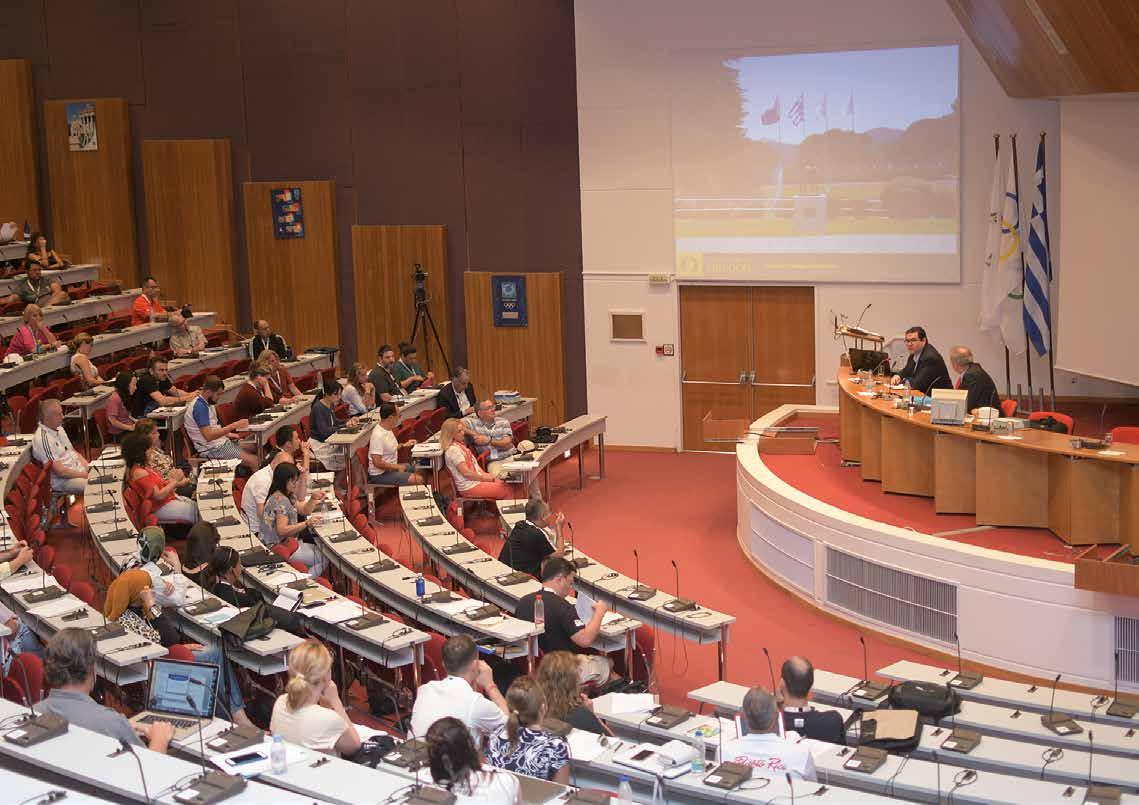
Les éducateurs ont déposé une couronne au monument
Jean Ketseas et Carl Diem.
The educators laid a wreath at the John Ketseas and Carl Diem monument. peace education as part of human rights education. She underlined that: “One of the fundamental aims of education is to produce students who are defenders of peace, in other words, to ‘initiate’ them into a society whose citizens can be productive, freely share their interests and concerns, use their time creatively, enjoy human rights and deal with confrontations
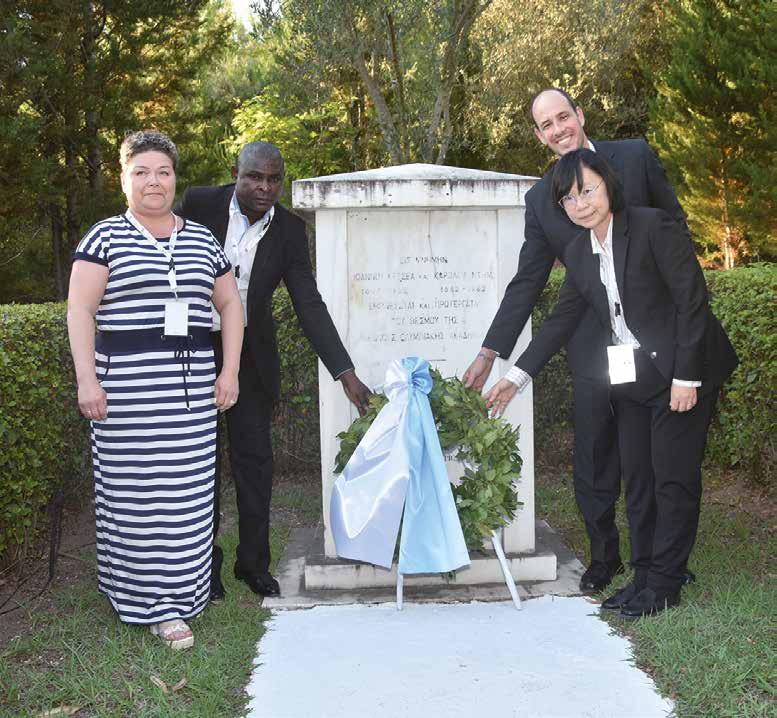
ont été invités à partager leurs connaissances avec les participants, qui ont participé activement aux discussions après la fin des conférences.
La professeure Katerina Mouratidou, de l’université Aristote, a été la première conférencière et a parlé de l’éducation pour la paix dans le cadre de l’éducation aux droits humains. Elle a souligné que «l’un des objectifs fondamentaux de l’éducation est de produire des élèves et des étudiants défenseurs de la paix, c’est-à-dire de les ‘initier’ à une société dont les citoyens peuvent être productifs, partager librement leurs intérêts et leurs préoccupations, utiliser leur temps de manière créative, jouir des droits humains et gérer les confrontations sans recourir à la force». Le professeur Daniel de la Cueva, de l’Institut Supérieur de Catamarca, a ensuite pris la parole et s’est concentré sur l’éducation pour la paix aux Jeux Olympiques de la Jeunesse. Il a noté: «Il est important de réaffirmer la nécessité de reconnaître l’éducation comme un droit de tous les enfants et de tous les jeunes – mais aussi la nécessité d’élargir la portée de ce droit, ainsi que la vision de l’éducation elle-même».
Le 3 juillet, les participants et les conférenciers ont profité d’une visite guidée au site et au musée archéologiques d’Olympie et ont été enchantés de voir le berceau des Jeux Olympiques. Dans l’après-midi, la professeure Ana Žnidarec Čučković, de l’université de kinésiologie de Zagreb, a présenté le manuel «Approches inclusives et novatrices pour l’éducation physique et la formation sportive», suivie par John Dorber, consultant en migration pour l’Accord Partiel Élargi sur le Sport (Conseil de l’Europe), qui a décrit le rôle du sport dans l’inclusion des migrants:
IOA Journal 16 – 37
01

“On the 3rd of July, the participants and the lecturers were guided to the archaeological site and the Museum of Ancient Olympia.”
«Le 3 juillet, les participants et les conférenciers ont profité d’une visite guidée au site et au musée archéologiques d’Olympie.»
without the use of force.” Professor Dr Daniel de la Cueva, from the Higher Institute of Catamarca, took the floor after her and focused on education for peace in the Youth Olympic Games. He stated that: “It is important to reaffirm the need to recognize education as a right of all children and youngsters – but also the need to broaden the focus of that right, together with the vision of education itself.”
On the 3rd of July, the participants and the lecturers were guided to the archaeological site and the Museum of Ancient Olympia and were thrilled to see the birthplace of the Olympic Games. In the afternoon, Professor Dr Ana Žnidarec Čučković, from the University of Kinesiology, Zagreb, presented the handbook “Inclusive and innovative approaches to PE and Sport Training”, followed by Mr John Dorber, Mi-
une perspective européenne. «Le Conseil de l’Europe est la première organisation de défense des droits de l’homme du continent, fondée sur les valeurs des droits de l’homme, de l’État de droit et de la démocratie», a-t-il déclaré. «La promotion de la diversité est une priorité permanente de l’Accord Partiel Élargi du Conseil de l’Europe sur le Sport depuis sa conception.»
Le 4 juillet, Thomas Gil, du Comité international des Jeux de la Francophonie, a parlé de l’histoire des Jeux et a donné un aperçu des éditions les plus ré-
38 – IOA Journal 16
de l’AIO.
gration Consultant for the Enlarged Partial Agreement on Sport, Council of Europe, who described the role of Sport in the facilitation of the inclusion of migrants: a European perspective. He said: “The Council of Europe is the continent’s leading human rights organization, based on the values of human rights, the rule of law, and democracy. The promotion of diversity is a permanent priority of the Council of Europe’s Enlarged Partial Agreement on Sport since its conception.”
On the 4th of July Mr Thomas Gil from the International Committee of Francophone Games, spoke about the history of the Games and gave an overview of the most recent ones. Professor Dr Li-Hong Hsu from the National University of Sport of Chinese Taipei, talked about the role of sports in social peace giving examples like the 1971 Ping-pong diplomacy, the 1995 Rugby World Cup and the 2018 PyeongChang Winter Olympics. Professor Dr Stephan Wassong from the German Sport University Cologne, gave a speech about Pierre de Coubertin and Internationalism. “Coubertin had profound knowledge on the ancient Olympic Games. Their tradition and reputation motivated him to think about their revival. But Coubertin did not want to introduce a mere copy of the ancient Olympic Games. His objective was to come up with a modern concept of the Olympic Games based on educational objectives; one of them was the strengthening of respect between nations.”
The last lecture of the Session was given by Dr Yoav Dubinsky, University of Oregon, on the subject of “Olympic Movement: Nation branding and public diplomacy”. He underlined that: “The international exposure, the focus on culture, and peaceful values in sports make the Olympic Games as useful political
centes. Le professeur Li-Hong Hsu, de l’université nationale du sport du Taipei chinois, a parlé du rôle du sport dans la paix sociale en donnant des exemples comme la diplomatie du ping-pong en 1971, la coupe du monde de rugby en 1995 et les Jeux Olympiques d’hiver de Pyeongchang en 2018. Le professeur Stephan Wassong, de l’Université allemande du sport de Cologne, a présenté une intervention sur Pierre de Coubertin et l’internationalisme. «Coubertin avait une connaissance approfondie des Jeux Olympiques de l’Antiquité. Leur tradition et leur réputation l’ont incité à concevoir leur renaissance. Mais Coubertin ne voulait pas introduire une simple copie des Jeux Olympiques de l’Antiquité. Son objectif était de proposer un concept moderne des Jeux Olympiques basé sur des objectifs éducatifs: l’un d’eux était le renforcement du respect entre les nations.»
La dernière conférence de la Session a été donnée par le Dr Yoav Dubinsky, de l’université de l’Oregon, sur le thème «Mouvement olympique: l’image de marque de la nation et la diplomatie publique». Il a souligné que «la visibilité internationale, l’accent mis sur la culture et les valeurs pacifiques dans le sport font des Jeux Olympiques un outil politique et de marque utile pour les gouvernements et les pays... Des personnes de croyances religieuses, de sexe, d’orientations, d’affiliations politiques, d’orientations sexuelles et de race différents sont toutes unies sur le même terrain, quelle que soit leur identité sociale.»

IOA Journal 16 – 39
02
the
Library. 02
Group discussion among the educators at
IOA
Discussion en groupe entre les éducateurs dans la bibliothèque
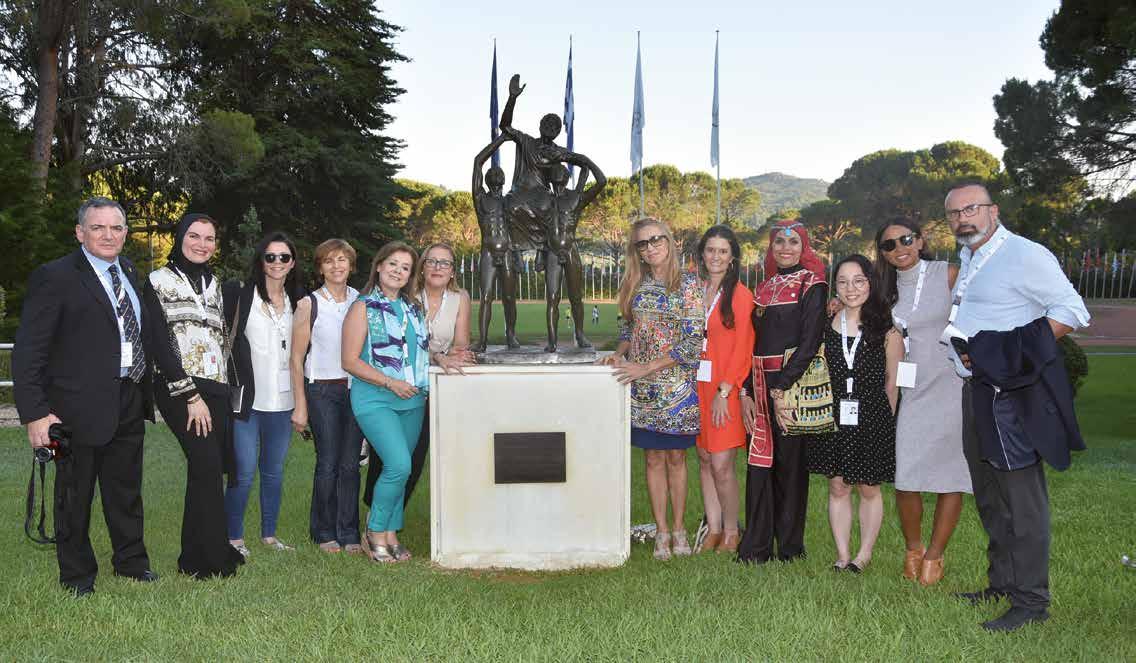

and branding tool for governments and countries... People from different religious beliefs, genders, orientations, political affiliations, sexual orientations, and races, all stand together on the same field regardless of their social identity.”
Along with the lectures and the workshops, the participants were divided in six discussion groups, one French speaking and five English speaking groups in order to discuss issues related to the lectures’ topics and draw their own conclusions. Overall the Session run smoothly and all the participants and the lecturers left Olympia with a sense of fulfillment. The lectures and the short presentations of the participants were interesting and opened new horizons for the Olympic Education. – J
En plus des conférences et des ateliers, les participants ont été divisés en six groupes de discussion, un francophone et cinq anglophones, afin de discuter des questions liées aux sujets des conférences et de tirer leurs propres conclusions. Dans l’ensemble, la Session s’est bien déroulée et tous les participants et les conférenciers ont quitté Olympie avec un sentiment d’accomplissement. Les conférences et les brèves présentations des participants ont été intéressantes et ont ouvert de nouveaux horizons pour l’éducation olympique. – J
The educators presented the conclusions derived from the discussion groups.
Les éducateurs ont présenté les conclusions des groupes de discussion.
40 – IOA Journal 16
03
03
“Olympic Diplomacy and Peace”
according to the Lecturers of the IOA Sessions – Extracts
«La Diplomatie olympique et la Paix»
selon les conférenciers/ères des Sessions de l’AIO – Extraits
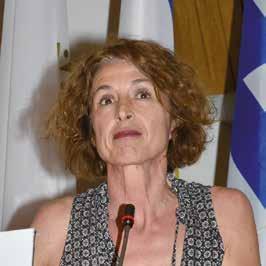
Dr Gelly Aroni (GRE)
Head of the Department for the Coordination and Monitoring of the Refugee Education, Ministry of Education, Research and Religious Affairs, Greece
Dr Gelly Aroni (GRE)
Chef du Département pour la coordination et la surveillance de l’éducation des réfugiés, Μinist re d’ ducation, de recherche et des affaires religieuses, Grèce
Sport and an active society without walls. Social inclusion of refugees through sport and physical activity
Le sport et une
société active sans cloisonnement. L’inclusion sociale des réfugiés grâce au sport et à l’activité physique
“Everyone understood that refugees needed education. But many people questioned their participation in sport while there were more urgent, vital issues and services to be provided by a state institution. ‘Isn’t sport a luxury for someone with more substantial, basic needs?’ Let us skip the often mentioned and generally accepted health and psychosocial benefits that sport and physical activity offer for all who regularly participate, and look at some additional positive effects for refugees and the hosting societies:
Individual gains: refugees can learn how to manage stress efficiently and to release their emotions (aggressions, frustrations, etc.) safely. Sports teach self-control and self-discipline, enhance life quality and wellbeing and create a sense of personal identity. Sport provides a positive way to spend free time – as refugees often lack positive outlets for their energy and positive environments where they can enjoy themselves and have fun. In addition, sport, leisure and play can have restorative and healing qualities for the psychological rehabilitation of refugees (particularly unaccompanied children and teenagers) not only because play is therapeutic, but also because play is an inherent part of traditions and community and can create a sense of normalcy for people living in extraordinary situations.”
“Social gains: refugees who participate in sports and physical activity tackle isolation, build
«Tout le monde était d’accord sur le fait que les réfugiés avaient besoin d’éducation. Mais pourquoi recommander leur participation au sport alors qu’ils avaient d’autres problèmes plus vitaux et plus urgents à résoudre, et une institution étatique n’avait-elle pas d’autres services plus essentiels à fournir? ‘Le sport n’est-il pas un luxe pour quelqu’un qui a de plus graves besoins?’ Oublions pour un instant les bienfaits que le sport représente pour la santé de tous ceux qui exercent régulièrement une activité sportive et examinons certains effets positifs supplémentaires pour les réfugiés ainsi que pour les sociétés des pays d’accueil:
Avantages individuels: les réfugiés peuvent, grâce au sport, apprendre comment gérer leur stress de manière efficace et apprendre aussi à libérer leurs émotions (sentiments d’agression, de frustration, etc.). Le sport enseigne le contrôle de soi et l’autodiscipline, améliore la qualité de vie, le bien-être et renforce le sentiment identitaire. Les réfugiés n’ont guère de lieux et de moyens de défouler leur énergie ni d’environnements positifs où pouvoir tout simplement s’amuser. En outre le sport, les activités récréatives et le jeu ont des propriétés thérapeutiques et facilitent la réadaptation psychologique des réfugiés (en particulier celle des enfants et des adolescents), parce que le jeu fait partie des traditions d’une communauté et peut
IOA Journal 16 – 41
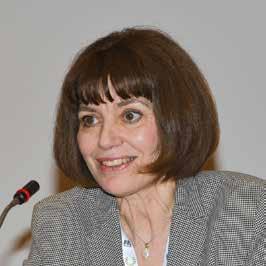 Prof. Christina Koulouri (GRE)
Professor in Modern and Contemporary History, Head of the Department of Political Science and History, Panteion University of Social and Political Sciences
Prof. Christina Koulouri (GRE)
Professor in Modern and Contemporary History, Head of the Department of Political Science and History, Panteion University of Social and Political Sciences
Prof. Christina Koulouri (GRE)
Professeure d’histoire moderne et contemporaine, chef du Département de science politique et d’histoire, université Panteion de sciences sociales et politiques
social networks and create a sense of belonging. Sport offers them a fun alternative to inactivity, boredom, and, in more extreme cases, to filling in time in order to reduce the incidence of negative anti-social activities (e.g. substance abuse, delinquency, criminal activity, etc.).
Community gains: sport and physical activity function as a vehicle of communication between refugees and host communities as they provide an icebreaking effect. They are a non-threatening way to bring people into direct contact with people from other groups and cultures and thereby work against racism and xenophobia. Sport and physical activity can provide structure as even the simplest sport activity is defined by some kind of framework or rules. Sport activities help young people learn to follow procedures and rules and to deal with authority.”
créer un sentiment de normalité dans des situations inhabituelles.»
«Avantages sociaux: les réfugiés qui font du sport ou participent à une activité physique sortent de leur isolement, se font des amis sur les réseaux sociaux et créent un sens d’appartenance. Le sport leur offre une alternative amusante à l’inactivité, l’ennui, et dans des cas plus extrêmes, permet de réduire l’incidence des activités sociales négatives (drogue, délinquance, activités criminelles, etc.).
Avantages pour la communauté: le sport et les activités physiques fonctionnent comme un véhicule de communication entre les réfugiés et les communautés d’accueil; le sport permet de “briser la glace”. Il représente un moyen non menaçant de mettre en contact les personnes d’un groupe avec des membres d’un autre groupe et d’une autre culture et de lutter ainsi contre le racisme et la xénophobie. Le sport et les activités physiques constituent une sorte de structure, car même l’activité sportive la plus simple doit toujours respecter certaines procédures et obéir à des règles. Les activités sportives aident les jeunes à apprendre à suivre les procédures et à respecter une autorité.»
Olympism and Peace Education: a historical analysis
Olympisme et éducation pour la paix: une analyse historique
“As long as Olympism evolves, it systematically establishes a system of values and invents a language of symbols and rituals that give physical substance to the abstract pacifist content of its ideology and make it accessible to those who participate in the Olympics event solely as spectators. Such symbols include the Olympic rings and the Olympic flag, the Olympic anthem and the Olympic oath, whilst rituals such as the torch relay, the opening and closing ceremonies of the Games, and the parade of athletes incorporated into them play a similar role. The Olympic rings, which are also depicted on the Olympic flag, were designed by Coubertin himself in 1913 and were presented in the 6th International Olympic Congress in Paris in 1914, which celebrated the twentieth anniversary of the Olympic movement. The five rings, in five different colours, symbolize ‘the five parts of the world’ and together with the white of the flag, all nations without exception. Therefore, it is a ‘truly international emblem’: all nations and all continents are represented without distinctions in the international institution of the Olympic Games. The doves released during the closing ceremony of the first Athens Olympic
«Au fur et à mesure que l’Olympisme évolue, il met en place de manière plus systématique son système de valeurs et conçoit le langage des symboles et des rituels qui donnent corps au contenu pacifiste et abstrait de son idéologie en la rapprochant de ceux qui participaient à l’activité olympique uniquement à titre de spectateur. Ces symboles incluent les anneaux olympiques et le drapeau olympique, l’hymne olympique et le serment olympique; un rôle équivalent est assumé par les rituels tels que le relais de la flamme, les cérémonies d’ouverture et de clôture des Jeux qui comportent le défilé des athlètes. Les anneaux olympiques, qui figurent également sur le drapeau olympique, ont été conçus par Coubertin lui-même en 1913; ils ont été présentés au VIe Congrès International Olympique de Paris en 1914, qui célébrait les 20 ans du Mouvement olympique. Les cinq anneaux, de cinq couleurs différentes, représentaient les “cinq parties du monde”, et le fond blanc du drapeau, “toutes les nations sans exception”. Il s’agit donc d’un “emblème vraiment international”: toutes les nations et tous les continents étaient représentés dans l’institution internationale des Jeux Olympiques. Les colombes lâchées
42 – IOA Journal 16
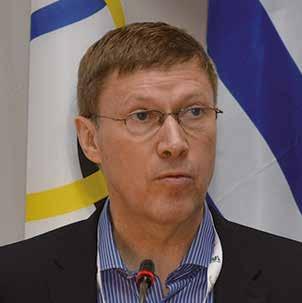
Yves Le Lostecque (FRA) Head of the Sport Unit, Directorate General for Education and Culture, European Commission
Yves Le Lostecque (FRA)
Chef de l’unité Sport, Direction générale de l’éducation et de la culture, Commission européenne
Games and subsequently in the opening ceremonies from 1920, also alluded to peace.”
“Obviously, peace education is not the subject of a class, but rather a common educational theme that runs through all classes of the curriculum. It is not realistic to pursue the development of moral values and mindsets in children by teaching them only one course. Olympic education, therefore, must work together and communicate with other subjects, investing more in the practical rather than the theoretical aspect of learning. It is more likely that the children pick up on behaviour through sports, rather than books and to apply it outside of school. There is a serious issue to be addressed when we implement an Olympic education programme with global aspirations. How do we apply a system of common moral values and cultural models – of Olympism in the case at hand – in all countries and all nations worldwide? It is different to impose a set of rules according to which a sports event will be carried out and different for these rules to be moral considerations, on whose basis people act in their social life, outside the stadium and the sporting field. Nonetheless, peace with all the behaviours that it entails, is the sole Olympic value that can be considered as truly global, beyond cultural differences, and which, through the global Olympic movement, may touch any corner of the planet.”
lors de la cérémonie de clôture des premiers Jeux Olympiques d’Athènes et ensuite lors des cérémonies d’ouverture de toutes les éditions des Jeux à partir de 1920, symbolisaient la paix.»
«Il est clair que l’éducation à la paix ne fait pas l’objet d’un seul cours mais constitue l’axe pédagogique commun à toutes les matières du cursus. Il n’est pas réaliste de tenter de développer des valeurs morales et des attitudes auprès des enfants en leur enseignant une seule matière. L’éducation olympique doit donc collaborer et communiquer avec les autres matières, en investissant davantage dans l’aspect pratique plutôt que dans l’aspect théorique de l’apprentissage. Les enfants ont plus de chances d’adopter des comportements à travers l’activité sportive qu’à travers les livres, et aussi de les mettre en pratique dans leur vie extrascolaire. Une question importante se pose évidemment lorsqu’on met en place un programme d’éducation olympique dont les ambitions sont mondiales. Comment mettre en œuvre un système de valeurs morales et des modèles culturels communs – l’Olympisme en l’occurrence – dans tous les pays et toutes les nations du monde? Imposer un ensemble de règles qui régissent une compétition sportive est une chose, mais que ces règles deviennent des principes moraux en vertu desquels les individus se comportent dans leur vie sociale, loin des stades et des terrains, en est une autre. Quoi qu’il en soit, la paix, avec tous les comportements qui y sont associés, est la seule valeur olympique qui peut être considérée comme vraiment universelle, au-delà des différences culturelles, et qui peut atteindre tous les coins de la planète, par le biais du mouvement olympique mondial.»
The external dimension of the EU Sport Diplomacy
La dimension extérieure de la diplomatie sportive de l’UE
“It is clear that European sport is undergoing substantial changes and facing new challenges which are are largely common to other continents: increased commercialisation which brings more funding but also new dangers into sport, necessity to integrate migrants and refugees, more awareness of the sustainability and environmental concerns, increased strength of private actors challenging traditional federations and keen to create private leagues, development of new technologies, etc.
These evolutions take place in a context where we can notice worrying trends in the level of physical activity of European citizens as well as changes in the ways of practising sport: more individualism clearly... I would add that sport is no longer seen as being a purely leisure or well-being activity but more and more as a major tool of integration and education. Sport is also a major concern for politicians because of its major
«Il est clair que le sport européen connaît de profonds changements et se trouve confronté à de nouveaux défis qui sont largement partagés par d’autres continents: la commercialisation accrue qui apporte au sport plus de fonds mais également de nouveaux dangers, la nécessité d’intégrer les immigrés et les réfugiés, une plus grande sensibilisation à la durabilité et aux problèmes environnementaux, la puissance croissante des acteurs privés qui remettent en cause les fédérations traditionnelles et qui désirent créer des ligues privées, le développement de nouvelles technologies, etc. Ces évolutions ont lieu dans un contexte où nous observons des tendances inquiétantes en ce qui concerne l’activité physique des citoyens européens, ainsi que des changements dans la pratique sportive: un plus grand individualisme… J’ajouterai que le sport n’est plus considéré exclusivement comme une activité de loisir ou de bien-être, mais de plus en
IOA Journal 16 – 43
 George Papandreou (GRE)
George Papandreou (GRE)
Former Prime Minister of Greece, Vice-President of the International Olympic Truce Foundation
Georges Papandreou (GRE)
Ancien Premier ministre de la Grèce, vice-président de la Fondation Internationale pour la Trêve Olympique
impact and the interest it generates in the population. Everybody is interested, and most of the time passionate, about sport.
I consider that we have a lot to learn from sport in international cooperation. Major sport organisations and federations have for a long time been organising themselves at international level and put in place umbrella structures. They have put in place international events and competitions. They have adopted common rules including the ‘rules of the game’. Given this, sport is a powerful tool in helping to ensure cooperation among countries, in promoting common Values, and more generally, soft diplomacy.”
plus comme un instrument majeur d’intégration et d’éducation. Par ailleurs, le sport préoccupe beaucoup les politiciens en raison de son énorme impact et de l’intérêt qu’il suscite auprès de la population. Chacun est désormais intéressé au sport, voire même passionné de sport.
Je considère que nous avons beaucoup à apprendre du sport dans le cadre de la coopération internationale. Les organisations et les fédérations sportives majeures ont depuis longtemps développé des activités internationales en créant des structures “parapluie”. Elles ont lancé des compétitions sportives et des événements internationaux. Elles ont adopté des règles communes, y compris les “règles du jeu”. Le sport est devenu un instrument puissant qui contribue à la coopération entre pays, à la promotion des valeurs communes et, de manière générale, de la diplomatie douce.»
Olympic Truce as an international institution
La trêve olympique comme une institution internationale
“Sport is in a unique position to put the spirit of the Olympic Truce into practice. Sport is the only area of human existence that has achieved universal law. Regardless of where in the world we practise sport, the rules are the same and apply to everyone. They are based on our shared values. Sport is always about building bridges; it is never about erecting walls. In Olympic sport, all people are equal, regardless of their race, gender, social status, cultural background, faith or belief. This fundamental principle of non-discrimination allows sport to promote peace and understanding among all people.”
“The Olympic values (excellence, friendship, respect) are the prerequisite not only for moving our societies forward, but also for restraining or defusing conflicts or disputes which, in addition to their other tragic consequences, destabilise entire countries or regions. Conflicts that are waged for years. And because of them, we are running the danger of losing generations of young men and women who are imbued with hatred and intolerance; young men and women who learn the art of war and fight in war zones from their early years; young men and women who learn to handle a weapon better than they use a ball, and they believe that the things that divide people are greater than the things that unite them.
In contrast, we strongly believe that the things that unite us are greater than the things that divide us!”
«Le sport est dans une position unique pour mettre en pratique l’esprit de la Trêve olympique. Le sport est le seul domaine de l’existence humaine qui a établi un droit universel. Quel que soit l’endroit dans le monde où nous pratiquons le sport, les règles sont les mêmes et valables pour tous. Elles sont fondées sur nos valeurs communes. Le sport vise toujours la construction de ponts et non de murs. Dans le sport olympique, toutes les personnes sont égales, sans distinction de race, de sexe, de statut social, d’origine culturelle, de foi ou de croyance. Ce principe fondamental de non-discrimination permet au sport de promouvoir la paix et la compréhension entre les peuples.»
«Les valeurs olympiques (excellence, amitié, respect) sont la condition préalable non seulement pour faire avancer nos sociétés, mais aussi pour contenir ou désamorcer les conflits ou les différends qui, outre leurs autres conséquences tragiques, déstabilisent des pays ou des régions entières. Des conflits qui durent des années. Et à cause d’eux, nous courons le danger de perdre des générations de jeunes hommes et de jeunes femmes qui sont imprégnés de haine et d’intolérance; des jeunes hommes et jeunes femmes qui apprennent l’art de la guerre et du combat dans les zones de guerre dès leur jeune âge; des jeunes hommes et jeunes femmes qui apprennent à mieux utiliser une arme que le ballon, et qui croient que les choses qui divisent les gens sont plus importantes que celles qui les unissent.
Au contraire, nous croyons fermement que les choses qui nous unissent sont plus importantes que celles qui nous divisent!»
44 – IOA Journal 16
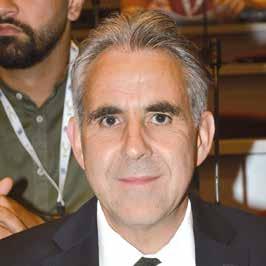
Dr Stephan Wassong (GER)
Head of Institute of Sport History, Director of the Olympic Studies Centre, German Sport University Cologne
Dr Stephan Wassong (GER)
Directeur de l’Institut d’histoire du sport, directeur du Centre d’études olympiques, université du Sport de Cologne
Pierre de Coubertin and Internationalism
Pierre de Coubertin et internationalisme
“Coubertin transferred the idea of the World Fairs as a platform for international exchange in the fields of technology, science and culture and the educational intentions of World Peace Congresses to the life of sport. For Coubertin it was worth turning to sport as a means to foster international understanding. Sport enjoyed a high popularity in societies in Europe and even beyond; it was already an international phenomenon in the fading years of the 19th century and technical innovations in communication and transport had tentatively promoted the organization of international sport meetings. The invention of the modern Olympic Games should further promote this development and should also link it with the development of an educationally motivated internationalism. According to Coubertin the competition at the Olympic Games should provide the chance of presenting one’s own nation with dignity as well as getting to know the characteristics of other nations. Coubertin supposed that this would contribute to the development of mutual respect which he regarded as a central vehicle for the prevention of conflict.”
“By having analyzed Coubertin’s appreciation of an educational internationalism he can be portrayed as a far-sighted and progressively minded educator. Of course, sport was always in the center of his educational thinking. Coubertin transferred to sport the concept of the World Fairs and the educational initiatives of the World Peace Congresses to strengthen respect between the nations as a possible contribution to conflict resolution. It has been a central basis of the Olympic Movement from its beginning. One hundred twenty-five years after its founding congress at the Sorbonne in 1894, it is still visible today and even coins the uniqueness of the Olympic Movement.”
“Educational Internationalism was a central objective of Coubertin for the founding of the modern Olympic Movement. It has developed into a central pillar of the Olympic Movement`s importance as a sustainable platform for civil society exchange processes. This platform retains its impact even if dialogues at the political level tend to counter the expansion of rapprochement processes. One has to give credit to this as it demonstrates the global value of the Olympic Movement and its strength to act autonomously.”
«Coubertin a transféré au monde du sport cette idée lancée par l’Exposition universelle, qui était de constituer une plateforme d’échanges dans les domaines de la technologie, de la science, de la culture et de l’éducation. Pour Coubertin le sport était un moyen d’améliorer la compréhension internationale. Le sport était extrêmement populaire dans les sociétés européennes et même extra-européennes; il constituait déjà un phénomène international dans les dernières années du 19ème siècle. Les nouvelles techniques en matière de communication et de transport avaient déjà encouragé les premières tentatives de compétitions sportives internationales. L’invention des Jeux Olympiques modernes allait encourager davantage encore ce développement – qu’il faut également associer avec le développement d’un internationalisme fondé sur l’éducation. Selon Coubertin, le fait de participer à une compétition aux Jeux Olympiques donnait aux sportifs l’occasion de représenter leur propre pays avec dignité et d’apprendre à connaître les caractéristiques d’autres nations. Coubertin soutenait que cela développerait le respect mutuel, qu’il considérait comme un instrument essentiel de la prévention des conflits.»
«À voir à quel point Coubertin appréciait l’internationalisme éducatif, on peut certainement le décrire comme un pédagogue visionnaire et progressiste. Certes, le sport a toujours été au cœur de sa conception de l’éducation. Coubertin a transféré au sport le concept qui était à la base des expositions universelles et des initiatives éducatives des Congrès universels de la Paix, qui avaient toutes pour but de renforcer le respect entre les nations et de contribuer ainsi à la prévention des conflits. Cette notion est la pierre angulaire du Mouvement olympique depuis sa création. Cent vingt-cinq ans après le congrès de la Sorbonne de 1894 au cours duquel le Mouvement a été fondé, cette notion est encore visible aujourd’hui et c’est elle qui rend si unique le Mouvement olympique.»
«L’internationalisme éducatif était au centre du projet de Coubertin lorsqu’il a fondé le Mouvement olympique moderne. Il en a fait le pilier central de l’action du Mouvement olympique en tant que solide plateforme pour les échanges culturels entre les sociétés civiles. Cette plateforme continue d’exister et reste importante même si les dialogues au niveau politique semblent aller à l’encontre du processus de rapprochement. Il faut le reconnaître, car cela prouve une fois de plus la valeur mondiale du Mouvement olympique et sa capacité d’autonomie.»
IOA Journal 16 – 45
The CHS of Harvard Universit at the IOA
8th International Scholars’ Symposium “Sports, Societ, & Culture”
Le Centre d’Études Helléniques de l’université Harvard à l’AIO
8e Symposium Scientifque International «Sport, Société & Culture»
by Christina Lafi
par Christina Lafi
The International Olympic Academy, in cooperation with Harvard’s Center for Hellenic Studies in Washington DC (CHS DC), and with the support of Harvard’s Center for Hellenic Studies in Greece (CHS Greece), organized the 8th Annual International Scholars’ Symposium on “Sports, Society, and Culture” in Ancient Olympia, from July 10 to 14, 2019. As in previous years, the Symposium brought together more than seventy students and professors from universities in Greece, Cyprus and other European countries, as well as USA and Canada. The topic of the 2019 Symposium was “Language and Athletics: The Many Discourses of Sport” and examined the multiplicity of discourses pertaining to language and athletics from antiquity to our times.
The Symposium commenced with welcoming remarks by Dionyssis Gangas, Member of the IOC Culture and Olympic Heritage Commission and Advisor to the IOA President, and by Stamatia Dova, Profes-
L’Académie Internationale Olympique, en coopération avec le Centre d’Études Helléniques (CHS DC) de l’université Harvard à Washington, et avec le soutien du Centre d’Études Helléniques en Grèce (CHS Greece), a organisé le 8e Symposium Scientifique International annuel «Sport, Société et Culture», qui s’est tenu à Ancienne Olympie du 10 au 14 juillet 2019. Comme les années précédentes, le Symposium a rassemblé plus de 70 étudiants et professeurs d’universités de Grèce, de Chypre et d’autres pays européens, ainsi que des États-Unis et du Canada. Le Symposium de 2019 a porté sur le thème «Langage et athlétisme: les nombreux discours sur le Sport» et a examiné la multiplicité des discours sur le langage et l’athlétisme de l’Antiquité à nos jours.
Le Symposium a débuté par un mot de bienvenue de Dionyssis Gangas, membre de la Commission de la Culture et du Patrimoine Olympique du CIO et conseiller auprès du président de l’AIO, ainsi que de
46 – IOA Journal 16
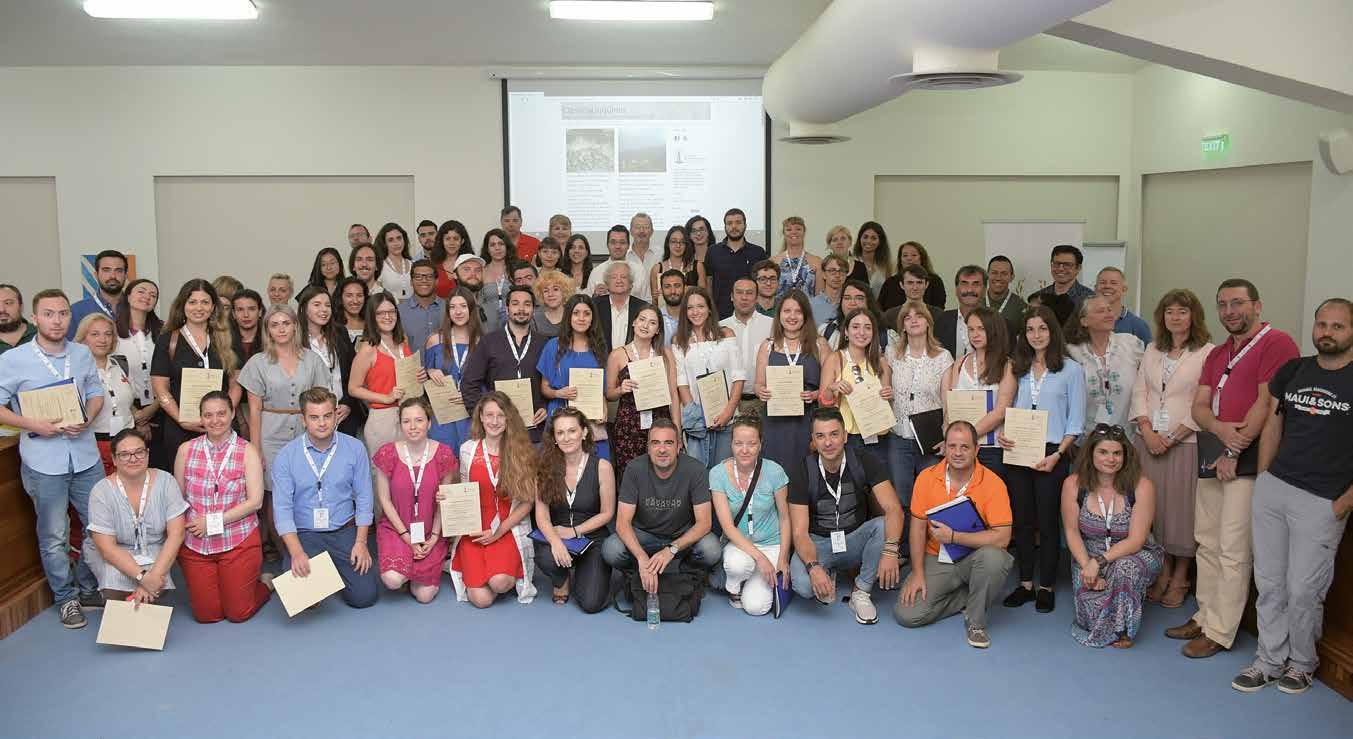
“Τhe Symposium brought together more than seventy students and professors.”
«Le Symposium a rassemblé plus de 70 étudiants et professeurs.»
The students have just received their certificates of attendance at the Symposium.
Les étudiants viennent de recevoir leurs certificats de participation au Symposium.
sor at the Hellenic College Holly Cross, and Charles Stocking, Professor at the University of Western Ontario, Canada, both Fellows of CHS DC and Academic Coordinators of the Symposium.
The sessions consisted of the following lectures:
- Gregory Nagy, “Thoughts about Poetic Language that links Heroes to Athletes”
- Stamatia Dova, “Who Needs Words? The Chemistry of ὅμιλος and the Universal Language of Sport”
- Charles Stocking, “Ancient Athletics and the Language of Mind-Body Dualism”
- Damian Stocking, “The Ecstatic Community: The ‘Logic’ of Athletic Victory and the Poetics of the Ode”
- Michael Joseph Gross, “Stronger: The Meeting of Muscle and Mind”
- Maša Culumovic, “Εἰ πόνος ἦν, τὸ τερπνὸν πλέον πεδέρχεται: the Language of Athletics in Pindar’s Epinicians”.
For the first time in the Symposium series, a call for papers through submission of abstracts to postgraduate students and PhD candidates for participation in a student panel was announced, and three stu-
Stamatia Dova, professeure au Hellenic College Holly Cross, et de Charles Stocking, professeur à l’université de Western Ontario, Canada, tous les deux Fellows du CHS DC et coordinateurs académiques du Symposium.
Les séances comprenaient les exposés suivants:
- Gregory Nagy, «Réflexions sur le langage poétique qui relie les héros aux athlètes»
- Stamatia Dova, «Qui a besoin de mots? La chimie de ὅμιλος et le langage universel du sport»
- Charles Stocking, «L’athlétisme ancien et le langage du dualisme esprit-corps»
- Damian Stocking, «La communauté extatique: La “logique” de la victoire athlétique et la poétique de l’Ode»
- Michael Joseph Gross, «Plus fort: la rencontre du muscle et de l’esprit»
- Maša Culumovic, «Εἰ πόνος ἦν, τὸ
IOA Journal 16 – 47
01
01
τερπνὸν πλέον

dents were selected to present part of their research work. The graduate student session consisted of the following lectures:
- Efstathia Athanasopoulou, “Satyr Drama’s Rival: Sports”
- Charisios Efstratiou, “Sport metaphors in The Persians of Aeschylus” (original research and related results belong to the research project developed by Dr. Ioanna N. Papadopoulou, Tenure Assistant Professor of Classics, Department of Greek Literature, Democritus University of Thrace, under whose support the respective candidate conducts related research)
- Panagiotis Viopoulos, “Defining gender in sports competitions: the Caster Semenya award of CAS as a social and human rights issue”
All abstracts of presentations are available at https://greece.chs.harvard.edu.
A visit of the archaeological site and the Museum of Ancient Olympia was the starting point of the Symposium’s works, where participants benefited from a specially designed tour that enhanced the themes of the lectures and conveyed context for the sessions of presentations. During morning and afternoon workshops, an indispensable part of the Symposium’s program, participants were divided into smaller groups and engaged in discussion, developing and broadening the thematic components of the Symposium, and drawing connections with contemporary issues. The Symposium ended with closing remarks by Gregory Nagy, Director of the Center for Hellenic Studies and Professor at Harvard University, Professors Charles Stocking and Stamatia Dova, Academic Coordinators of the Symposium and Professor Konstantinos Georgiadis, Honorary Dean of the International Olympic Academy.
The Administrative Coordinators of the Symposium were Marilena Katsadoraki, Sessions’ Coordinator, from the IOA, and Christina Lafi, Projects and Content Development Manager, and Tasos Karameros, Programs Assistant, from the CHS.
Throughout their stay at the IOA premises, participants benefited from a strong academic, inter-
πεδέρχεται: le langage de l’athlétisme dans les épinicies de Pindare».
Pour la première fois dans la série des Symposiums, les étudiants post-gradués et les doctorants ont été invités à présenter des résumés pour leur participation à un panel d’étudiants, et trois étudiants ont été sélectionnés pour présenter une partie de leur travail de recherche. La session des étudiants diplômés comprenait les exposés suivants:
- Efstathia Athanasopoulou, «Le rival du drame satyrique: le Sport».
- Charisios Efstratiou, «Les métaphores sportives dans Les Perses d’Eschyle» (la recherche originale et les résultats correspondants font partie du programme de recherche développé par Ioanna N. Papadopoulou, docteure et professeure assistante titularisée de lettres classiques, Département de littérature grecque, université Démocrite de Thrace, dont le soutien permet au candidat concerné de mener des recherches connexes).
- Panagiotis Viopoulos, «Définir le genre dans les compétitions sportives: le prix Caster Semenya du TAS, en tant que question sociale et de droits humains».
The students were discussing on the themes of the Symposium during the workshops.
Les étudiants discutaient des thèmes du Symposium pendant les ateliers.
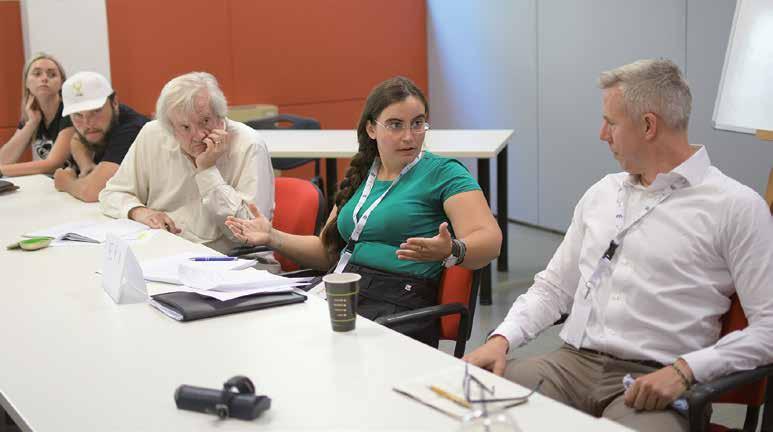
48 – IOA Journal 16
02 02
03
Gregory Nagy, Director of the Center for Hellenic Studies and Professor at Harvard University.
Gregory Nagy, directeur du Centre d’Études Helléniques et professeur à l’université Harvard.
04
Lecture by the Academic Coordinator of the Symposium, Prof. Charles Stocking.
Conférence du professeur
Charles Stocking, coordinateur académique du Symposium.
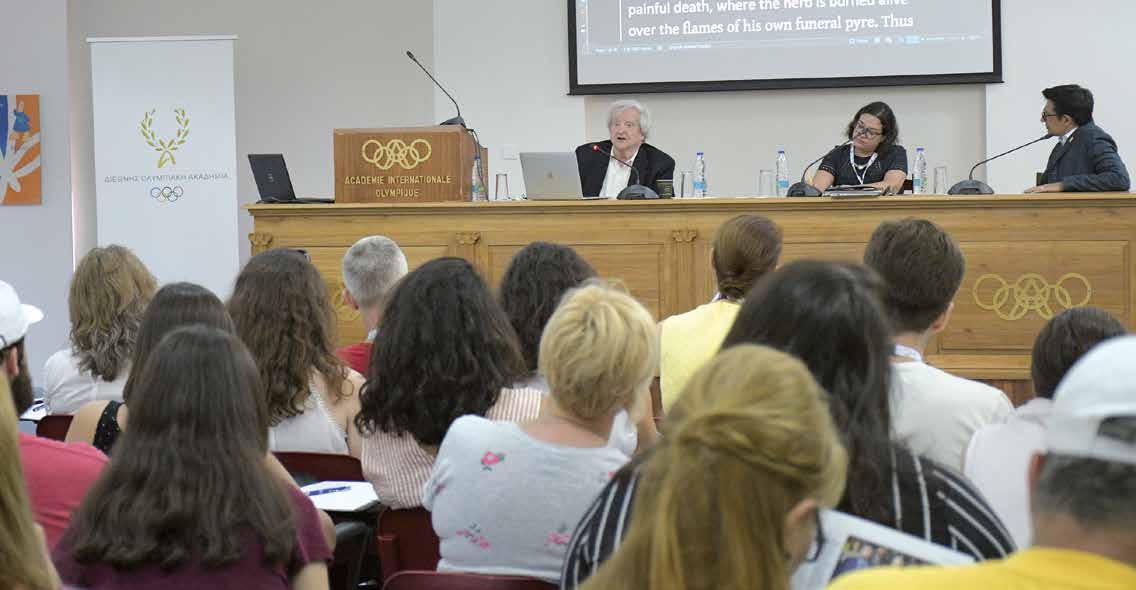

04
Tous les résumés des présentations sont disponibles à l’adresse: https://greece.harvard.edu
Le Symposium a démarré par la visite du musée et du site archéologique d’Ancienne Olympie, avec un tour spécialement conçu pour les participants, ce qui a enrichi le contenu et les thèmes des présentations aux sessions. Pendant les ateliers du matin et de l’après-midi – une partie importante du programme du Symposium – les participants ont été divisés en groupes et ont engagé des discussions en développant et en élargissant les thèmes du Symposium et en établissant des liens avec des questions contemporaines. Le Symposium s’est terminé sur les remarques de clôture de Gregory Nagy, directeur du Centre d’Études Helléniques et professeur à l’université Harvard, des professeurs Charles Stocking et Stamatia Dova, coordinateurs académiques du Symposium, ainsi que du professeur Konstantinos Georgiadis, doyen honoraire de l’Académie Internationale Olympique.
Les coordinateurs administratifs du Symposium étaient Marilena Katsadoraki, coordinatrice de Sessions représentant l’AIO, et Christina Lafi, responsable du développement et du contenu des projets et Tasos Karamenos, assistant de programmes, représentant le CEH.
disciplinary, and multicultural environment that allowed them to engage in meaningful dialogue with faculty and fellow students, as it was expressed in the assessment at the end of the Symposium. The IOA and the CHS have established an ongoing collaboration and are working together in the design of future iterations.
The travel from Athens to Ancient Olympia, stay and academic works are kindly offered by the IOA and the CHS. – J
Tout au long de leur séjour dans les locaux de l’AIO, les participants ont profité d’un riche environnement académique, interdisciplinaire et multiculturel qui leur a permis de s’engager dans un dialogue significatif entre professeurs et étudiants, et cela a été souligné dans l’évaluation finale du Symposium. L’AIO et le CEH ont établi une collaboration continue et travaillent ensemble pour préparer les futures éditions de l’événement.
Le voyage d’Athènes à Ancienne Olympie, le séjour et la partie académique ont été généreusement offerts par l’AIO et le CEH. – J
IOA Journal 16 – 49
03
NOC Culture and Education Champions’ Netork
Réseau des Champions de la Culture et de l'Éducation des CNO
Based on the recommendations 22 and 26 of the Olympic Agenda 2020, The Olympic Foundation for Culture and Heritage organised the 1st General Assembly of the NOC Culture and Education Champions’ Network, led by Mr Ching-Kuo Wu, Chair of the IOC Culture and Olympic Heritage Commission and by Mr Francis Gabet, Director, on the IOA premises in Olympia, Greece, from 20 to 23 May 2019.
Seventy-seven delegates representing 69 NOCs were present.
During the General Assembly, the NOC Culture and Education Champions participated in working groups on Olympic Culture and Education within the NOC in their country, exchanged experiences in the field and provided feedback for cultural and educational activities amongst others.
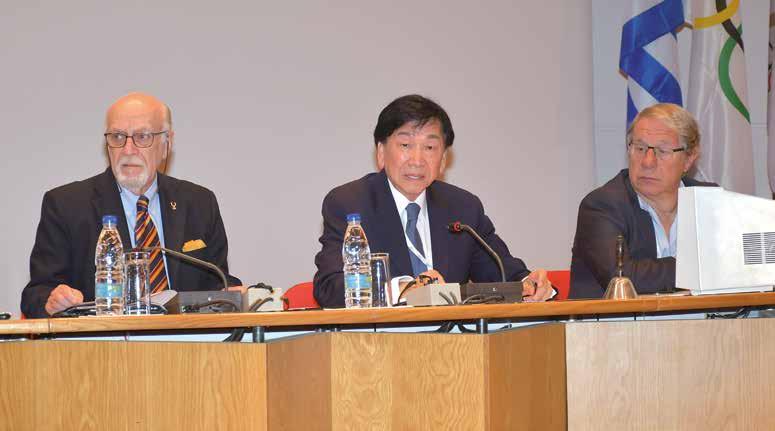
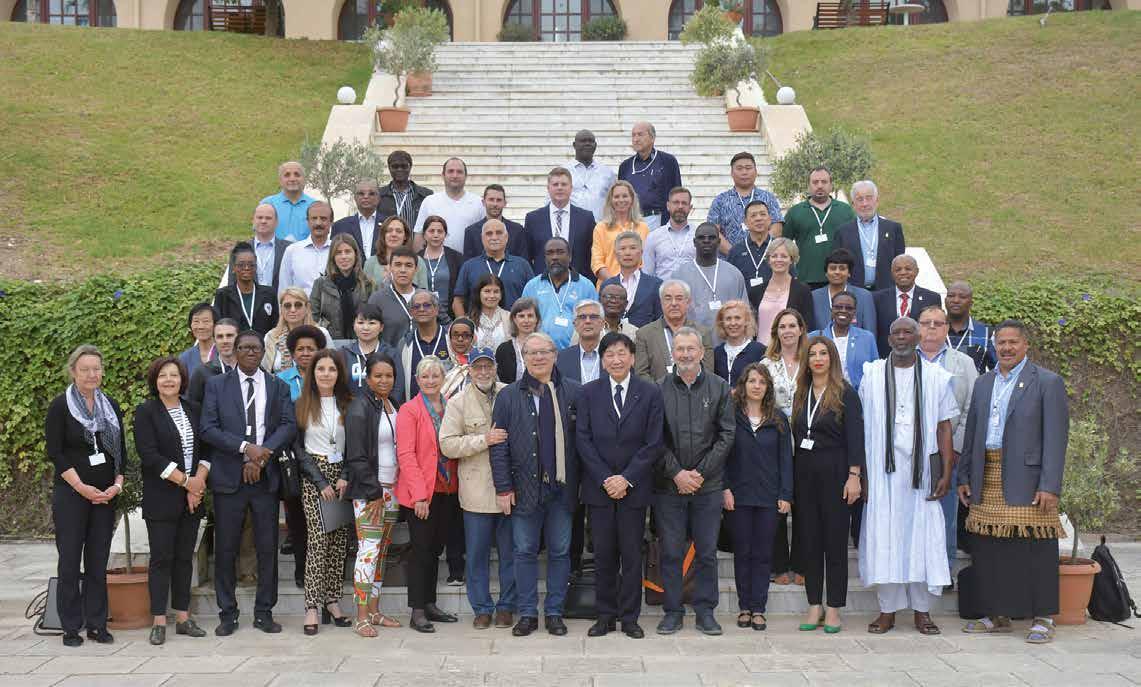
De gauche à droite: le Dr Dionyssis Gangas, M. Ching-Kuo Wu et M. Francis Gabet.
50 – IOA Journal 16
01 01
From left to right, Dr Dionyssis Gangas, Mr Ching-Kuo Wu and Mr Francis Gabet.
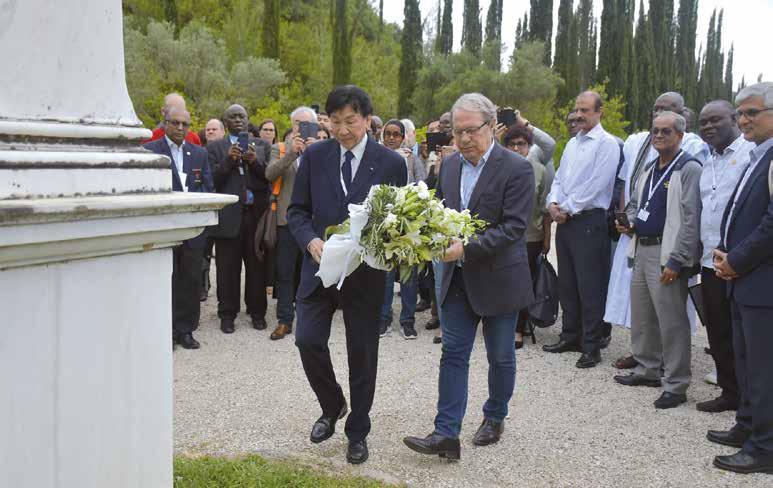
02
Mr Ching-Kuo Wu and Mr Francis Gabet, laid a wreath at the commemorative stele of Pierre de Coubertin.
M. Ching-Kuo Wu et M. Francis Gabet, ont déposé une couronne à la stèle commémorative de Pierre de Coubertin.
03 04
The NOC Culture and Education Champions participated in discussion groups.
Les Champions de la Culture et de l’Éducation des CNO ont participé à des groupes de discussion.
Visits of the archaeological sites in Athens and Ancient Olympia were included in the programme.
The IOA was proud to support and host this IOC initiative on its premises.– J
Sur la base des recommandations 22 et 26 de l'Agenda Olympique 2020, la Fondation pour la Culture et le Patrimoine, a organisé la 1ère Assemblée Générale du Réseau des Champions de la Culture et de l'Éducation des CNO, conduite par M. Ching-Kuo Wu, Président de la Commission de la Culture et du Patrimoine Olympique du CIO et par M. Francis Gabet, Directeur, dans les locaux de l’AIO à Olympie, Grèce, du 20 au 23 mai 2019.
Soixante-dix-sept délégués représentant 69 CNO étaient présents.
Dans le cadre de l'Assemblée Générale, les Champions de la Culture et de l'Éducation des CNO ont participé à des groupes de travail sur la Culture et l’Éducation Olympiques représentant les CNO de leurs pays, ont échangé leurs expériences et ont formulé des commentaires sur les activités culturelles et éducatives, entre autres.
Des visites aux sites archéologiques d'Athènes et d’Olympie ont fait partie du programme.
L'AIO est fière d’avoir soutenu et accueilli cette initiative du CIO dans ses locaux. – J


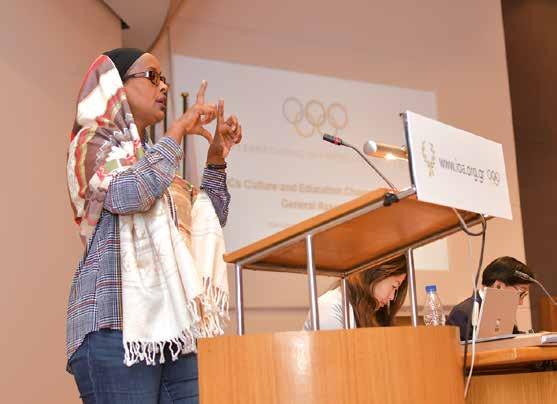
IOA Journal 16 – 51
03 04
02
Master of Arts in Sports Ethics and Integrit (MAiSI) European Programme Erasmus Mundus
Maîtrise ès Arts en Éthique et Intégrité dans le Sport (MAiSI) Programme européen Erasmus Mundus
by Professor Konstantinos Georgiadis University of Peloponnese IOA Honorary Dean
par le Professeur Konstantinos Georgiadis Université du Péloponnèse
Doyen honoraire de l’AIO
The Master of Arts in Sports Ethics and Integrity is the only post-graduate course in sports philosophy and sports governance funded by the European Union, initially for a three-year period.
From the very first year, the EU renewed its confidence in the Programme by extending its duration for another three years, for a total of six years.
Furthermore, the International Olympic Committee, finding that for the first time there is a scientific answer and vocational training on issues that have long been a concern for the Olympic family (doping, corruption, match-fixing, etc.), offers scholarships to Olympic medallists to cover their participation in the Programme.
Τhe Masters (MAiSI) is offered by six top European universities with distinguished professors teaching in their scientific fields.
One of them is the Katholieke Universiteit Leuven (Coordinator), which ranks 45th in the Times 2020 list of best universities in the world, with its
La Maîtrise ès Arts en éthique et intégrité dans le sport est le seul cours post-gradué en philosophie et gouvernance du sport financé par l’Union européenne, initialement pour une période de trois ans.
Dès la première année, l’UE a renouvelé sa confiance dans le Programme en prolongeant sa durée de trois ans, soit un total de six ans.
Par ailleurs, le Comité International Olympique, constatant que pour la première fois il existe une réponse scientifique et une formation professionnelle sur des questions qui préoccupent depuis longtemps la Famille olympique (dopage, corruption, matchs truqués, etc.), offre des bourses aux médaillés olympiques pour couvrir leur participation au Programme.
Le Master (MAiSI) est proposé par six universités européennes de premier plan, avec des professeurs éminents qui enseignent dans leurs domaines scientifiques.
L’une d’entre elles est l’université catholique de Louvain (Coordinateur), 45e au classement Times 2020
52 – IOA Journal 16
Faculty of Educational Sciences found among the top 15 worldwide.
The University of Peloponnese and in particular the Department of Sports Organisation and Management, in cooperation with the International Olympic Academy, is one of the six pillars of operation of this Master’s. The President of the IOA, Mr Isidoros Kouvelos, with the support of the Ephoria, signed a memorandum of agreement with the University of Peloponnese for the successful implementation of the Master’s in the IOA premises in Ancient Olympia, since the topics examined by the MAiSI are fully in line with the goals of the IOA.
With the course on “Olympism” being taught under the responsibility of the writer, in the cradle of the Olympic Games, Ancient Olympia, surrounded by the outstanding beauty and historical symbolism of the IOA premises, where the heart of Pierre de Coubertin lies, the students are able to learn and approach specific topics of the modern Olympic Games, Olympic Education, Olympic Games and Olympic Legacy Organisation and Management.
The six universities joined forces, coordinated by Philosophy Professor Mike McNamee of Swansea University, each undertaking with students a critical analysis approach to their research topics.
This means that students have the opportunity to study in different countries, to deepen their knowledge and sharpen their thinking on the following subjects: Ethics and Integrity (Swansea University, United Kingdom), Governance of Sports (University Pompeu Fabra, Spain), Sports as Social Capital (Katholieke Univerisiteit Leuven, Belgium), the Economic Dimension of Sports and the Olympic Games (Johannes Gutenberg University, Germany), Ethics,
des meilleures universités du monde et dont la faculté de Pédagogie se range parmi les 15 meilleures au monde.
L’université du Péloponnèse et en particulier le département d’Organisation et de Gestion des Sports, en coopération avec l’Académie Internationale Olympique, est l’un des six piliers du fonctionnement de ce Master. Étant donné que les thèmes traités dans le cadre du MAiSI concordent parfaitement avec les objectifs de l’AIO, le président de l’AIO, Isidoros Kouvelos, avec le soutien de l’Éphorie, a signé un mémorandum d’accord avec l’université du Péloponnèse pour la mise en œuvre réussie du Master dans les locaux de l’AIO à Ancienne Olympie.
Dans le cadre du cours sur «l’Olympisme», enseigné par l’auteur, dans le berceau des Jeux Olympiques à Ancienne Olympie, entourés par la beauté exceptionnelle et la symbolique historique de l’enceinte de l’AIO, là où repose le cœur de Pierre de Coubertin, les étudiants ont la possibilité d’aborder et de s’initier à des sujets spécifiques concernant les Jeux Olympiques modernes, l’éducation olympique, l’organisation et la gestion des Jeux Olympiques et du patrimoine olympique.
Les six universités ont uni leurs forces sous la coordination du professeur de philosophie Mike McNamee, de l’université de Swansea, chacune d’entre elles étant chargée de procéder avec les étudiants à une analyse critique de leurs sujets de recherche.
Cela signifie que les étudiants ont la possibilité d’étudier dans différents pays, d’approfondir
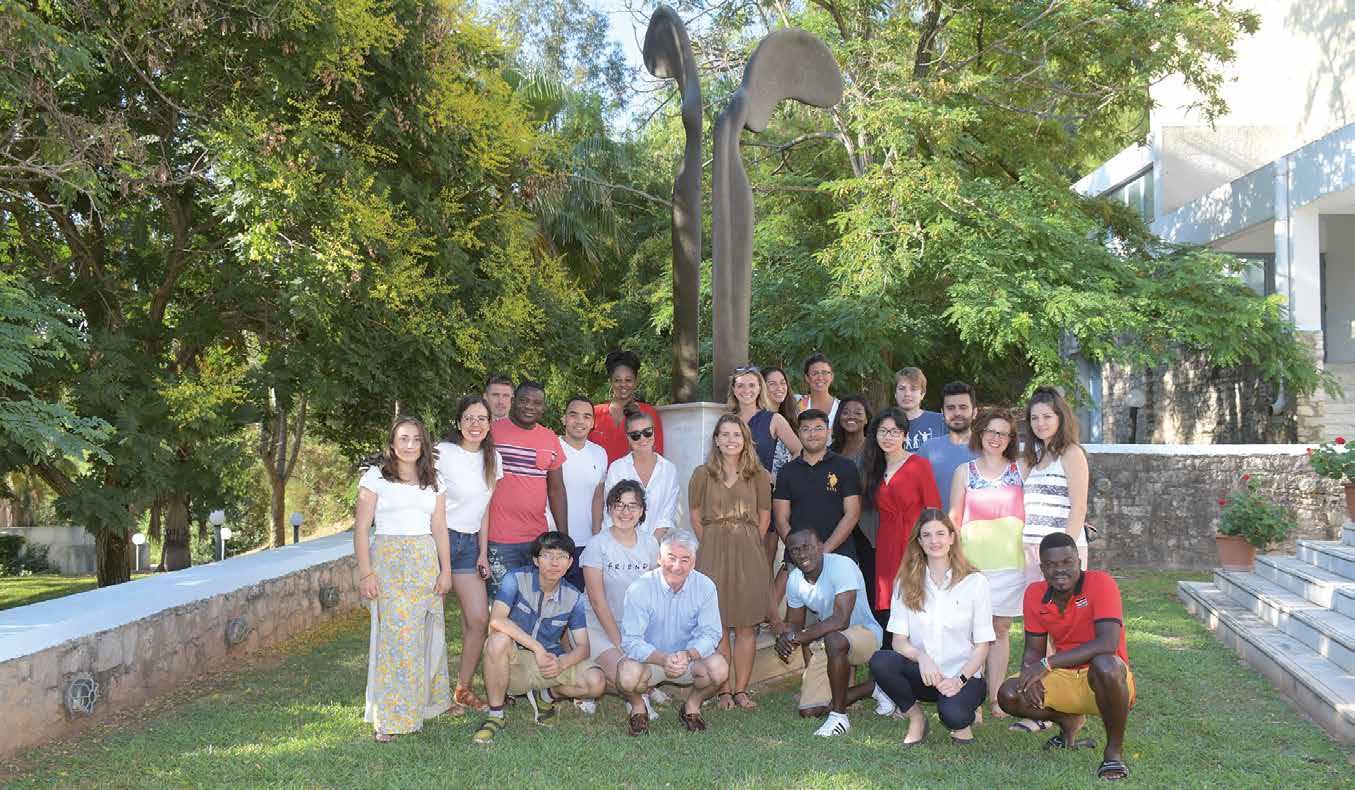
IOA Journal 16 – 53

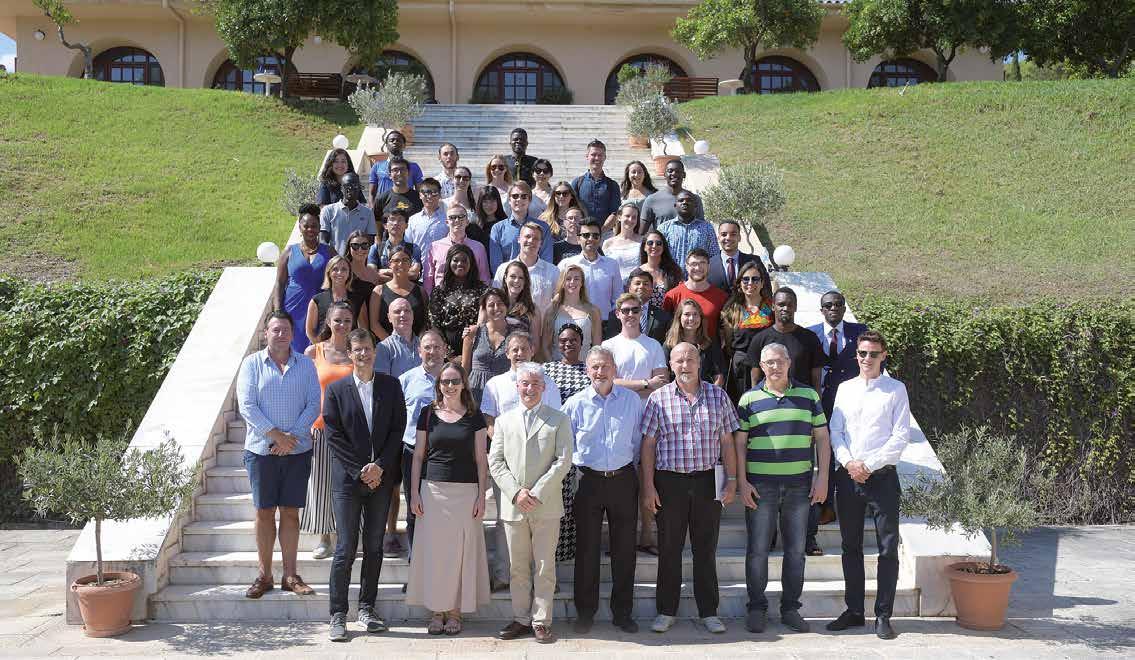
Integrity and Doping (Charles University, Czech Republic), Olympism and Research Methodology (University of Peloponnese, Greece).
Key issues examined within the Master’s Degree are corruption in the high ranks of sport administration, the manipulation of sporting games and events, governance and the challenges facing the Olympic Movement, human rights, gender equality and the rights of people with disabilities.
The Master’s has a two-year duration and accounts for 120 ECTS. EU scholarships cover all the costs for the majority of students from Europe and other continents, while the IOC grants scholarships to Olympic medallists.
et d’affiner leurs connaissances sur les sujets suivants: Éthique et Intégrité (université de Swansea, Royaume-Uni), Gouvernance dans le sport (université Pompeu Fabra, Espagne), le Sport en tant que capital social (université catholique de Louvain, Belgique), la Dimension économique du Sport et des Jeux Olympiques (université Johannes Gutenberg, Allemagne), Éthique, Intégrité et Dopage (université Charles, République tchèque), Olympisme et Méthodologie de recherche (université du Péloponnèse, Grèce).
02 01
54 – IOA Journal 16
02 01
Commemorative photos of the MAiSI students with their professors.
Photos commémoratives des étudiants du MAiSΙ avec leurs professeurs.
03
Konstantinos
Georgiadis, Professor at the University of Peloponnese, during his class at MAiSI.
Konstantinos Georgiadis, professeur à l’université du Péloponnèse, pendant son cours au MAiSI.
“EU scholarships cover all the costs for the majority of students from Europe and other continents, while the IOC grants scholarships to Olympic medallists.”
«Les bourses de l’UE couvrent tous les coûts pour la majorité des étudiants d’Europe et d’autres continents, tandis que le CIO accorde des bourses aux médaillés olympiques.»
The success of the Programme was evident from the very first year, as graduates a few months after completing their studies either continued their careers in international sports organisations and companies or were integrated in international PhD programmes.
According to Panagiotis Panoutsos Talkowski, MAiSI graduate from the Department of Sports Organisation and Management of the Faculty of Human Movement and Quality of Life Sciences of the University of Peloponnese: “The MAiSI gave me the opportunity to be taught by professors from different fields, a series of topics from a variety of scientific viewpoints, giving me comprehensive knowledge of both the topics discussed and the different ways of thinking of my fellow students coming from different countries of the world. I was also given the opportunity to bridge cultural gaps in my circle of influence. Scientifically and professionally this programme has made me well-rounded and more socially adaptable. At the same time, it has put me in a circle of people that I hope will enrich my life both socially, professionally and academically. Today, I work as Sports Integrity Advisor to Global Sports Federations. I highly recommend the MAiSI programme.” – J
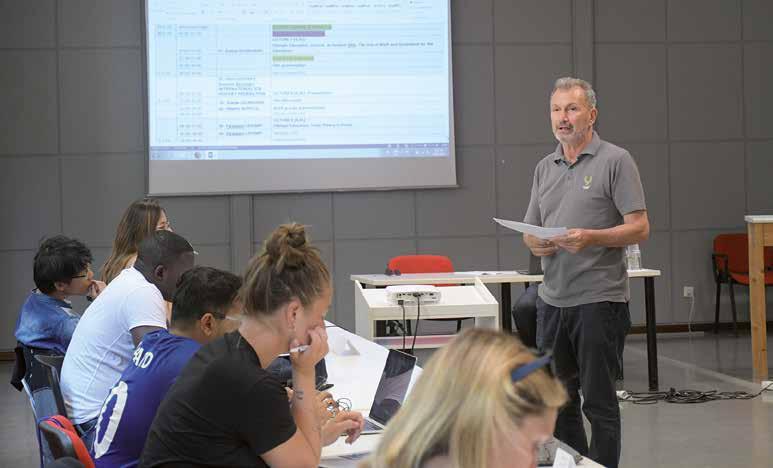
Les questions clés abordées dans le cadre du Master sont par exemple la corruption dans la haute administration sportive, la manipulation des jeux et des événements sportifs, la gouvernance et les défis auxquels le Mouvement olympique est confronté, les droits de l’homme, l’égalité des sexes et les droits des personnes handicapées.
Le Master a une durée de deux ans et donne lieu à 120 crédits ECTS. Les bourses de l’UE couvrent tous les coûts pour la majorité des étudiants d’Europe et d’autres continents, tandis que le CIO accorde des bourses aux médaillés olympiques.
Le succès du programme a été évident dès la première année, puisque les diplômés, quelques mois après la fin de leurs études, ont poursuivi leur carrière au sein d’organisations et d’entreprises sportives internationales ou ont été intégrés à des programmes de doctorat internationaux.
À cet égard, Panagiotis Panoutsos Talkowski, diplômé MAiSI et du Département d’organisation et de gestion des sports de la Faculté des sciences du mouvement humain et de qualité de vie de l’université du Péloponnèse, a déclaré: «Le MAiSI m’a donné l’opportunité d’apprendre auprès de professeurs de secteurs variés une série de sujets vus sous des angles scientifiques différents, ce qui m’a donné une connaissance approfondie des sujets abordés et des différentes manières de penser des autres étudiants venant de différents pays du monde. Cela m’a également permis de combler des lacunes culturelles dans mon cercle d’influence. Scientifiquement et professionnellement, ce programme m’a rendu plus complet et plus adaptable socialement. En outre, il m’a placé dans un cercle de personnes qui, je l’espère, enrichiront ma vie sur le plan social, professionnel et académique. Aujourd’hui, je travaille comme conseiller en intégrité sportive auprès des fédérations sportives mondiales. Je vous recommande vivement le programme MAiSI.»– J
IOA Journal 16 – 55
03
Scientifc netork beteen the IOA and Higher Education Institutes of Greece
Réseau scientifique entre l’AIO et les établissements d’enseignement supérieur de Grèce
by
Dr Vassiliki Tzachrista PhD in Social and Educational Policy Archaeologist, IOA
Dr Vassiliki Tzachrista Doctorat en politique sociale et
éducative
Archéologue, AIO
The International Olympic Academy, within the framework of the expanded educational policy implemented over the past decade, has been planning and organising its attendance and presentation of scientific papers in conferences, day events and seminars organised by Higher Education Institutes in Greece. The outreach and cooperation actions with Greek universities specialised in academic fields (Education, Sports, History, Physical Education, Pedagogy, etc.) having an affinity with the IOA educational programmes, reflect the modern educational view of the Ephoria and the President of the Academy who plan a dynamic presence and a bright future for the institution. Thus, with this choice, the presence of the IOA in the national context constitutes a strong investment and an invaluable tool of educational influence in Greece, whilst highlighting the contribupar la
Dans le cadre de la politique éducative mise en œuvre en général au cours de la dernière décennie, l’Académie Internationale Olympique planifie et organise sa participation sur la base d’articles scientifiques présentés lors de conférences, de journées et de séminaires organisés par des instituts d’enseignement supérieur en Grèce. Les actions de sensibilisation et de coopération avec les universités grecques spécialisées dans les domaines académiques (éducation, sport, histoire, éducation physique, pédagogie, etc.) ayant une affinité avec les programmes éducatifs de l’AIO reflètent la vision éducative moderne de l’Éphorie et du président de l’Académie, qui prévoient une présence dynamique et un brillant avenir pour cette institution. Ainsi, du fait de ce choix, la présence de l’AIO dans le contexte national constitue un investissement fort et un outil inestimable d’influence édu-
56 – IOA Journal 16
01
Dr Vassiliki
Tzachrista spoke on the Olympic Stamps from 1896 to our days, at the 1st Interdisciplinary Conference “Sports & Art”, University of Ioannina.
La Dr Vassiliki
Tzachrista a parlé des timbres olympiques de 1896 à nos jours, lors de la 1ère Conférence interdisciplinaire «Sports & Art» à l’université de Ioannina.
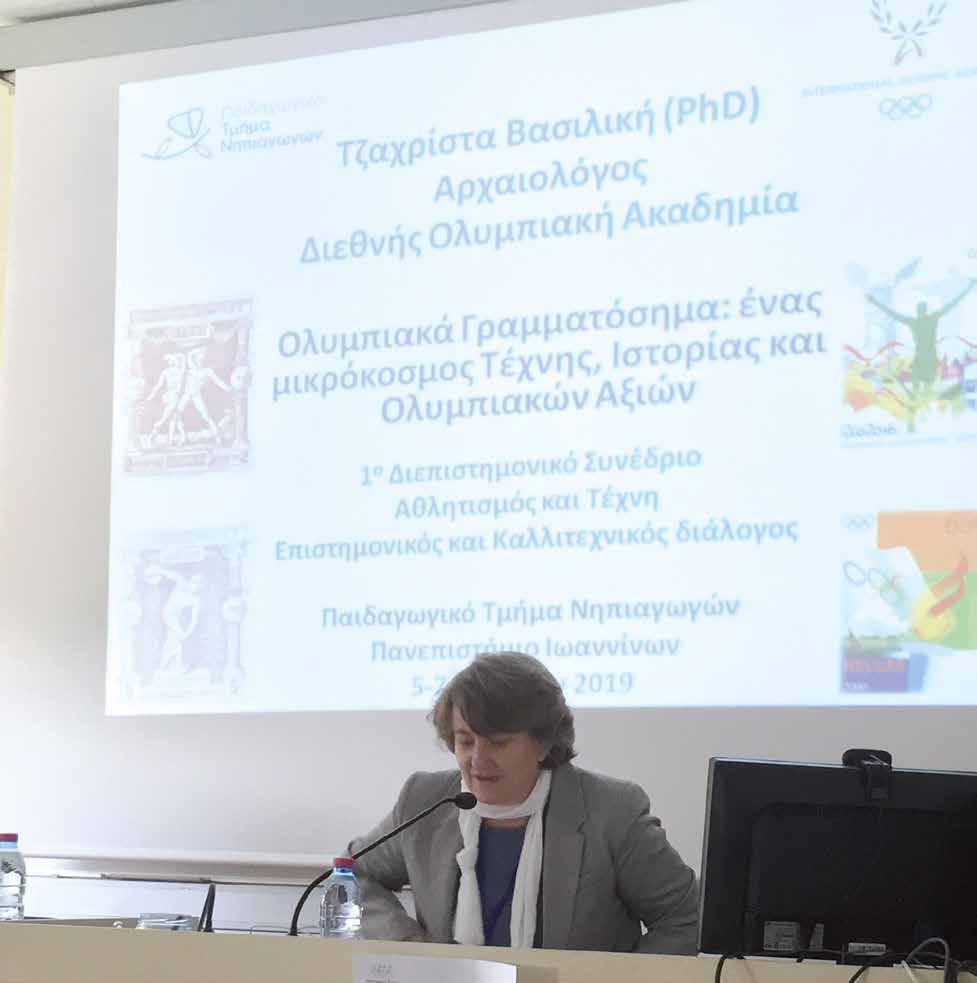
tion of Olympic Education as a new academic field of inter-disciplinary cooperation.
In the last two years (2018–2019), the IOA participated in nine conferences in Athens and in the Provinces. Particular importance was given to the conferences of the Northern Greece Physical Education Teachers Association, a scientific institution founded in 1954 which has developed a significant scientific activity in the field of Physical Education.
The IOA attended this conference two years in a row with scientific papers outlining the social and educational approach to the 2004 Olympic and Paralympic Games. The Association’s conferences were accompanied by a wide range of sports seminars on specialised subjects of varied interest which constituted a distinct source of knowledge, as well as a field for discussions and exchange of opinions.
Just as important was IOA’s participation in the conference of the Faculty of Physical Education and Sport Sciences of the Aristotle University of Thessaloniki, with a paper on the correlation between Physical Education and Olympic Education within the modern Olympic Movement. The days of the conference were an excellent opportunity for the IOA to communicate with the academic community (students and professors) and brief them on its activities. At the University of Ioannina – Department of Preschool Education – Fine Arts and Art Sciences
cative en Grèce, tout en soulignant la contribution de l’éducation olympique comme nouveau champ académique de coopération interdisciplinaire.
Au cours des deux dernières années (2018–2019), l’AIO a participé à neuf conférences à Athènes et en province. Une importance particulière a été accordée aux conférences de l’Association des professeurs d’éducation physique de Grèce du Nord, une institution scientifique fondée en 1954 qui a développé une importante activité scientifique dans le domaine de l’éducation physique. L’AIO a assisté à cette conférence deux années de suite, avec des articles scientifiques décrivant l’approche sociale et éducative des Jeux Olympiques et Paralympiques de 2004. Les conférences de l’Association ont été accompagnées d’un large éventail de séminaires sportifs sur des sujets spécialisés d’intérêt divers, qui ont constitué une source distincte de connaissances ainsi qu’un terrain de discussion et d’échange d’opinions.
La participation de l’AIO à la conférence de la Faculté d’éducation physique et des sciences du sport de l’université Aristote de Thessalonique, avec une communication sur la corrélation entre éducation physique et éducation olympique au sein du Mou-
IOA Journal 16 – 57 01
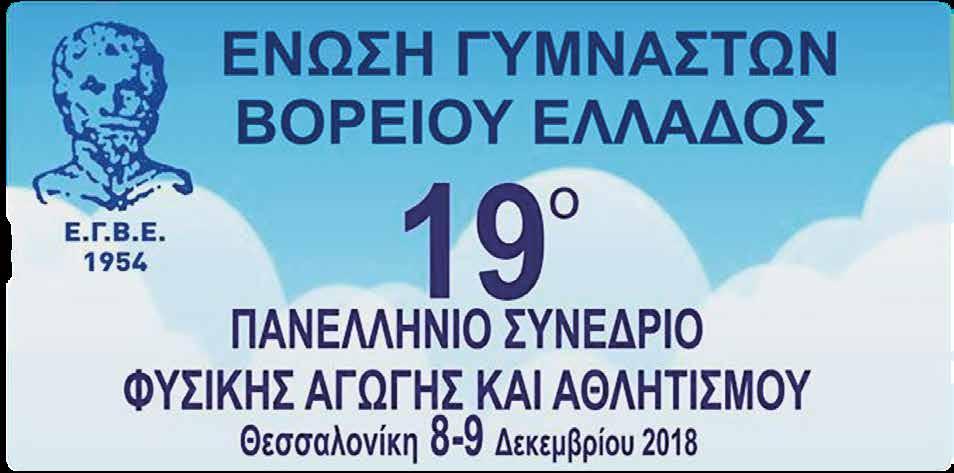
“In the last two years (2018–2019), the IOA participated in nine conferences in Athens and in the Provinces.”
Department, within the framework of the 1st Interdisciplinary Conference “Sports and Art”, held under the auspices of the IOA, the topic presented focused on Olympic Stamps from 1896 to our days. The conference was very successful, with numerous papers and workshops on Art and Sports.
At the 4th Pan-Hellenic Conference of the Hellenic Educational Society – School Life and Education Museum – National Centre of Research and Preservation of School Material, on the “Education in the 20th century – School and Culture”, we presented the Olympic Education programmes in Greece. The meeting with educators and scientists was particularly noteworthy in the light of their marked interest in the educational activities of the IOA. Similarly important were the scientific meetings in the framework of the day events organised by the National Olympic Academy of Greece (ETHNOA) and by the Vocational Training Institute (IEK) of Pyrgos, in Elis, held respectively on the subjects of the ancient Olympic Truce (ETHNOA) and the showcasing of the IOA as an alternative development advantage for the Region of Elis (IEK).
Particularly important for the IOA’s communication policy was the participation in the Symposium with the title “Greece as an International Educational Pole”, organised by the NGO “STUDY IN GREECE” at the Harokopio University, where we presented the International Olympic Academy as an international destination for education, culture and sports. The
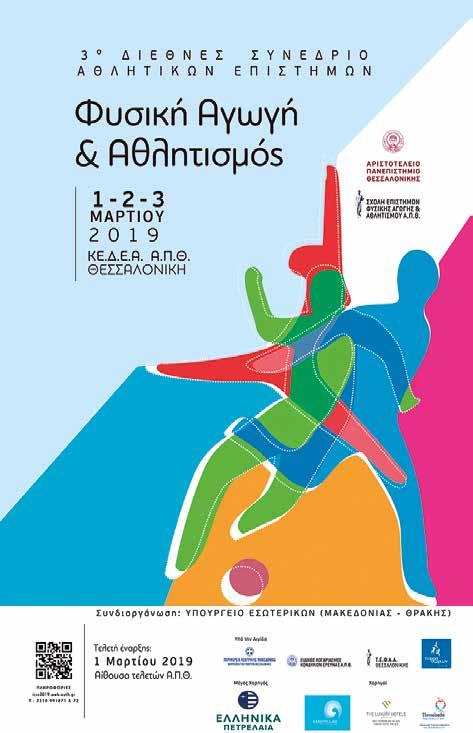
vement olympique moderne, a été tout aussi importante. Les journées de la conférence ont été une excellente occasion pour l’AIO de communiquer avec la communauté universitaire (étudiants et professeurs) et de les informer de ses activités. À l’université de Ioannina – Département d’éducation préscolaire –Département des beaux-arts et des sciences de l’art, dans le cadre de la 1re Conférence interdisciplinaire «Sports et Art», tenue sous l’égide de l’AIO, le thème présenté a porté sur les timbres olympiques de 1896 à nos jours. La conférence a été couronnée de succès, avec de nombreuses présentations et ateliers sur l’art et le sport.
58 – IOA Journal 16
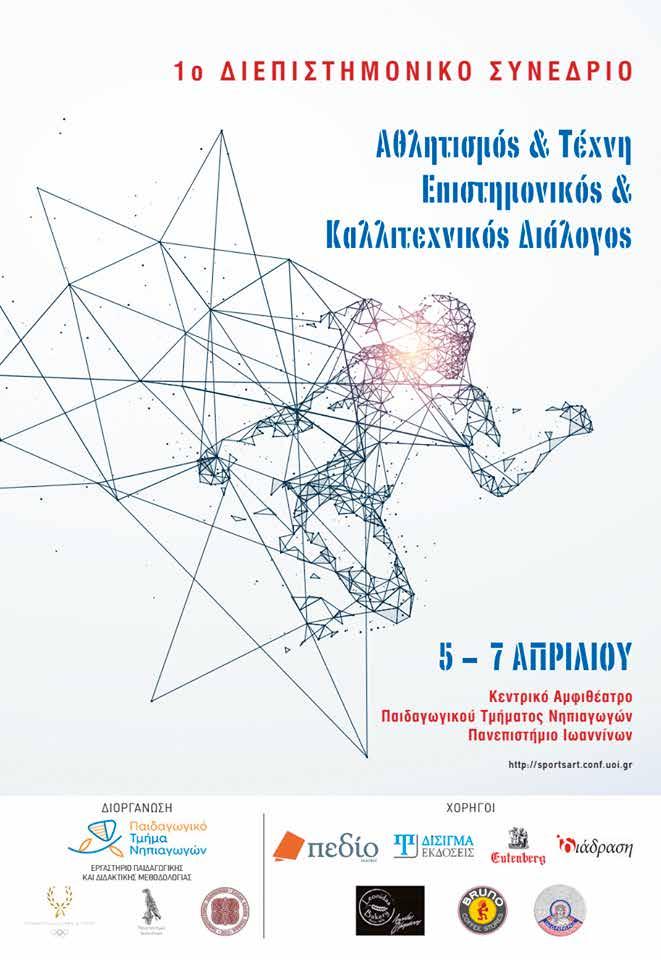
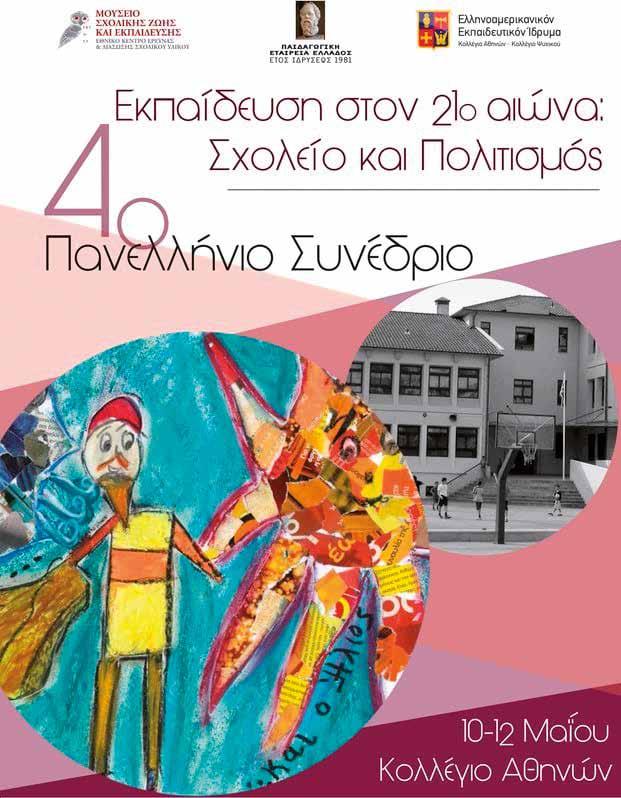
warm response of the Greek and foreign participants was a clear indication of their great interest to visit the Academy and cooperate with it on future educational activities.
In summarising the communication experience with the members of the academic and sports community, we come to the conclusion that the IOA and its work are not widely known in Greece, but there is a clear interest for communication, acquaintance and cooperation with the IOA expressed by the above mentioned community. Within this framework, the IOA, taking these parameters into consideration, will establish a direct cooperation with the Universities by means of lectures, so as to make its work and its identity known to the student population at large. – J
«Au cours des deux dernières années (2018–2019), l’AIO a participé à neuf conférences à Athènes et en province.»
Lors de la 4e Conférence panhellénique de la Société Hellénique de l’Éducation – Musée de la Vie Scolaire et de l’Éducation – Centre National de Recherche et de Conservation du Matériel Scolaire, sur le thème «L’Éducation au XXe siècle – École et Culture», nous avons présenté les programmes d’éducation olympique en Grèce. La rencontre avec des éducateurs et des scientifiques a été particulièrement remarquable, compte tenu du réel intérêt qu’ils portent aux activités éducatives de l’AIO. Les réunions scientifiques qui se sont tenues dans le cadre de la journée organisée par l’Académie Nationale Olympique de Grèce (ETHNOA) et par l’Institut de formation professionnelle (IEK) de Pyrgos, en Élide, sur les thèmes de la trêve olympique antique (ETHNOA) et de la présentation de l’AIO comme un avantage alternatif de développement pour la région d’Élide (IEK), ont également marqué les esprits.
A été particulièrement importante pour la politique de communication de l’AIO la participation au Symposium intitulé «La Grèce comme pôle international d’éducation», organisé par l’ONG «ÉTUDE EN GRÈCE» à l’université Harokopio, où nous avons présenté l’Académie Internationale Olympique comme une destination internationale pour l’éducation, la culture et le sport. La réponse chaleureuse des participants grecs et étrangers a clairement montré leur vif intérêt à visiter l’Académie et à coopérer avec elle dans le cadre d’activités éducatives futures.
Résumant l’expérience de communication avec les membres de la communauté académique et sportive, nous arrivons à la conclusion que l’AIO et son œuvre ne sont pas très connues en Grèce, mais qu’il existe un intérêt évident pour la communication, la connaissance et la coopération avec elle, exprimé par la communauté mentionnée ci-dessus. Dans ce cadre, l’AIO établira, en tenant compte de ces paramètres, une coopération directe avec les universités par le biais d’exposés, afin de faire connaître son travail et son identité à l’ensemble des étudiants. – J
IOA Journal 16 – 59
The IOA at the EU Sport Forum in Bucharest
L’AIO au Forum européen du sport à Bucarest
by Stella Tachtara and Gina Tsiotra
The Directorate General for Education, Youth, Sport and Culture of the European Commission organised the 2019 EU Sport Forum in Bucharest, Romania, on the 8th and 9th of April 2019 in the framework of the Romanian Presidency of the Council of the European Union and the IOA was there to attend this great sports event.
The EU Sport Forum is the main platform for structured dialogue between the European Commission and sport stakeholders. The Forum’s main objective is to take stock of progress achieved in implementing the EU agenda for sport and to seek stakeholders’ views on current and future activities. This event has become the key annual meeting for the European and international sport family, where participants have a unique opportunity to exchange and discuss views with policy makers of the EU institutions, and representatives of the sport movement.
Around 400 participants, mostly representatives of various National Olympic Committees, federations, sport clubs, other sport organisations and athletes as well as Member States, local authorities, ministries of sport, youth and culture along with academics gathered in the 2019 EU Sport Forum and engaged in high level discussions, structured exchanges and networking activities.
Among the keynote speakers were: EU Commissioner for Education, Culture, Youth and Sport, Mr Tibor Navracsics, President of the Romanian Olympic and Sports Committee, Mr Mihai Covaliu, President of the European Olympic Committees, Mr Janez Ko-
La direction générale de l’éducation, de la jeunesse, du sport et de la culture de la Commission européenne a organisé le Forum européen du sport 2019 à Bucarest, en Roumanie, les 8 et 9 avril 2019, dans le cadre de la présidence roumaine du Conseil de l’Union européenne. L’AIO était présente à cette grande manifestation sportive.
Le Forum européen du sport est la principale plateforme de dialogue structuré entre la Commission européenne et les acteurs du sport. L’objectif principal du Forum est de faire le point sur les progrès réalisés dans la mise en œuvre de l’agenda de l’UE pour le sport et de recueillir l’avis des parties prenantes sur les activités actuelles et futures. Cet événement est devenu la principale réunion annuelle de la famille sportive européenne et internationale, où les participants ont l’occasion unique d’échanger et de discuter avec les décideurs politiques des institutions européennes et avec les représentants du mouvement sportif.
Près de 400 participants, pour la plupart des représentants de divers Comités Nationaux Olympiques, fédérations, clubs sportifs, autres organisations sportives et athlètes, ainsi que des États
60 – IOA Journal 16
par Stella Tachtara et Gina Tsiotra
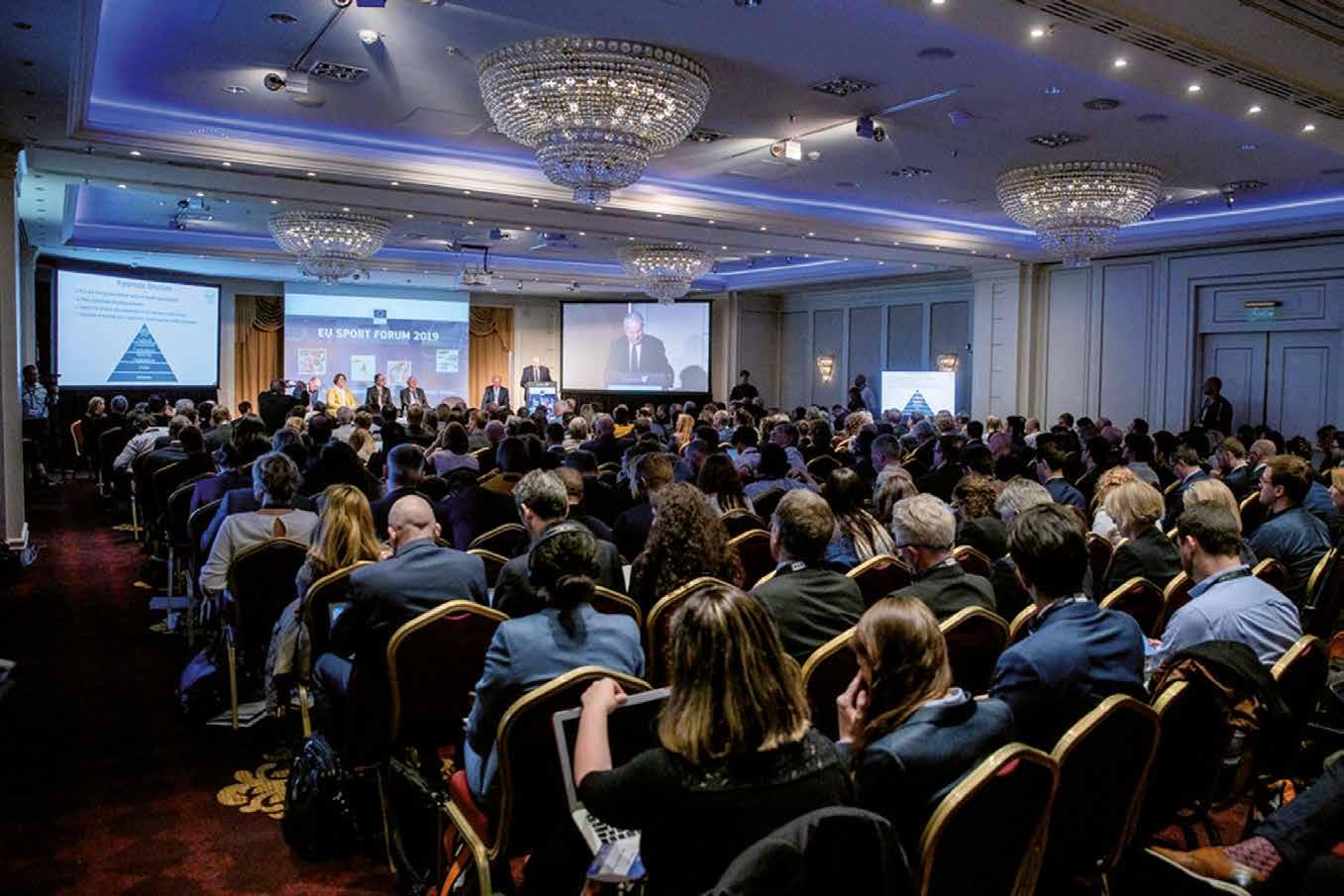
“The Forum presented the perfect opportunity for the IOA to explore the latest developments on EU sport policies.”
«Le Forum a été l’occasion idéale pour l’AIO d’explorer les derniers développements des politiques sportives de l’UE.»
cijanćić, President of the Ukrainian National Olympic Committee, Mr Sergey Bubka, French Minister of Sport, Ms Roxana Márácineanu, Vice-Chair of the IOC Athletes’ Commission, Ms Danka Bartekova, and Director of the European Office and International Federation Relations at the World Anti-Doping Agency (WADA), Mr Sébastien Gillot.
At the two-day event, a whole range of topics have been tackled during plenary and breakout sessions. These topics were selected from both the programme developed by the Romanian presidency, in which they set out their priorities in the different policy areas, and the EU work plan for sport 2017–2020.
The discussion focused on main EU priorities in the area of sport, namely the role of sport federations, promotion of healthy lifestyles, funding of grassroots sport and governance of professional sport.
membres, des autorités locales, des ministères des sports, de la jeunesse et de la culture et des universitaires, se sont réunis lors du Forum européen du sport 2019 et ont participé à des discussions de haut niveau, à des échanges structurés et aux activités de réseautage.
Parmi les principaux conférenciers figuraient Tibor Navracsics, commissaire européen chargé de l’éducation, de la culture, de la jeunesse et du sport; Mihai Covaliu, président du Comité Olympique et
IOA Journal 16 – 61
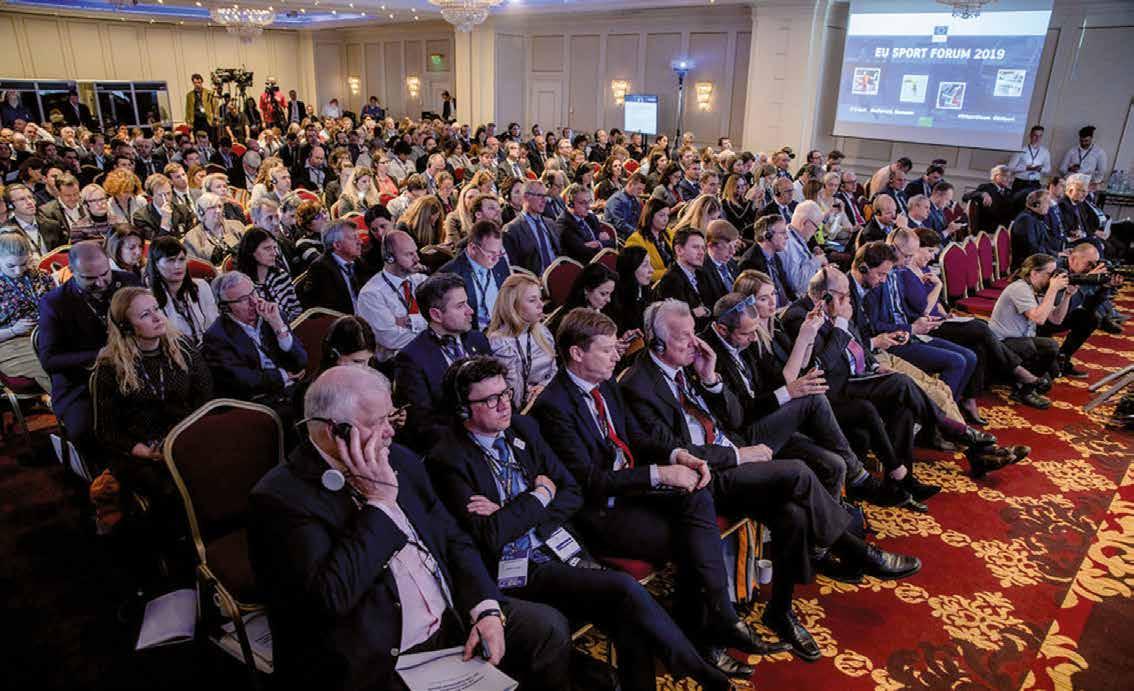
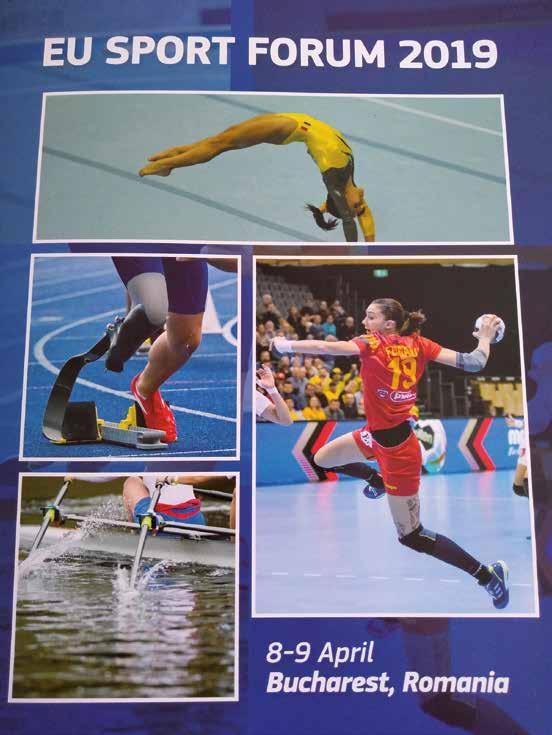
The first day of the Forum included plenary sessions on doping in sport, the role of sport federations in the promotion of European sport and whether or not Europe can still attract major sports events. There was also a presentation on empowering girls through sport, as well as parallel sessions on the rights and interests of athletes and schools’ contribution to the promotion of healthy lifestyles.
Following a plenary opening on European Commission’s activities by the coordinator of the Forum and Head of Sport Unit, DG EAC, Mr Yves Le
Sportif Roumain; Janez Kocijanćić, président des Comités Olympiques Européens; Sergey Bubka, président du Comité National Olympique Ukrainien; Roxana Márácineanu, ministre française des Sports; Danka Bartekova, vice-présidente de la commission des athlètes du CIO, et Sébastien Gillot, directeur du Bureau régional européen et des relations avec les fédérations internationales à l’Agence mondiale antidopage (AMA).
Pendant ces deux journées, toute une série de sujets ont été abordés au cours des séances plénières et en petits groupes. Les thèmes ont été sélectionnés parmi ceux définis par le programme élaboré par la présidence roumaine, qui définissait ses priorités dans les différents domaines politiques, ainsi que par le plan de travail de l’UE en faveur du sport 2017–2020. Le débat a porté sur les principales priorités de l’UE dans le domaine du sport, à savoir le rôle des fédérations sportives, la promotion de modes de vie sains, le financement du sport de masse et la gouvernance du sport professionnel.
Le premier jour du Forum a comporté des séances plénières consacrées au dopage dans le sport, au rôle des fédérations sportives dans la promotion du sport européen et à la question de savoir si l’Europe peut encore attirer de grands événements sportifs. Il y a eu également une présentation sur l’autonomisation des filles par le sport, ainsi que des sessions parallèles sur les droits et intérêts des athlètes et sur la
62 – IOA Journal 16
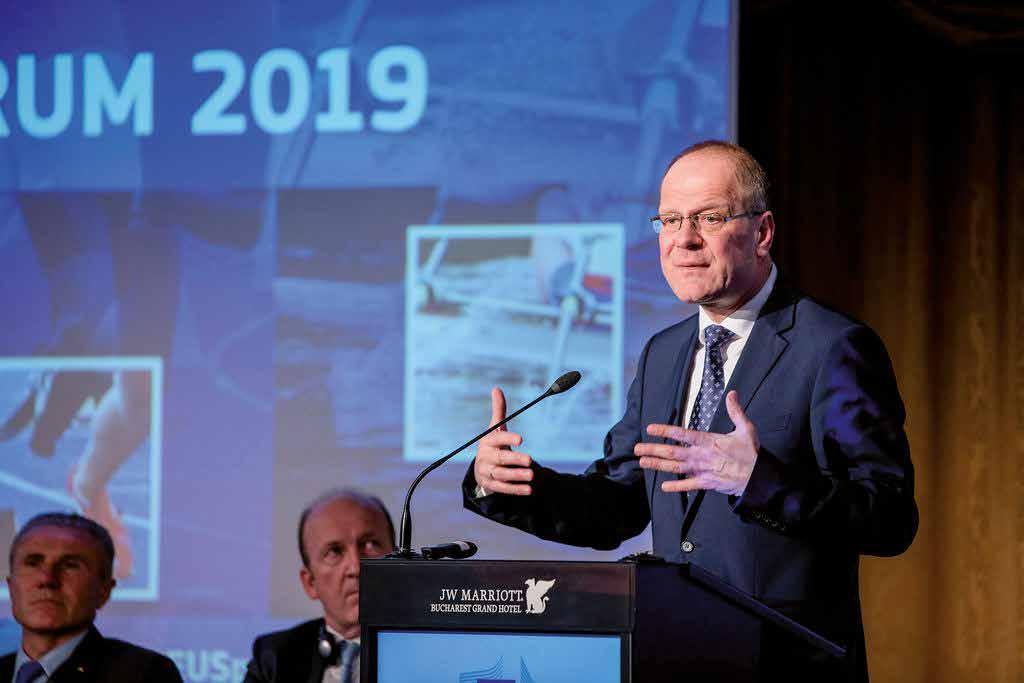
Μr Tibor Navracsics, EU Commissioner for Education, Culture, Youth and Sport.
Μ. Tibor Navracsics, Commissaire européen chargé de l’éducation, de la culture, de la jeunesse et du sport.
Lostecque, the second day offered a series of parallel sessions on various topics such as the protection of sport rights in the EU, the financing of grassroots sport, justice in sport and challenges of less popular sports. A plenary session on how Europeans will engage in sport in the future followed, before the concluding remarks officially closed the Forum.
During the Forum and in between the various sessions the participants also had the opportunity to visit stands that offered information and relevant material on EU initiatives and programmes such as the Erasmus+ Sport and the European Week of Sport, the #BeActive Awards, the Share Initiative, Social Biking and the #BeInclusive EU Sport Awards.
contribution des écoles à la promotion de modes de vie sains.
Après une séance plénière d’ouverture sur les activités de la Commission européenne présidée par le coordinateur du Forum et chef de l’unité Sport au sein de la direction générale Éducation et Culture, Yves Le Lostecque, le deuxième jour a offert une série de sessions parallèles sur divers sujets tels que la protection des droits sportifs dans l’UE, le financement du sport de masse, la justice dans le sport et les enjeux des sports moins populaires. Une séance plénière sur la manière dont les Européens s’engageront dans le sport à l’avenir a suivi, avant les remarques finales qui ont marqué la clôture officielle du Forum.
Pendant le Forum et entre les différentes sessions, les participants ont également eu l’occasion de visiter des stands offrant des informations et du matériel sur les initiatives et les programmes de l’UE, tels que: Erasmus+ Sport, la Semaine européenne du sport, les #BeActive Awards, l’Initiative Share, Social Biking et le #BeInclusive EU Sport Awards.
From left to right: Mr Tibor Navracsics, Ms Marijke
Fleuren, Mr Bogdan Matei, Mr Janez
Kocijančič, Mr David Eades, (moderator of the session) and Mr Francesco Ricci Bitti.
De gauche à droite:
M. Tibor Navracsics, Mme Marijke Fleuren,
M. Bogdan Matei, M. Janez Kocijančič, M. David Eades, (modérateur de la session) et
M. Francesco Ricci Bitti.
The Forum presented the perfect opportunity for the IOA to explore the latest developments on EU sport policies and to get a clear perspective about the future of sports in Europe, to network with other sport organisations, strengthen partnerships with established stakeholders, as well as engage with potential new partners. The IOA looks forward to the next edition of the EU Sport Forum that will take place in spring 2020 and is eager to contribute to its works! – J
Le Forum a été l’occasion idéale pour l’AIO d’explorer les derniers développements des politiques sportives de l’UE et d’avoir une perspective claire sur l’avenir du sport en Europe, de travailler en réseau avec d’autres organisations sportives, de renforcer les partenariats avec des intervenants bien établis, ainsi que de s’engager avec de nouveaux partenaires potentiels. L’AIO attend avec intérêt la prochaine édition du Forum européen du sport qui aura lieu au printemps 2020, et elle souhaite vivement contribuer à ses travaux! – J

IOA Journal 16 – 63 02 01
02 01
Stoiximan: Sport and communication above and beyond marketing
With six important prizes at the Sports Marketing Awards, the company was among the big winners of the evening
Stoiximan:
Sport et communication au-delà du marketing
Avec six prix importants remportés aux Sports Marketing Awards, l’entreprise a été parmi les grands gagnants de la soirée
Sport was the big winner at this year’s Sports Marketing Awards, which took place on Thursday 26 September at the Gazarte arts and culture hub. This major celebration of sports communication was aimed at bringing together, high-lighting and rewarding the best practices and most innovative ideas that have materialized on behalf of the Greek sports’ ecosystem, in the presence of prominent representatives of sport in the country, elite athletes, officials from top Greek teams, journalists and officials of sports marketing.
For Stoiximan, communication and sport are combined with creativity and responsibility, highlighting long-term sponsorship partnerships and corporate social responsibility actions with substantial social impact. Within this context, it is not by chance that the leading company GameTech in Greece, and one of the
Le sport a été le grand gagnant de cette année aux Sports Marketing Awards, qui ont eu lieu le jeudi 26 septembre au centre culturel et artistique Gazarte. Cette belle célébration de la communication sportive visait à rassembler, à mettre en lumière et à récompenser les meilleures pratiques et les idées les plus innovantes qui ont été matérialisées au nom de l’écosystème sportif grec, et cela en présence d’éminents représentants du sport dans le pays, d’athlètes d’élite, de dirigeants des plus grandes équipes grecques, de journalistes et de cadres du marketing sportif.
Stoiximan associe la communication et le sport à la créativité et à l’engagement, en privilégiant des partenariats de sponsoring à long terme et des actions de responsabilité sociale d’entreprise à fort
64 – IOA Journal 16
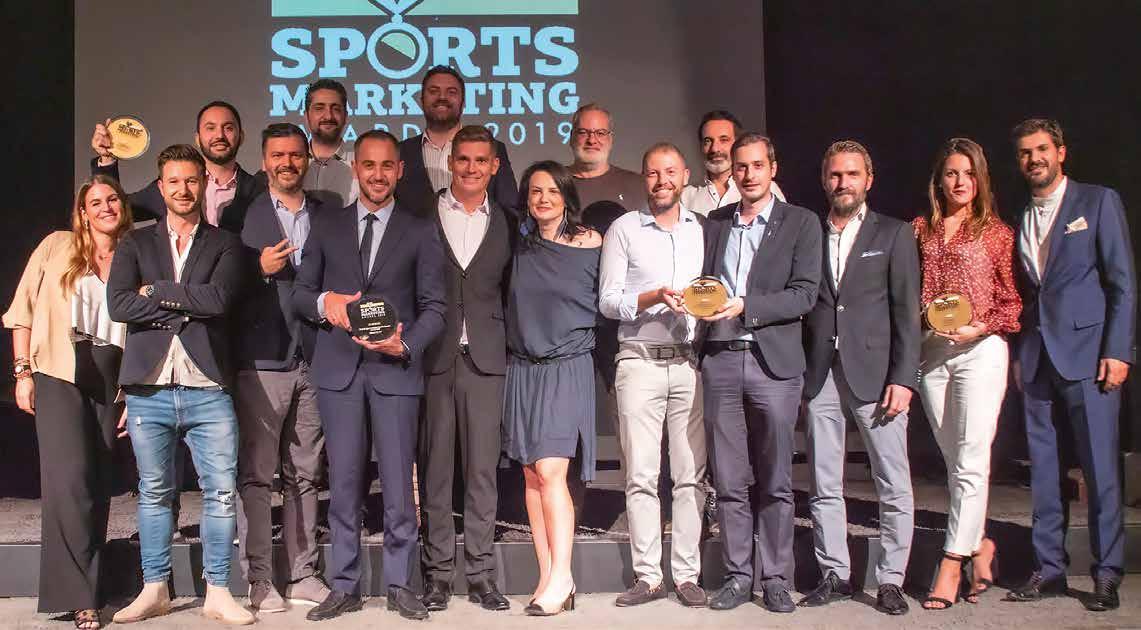
fastest developing in its field in Europe, entered the limelight alongside the evening’s leading winners.
The solid support for great athletes, such as Olympic Gold Medallist Leftheris Petrounias; the strong sponsorship support for the Stoiximan Tokyo Team, for the 17 sports men and women as well as for the two national water polo teams on the road to the 2020 Tokyo Olympic Games; and again the communication highlighting this year’s champion PΑΟΚ in a spirit of unity far from team competitiveness, are all evidence that Stoiximan and the quality of its communications’ management place it in a class of its own.
Furthermore, the activation of major athletes like Leftheris Petrounias, Dimitris Diamantidis, Spyros Gianniotis and Vassiliki Millousi as ambassadors for the programme “Little Heroes by Stoiximan” –a programme that has reached the remotest corners of the country and touched more than 26,000 children – demonstrates that sport can act as an inspirational model, from the Heroes of Today to the Little Heroes of Tomorrow. More specifically, Stoiximan’s five nominations were honoured with six awards, the most prominent of which was the Platinum award for the “Little Heroes” programme of corporate social responsibility, achieving the highest average rating in the “Best Sports Marketing for Brands” category. By the end of the evening, the company had received two Gold awards in the “Best Sports Marketing for Brands” category for the video “PAOK FC – This is how the heart of a champion beats”, as well as for the corporate social responsibility programme “Little Heroes by Stoiximan”; while in the “Best Sports Sponsorships” category it was awarded a Gold in the category “Sponsorship of an Athlete” for its collaboration with that “Midas of the Rings”, Leftheris Petrounias, a Silver in the same category for its support for the Greek Olympic Team, “Stoiximan Tokyo Team” and finally, Silver in the category “Sponsorship of a Sports Association” for its major sponsorship of the PAOK FC team.
impact social. Dans ce contexte, ce n’est pas un hasard si la société GameTech, leader en Grèce et parmi celles qui se développent le plus rapidement dans son domaine en Europe, s’est rangée parmi les grands gagnants de la soirée.
Le soutien constant aux grands sportifs tels que le médaillé d’or olympique Leftheris Petrounias, le soutien fort du sponsoring de l’équipe Stoiximan de Tokyo, ces 17 sportifs hommes et femmes et ces deux équipes nationales de water-polo en route pour les Jeux Olympiques de Tokyo 2020, ainsi que la communication mettant en avant le champion PAOK de cette année dans un esprit d’unité, loin de la compétition d’équipe, sont autant de preuves que la qualité de gestion des communications fait de Stoiximan une société tout à fait particulière.
Par ailleurs, le recrutement de grands athlètes comme Leftheris Petrounias, Dimitris Diamantidis, Spyros Gianniotis et Vassiliki Millousi comme ambassadeurs du programme «Les Petits Héros by Stoiximan» – un programme qui a touché les endroits les plus reculés du pays et plus de 26 000 enfants –démontre que le sport peut être un modèle inspirant, des Héros du Présent aux Jeunes Héros de Demain. Plus précisément, les cinq candidatures de Stoiximan ont reçu six prix, dont le plus important est le prix Platinum pour le programme de responsabilité sociale d’entreprise «Les Petits Héros», qui a obtenu le meilleur classement moyen dans la catégorie «Best Sports Marketing for Brands». À la fin de la soirée, l’entreprise avait reçu deux Gold Awards dans la catégorie «Best Sports Marketing for Brands» pour la vidéo «PAOK FC – C’est ainsi que bat le cœur du champion» et pour le programme de responsabilité
IOA Journal 16 – 65
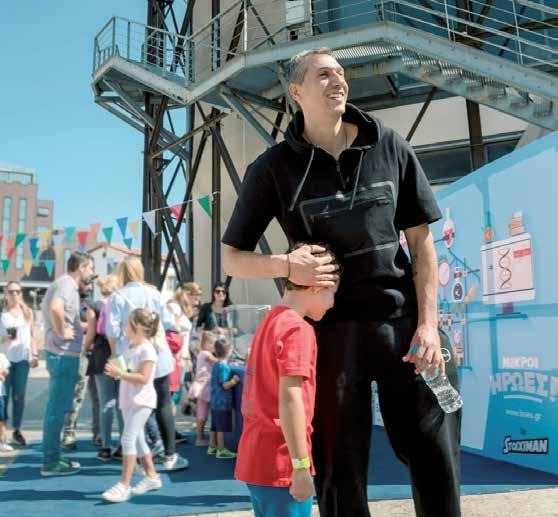
“The fact that a communication project for corporate social responsibility action gained the largest average rating in its category, is a well-deserved acknowledgment for everyone involved in communication”, commented Ms Angeliki Papadopoulou, Stoiximan’s Corporate Affairs Director, on the reception speech of the Platinum award for “Little Heroes” programme. “The award for this programme has great significance, both for us as well as for the more than 26,000 children up to now, from all over Greece, who have had educational experiences through the opportunity it offers and have also got to know some of our leading athletes. From the thousands of students in urban centres, to students from Sikinos, Agathonisi and the other eight border islands we have adopted within the ‘Little Heroes for Greece’ programme, the ‘Little Heroes’ are constantly expanding with the collaboratiοn of such important organisations as HopeGenesis, Syblefsis and The Tipping Point.”
“As people in sports marketing have a responsibility, for us it is that of promoting fair play, those exact values that make each game better”, stressed out Mr Panos Konstantopoulos, Stoiximan’s Chief Marketing Officer. “At Stoiximan, we support sport in every way: from major teams to individual athletes, from the most popular sports to the least popular, from the rallying cries of the stadiums to the great honours of the Olympic Games. Sport is an integral part of Stoiximan and since our beginnings we have been fortunate in, and grateful for, all the collaborations that we have developed in this great Greek sports family: from Leftheris – one of Stoiximan’s oldest friends, with a collaboration that began in 2014 – and PAOK FC, with whom our story began in 2017 and was marked by the achievement of the Double, to the large Greek delegation in the Stoiximan Tokyo Team, with 17 female and male athletes and two national teams. For us this relationship goes far beyond marketing: it is the solid, day to day, support for athletes and teams, for all those who challenge themselves to attain the unattainable, for those who bestow great moments of entertainment, pride or both of these together. Support for those who inspire and unite.” – J
sociale «Les Petitis Héros by Stoiximan»; dans la catégorie «Best Sports Sponsorships», elle a obtenu l’Or dans la catégorie «Sponsoring d’un Athlète» pour sa collaboration avec le «Midas des anneaux» Leftheris Petrounias, l’Argent dans la même catégorie pour son soutien à l’équipe olympique grecque «Stoiximan Tokyo Team» et, enfin, l’Argent dans la catégorie «Sponsorship d’un Club Sportif» pour son soutien majeur à l’équipe PAOK FC.
«Le fait qu’un projet de communication pour une action de responsabilité sociale d’entreprise ait obtenu le classement moyen le plus élevé de sa catégorie est une victoire pour tous les acteurs de la communication», a commenté Angeliki Papadopoulou, Corporate Affairs Director de Stoiximan, au sujet du prix Platinum pour le programme «Les Petits Héros». «Le prix pour ce programme revêt une grande importance, tant pour nous que pour les plus de 26 000 enfants de toute la Grèce qui, jusqu’à présent, ont vécu des expériences éducatives grâce à l’opportunité qu’offre ce programme et qui ont également appris à connaître certains de nos meilleurs athlètes. Des milliers d’élèves des centres urbains jusqu’aux élèves de Sikinos, d’Agathonisi et des huit autres îles frontalières que nous avons adoptées dans le cadre du programme “Les Petits Héros pour la Gréce”, les “petits héros” sont en constante expansion avec la collaboration d’organisations aussi importantes que HopeGenesis, Syblefsis et The Tipping Point.»
«Si les gens du marketing sportif ont une responsabilité, pour nous c’est celle de promouvoir le fairplay, ces valeurs qui rendent chaque jeu meilleur», a souligné Panos Konstantopoulos, Chief Marketing Officer de Stoiximan. «Chez Stoiximan, nous soutenons le sport sous toutes ses formes: des grandes équipes aux athlètes individuels, des sports les plus populaires aux moins populaires, des cris de ralliement des stades aux grands honneurs des Jeux Olympiques. Le sport fait partie de Stoiximan et depuis nos débuts, nous sommes heureux et reconnaissants pour toutes les collaborations que nous avons développées dans cette grande famille sportive grecque: avec Leftheris – l’un des plus anciens amis de Stoiximan, puisque notre collaboration a commencé en 2014 – et PAOK FC, avec qui notre histoire a commencé en 2017 et qui a marqué le doublé, mais aussi avec la grande délégation grecque au Stoiximan Tokyo Team, avec 17 athlètes féminins et masculins et deux équipes nationales. Pour nous, cette relation va bien au-delà du marketing: c’est un soutien solide, au jour le jour, pour les athlètes et les équipes, pour ceux qui concourent pour atteindre l’inaccessible, pour ceux qui offrent de grands moments de divertissement, de fierté ou les deux ensemble. Soutien à ceux qui inspirent et unissent.» – J
66 – IOA Journal 16
Le nouveau Comité exécutif de l’IOAPA pour la période 2019–2021.
IOAPA brings Olympism to the world: Activities’ report for 2019
L’IOAPA apporte l’Olympisme au monde: Rapport d’activités 2019
by the IOAPA Executive Committee

IOA Journal 16 – 67
01
01 The new IOAPA Executive Committee for the term 2019–2021.
par la Commission exécutive de l’IOAPA
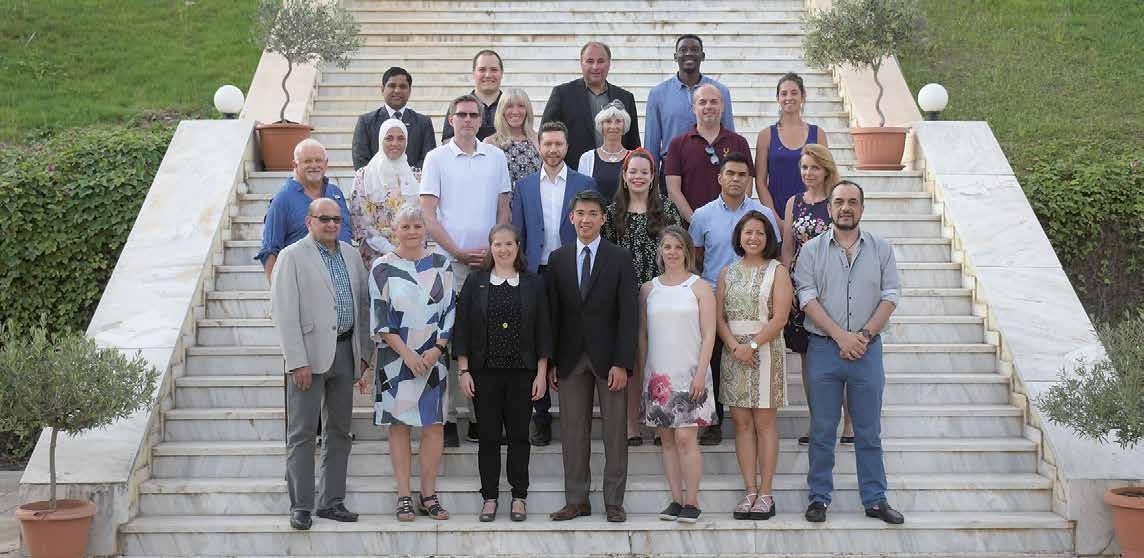
“Once again, the IOAPA Hans van Haute (HVH) Scholarship Auction brought a number of interesting items.”
On behalf of IOAPA, greetings to our Olympic family and readers of the IOA Journal.
This past June, our members reunited in Ancient Olympia to attend the 16th IOAPA Session celebrating 30 years of our association. Representing 16 countries, 22 participants journeyed to the place, which many have labeled “Second Home”. Many new members attended their first IOAPA Session, but the core of the association was well represented as well. As always, the IOAPA thanks the Ephoria of the IOA and the staff of the Academy for their support. The rekindling of the Olympic Spirit, of old friendships, and the cultivation of new friendships in the idyllic and spiritual setting of Ancient Olympia and the familiar sensations of the IOA cannot be understated.
The Opening Session was filled with IOA and IOAPA protocol, three open forums on an Introduction and History of the Association, Fostering Membership and Utilizing Partnerships, and the everpopular Olympic Quiz facilitated by Yarden Har Lev from Israel. For all of the expertise in Olympic matters, it was found that there is more to learn!
In the succeeding days, the group entered into a Workshop on IOAPA Initiatives and Country Coordinators. Working groups were formed and ideas were reported back to the assembly. The Executive Committee encouraged more presentations by members and each day’s meeting was punctuated by the varying reports of members’ activities in their countries or their area of expertise. The excellent timing
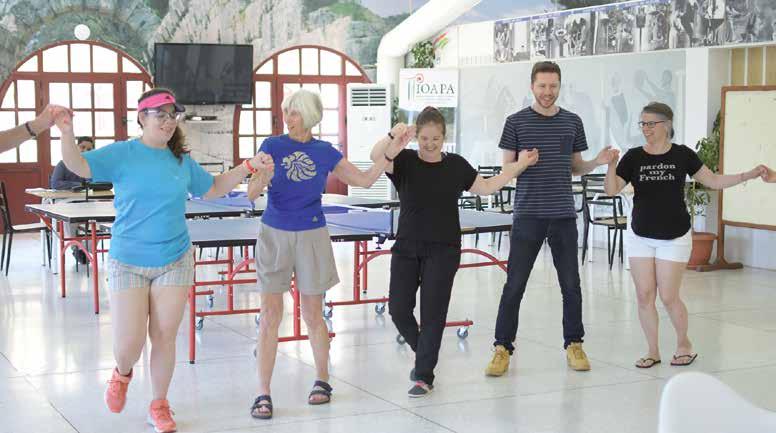
Au nom de l’IOAPA, on salue la famille olympique et les lecteurs du Journal de l’AIO.
En juin dernier, nos membres se sont réunis à Ancienne Olympie pour assister à la 16e Session de l’IOAPA célébrant les 30 ans de notre Association. Vingt-deux participants représentant 16 pays ont séjourné dans les installations de l’AIO, que beaucoup ont qualifiée de «Seconde Maison». De nombreux nouveaux membres ont assisté à leur première session de l’IOAPA, mais le noyau de l’Association y était également bien représenté. Comme toujours, l’IOAPA remercie l’Éphorie de l’AIO et le personnel de l’Académie pour leur soutien. La réactivation de l’esprit olympique, le renouement des amitiés anciennes et la culture de nouvelles amitiés dans le cadre idyllique et spirituel d’Ancienne Olympie, ainsi que les sentiments familiers ressentis au sein de l’AIO ne sauraient être suffisamment soulignés.
La séance d’ouverture a suivi le protocole prévu pour l’AIO et l’IOAPA. Ensuite il y a eu trois forums ouverts sur l’introduction et l’histoire de l’Association, la promotion de l’adhésion et l’utilisation des partenariats, et le quiz olympique toujours très populaire animé par Yarden Har Lev (Israël). Concernant toute l’expertise en matière olympique, on a constaté qu’il y avait encore beaucoup à apprendre!
Les participants à un atelier de danse.
68 – IOA Journal 16
03 02
03 02
The participants during a dance workshop.
Traditional photo of IOAPA session participants on the marble stairs.
Photo traditionnelle des participants à la session de l’IOAPA sur l’escalier en marbre.
of the session following the IOA Young Participants’ Session facilitated the attendance of six coordinators who stayed on in Olympia. This team presented a workshop in direct correlation to the theme of the YP Session, Sport and International Diplomacy. This was a fantastic opportunity for them and for the group to gain insight into the academic discussions of the preceding IOA Session. Election of the new Executive Committee took place on the last day of the session. The outgoing committee was praised and by the members present for an outstanding two years of service and continued dedication to the IOAPA.
Once again, the IOAPA Hans van Haute (HVH) Scholarship Auction brought a number of interesting items. The fierce bidding and competitive nature of the group raised more than 300 Euro for the fund. This year, two HVH scholarships for the session were awarded to Natalia Ramirez Irizarry from Puerto Rico and Roland Krimmer from Germany. The days were filled with meetings of the IOAPA in the mornings, afternoons spent in the dance workshop by Elizabeth Hanley from USA and evenings socializing. The traditional Pool Party of the IOAPA was one of the best in memory as well as the dinner at Magna Grecia, and evenings under the stars at Zorbas and on the cafeteria steps.
Immediately after the IOAPA session, we held mini-reunions at the European Games in Minsk as well as the Pan American Games in Lima, offering our members additional opportunities to reconnect and meet new friends. Many thanks go out to Anfisa Kasayanova and Ansen Sligar for organizing and greeting our members at these events.
We certainly had a fruitful summer full of activities and hope to see both old and new members who attend the next IOAPA Session in 2021 and our upcoming reunion at the Olympic Games in Tokyo! – J

«Une fois de plus, la vente aux enchères Hans van Haute (HVH), au profit de bourses d’études de l’IOAPA, s’est avérée intéressante.»
Dans les jours qui ont suivi, le groupe a participé à un atelier sur les initiatives de l’IOAPA et les coordonnateurs nationaux. Des groupes de travail ont été constitués et des idées ont été présentées à l’assemblée. La Commission exécutive a encouragé les membres à faire davantage de présentations et la réunion de chaque jour a été ponctuée par les différents rapports sur les activités des membres dans leur pays ou leur domaine de compétences. L’excellent timing de la réunion, qui a suivi la Session pour Jeunes Participants de l’AIO, a permis la participation des six coordinateurs qui sont restés à Olympie. Cette équipe a présenté un atelier en lien direct avec le sujet principal de la Session des Jeunes Participants, Sport et Diplomatie Internationale. Ce fut une occasion fantastique pour eux et pour le groupe d’avoir un aperçu des discussions académiques de la session qui venait de se conclure à l’AIO. L’élection de la nouvelle Commission exécutive a eu lieu le dernier jour de la session. La Commission sortante a été félicitée par les membres présents pour ses deux années de services remarquables et son dévouement indéfectible à l’IOAPA.
Une fois de plus, la vente aux enchères Hans van Haute (HVH), au profit de bourses d’études de l’IOAPA, s’est avérée intéressante. Les enchères acharnées et la nature compétitive du groupe ont permis la collecte de plus de 300 euros. Cette année, deux bourses HVH pour la session ont été attribuées à Natalia Ramirez Irizarry (Porto Rico) et à Roland Krimmer (Allemagne). Les journées étaient bien remplies: le matin, il y avait les réunions de l’IOAPA; les après-midi, la participation à l’atelier de danse d’Elizabeth Hanley (États-Unis); les soirées, les activités sociales. Le «Pool Party» traditionnel de l’IOAPA a été l’un des plus réussis, ainsi que le dîner à Magna Grecia, et les soirées sous les étoiles à Zorbas et sur les marches de la cafétéria.
Immédiatement après la session de l’IOAPA, nous avons tenu des mini-réunions au cours des Jeux Européens de Minsk ainsi que pendant les Jeux Panaméricains de Lima, offrant à nos membres des occasions supplémentaires de se retrouver et de rencontrer de nouveaux amis. Un grand merci à Anfisa Kasayanova et Ansen Sligar pour avoir organisé l’accueil de nos membres à ces événements.
Il va sans dire que l’été a été fructueux, rempli d’activités, et nous espérons voir les anciens et les nouveaux membres à la prochaine session de l’IOAPA en 2021 et à notre prochaine réunion aux Jeux Olympiques de Tokyo!– J
IOA Journal 16 – 69
04
04
The traditional visit of IOAPA members at Magna Grecia.
La visite traditionnelle des membres de l’IOAPA à Magna Grecia.
The NOAs around the world
Le tour du monde avec les ANO
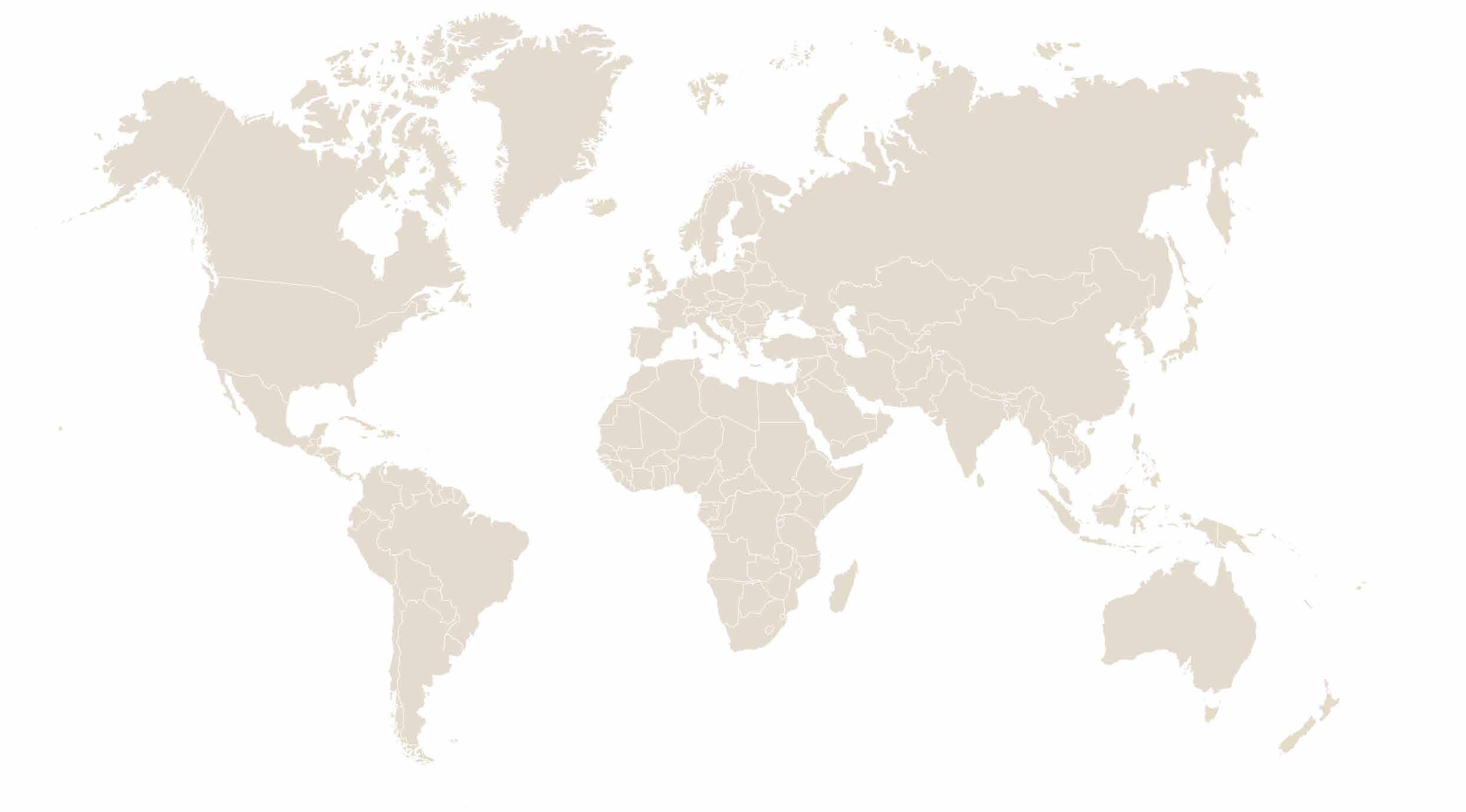
USA
The United States Olympic and Paralympic Committee (USOPC) embraces its responsibility to serve as the National Olympic Academy in the United States, and to act as a steward and educator of ...
États-Unis d’Amérique
Morocco
As part of its programme promoting Olympic values, the Moroccan National Olympic Committee has launched the “Olympic visits” programme dedicated to Moroccan Olympic history ...
Maroc
Le Comité Olympique et Paralympique des ÉtatsUnis (USOPC) assume sa responsabilité de servir d’Académie Nationale Olympique aux États-Unis ... ➜ page ➜ page
Dans le cadre de son programme de promotion des valeurs olympiques, le Comité National Olympique Marocain a lancé le programme «Visites olympiques» consacré à l’histoire ...
Czech Republic
May 2019 marked the 120th anniversary of the establishment of the Czech Olympic Committee. This provided an appropriate opportunity for promoting the principles of ...
République tchèque
Le mois de mai 2019 a marqué le 120e anniversaire de la création du Comité Olympique Tchèque. Il s’agissait d’une occasion appropriée de promouvoir ...
New Zealand
One of the highlights of 2018 for the New Zealand National Olympic Academy was organising an Olympic Refugee Day. This was a most successful event which jointly celebrated Olympic Day ...
Nouvelle-Zélande
L’un des temps forts de 2018 pour l’Académie Nationale Olympique Néo-zélandaise a été l’organisation d’une Journée olympique des réfugiés. Il s’agit d’un événement très réussi qui a célébré ...
70 – IOA Journal 16
➜ page ➜ page ➜ page ➜ page 92 91 82 82 77 76 83 83
➜ page ➜ page

Argentina
In 2017, in view of the upcoming Youth Olympic Games in Buenos Aires in 2018, the Argentine Olympic Committee, through its own Olympic Education programme, implemented a nationwide education values through sport programme from an online educational platform.
The main recipients were 1,903 teachers working in sports at the initiation level. The programme enabled teachers working in remote parts of the country to be trained and children to learn about Olympism as part of an integrated education through sport.
Since April 1, 2019, the numbers have increased, and today more than 2,300 participants are implementing an Olympic Education programme adapted to the 2019 Pan American Games
in Lima. Teachers can access the contents via an app, and the low-cost programme, while bringing together numerous participants, combines sport, education, art, culture and technology.
The programme ended on August 15, 2019 and on September 21 a seminar was held, at which the presence of Argentine lecturers and international experts in education proved most valuable.
In addition, between September 16 and 20, the 37th Session of the Argentine Olympic Academy was held, with 50 representatives of National Federations and provincial governments participating. Following International Olympic Academy guidelines, issues addressed during the session were related to the legacy of the Olympic Games, the athlete as role model, and sport as a tool for social development, promoting peace and diplomacy.
Argentine
En 2017, dans la perspective des prochains Jeux Olympiques de la Jeunesse à Buenos Aires en 2018, le Comité Olympique Argentin, à travers son propre programme d’Éducation olympique, a mis en place un programme national d’éducation aux valeurs par le sport à partir d’une plateforme éducative en ligne.
Les principaux bénéficiaires étaient 1903 enseignants travaillant dans le sport au niveau d’initiation. Le programme a permis de former des enseignants travaillant dans des régions reculées du pays et d’apprendre aux enfants à connaître l’Olympisme dans le cadre d’une éducation intégrée par le sport.
Depuis le 1er avril 2019, le nombre de participants a augmenté et aujourd’hui, plus de 2300 participants
mettent en œuvre un programme d’éducation olympique adapté aux Jeux panaméricains de 2019 à Lima. Les enseignants peuvent accéder au contenu par le biais d’une application, et le programme à faible coût, tout en réunissant de nombreux participants, combine sport, éducation, art, culture et technologie.
Le programme s’est terminé le 15 août 2019 et le 21 septembre s’est tenu un séminaire au cours duquel la présence de conférenciers argentins et d’experts internationaux en éducation s’est avérée des plus précieuses.
En outre, du 16 au 20 septembre, s’est tenue la 37e session de l’Académie Olympique Argentine, à laquelle ont participé 50 représentants des fédérations nationales et des gouvernements provinciaux. Conformément aux directives de l’Académie Internationale Olympique, les questions abordées au cours de la
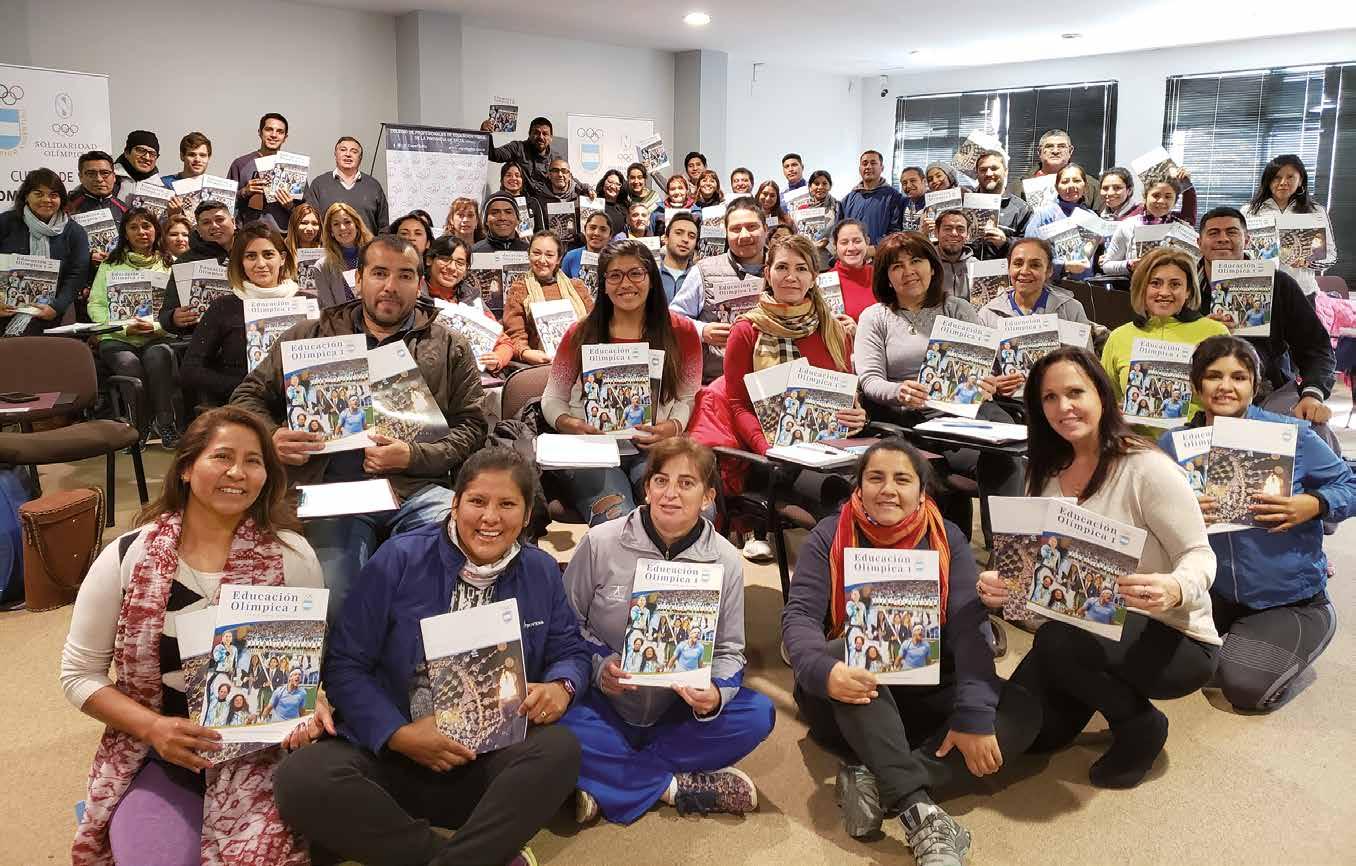
IOA Journal 16 – 71

Τhe NOAs around the world
Le tour du monde avec les ANO
session ont porté sur l’héritage des Jeux Olympiques, l’athlète comme modèle et le sport comme outil de développement social, de promotion de la paix et de la diplomatie.

Bangladesh
In 2018, the Bangladesh Olympic Association organised national games entitled “Bangladesh Youth Games” featuring 21 disciplines. The games were held at local, regional and national levels. 27,196 competitors aged up to 17 years participated. The Organising Secretary and Secretary General of BOA, Syed Shahed Reza, in recognition of his successful role, received an award on 28 November 2018 at the ANOC General Assembly in Tokyo. Also present at the event were IOC President, Dr Thomas Bach and ANOC President, Sheikh Ahmad Fahad Al Sabah.
After attending the 15th International Session for Presidents or Directors of National Olympic Academies organised by the IOA in May 2019, Fakhruddin Haider, Director General of the BOA initiated an updating of the archives in the care of the National Olympic Academy.
Within the framework of the 125th anniversary of the International Olympic Committee, a seminar was organised by the NOA with the support and financial assistance of the Bangladesh NOC. The theme was “Sport, Environment and Sustainable Development”.
The National Olympic Academy Director, Mahfuzur Rahman Siddique, was assigned by the BOA Training and Development Committee the task of supervising and reporting on the training of female teams in three disciplines in view of the forthcoming 13th South Asian Games in Nepal in 2019.
On August 5, 2019, during an event at Olympic House in which the Academy also participated, Secretary General Fakhruddin Haider delivered the finances contributed by Olympic Solidarity for the Tokyo Olympics’ preparations.
Bangladesh
En 2018, l’Association Olympique du Bangladesh (BOA) a organisé des Jeux nationaux intitulés «Jeux de la Jeunesse du Bangladesh» et portant sur 21 disciplines. Les Jeux ont eu lieu aux niveaux local, régional et national. 27 196 concurrents âgés de moins de 17 ans y ont participé. Le secrétaire organisateur et secrétaire général de la BOA, Syed Shahed Reza, en reconnaissance de son rôle réussi, a reçu un prix le 28 novembre 2018 à l’Assemblée générale de l’ACNO à Tokyo. Étaient également présents à l’événement le président du CIO, Dr Thomas Bach et le président de l’ACNO, Cheikh Ahmad Fahad Al Sabah.
Après avoir assisté à la 15ème Session
Internationale pour Présidents ou Directeurs
des Académies Nationales Olympiques organisée par l’AIO en mai 2019, Fakhruddin Haider, directeur général de la BOA, a entamé le processus de mise à jour des archives sous la responsabilité de l’ANO.
Dans le cadre du 125e anniversaire du Comité International Olympique, un séminaire a été organisé par l’ANO avec le soutien et l’assistance financière du CNO du Bangladesh. Le thème était «Sport, environnement et développement durable».
Le directeur de l’ANO, Mahfuzur Rahman Siddique, a été chargé par le Comité de formation et de développement de la BOA de superviser et de rendre compte de la formation des équipes féminines dans trois disciplines en vue des 13es Jeux sud-asiatiques au Népal en 2019.
Le 5 août 2019, lors d’un événement à la Maison olympique auquel l’Académie a également participé, le secrétaire général Fakhruddin Haider a remis les fonds apportés par la Solidarité Olympique pour la préparation des Jeux Olympiques de Tokyo.

Barbados
The National Olympic Academy of Barbados organised two Technical Seminars for Coaches. Eleven women were among the forty-five coaches who attended the two seminars, in keeping with the policy of fair representation of men and women.
NOA staff took part in sporting events involving primary and secondary school students, using mascots from previous Games as well as the Tokyo 2020 Olympic and Paralympic Games, to stimulate discussion with the children on the Olympic Movement and Olympic values.
In celebration of the International Day of Sport for Development and Peace, a Youth Education and Empowerment Workshop addressed issues such as dealing with peer pressure, nutrition on a limited budget and conflict resolution. Another workshop sought to equip community leaders with strategies for improving their programmes and bringing their communities together for peaceful, entertaining activities.

72 – IOA Journal 16
A Multi-Sport Rally, held under the theme “Street to Elite”, represented the NOC’s actions to promote programmes which use sport to advance social development and empower youth, women, and individuals in marginalised communities. Olympic Week celebrations included a Fun Day for primary school pupils. Activities targeted physical and intellectual stimulation, while emphasising the Olympic value of friendship. The event, “Discover Tokyo 2020”, introduced students to aspects of Japanese culture and raised their awareness of the upcoming Tokyo 2020 Olympics. The NOA collaborated with the Japanese Embassy in Barbados on aspects of this event. The Japanese Ambassador to Barbados, Mr Teruhiko Shinada, was present, and Embassy staff taught the art of Origami to the children and presented a Japanese choreography of the Tokyo Olympics.
Student-athletes from various secondary schools participated in a Youth Sport Lab entitled “Learn and Transform – Sport as a Tool for Peace”, at which they were asked to identify a current issue within their school and develop a strategy for addressing it.
Barbade
L’Académie Nationale Olympique de la Barbade a organisé deux séminaires techniques pour entraîneurs. Onze femmes figuraient parmi les quarante-cinq entraîneurs qui ont participé aux deux séminaires, conformément à la politique de représentation équitable des hommes et des femmes.
Le personnel de l’ANO a participé à des manifestations sportives avec des élèves du primaire et du secondaire,
en utilisant des mascottes des Jeux précédents ainsi que des Jeux Olympiques et Paralympiques de Tokyo 2020, pour stimuler le débat avec les enfants sur le Mouvement olympique et les valeurs olympiques. Pour célébrer la Journée internationale du sport au service du développement et de la paix, un atelier d’éducation des jeunes a abordé des questions telles que la pression des pairs, la nutrition avec un budget limité et la résolution des conflits. Un autre atelier visait à doter les dirigeants communautaires de stratégies pour améliorer leurs programmes et rassembler leurs communautés en vue d’activités pacifiques et divertissantes.
Une compétition multisports, organisée sous le thème «Street to Elite», a représenté les actions du CNO visant à promouvoir des programmes qui utilisent le sport pour faire avancer le développement social et autonomiser les jeunes, les femmes et les individus dans les communautés marginalisées.
Les célébrations de la Semaine olympique comprenaient une Journée de Plaisir pour les élèves du primaire. Les activités visaient la stimulation physique et intellectuelle, tout en mettant l’accent sur la valeur olympique de l’amitié. L’événement, «Découvrir Tokyo 2020», a permis aux élèves de découvrir certains aspects de la culture japonaise et de les sensibiliser aux prochains Jeux Olympiques de Tokyo 2020. L’ANO a collaboré avec l’ambassade du Japon à la Barbade sur certains aspects de cet événement. L’ambassadeur du Japon à la Barbade, M. Teruhiko Shinada, était présent, et le personnel de
l’ambassade a enseigné l’art de l’origami aux enfants et présenté une chorégraphie japonaise pour les Jeux Olympiques de Tokyo.
Des élèves-athlètes de diverses écoles secondaires ont participé à un laboratoire de la jeunesse sportive intitulé “Learn and Transform –Sport as a Tool for Peace”, au cours duquel on leur a demandé d’identifier un problème actuel dans leur école et d’élaborer une stratégie pour l’aborder.

Canada
With less than a year to the Tokyo 2020 Olympics, the Canadian Olympic School Program brings the excitement of the Olympic Movement to classrooms all around Canada. The programme offers over 100 free online education resources aimed at sparking discussions about the Olympic values, telling stories, and encouraging Canadians to adopt a healthier lifestyle. The 2018–2019 academic year proved to be successful with over 32,000 resources downloaded and over 127,000 subscriptions to the monthly newsletter!
This year, students will be able to join Team Canada athletes on a “journey” to Japan with the information gathered on Tokyo! These resources will give students an insight into every aspect of the Olympic Games, giving them the opportunity to design the ‘look’ of the Games, broadcast various sporting events and encourage environmental sustainability initiatives.
Team Canada Champion Chats is a recently launched program designed to connect Team Canada Olympians and Paralympians with classrooms in the country, from big cities to the most remote communities. The Canadian
Olympic Committee has partnered with champions to host eight live chats throughout the year 2020: four in English and four in French. Canadian athletes will have the opportunity to share with students their stories of goal-setting and teamwork, while highlighting various experiences and challenges in their pursuit of Olympic success.
Olympic Day and Pride Parades are celebrated throughout the year across Canada to build strong connections between local communities, the Canadian Olympic Movement and Team Canada. In 2019, over 27,000 Canadians participated in eleven Olympic Day celebrations in four provinces. To promote safe and easier social inclusion, Team Canada members participated in six Pride Parades across Canada as well as in the opening of a Pride House during the Lima Pan-American Games.
Canada
À moins d’un an des Jeux Olympiques de Tokyo 2020, le programme scolaire olympique canadien apporte l’enthousiasme du Mouvement olympique dans les salles de classe partout au Canada. Le programme offre plus de 100 ressources pédagogiques en ligne gratuites visant à susciter des discussions sur les valeurs
olympiques, à raconter des histoires et à encourager les Canadiens à adopter un mode de vie plus sain. L’année scolaire 2018–2019 a été un succès avec plus de 32 000 ressources téléchargées et plus de 127 000 abonnements au bulletin mensuel!
Cette année, les élèves pourront se joindre aux athlètes du Team Canada pour un «voyage» au
IOA Journal 16 – 73

Τhe NOAs around the world
Le tour du monde avec les ANO

Japon avec les informations recueillies sur Tokyo! Ces ressources donneront aux élèves un aperçu de tous les aspects des Jeux Olympiques, leur donnant l’occasion de concevoir le “look” des Jeux, de diffuser divers événements sportifs et d’encourager les initiatives de durabilité environnementale.
Team Canada Champion Chats est un programme récemment lancé pour relier les athlètes canadiens olympiques et paralympiques aux salles de classe, des grandes villes aux communautés les plus éloignées. Le Comité Olympique Canadien s’est associé à des champions pour organiser huit discussions en direct au cours de l’année 2020: quatre en anglais et quatre en français. Les athlètes canadiens auront l’occasion de partager avec les étudiants leurs histoires d’établissement d’objectifs et de travail d’équipe, tout en mettant en lumière diverses expériences et défis dans leur poursuite du succès olympique.
La Journée olympique
et les Pride Parades sont célébrés tout au long de l’année partout au Canada afin d’établir des liens solides entre les communautés locales, le Mouvement olympique canadien et Team Canada. En 2019, plus de 27000 Canadiens ont participé à onze célébrations de la Journée olympique dans quatre provinces. Afin de promouvoir une inclusion sociale sûre et plus facile, les membres du Team Canada ont participé à six Pride Parades partout au Canada ainsi qu’à l’ouverture d’une Pride House pendant les Jeux panaméricains de Lima.

Chile
During the first half of 2019, the mobile Olympic Museum visited seven cities in the country and was visited by 9,000 people. Among the cities visited were Carahue, Santiago, Canela, Talcahuano,Traiguén, Viña del Mar and Villarrica.
with the participation of the Minister of Sport, Pauline Kantor.
In May 2019, at the facilities of the PUCV School of Physical Education, an Olympic Studies Centre was established with a new research group, led by Professor Daniel Duclos, dealing with sports management and Olympic studies.
The Olympic Academy of Chile was represented at the IOA International Sessions by Jaime Agliati, Cristina Jerez and Duclos Bastias.
Goals for 2020 include an annual agreement on Olympic Studies Centres and an increase in the number of cities visited by the mobile Olympic Museum.
Olympic Day 2019 was celebrated at the Olympic Training Centre by dozens of schoolchildren, representatives of the Olympic Committee of Chile headed by its President, Miguel Ángel Mujica, President of the Olympic Academy of Chile, Jaime Agliati Valenzuela, and
Chili
Au cours du premier semestre 2019, le Musée olympique itinérant a visité sept villes du pays et a ouvert ses portes à 9000
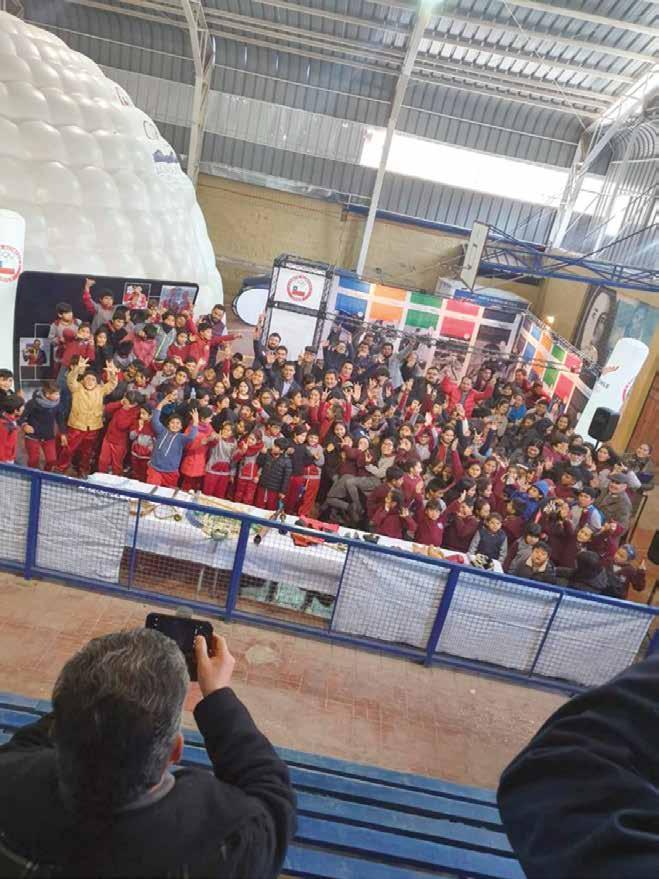
74 – IOA Journal 16

personnes. Parmi les villes visitées figurent Carahue, Santiago, Canela, Talcahuano, Traiguén, Viña del Mar et Villarrica.
La Journée olympique 2019 a été célébrée au Centre d’entraînement olympique par des dizaines d’écoliers, des représentants du Comité Olympique du Chili dirigé par son président, Miguel Ángel Mujica, le président de l’Académie Olympique du Chili, Jaime Agliati Valenzuela, et avec la participation de la ministre des Sports, Pauline Kantor.
En mai 2019, dans les locaux de l’école d’éducation physique PUCV, un Centre d’études olympiques a été créé avec un nouveau groupe de recherche, dirigé par le professeur Daniel Duclos, sur la gestion du sport et les études olympiques.
L’Académie Olympique du Chili était représentée aux sessions internationales de l’AIO par Jaime Agliati, Cristina Jerez et Duclos Bastias.
Les objectifs à l’horizon 2020 comprennent un accord annuel sur les Centres d’études olympiques et une augmentation du nombre de villes visitées par le Musée olympique itinérant.

Croatia
The Croatian Olympic Academy coordinated several Olympic Day celebrations in Croatia, which took place in several locations (Poreč, Rijeka, Split, Zagreb, Osijek and the islands of Brač and Pag). It also organised the first Olympic Day Run in Croatia (the race marking International Olympic Day), with the participation of 478 runners. Olympic rower Damir Martin (silver medallist at the 2012 London Olympics and the 2016 Rio de Janeiro Olympics) was the race ambassador; the event was also attended – among many Olympic athletes – by Olympic shooter Josip Glasnović (2016 Olympic Champion in Rio de Janeiro) and tennis player Ana Konjuh.
In March 2019, the Croatian Olympic Academy launched a pilot project of workshops on Olympism and the Olympic values for primary and secondary school students.
Upon their completion, it was clear that the project had exceeded all expectations. A total of 60 workshops were held from March to June with over 1,000 primary and secondary school pupils taking part. Each educational
workshop lasts 45 minutes and is held with physical education or class teachers in the school gym instead of the conventional classroom. Through the workshops, and the use of interactive methods, students are given the opportunity to learn about the ancient Olympic Games, the modern Olympic Μovement, its founder Pierre de Coubertin and the Olympic values. A folder containing materials concerning the workshops on Olympism and the Olympic values for primary and secondary school students is in preparation. There was also a presentation of the project at the physical education teachers meeting organised by the Croatian School Sports Association at the University of Zagreb. The Croatian Olympic Academy has also supported and assisted the SOS Olympics project of Marija Lozančić, member of the Young Change-Maker family of the International Olympic Committee. The project has been approved by the IOC and is being developed with the sponsorship of the IOC and Panasonic. In this context, an outdoor sports centre was opened in the SOS Children’s Village Ladimirevci. The project’s objective was to include children without parental care in the
community, ensure sports development for them, and teach them tolerance and the core values of Olympism: excellence, respect and friendship.
Croatie
L’Académie Olympique Croate a coordonné plusieurs célébrations de la Journée olympique en Croatie, qui ont eu lieu en plusieurs endroits (Pore č , Rijeka, Split, Zagreb, Osijek et les îles Bra č et Pag). Elle a également organisé la première Olympic Day run (la course marquant la Journée internationale olympique), avec la participation de 478 coureurs. Le rameur olympique Damir Martin (médaillé d’argent aux Jeux Olympiques de Londres en 2012 et aux Jeux Olympiques de Rio de Janeiro en 2016) était l’ambassadeur de la course; le tireur Josip Glasnovi ć (champion olympique de Rio de Janeiro en 2016) et Ana Konjuh, joueuse de tennis étaient également présents.
En mars 2019, l’Académie Olympique Croate a lancé un projet pilote d’ateliers sur l’Olympisme et les valeurs olympiques pour les élèves
IOA Journal 16 – 75

Τhe NOAs around the world
Le tour du monde avec les ANO
du primaire et du secondaire. Une fois le projet terminé, il était clair qu’il avait dépassé toutes les attentes. Au total, 60 ateliers ont été organisés de mars à juin de cette année, auxquels ont participé plus de 1000 élèves du primaire et du secondaire. Chaque atelier éducatif d’une durée de 45 minutes se déroule dans le gymnase de l’école avec des professeurs d’éducation physique ou des professeurs de classe au lieu de la classe conventionnelle. Grâce aux ateliers et à l’utilisation de méthodes interactives, les élèves ont l’occasion de découvrir les Jeux Olympiques anciens, le Mouvement olympique moderne, son fondateur Pierre de Coubertin et les valeurs olympiques.
Un dossier contenant du matériel concernant les ateliers sur l’Olympisme et les valeurs olympiques pour les élèves du primaire et du secondaire est en préparation. Le projet a également été présenté lors de la réunion des professeurs d’éducation physique organisée par l’Association croate du sport scolaire à l’université de Zagreb.
L’Académie Olympique Croate a également soutenu et assisté le projet SOS Olympiades de Marija Lozan č i ć , membre de la famille des Young ChangeMakers du Comité International Olympique. Le projet a été approuvé par le CIO et est en cours d’élaboration avec le parrainage du CIO et de Panasonic. Dans ce contexte, un centre sportif en plein air a été ouvert dans le Village d’enfants SOS Ladimirevci.
L’objectif du projet était d’inclure les enfants privés de soins parentaux dans la communauté, d’assurer leur développement sportif et de leur enseigner la tolérance et les valeurs olympiques essentielles: excellence, respect et amitié.

Cyprus
The Cyprus Olympic Committee continued the implementation of Olympic education programmes with various age groups.
On February 22, the Cyprus Pierre de Coubertin Committee, in collaboration with the Cyprus Ministry of Education and Culture, organised the 8th Cyprus Student Conference where more than 100 students from schools from all over Cyprus were invited to participate and present their works on the topic: “The athlete as role model through the eyes of the students”.
On March 20, the Cyprus Olympic Academy, in collaboration with the ‘’Woman and Sports’’ committee of the Cyprus Olympic Committee, organised a Session on the topic: “The Female Nature and the Olympic Ideal: Common or unknown ground”. The keynote speaker was Dr Kyriaki Oudantzi, Director of the Olympic Museum in Thessaloniki.
Olympic Day was celebrated on September 22. The event
took place at the Cyprus Olympic House and included sport presentations by various sports federations.
Chypre
Le Comité Olympique de Chypre a poursuivi la mise en œuvre de programmes d’éducation olympique avec différents groupes d’âge.
Le 22 février, le Comité Pierre de Coubertin de Chypre, en collaboration avec le Ministère de l’Éducation et de la Culture de Chypre, a organisé la 8ème Conférence des Écoliers de Chypre à laquelle plus de 100 élèves de toutes les écoles de Chypre ont été invités à participer et à présenter leurs travaux sur le thème «L’athlète comme modèle à travers les yeux des élèves».
Le 20 mars, l’Académie Olympique de Chypre, en collaboration avec le Comité «Femme et Sports» du Comité Olympique de Chypre, a organisé une session sur le thème «La nature féminine et l’idéal olympique: terrain d’entente ou inconnu». La Dr Kyriaki Oudantzi, directrice du
Musée olympique de Thessalonique, était l’orateur principal.
La Journée olympique a été célébrée le 22 septembre. L’événement s’est déroulé à la Maison olympique de Chypre et comprenait des présentations sportives par diverses fédérations sportives.

Czech Republic
May 2019 marked the 120th anniversary of the establishment of the Czech Olympic Committee. This provided an appropriate opportunity for promoting the principles of Olympism to the general public and demonstrating that Olympism and sport have had a major impact on the formation of Czechoslovaks and Czech society.
The Czech Olympic Academy has been working with important institutions such as Charles University, the Military History Institute, the Memory of Nations, Czech Television, Czech Radio, the International Olympic Committee, and the European
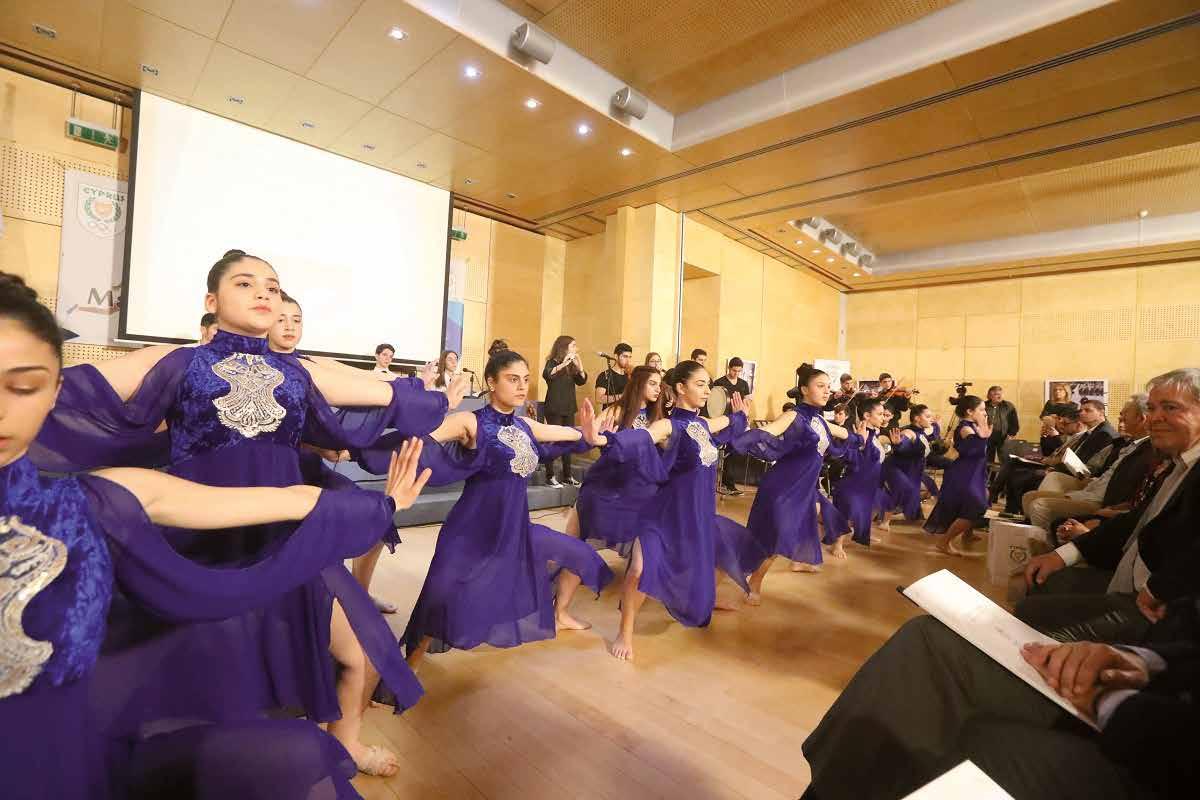
76 – IOA Journal 16
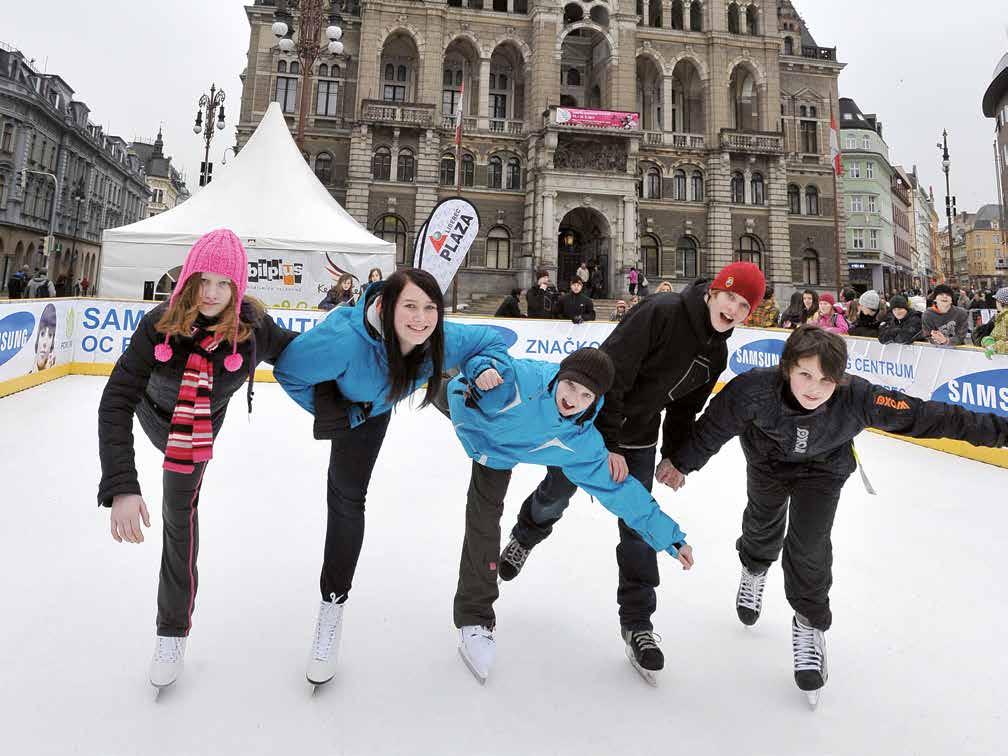
Olympic Committees.
On Monday June 17, the concert “Masters to the Masters” took place at the Prague Rudolfinum, former seat of the Czechoslovak Parliament. The concert was held in honour of the Czech National Olympic Committee by the Academy of Classical Music, which also organises the Dvořák Prague International Music Festival.
During the concert, important sports personalities were honoured by the Czech Olympic Committee. Awards were given to three-time javelin Olympic gold medallist, Jan Železný, and double Olympic rowing medallist and Chairman of the Czech Olympians Club, Oldřich Svojanovský. Honorary plaques were awarded to commemorate gymnastics Olympic champion, Věra Čáslavská, and Olympian, Sokol member, and member of the war-time Resistance, František Pecháček.
In the second half of June, a book was published that imaginatively depicts the story of Czech Olympism at all levels: the establishment of the Czech National Olympic Committee by Jiří Stanislav
Guth-Jarkovský, one of the founders of the International Olympic Committee; the development of sport during the First Republic; and the story of Olympism during the Protectorate and the communist era. A significant part of the book also covers the modern sports history of the Czech Republic. The book includes photos and facts not previously published.
In the autumn, in the framework of the 30th anniversary of the Velvet Revolution, which in 1989 overthrew communism in Czechoslovakia, an outdoor photo exhibition in Prague has been planned, entitled “Key Moments in Czechoslovak History and Sport”. It will highlight important milestones for the modern Czech state and sport.
République tchèque
Le mois de mai 2019 a marqué le 120e anniversaire de la création du Comité Olympique Tchèque. Il s’agissait d’une occasion appropriée de promouvoir les principes de l’Olympisme
auprès du grand public et de démontrer que l’Olympisme et le sport ont eu un impact majeur sur la formation des Tchécoslovaques et de la société tchèque. L’Académie Ο lympique Τ chèque a travaillé avec d’importantes institutions telles que l’Université Charles, l’Institut d’histoire militaire, la Mémoire des Nations, la télévision tchèque, la radio tchèque, le Comité Ι nternational Ο lympique et les Comités Olympiques Européens. Le lundi 17 juin, le concert Masters to Masters a eu lieu au Rudolfinum de Prague, ancien siège du Parlement tchécoslovaque. Le concert a été organisé en l’honneur du CNO tchèque par l’Académie de musique classique, qui organise également le Festival international de musique Prague de Dvo ř ák. Au cours du concert, d’importantes personnalités sportives ont été honorées par le Comité Olympique Tchèque. Des prix ont été décernés à Jan Ž elezn ý , triple médaillé
d’or olympique en javelot, et à Old ř ich Svojanovsk ý , double médaillé olympique en aviron et président du Club olympique tchèque. Des plaques honorifiques ont été décernées pour commémorer la championne olympique de gymnastique, V ě ra Č áslavská, et l’olympien, membre de Sokol, et membre de la Résistance en temps de guerre, Franti š ek Pechá č ek. Dans la deuxième quinzaine de juin, un livre a été publié qui décrit de manière imaginative l’histoire de l’Olympisme tchèque à tous les niveaux: la création du CNO tchèque par Ji ř í Stanislav GuthJarkovsk ý , l’un des fondateurs du Comité International Olympique; le développement du sport sous la Première République; l’histoire de l’Olympisme sous le Protectorat et l’ère communiste. Une partie importante de l’ouvrage couvre également l’histoire du sport moderne de la République tchèque. Le livre comprend des photos et des faits inédits. En automne, dans le cadre du 30e anniversaire de la Révolution de velours, qui a entraîné la chute du communisme en Tchécoslovaquie en 1989, une exposition de photos en plein air est prévue à Prague, intitulée «Les moments clés de l’histoire et du sport tchécoslovaque». Cette exposition met en évidence les étapes importantes pour l’État et le sport tchèques modernes.

Germany
On June 26, the German Olympic Academy organised the Olympic and Paralympic sports festival for the sixth consecutive time at the premises of the German Sports
IOA Journal 16 – 77

Τhe NOAs around the world
Le tour du monde avec les ANO
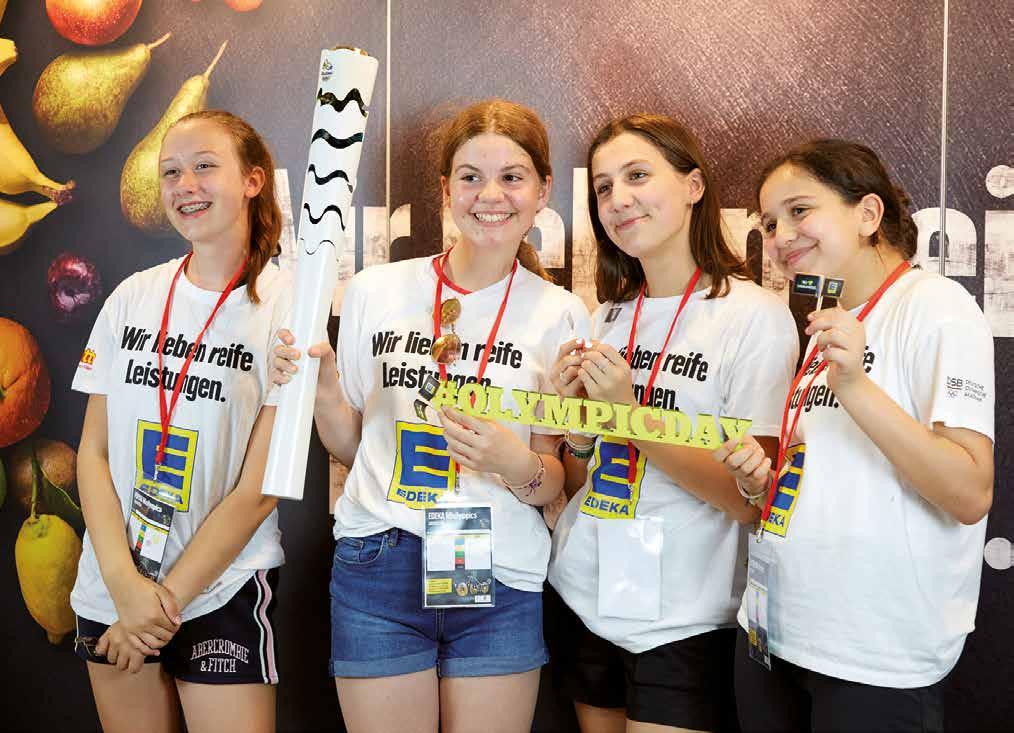
and Olympic Museum in Cologne. Over 4,000 participants attended the German edition of the event.
To meet the rising demand and interest from cooperation partners and schools, the German Olympic Academy doubled the number of events, and included many new sports activities and a larger number of participants. Climbing, skateboarding and 3x3 basketball, which will make a first appearance at Tokyo 2020, were presented for the first time.
One of the highlights of the Olympic Day was once again the appearance of the Olympic and Paralympic athletes, who joined the event to present their disciplines and talk about their lives and careers as sports professionals.
Taekwondo Olympian Helena Stanek (Bronze medallist at London 2012) presented her sport along with athletes from the German national team.
Fencer and 2019 European Champion Benedikt Wagner not only demonstrated his fencing skills, but also showed the medal he had won four days earlier. At the event were also present:
Irmgard Bensusan, Paralympic track and field triple silver medallist at Rio 2016; Hans-Peter Durst, Paralympic cyclist, double gold medallist at Rio 2016; Hannes Ocik, rower, silver medallist at Rio 2016; Lukas Resch, badminton player, bronze medallist at the 2018 Youth Olympic Games in Buenos Aires; Sylvia Schulz, track and field athlete and cyclist Annika Zeyen, gold medallist at the London 2012 Paralympics.
In addition to the main event for children, there were also three academic events on the occasion of the Olympic Day. Students at the German Sports University Cologne attended a seminar on “Olympic Studies“, which ended with a fictional bidding for the Olympic Games. Also, the Olympic Studies Centre “Willibald-Gebhardt-Institute” at Muenster University organized an “Olympic Science Day“ featuring lectures and workshops on Olympic Education and the International Coaching Courses at Leipzig University organised an open sports festival for children and an international sports festival for students.
Allemagne
Le 26 juin, l’Académie Olympique Allemande a organisé pour la sixième fois consécutive le Festival des sports olympiques et paralympiques dans les locaux du Musée olympique et sportif allemand à Cologne. Plus de 4 000 participants ont assisté à l’édition allemande de l’événement.
Pour répondre à la demande et à l’intérêt croissants des partenaires et des écoles, l’Académie Olympique Allemande a doublé le nombre d’événements qui comptent désormais plusieurs nouvelles activités sportives et un nombre accru de participants. L’escalade, le skateboard et le basket-ball 3x3, qui sera une première à Tokyo en 2020, ont été présentés pour la première fois.
Les athlètes olympiques et paralympiques qui se sont joints à l’événement pour présenter leurs disciplines et parler de leur vie et de leur carrière en tant que professionnels du sport, ont
une fois de plus été l’un des moments forts de la Journée olympique. La championne olympique de taekwondo Helena Stanek (médaillée de bronze à Londres en 2012) a présenté son sport avec les athlètes de l’équipe nationale allemande. L’escrimeur et champion d’Europe 2019, Benedikt Wagner, a non seulement démontré ses talents d’escrimeur, mais il a aussi montré la médaille qu’il avait gagnée quatre jours auparavant. Étaient également présents à l’événement: Irmgard Bensusan, triple médaillé d’argent en athlétisme paralympique à Rio 2016; Hans-Peter Durst, cycliste paralympique, double médaillé d’or à Rio 2016; Hannes Ocik, rameur, médaillé d’argent à Rio 2016; Lukas Resch, joueur de badminton, médaillé de bronze aux Jeux Olympiques de la Jeunesse Buenos Aires 2018; Sylvia Schulz, athlète et coureur en athlétisme et Annika Zeyen, médaillée d’or aux Jeux Paralympiques de Londres 2012. En plus de l’événement principal pour les enfants, il y a eu trois événements académiques à l’occasion de la Journée olympique. Des étudiants de l’université sportive allemande de Cologne ont participé à un séminaire sur les «Études olympiques» qui s’est terminé par une candidature fictive pour les Jeux Olympiques. Le Centre d’études olympiques
“Willibald-Gebhardt-Institut” de l’université de Münster a organisé une «Journée des sciences olympiques» où des conférences et des ateliers ont porté sur l’éducation olympique. Dans le cadre des cours internationaux pour entraîneurs de l’université de Leipzig, ont été organisés un festival sportif ouvert à tous les enfants et un festival sportif international pour étudiants.
78 – IOA Journal 16

Islamic Republic of Iran
After appointing Professor Reza Gharakhanlou, the Director of the National Olympic Academy of Iran, as a member of the Culture and Education Commission of ANOC, the NOA of Iran has started 2019 with a new approach, placing more emphasis on the Olympic values.
In agreement with the political and social approach of the Olympic Academy of Iran, and in keeping with the legacy of the IOC for the social aspects of Olympism, even the celebration of the Olympic Week differed from previous years, establishing one day for underprivileged children in order to inspire hope through sport among this group.
The Academy has developed numerous and important activities, such as scholarships granted to elite athletes amongst youngsters aged from 13 to 15 in separate male and female groups, with the aim of preparing them for the Youth Olympic Games. This group of elite athletes was hosted by the NOA of Iran for three days. In
this period, they participated in different programmes, such as medical and fitness test procedures and workshops, as well as the Olympic Values Education Programme (OVEP).
Following these three days, the children have remained in constant contact with the expert team and will have attended the Academy on two more occasions by the end of the year.
After establishing the OVEP department at the beginning of 2019, in collaboration with Alzahra University, a congress on Olympic values was held for university students. After which a workshop entitled “Education based on Olympic values” was held specifically for physical education teachers all over the country, and included the following subjects: History of Olympism, Olympic Games editions, OVEP and its goals, education based on Olympic values and sustainability in sport. Participants in this course are committed, as Olympic ambassadors, to spread Olympism in their schools and cities.
The educational training course titled “Olympic Peace Ambassadors Training Course” was intended for young people between 13 to 15 years in separate male and female groups within four days in
cooperation with the Olympic Committee of Iran. The young people met famous athletes and visited the National Sports, Olympic and Paralympic Museum. The History of the Olympic Games and Olympic values, sports ethics, health and sport, preventing sports injuries, peace and sport, fitness test procedures, sport and environment, sport and art, were amongst the topics addressed during the courses.
République islamique d’Iran
Après avoir nommé le professeur Reza Gharakhanlou, directeur de l’Académie Nationale Olympique d’Iran, comme membre de la Commission Culture et Education de l’ACNO, l’ANO d’Iran a commencé 2019 avec une nouvelle approche, mettant davantage l’accent sur les valeurs olympiques.
En accord avec l’approche politique et sociale de l’Académie Olympique d’Iran, et en accord avec l’héritage du CIO pour les aspects sociaux de l’Olympisme,
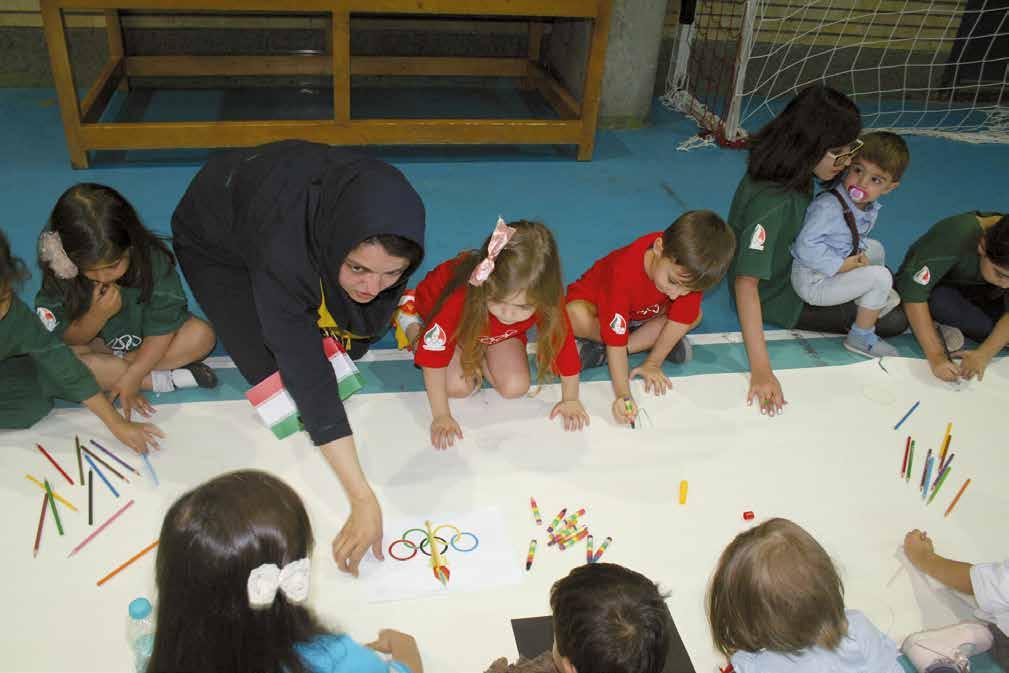
même la célébration de la Semaine olympique a été différente des années précédentes, prévoyant une journée pour les enfants défavorisés afin de susciter l’espoir par le sport parmi ce groupe.
L’Académie a développé de nombreuses et importantes activités, telles que l’octroi de bourses à des athlètes d’élite parmi les jeunes de 13 à 15 ans dans des groupes séparés d’hommes et de femmes, dans le but de les préparer aux Jeux Olympiques de la Jeunesse. Ce groupe d’athlètes d’élite a été accueilli par l’ANO d’Iran pendant trois jours. Au cours de cette période, ils ont participé à différents programmes, tels que des contrôles médicaux et des tests d’aptitude physique, des ateliers, ainsi qu’au Programme d’éducation aux valeurs olympiques (PEVO). Après ces trois jours, les enfants sont restés en contact permanent avec l’équipe d’experts et auront fréquenté l’Académie à deux autres reprises d’ici la fin de l’année.
Après la création du département PEVO en début 2019, en collaboration avec l’université Alzahra, un congrès sur les valeurs olympiques a été organisé pour les étudiants universitaires. Après quoi, un atelier intitulé «Éducation axée sur les valeurs olympiques» a été organisé spécifiquement pour les professeurs d’éducation physique dans tout le pays, et a porté sur les sujets suivants: l’histoire de l’Olympisme, les éditions des Jeux Olympiques, le PEVO et ses objectifs, l’éducation basée sur les valeurs olympiques et la durabilité dans le sport. Les participants à ce cours s’engagent, en tant qu’ambassadeurs olympiques, à diffuser l’Olympisme dans leurs écoles et leurs villes.
IOA Journal 16 – 79

Τhe NOAs around the world
Le tour du monde avec les ANO
Le cours de formation de quatre jours intitulé «Cours de formation des ambassadeurs de la paix olympique» et organisé en coopération avec le Comité Olympique Iranien, était destiné aux jeunes de 13 à 15 ans dans des groupes séparés d’hommes et de femmes. Les jeunes ont rencontré des athlètes célèbres et visité le Musée national des sports, des Jeux Olympiques et Paralympiques. L’histoire des Jeux Olympiques et les valeurs olympiques, l’éthique sportive, la santé et le sport, la prévention des blessures sportives, la paix et le sport, les procédures de tests d’aptitude physique, le sport et l’environnement, le sport et l’art, étaient parmi les sujets traités pendant les cours.

Israel
The International Olympic Day has become a day of celebration in Israel, a significant step toward realising the Olympic ideal and raising awareness among the Israeli public about the Olympic Movement and its values. In that spirit, the Israeli National Olympic Academy and the Gender Equality Committee of the Olympic Committee of Israel, together with the Academic College at Wingate, conducted the 1st International Conference on Sport and Gender. The aim of the conference was to discuss the challenges in women’s sport and to promote equality between men and women in Israel. The ground-breaking conference hosted an impressive list of guests, such as basketball legend and Olympic medallist Nancy Liebermann and Igal Carmi, President of the Olympic Committee of Israel. IOC President, Thomas Bach sent a video greeting that opened
the conference. The event was attended by over 200 participants, including sport officials, coaches, athletes, journalists, students and physical education teachers.
According to Suzy Yogev, Chair of the Gender Equality Committee in the Olympic Committee of Israel: “Women are still under-represented in the sports field, with a representation rate of only 21%. Nevertheless, light can be seen at the end of the tunnel and the will to make change happen is strong.”
The President of the Olympic Committee of Israel, Igal Carmi declared: “With initiatives like this conference, we can send a strong message about the advancement of women in sport. We are committed to closing the gaps between the genders both inside and outside the sports arena. The objective of gender equality is not obvious, and we will do our utmost for it to be realised in Israeli sport.”
Finally, the Israeli Olympic Academy, in collaboration with the Israeli Centre for Olympic Studies, conducted for the fourth consecutive year the Israel Olympic Quiz. This year, the main subject was women and Olympic Sport. Eight physical education students from all over Israel qualified for the finals. Gili Lustig, CEO of the Olympic Committee of Israel, commented, “The Olympic Quiz is a wonderful means for
expanding knowledge in the field of Olympic Sport and a way to promote the values of the Olympic Movement.” Yarden Har Lev, initiator and producer of the Israel Olympic Quiz, added: “The uniqueness of this Olympic Quiz is that it allows as many people as possible to have simultaneous access to Olympic knowledge.”
Israël
La Journée internationale olympique est devenue un jour de célébration en Israël, un pas important vers la réalisation de l’idéal olympique et la sensibilisation du public israélien au Mouvement olympique et à ses valeurs. Dans cet esprit, l’Académie Nationale Olympique Israélienne et le Comité pour l’égalité des sexes du Comité Olympique Israélien, en collaboration avec le Collège universitaire de Wingate, ont organisé la première Conférence internationale sur le sport et le genre. L’objectif de la conférence était de discuter des défis du sport féminin et de promouvoir l’égalité entre les hommes et les femmes en Israël. La conférence novatrice a accueilli un nombre impressionnant d’invités, tels que la légende du basket-
ball et médaillée olympique Nancy Liebermann et Igal Carmi, président du Comité Olympique d’Israël. Le président du CIO, Thomas Bach, a ouvert la conférence par une vidéo-allocution. Plus de 200 participants, dont des officiels sportifs, des entraîneurs, des athlètes, des journalistes, des étudiants et des professeurs d’éducation physique, ont assisté à l’événement.
Selon Suzy Yogev, présidente du Comité pour l’égalité des sexes du Comité Olympique d’Israël: «Les femmes sont encore sousreprésentées dans le domaine du sport, avec un taux de représentation de seulement 21%. Néanmoins, on peut voir la lumière au bout du tunnel et la volonté de faire bouger les choses est forte.» Le président du Comité Olympique d’Israël, Igal Carmi a déclaré: «Avec des initiatives comme cette conférence, nous pouvons envoyer un message fort sur l’avancement des femmes dans le sport. Nous nous engageons à combler les écarts entre les sexes à l’intérieur et à l’extérieur de l’arène sportive. L’objectif de l’égalité des sexes n’est pas évident, et nous ferons tout notre possible pour qu’il soit réalisé dans le sport israélien». Enfin, l’Académie Olympique Israélienne, en
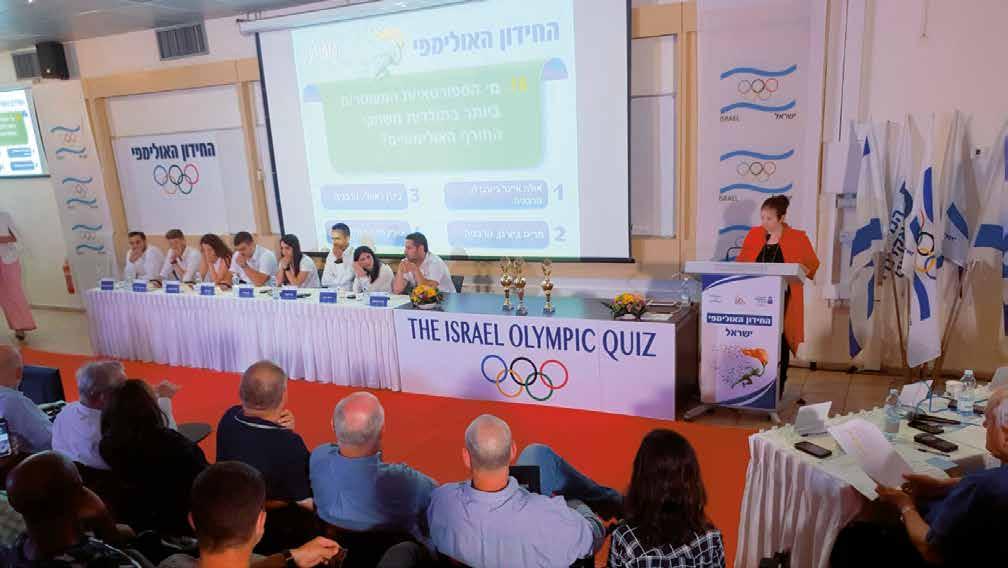
80 – IOA Journal 16
collaboration avec le Centre israélien d’études olympiques, a organisé pour la quatrième année consécutive le Quiz olympique israélien. Cette année, le sujet principal était les femmes et le sport olympique. Huit étudiants en éducation physique de tout Israël se sont qualifiés pour la finale. Gili Lustig, PDG du Comité Olympique d’Israël, a commenté: «Le Quiz olympique est un moyen merveilleux d’élargir les connaissances dans le domaine du sport olympique et de promouvoir les valeurs du Mouvement olympique». Yarden Har Lev, initiatrice et productrice du quiz olympique israélien, a ajouté: «Le caractère unique de ce quiz olympique est qu’il permet à autant de personnes que possible d’accéder simultanément aux connaissances olympiques».

Latvia
March 21, 2019 marked the 30th anniversary of the founding of the Latvian Olympic Academy. The main target of the Academy is to promote the dissemination of Olympic ideas, to organise educational events, competitions, exhibitions and sporting events, to publish methodological materials and to organise participation in events of the International Olympic Academy.
The Latvian Olympic Academy regularly issues newsletters for those interested in Olympic matters, which feature historical studies of Latvian Olympic medallists. Readers are initiated into the myths, rituals and traditions of the Olympic Games in ancient Greece, whilst teachers are offered a Model Plan for introducing young people to Olympic values.
The Latvian Olympic Academy also prepared posters dedicated to Olympic
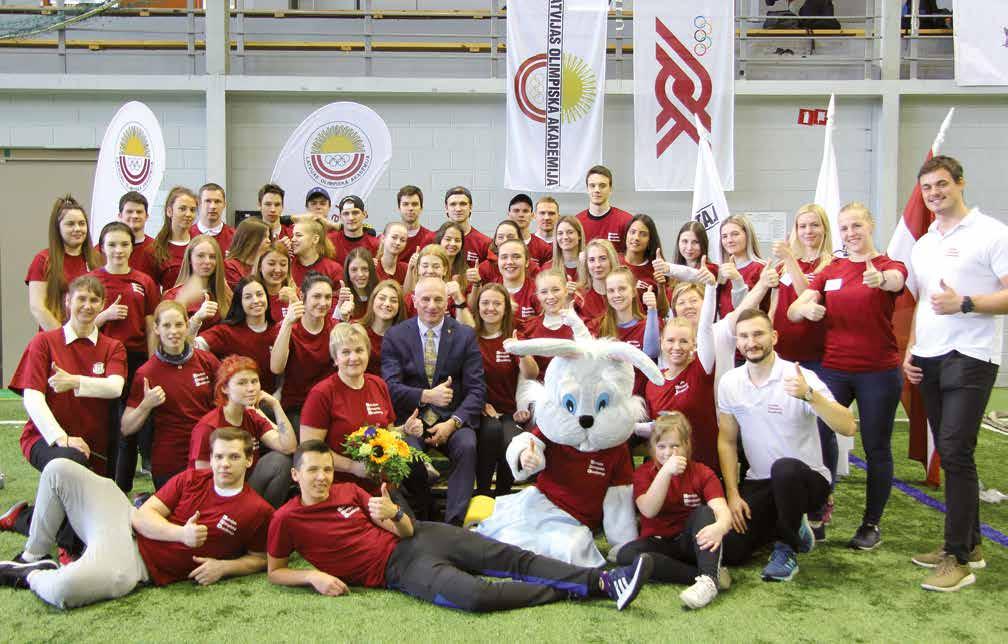
education, which are both visually appealing and informative. Posters are available on the Academy website: http://loa.lv/ publikacijas/olimpiskasizglitibas-plakati/
Latvia has been celebrating Olympic Day since 1992; initially it was called the Olympic Runners’ Day in Riga. Since 2011, the Latvian Olympic Day has been held in September starting with simultaneous morning gymnastics all over the country. In recent years, Olympic Day has been included in the programme of the European Sport Week, aimed at promoting physical activities throughout Europe and inviting everyone in Latvia to participate.
Every year since 1992, two young people from Latvia have been given the opportunity to take part in the Sessions of the International Olympic Academy at Olympia. This participation is awarded by the Latvian Olympic Academy to the winner of an annual research competition on Latvia’s radio and television to find the person with the best solutions to problems challenging the Olympic Movement.
During the Olympic Day 2019 on September 20, former participants at the IOA Sessions met at Latvia’s Sports
Museum to recall their time spent at Olympia, and speak about the new ideas that the Olympic Movement should develop in the future.
Lettonie
Le 21 mars 2019 marquait le 30e anniversaire de la fondation de l’Académie Olympique Lettone. L’objectif principal de l’Académie est de promouvoir la diffusion des idées olympiques, d’organiser des rencontres éducatives, des compétitions, des expositions et des manifestations sportives, de publier du matériel méthodologique et d’organiser la participation aux manifestations de l’Académie Internationale Olympique.
L’Académie Olympique
Lettone publie régulièrement des bulletins d’information pour ceux qui s’intéressent aux questions olympiques, qui présentent des études historiques des médaillés olympiques lettons. Les lecteurs sont initiés aux mythes, aux rituels et aux traditions des Jeux Olympiques de la Grèce antique, tandis que les enseignants reçoivent un plan modèle pour initier les
jeunes aux valeurs olympiques.
L’Académie Olympique
Lettone a également préparé des affiches consacrées à l’éducation olympique, qui sont à la fois visuellement attrayantes et informatives. Les affiches sont disponibles sur le site Web de l’Académie: http://loa.lv/ publikacijas/olimpiskasizglitibas-plakati/ La Lettonie célèbre la Journée olympique depuis 1992, initialement appelée «Journée des coureurs olympiques» à Riga. Depuis 2011, la Journée olympique lettone se tient en septembre, en commençant par la gymnastique matinale simultanée dans tout le pays. Ces dernières années, la Journée olympique a été inscrite au programme de la Semaine européenne du sport, qui vise à promouvoir l’activité physique dans toute l’Europe et à inviter chacun en Lettonie à y participer.
Chaque année depuis 1992, deux jeunes lettons ont eu l’occasion de participer aux sessions de l’Académie Internationale Olympique à Olympie. Cette participation est décernée par l’Académie Olympique Lettone au lauréat d’un concours annuel de recherche à la radio et à la télévision lettones pour
IOA Journal 16 – 81

Τhe NOAs around the world
Le tour du monde avec les ANO
trouver la personne ayant les meilleures solutions aux problèmes qui défient le Mouvement olympique.
Au cours de la Journée olympique 2019, le 20 septembre, les anciens participants aux sessions de l’AIO se sont réunis au Musée du sport de Lettonie pour rappeler le temps passé à Olympie et parler des nouvelles idées que le Mouvement olympique devrait développer à l’avenir.

Lithuania
For the second year in succession, the Lithuanian Olympic Academy held a seminar for coaches on Olympic Education, in which coaches of various sports from all over Lithuania participated.
Last year, the Academy focused on the development of character through sport: a sports psychologist instructed the coaches on the various types of athletes and their positive and negative features, raising questions about what it means to “listen”, and what needs to be done to make an athlete feel positive before a competition. Together with the coaches, an analysis was made of what it means to be a good coach, how a coach can influence the character development of an athlete, how Olympic values are reflected in sports and how a coach shapes the athlete’s values. In the discussion groups, coaches talked about real situations encountered in their work and how they search for solutions, taking into account the influence that one or another decision might have on the shaping of an athlete’s values.
This year, coaches learned about the sports policies adopted in the country, discussed the importance of leadership in the sports sector, the need for cooperation between federations and
institutions of higher education, and raised the issue of athletes’ security (social, health etc.). The seminar addressed the psychological “side effects” of physical activity, the importance of self-control, the role of a coach in finding motivation for a child involved in sports and the importance of showing a child his or her own progress.
Participants received numerous practical tips on how to control the muscular system and learned about the importance of practising movements, executing exercises correctly, and how pain (headache, back pain etc.) is related to health issues in other parts of the body.
The coaches showed great interest in a psychotherapist’s presentation on the psychological qualities of a good coach, the importance of understanding that everyone is vulnerable, of focusing on the process instead of on the end result, and on the coach’s role as guide in a child’s life.
Lituanie
Pour la deuxième année consécutive, l’Académie Olympique Lituanienne a organisé un séminaire d’éducation olympique pour entraîneurs, auquel ont participé des entraîneurs de différents sports de toute la Lituanie.
L’année dernière, l’Académie s’est concentrée sur le développement du caractère par le sport: un psychologue du sport a parlé aux entraîneurs des différents types d’athlètes et leurs caractéristiques positives et négatives, soulevant des questions sur ce que signifie «écouter», et ce qui doit être fait pour qu’un athlète se sente positif avant une compétition. En collaboration avec les entraîneurs, on a analysé ce que signifie être un bon entraîneur, comment un entraîneur peut influencer le développement du caractère d’un athlète, comment les
valeurs olympiques se reflètent dans les sports et comment un entraîneur façonne les valeurs de l’athlète. Dans les groupes de discussion, les entraîneurs ont parlé de situations réelles rencontrées dans leur travail et de la façon dont ils cherchent des solutions, en tenant compte de l’influence que l’une ou l’autre décision peut avoir sur la formation des valeurs de l’athlète.
Cette année, les entraîneurs ont pris connaissance des politiques sportives adoptées du pays, ont discuté de l’importance du leadership dans le secteur du sport, de la nécessité d’une coopération entre les fédérations et les établissements d’enseignement supérieur, et ont soulevé la question de la sécurité des athlètes (sociale, santé, etc.). Le séminaire portait sur les «effets secondaires» psychologiques de l’activité physique, l’importance de la maîtrise de soi, le rôle de l’entraîneur dans la motivation d’un enfant pratiquant un sport et l’importance de montrer à l’enfant ses propres progrès.
Les participants ont reçu de nombreux conseils pratiques sur la façon de contrôler le système musculaire et ont appris l’importance de pratiquer les mouvements, d’exécuter les exercices correctement, et comment la douleur (maux de tête, maux de dos, etc.) est liée aux problèmes de santé dans les autres parties du corps.
Les entraîneurs ont suivi avec grand intérêt la présentation du psychothérapeute sur les qualités psychologiques d’un bon entraîneur, l’importance de comprendre que chacun est vulnérable, de se concentrer sur le processus plutôt que sur le résultat final et sur le rôle de l’entraîneur comme guide dans la vie de l’enfant.

Morocco
As part of its programme promoting Olympic values, the Moroccan National Olympic Committee has launched the “Olympic visits” programme dedicated to Moroccan Olympic history.
Targeting youngsters between 9 and 14 years of age from schools, national sports federations and sports associations, the Moroccan Olympic Committee aims to promote Olympism and its values and to raise awareness among Moroccan youth about the importance of practising sports at all levels.
“Olympic visits” are activities transmitting Olympic values by combining fun and information. They have a two-hour duration and include, among other things, museum visit, video projections of Moroccan participation at previous Olympic Games, and a quiz rounded off with a group photo.
The Moroccan NOC celebrated the International Day of Sport for Development and Peace. This day is an opportunity to promote the values and principles of peace and solidarity among young athletes aged 8 to 13 from national sports federations.
During 2019, the Moroccan Olympic Committee organised training seminars and lectures for coaches, technical directors and managers of various national sports structures.
Maroc
Dans le cadre de son programme de promotion des valeurs olympiques, le Comité National Olympique Marocain a lancé le programme «Visites olympiques» consacré à l’histoire olympique marocaine.
S’adressant aux jeunes de 9 à 14 ans issus des écoles,
82 – IOA Journal 16
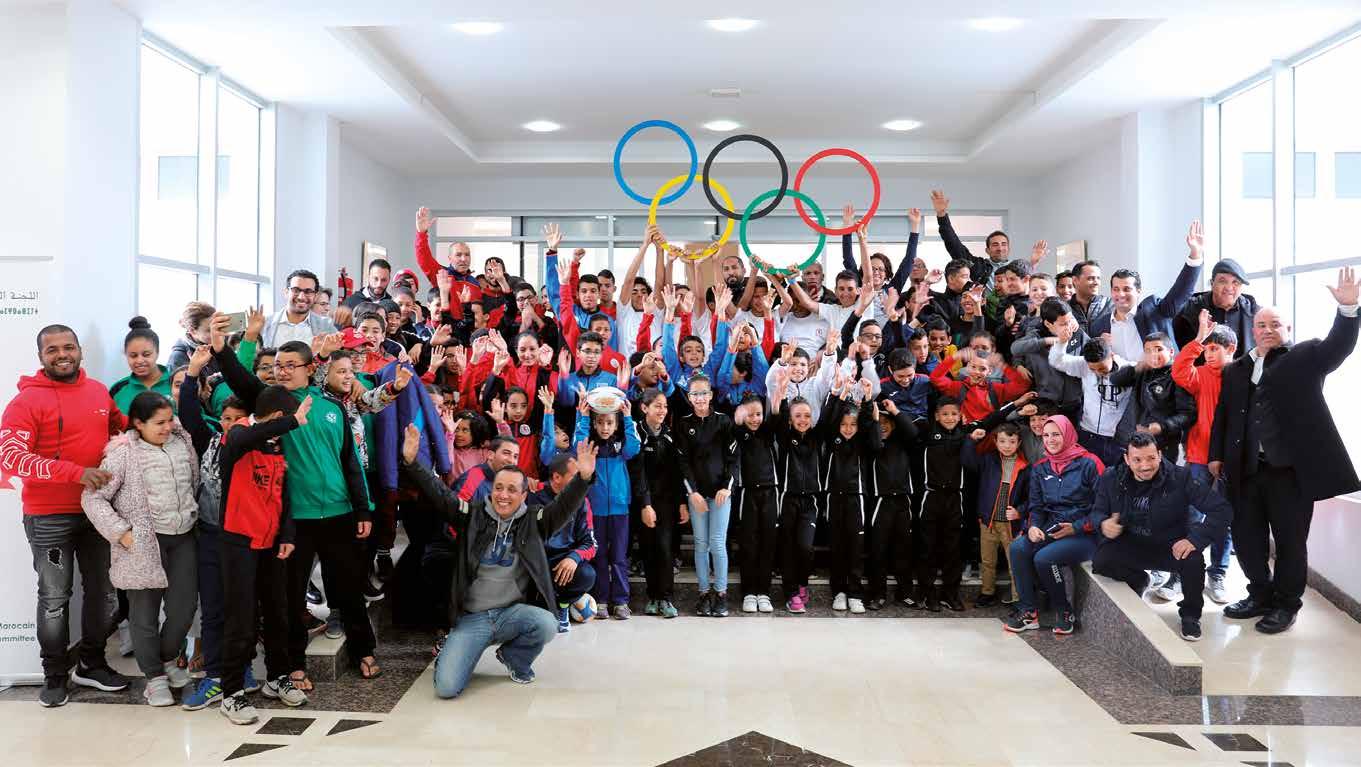
des fédérations sportives nationales et des associations sportives, le Comité Olympique Marocain vise à promouvoir l’Olympisme et ses valeurs et à sensibiliser davantage la jeunesse marocaine à l’importance de la pratique du sport à tous les niveaux.
Les «Visites olympiques» sont des activités qui transmettent les valeurs olympiques en combinant plaisir et information. D’une durée de deux heures, elles comprennent, entre autres, la visite du musée, des projections vidéo de la participation marocaine à différentes éditions des Jeux Olympiques, et un quiz complété par une photo de groupe.
Le CNO Marocain a célébré la Journée internationale du sport au service du développement et de la paix. Cette journée est l’occasion de promouvoir les valeurs et les principes de paix et de solidarité parmi les jeunes athlètes de 8 à 13 ans des fédérations sportives nationales.
Au cours de l’année 2019, le Comité Olympique Marocain a
organisé des séminaires de formation et des conférences pour les entraîneurs, les directeurs techniques et les responsables des différentes structures sportives nationales.

New Zealand
One of the highlights of 2018 for the New Zealand National Olympic Academy was organising an Olympic Refugee Day. This was a most successful event which jointly celebrated Olympic Day (June 23) and World Refugee Day (June 20). It stemmed from a desire by the New Zealand Olympic Committee to develop a sporting activity that would benefit and help vulnerable refugee students.
During that day, 300 refugee students aged 11 to 18 gathered together to familiarise themselves with the Olympic Games. They were divided into 15 groups, each with their own differentcoloured Olympic Day T-shirt. The sports involved were
football, hockey, golf, judo, badminton, volleyball, karate, basketball, fencing, plus a cheerleading demonstration. Coaches and equipment were provided by national or regional sporting federations. Eight Olympic champions took part, including New Zealand Olympic legend, Barbara Kendal.
Funding was provided by Olympic Solidarity and organisation of the day was shared by the NOA in partnership with refugee organisations such as the Red Cross, Asylum Seekers Support and Refugees as Survivors, as well as the Ministry of Education, and the New Zealand Police. Local businesses contributed food and water, and students of Sport and Recreation volunteered to act as group leaders. A refugee Arts group used refugee students to choreograph a performance for the opening ceremony, and New Zealand’s first refugee Member of Parliament, Golriz Ghahraman, spoke at the ceremony. Feedback from the students, teachers and athletes involved was hugely positive. All the students had fun, tried new
sports and acquired new skills. Many girls who had never taken part in sport realised how much fun it could be. Students learned about the Olympic values whilst respect, friendship and excellence were the themes of the day.
Nouvelle-Zélande
L’un des temps forts de 2018 pour l’Académie Nationale Olympique Néo-zélandaise a été l’organisation d’une Journée olympique des réfugiés. Il s’agit d’un événement très réussi qui a célébré conjointement la Journée olympique (23 juin) et la Journée mondiale des réfugiés (20 juin). Elle est née de la volonté du Comité Olympique Néo-zélandais de développer une activité sportive qui bénéficierait et aiderait les élèves réfugiés vulnérables.
Au cours de cette journée, 300 élèves réfugiés âgés de 11 à 18 ans se sont réunis pour se familiariser avec les Jeux Olympiques. Ils ont été divisés en 15 groupes, chacun avec son propre T-shirt de couleur différente
IOA Journal 16 – 83

Τhe NOAs around the world
Le tour du monde avec les ANO
pour la Journée olympique. Les sports impliqués étaient le football, le hockey, le golf, le judo, le badminton, le volley-ball, le karaté, le basket-ball, l’escrime et une démonstration de majorettes. Les entraîneurs et l’équipement ont été fournis par des fédérations sportives nationales ou régionales. Huit champions olympiques y ont participé, dont la légende olympique néo-zélandaise Barbara Kendal.
Le financement a été assuré par la Solidarité Olympique et l’organisation de la journée a été partagée par l’ANO en partenariat avec des organisations de réfugiés telles que la Croix Rouge, “Asylum Seekers Support” et “Refugees as Survivors”, ainsi que le Ministère de l’Éducation, et la Police Néo-Zélandaise. Des entreprises locales ont fourni de la nourriture et de l’eau, et des étudiants en sports et loisirs se sont portés volontaires pour agir comme chefs de groupe. Un groupe d’artistes réfugiés a utilisé des élèves réfugiés pour chorégraphier un spectacle pour la cérémonie d’ouverture, et Golriz Ghahraman, premier député réfugié de Nouvelle-Zélande, a pris la parole lors de la cérémonie. Les réactions des élèves, des enseignants et des athlètes impliqués ont été extrêmement positives. Tous les élèves se sont amusés, ont essayé de nouveaux sports et ont acquis de nouvelles compétences. Beaucoup de filles qui n’avaient jamais pratiqué de sport ont réalisé à quel point cela pouvait être amusant. Les élèves ont appris les valeurs olympiques alors que le respect, l’amitié et l’excellence étaient les thèmes de la journée.
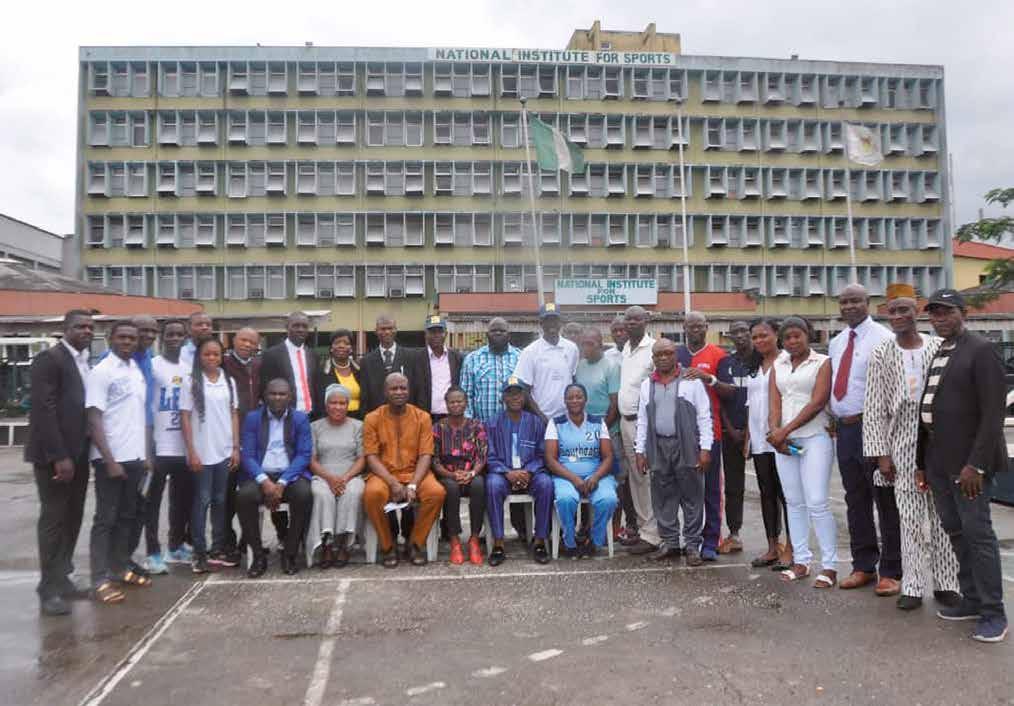

Nigeria
The National Olympic Committee of Nigeria organised an Olympic Education Seminar/Workshop for physical education teachers in primary and secondary schools. The first phase of the seminar planned for the six geo-political zones in the country addressed the theme of “Reinventing Olympic Culture in Nigerian Schools” and was held at the Surulere National Institute for Sports. A total of 45 participants from 24 schools across the six educational districts in Lagos attended.
During the seminar, which covered a full, seven-hour day, three lecturers spoke on topics such as “The foundations of Ancient and Modern Olympic Games”, “Olympic values in the Nigerian educational system” and “Strategies for talent identification and development”. Following the lectures, participants were divided into three discussion groups. Each group was given a topic based on the three core Olympic values (Friendship,
Respect and Excellence).
The focus of discussion for each group was followed by reporting of relevant information on Olympic values to primary and secondary schools. The three groups’ conclusions helped to establish a three-year action plan for Olympic values education in Lagos area schools. The NOC will promote the programme in other regions of the country over the next twelve months.
Nigéria
Le Comité National Olympique du Nigéria a organisé un séminaire d’éducation olympique à l’intention des professeurs d’éducation physique dans les écoles primaires et secondaires. La première phase du séminaire prévu pour les six zones géopolitiques du pays a porté sur le thème «Réinventer la culture olympique dans les écoles nigérianes» et s’est tenue à l’Institut National des Sports du Surulere. Au total, 45 participants de 24 écoles des six districts scolaires de
Lagos y ont assisté.
Au cours du séminaire, qui s’est déroulé sur une journée complète de sept heures, trois conférenciers se sont exprimés sur des sujets tels que «Les fondements des Jeux Olympiques anciens et modernes», «Les valeurs olympiques dans le système éducatif nigérian» et «Stratégies d’identification et de développement des talents». Après les conférences, les participants ont été divisés en trois groupes de discussion. Chaque groupe a reçu un sujet basé sur les trois valeurs olympiques fondamentales (amitié, respect et excellence).
Les discussions de chaque groupe ont été suivies par la présentation d’informations pertinentes sur les valeurs olympiques aux écoles primaires et secondaires. Les conclusions des trois groupes ont permis d’établir un plan d’action triennal pour l’éducation aux valeurs olympiques dans les écoles de la région de Lagos. Le CNO se chargera de la mise en œuvre du programme dans d’autres régions du pays au cours des douze prochains mois.
84 – IOA Journal 16
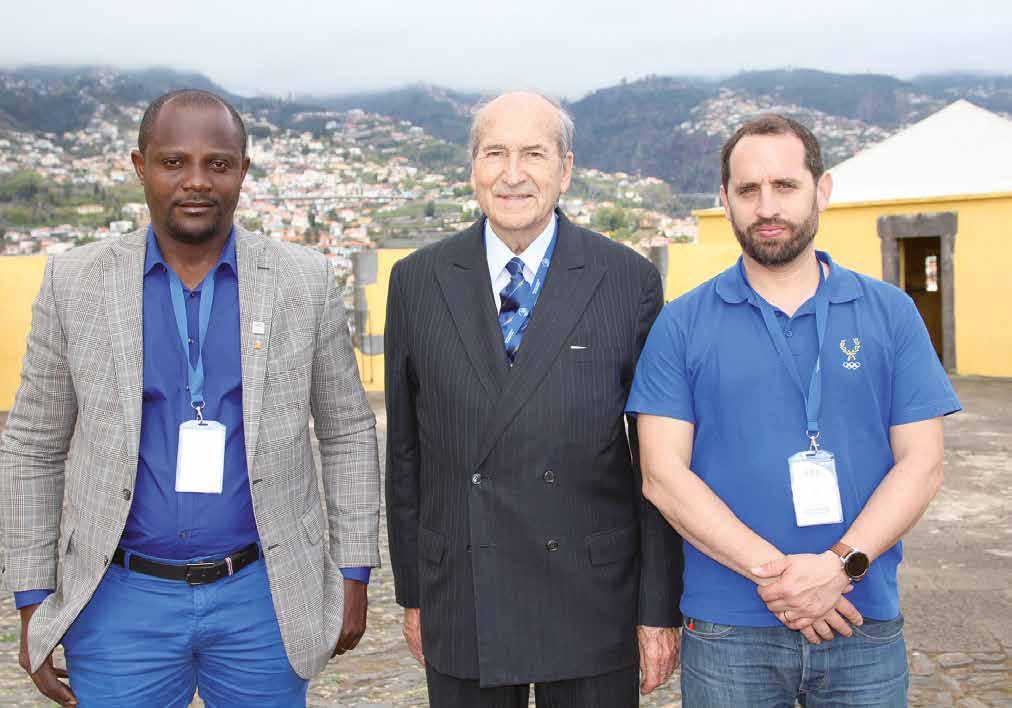

Portugal
“Olympism, inclusion and sports development” was the main subject at this year’s annual session of Portugal’s National Olympic Academy held in Funchal, Madeira, from April 12 to 14. The President of the NOC, José Manuel Constantino, opened the session’s work with a lecture which, among other things, underlined that “inclusion” means the integration of those who are not included in sport or society, as well as efforts to keep those who are already included but may be minded to leave. Olympism was analysed as something more than just a sports movement, as described by Pierre de Coubertin in the early years of the modern Olympic Games.
Also, in the context of the session’s programme, three Olympic athletes from Madeira took part in a round-table discussion, reaching the clear conclusion that Olympic values are essential for the development of an athlete, Olympic or otherwise.
This 30th Session was attended by Ramusel Graça,
President of the Olympic Academy of São Tomé and Príncipe, which is resuming activities after two difficult years.
A final round-table discussion brought together four participants from different IOA Sessions, and included Conrado Durántez, President of the Pan-Iberian Association of Olympic Academies, who recalled the conditions under which the Young Participants’ Sessions were held at Olympia in the 1960’s, as well as the atmosphere prevailing among participants, lecturers and organisers.
This was the second time that the Portuguese Olympic Academy had organised a major activity on Madeira, with the previous session held way back in 1994.
The Portuguese Academy is implementing a new project, named “Olympic Talks”, consisting of a series of meetings with the participation of a special guest who launches a discussion around a specific Olympic subject.
“Olympic Talks” have been planned to cover a variety of topics around Olympism; they take place once a month and are aimed at
plus qu’un simple mouvement sportif, comme l’a décrit Pierre de Coubertin dans les premières années des Jeux Olympiques modernes.
Par ailleurs, dans le cadre du programme de la session, trois Olympiens de Madère ont pris part à une table ronde et sont parvenus à la conclusion claire que les valeurs olympiques sont essentielles pour le développement d’un athlète, olympique ou autre.
Ramusel Graça, président de l’Académie Olympique de São Tomé e Príncipe, qui reprend ses activités après deux années difficiles, a assisté à cette 30e session.
attracting a variety of audiences in a relaxed atmosphere allowing all those present to take part in the discussions, whether by asking questions or expressing a personal view or comment. The first two sessions of the Talks were devoted to presenting Olympic values in schools and the importance of the Olympic values in the shaping of the athlete.
Portugal
«Olympisme, inclusion et développement sportif» était le thème principal lors de la session annuelle de l’Académie Nationale Olympique du Portugal qui s’est tenue cette année à Funchal, Madère, du 12 au 14 avril. Le président du CNO, José Manuel Constantino, a ouvert les travaux de la session par une conférence qui, entre autres, a souligné que l’«inclusion» signifie l’intégration de ceux qui ne sont pas inclus dans le sport ou la société, ainsi que les efforts pour garder ceux qui sont déjà inclus mais qui envisageraient de le quitter. L’Olympisme a été analysé comme quelque chose de
Une table ronde finale a réuni quatre participants de différentes sessions de l’AIO, dont Conrado Durántez, président de l’Association Pan-Ibérique des Académies Olympiques, qui a rappelé les conditions dans lesquelles les sessions des jeunes participants se déroulaient à Olympie dans les années 1960, ainsi que le climat qui régnait entre participants, professeurs et organisateurs.
C’était la deuxième fois que l’Académie Olympique Portugaise organisait une activité majeure sur Madère, la session précédente s’étant tenue en 1994.
L’Académie Portugaise met en œuvre un nouveau projet, intitulé «Débats olympiques», qui consiste en une série de réunions avec la participation d’un invité spécial qui lance une discussion sur un sujet olympique spécifique.
Les «Débats Olympiques» ont été conçus afin de couvrir une variété de sujets autour de l’Olympisme; ils ont lieu une fois par mois et visent à attirer un public varié dans une atmosphère détendue permettant à toutes les personnes
IOA Journal 16 – 85

Τhe NOAs around the world
Le tour du monde avec les ANO
présentes de prendre part aux discussions, que ce soit en posant des questions ou en exprimant une opinion ou un commentaire personnel. Les deux premières sessions des Entretiens ont été consacrées à la présentation des valeurs olympiques dans les écoles et à l’importance des valeurs olympiques dans la formation de l’athlète.

Puerto Rico
This year, the Puerto Rico Olympic Academy celebrated its 25th anniversary, starting with the publication of a book on Olympic education that begins with the Ancient Olympic Games. It presents the history of the National Olympic Committee and its first participation in the 1948 Olympic Games and features a summary of the Olympic Charter with a description of the International Olympic Committee and its members. It explains the Olympic symbols, the Olympic anthem and the different regional and international organisations that together with the International Olympic Academy and NOAs, the International Pierre de Coubertin Committee and others comprise the Olympic family. Finally, brief descriptions of local institutions such as the Training Centre and the medical services are provided.
The Academy has organised art exhibitions, the Olympic Day celebration and has set up a library.
Furthermore, Olympic Studies Centres have been established at various universities, contributing to the development of Olympic values education programmes addressed mainly to physical education teachers.
Recently, the Pierre de
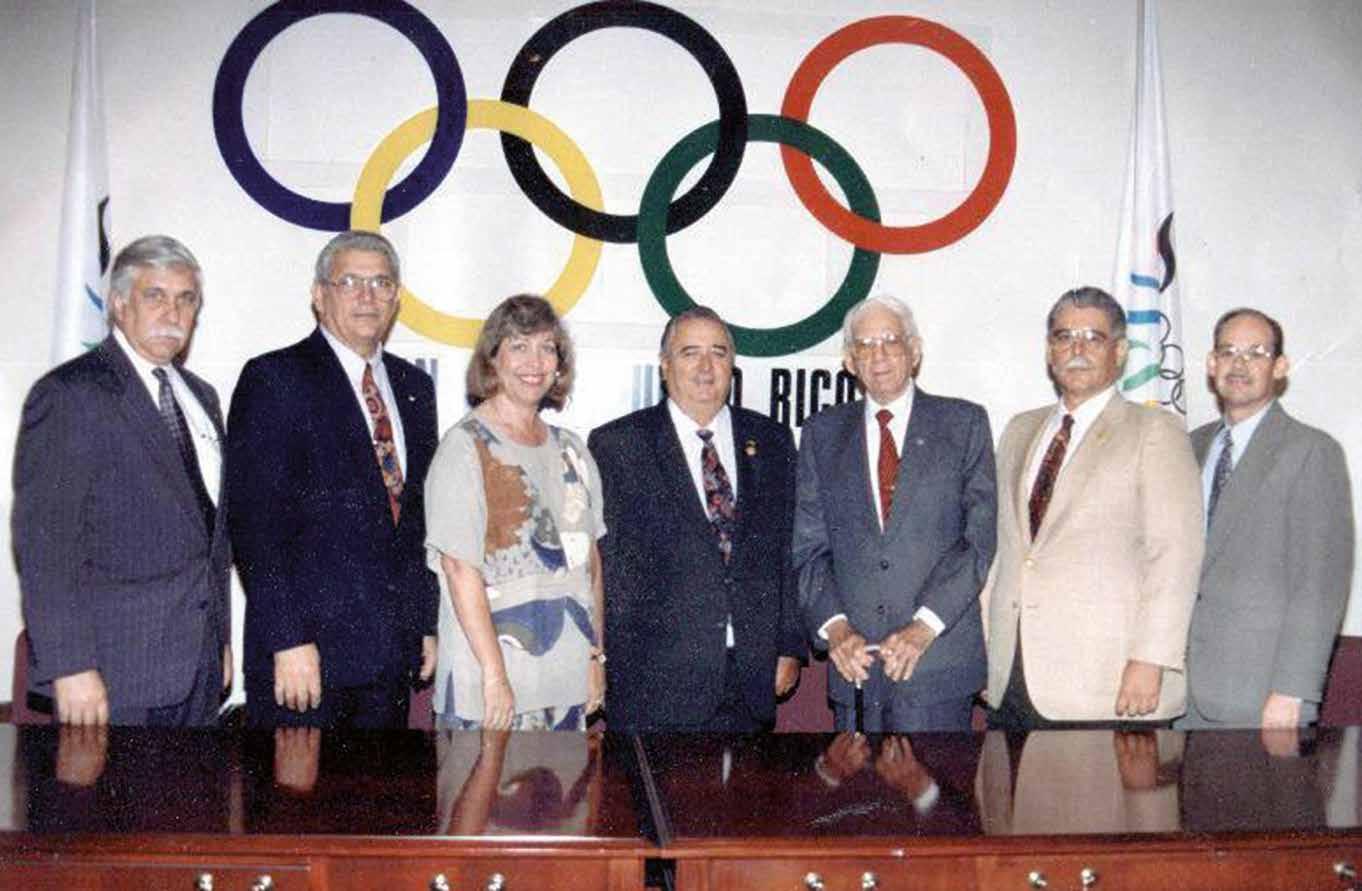
Coubertin medal was instituted to honour those who have helped develop the Olympic Movement in the country. Since there are no Olympic studies programmes at any of the universities in Puerto Rico, three representatives participated in the Master’s Degree Programme in Olympic Studies of the University of Peloponnese, run in cooperation with the IOA.
Porto Rico
Cette année, l’Académie Olympique Portoricaine a célébré son 25e anniversaire, en commençant par la publication d’un livre sur l’éducation olympique qui commence avec les anciens Jeux Olympiques. Il présente l’histoire du CNO et de sa première participation aux Jeux Olympiques de 1948 ainsi qu’un résumé de la Charte olympique avec une description du Comité International Olympique et de ses membres. Il explique les symboles olympiques, l’hymne olympique et les différentes organisations régionales et internationales qui, avec l’Académie
Internationale Olympique, les ANO, le Comité
International Pierre de Coubertin et d’autres forment la Famille olympique. Enfin, de brèves descriptions des institutions locales telles que le Centre de formation et les services médicaux sont fournies.
L’Académie a organisé des expositions d’art, la célébration de la Journée olympique et a créé une bibliothèque. En outre, des Centres d’études olympiques ont été créés dans diverses universités, contribuant à l’élaboration de programmes d’éducation aux valeurs olympiques destinés principalement aux professeurs d’éducation physique.
Récemment, la médaille Pierre de Coubertin a été instaurée pour honorer ceux qui ont contribué au développement du Mouvement olympique dans le pays. Étant donné qu’il n’existe aucun programme d’études olympiques dans l’une des universités de Porto Rico, trois représentants ont participé au programme Master en études olympiques de l’université du Péloponnèse, organisé en coopération avec l’AIO.

Sao Tome and Principe
Olympic Day was celebrated on June 23 in the Sao Tome and Principe city of Neves. Men and women of all ages, athletes and representatives of the local government took part in this well-established run.
Around 1,000 people covered 14 km in a natural setting. The 125th anniversary of the International Olympic Committee’s creation, founded by Pierre de Coubertin, was also celebrated.
A lecture on the Olympic spirit was given in the province of Lembá and attendance was high. This was organised by the Olympic Academy of Sao Tome and Principe and brought together 60 people to hear about interesting topics such as the history of the National Olympic Academy of Sao Tome and Principe, the ancient and modern Olympic Games, fair-play and doping.
The opening speech was given by the Mayor José Albertino and a film was shown on the creation and history of the NOC.
86 – IOA Journal 16
Sao Tomé-etPrincipe
La Journée olympique a été célébrée le 23 juin à Sao Tomé-et-Principe dans la ville de Neves. Des hommes et des femmes de tous âges, des athlètes et des représentants du gouvernement local ont participé à cette course déjà bien établie.
Environ 1000 personnes ont parcouru 14 km dans la nature. Le 125e anniversaire de la création du Comité International Olympique, fondé par Pierre de Coubertin, a également été célébré.
Une conférence sur l’esprit olympique a été donnée dans la province de Lembá et la participation a été élevée. Organisée par l’Académie Olympique de Sao Tomé-etPrincipe, cette manifestation a rassemblé 60 personnes autour de sujets intéressants tels que l’histoire de l’ANO de Sao Tomé-et-Principe, les Jeux Olympiques anciens et modernes, le fair-play et le dopage.
Le discours d’ouverture a été prononcé par le maire José Albertino et un film a été projeté sur la création et l’histoire du CNO.

Spain
At the end of 2018 an Olympic Studies Centre was established in the city of Alcorcon. It comprises extensive premises and an impressive Olympic library.
The Session of the Royal Spanish Olympic Academy was held between February 14 and 22, in collaboration with the Europea del Atlántico University (Santander) and the Spanish Olympic Committee, whose President Alejandro Blanco addressed the Closing Ceremony, together with
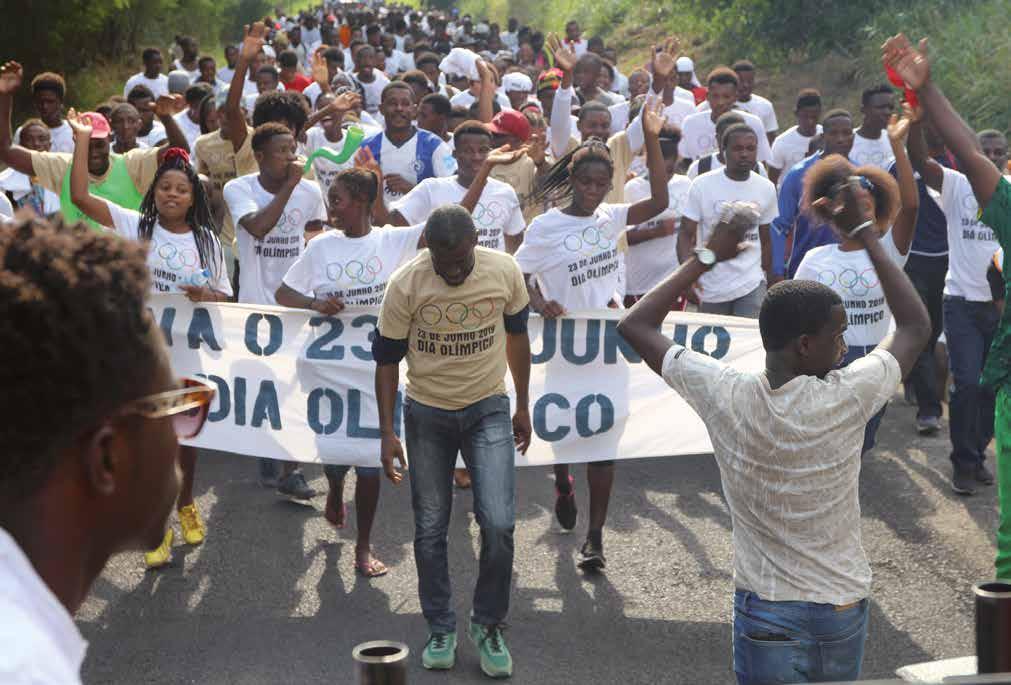
Conrado Durántez, President of the Spanish Olympic Academy, Rubén Calderón, Chairman of the Europea del Atlántico University and Ruth Beitia, Director of the university’s Olympic Studies Centre and Olympic champion in track-and-field.
On March 14, the annual Academy meeting was held at the Spanish Olympic Committee’s headquarters and chaired by Conrado Durántez with the attendance of María Victoria Cabezas, General
Secretary of the Spanish Olympic Committee.
On March 27, the Puente Genil Olympic Studies Centre was founded, comprising a large Olympic library, and on June 5 another Olympic Studies Centre was established in the city of Martos, bringing the number of OSCs in Spain to 40.
The President of the Olympic Committee of Bolivia invited Conrado Durántez to give lectures in the cities of La Paz, Sucre and Cochabamba
on the topic “The philosophy of the Olympic Movement and Pierre of Coubertin”.
Furthermore, there was representation at the International Olympic Academy Sessions, with María Eugenia Martínez Gorroño participating in the 15th Session for Presidents or Directors of NOAs, students Esther Villar and Jon Gómez participating at the 59th International Session for Young Participants, and Drs María José Martinez Patiño
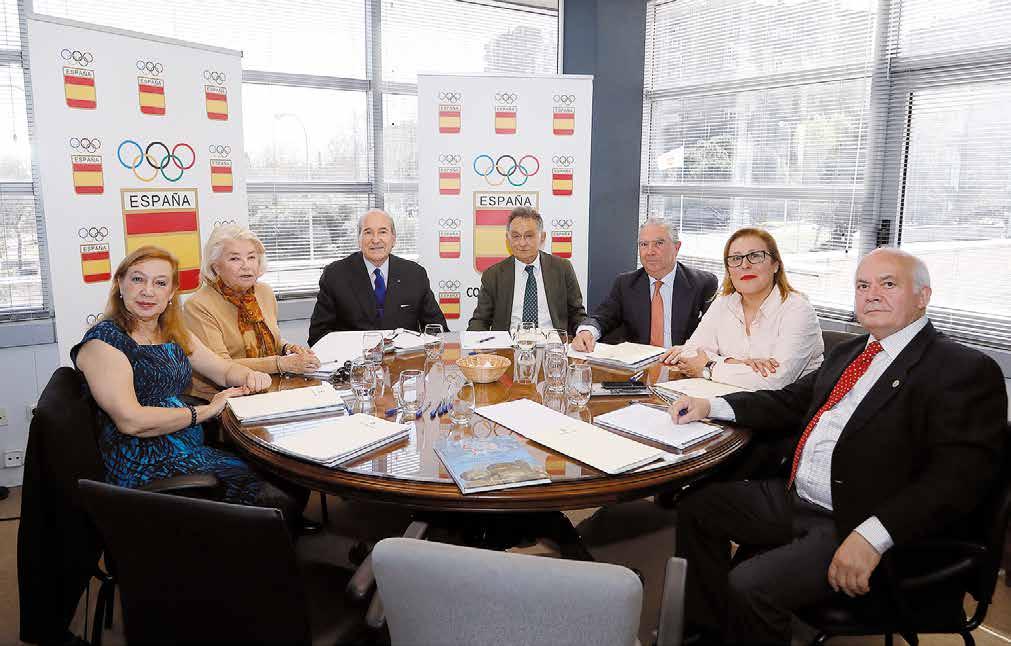
IOA Journal 16 – 87

Τhe NOAs around the world
Le tour du monde avec les ANO
and Covadonga Mateos participating in the 13th International Session for Educators of Higher Institutes of Physical Education.
Espagne
Un Centre d’études olympiques a été établi dans la ville d’Alcorcon à la fin de 2018. Il comprend de vastes locaux et une impressionnante bibliothèque olympique.
La session de l’Académie Olympique Espagnole s’est tenue du 14 au 22 février, en collaboration avec l’université Europea del Atlántico (Santander) et le Comité Olympique Espagnol, dont le président Alejandro Blanco s’est adressé à la cérémonie de clôture, avec Conrado Durántez, président de l’Académie Olympique Espagnole, Rubén Calderón, directeur de l’université Europea del Atlántico et Ruth Beitia, directrice du Centre d’études olympiques et championne olympique
en athlétisme.
Le 14 mars, la réunion annuelle de l’Académie s’est tenue au siège du Comité Olympique Espagnol et a été présidée par Conrado Durántez en présence de María Victoria Cabezas, secrétaire générale du Comité Olympique Espagnol.
Le 27 mars, le Centre d’études olympiques de Puente Genil a été fondé, comprenant une grande bibliothèque olympique, et le 5 juin, un autre Centre d’études olympiques a été établi dans la ville de Martos, portant à 40 le nombre de CEO en Espagne.
Le président du Comité Olympique de Bolivie a invité Conrado Durántez à donner des conférences dans les villes de La Paz, Sucre et Cochabamba sur le thème «La philosophie du Mouvement Olympique et Pierre de Coubertin».
En outre, les représentants suivants ont participé aux sessions de l’Académie Internationale Olympique: María Eugenia Martínez Gorroño à la
15ème Session pour Présidents ou Directeurs des ANO, les étudiants Esther Villar et Jon Gómez à la 59ème Session pour Jeunes Participants et les Docteurs María José Martinez Patiño et Covadonga Mateos à la 13ème Session Internationale pour Éducateurs d’Instituts Supérieurs d’Éducation Physique.

Switzerland
In a school somewhere in Switzerland, students promise to respect the rules of the classroom; they watch the teacher’s hands, which indicate a number, and they have to raise – as quickly as possible – the fingers needed to get to six. This game, entitled “The Olympic Oath”, is one of more than a hundred on the online platform “School on the Move”. This programme, run since 2017 by the National Olympic Committee and the Swiss Sports Association, offers
teachers ideas for fun exercises to perform with their students. Since 2019, this web page has also been extended to children with a disorder or disability.
“The primary objective of ‘School on the Move’ is to bring more movement into everyday school life in Switzerland, for the health and motivation of students. However, Swiss Olympic is looking beyond that: we are also using this programme to raise children’s awareness of certain issues, such as the Olympic values,” explains Rafael Meier, programme manager.
Each video on the webpage features the Olympic values of excellence, friendship and respect. Another video series revolves around specific themes, such as the video on Olympic traditions that was filmed at the Olympic Museum.
The next video will be dedicated to the “Lausanne 2020” Winter Youth Olympic Games, the first major Olympic event to take place in Switzerland since the 1948 Winter Olympic Games in St. Moritz.
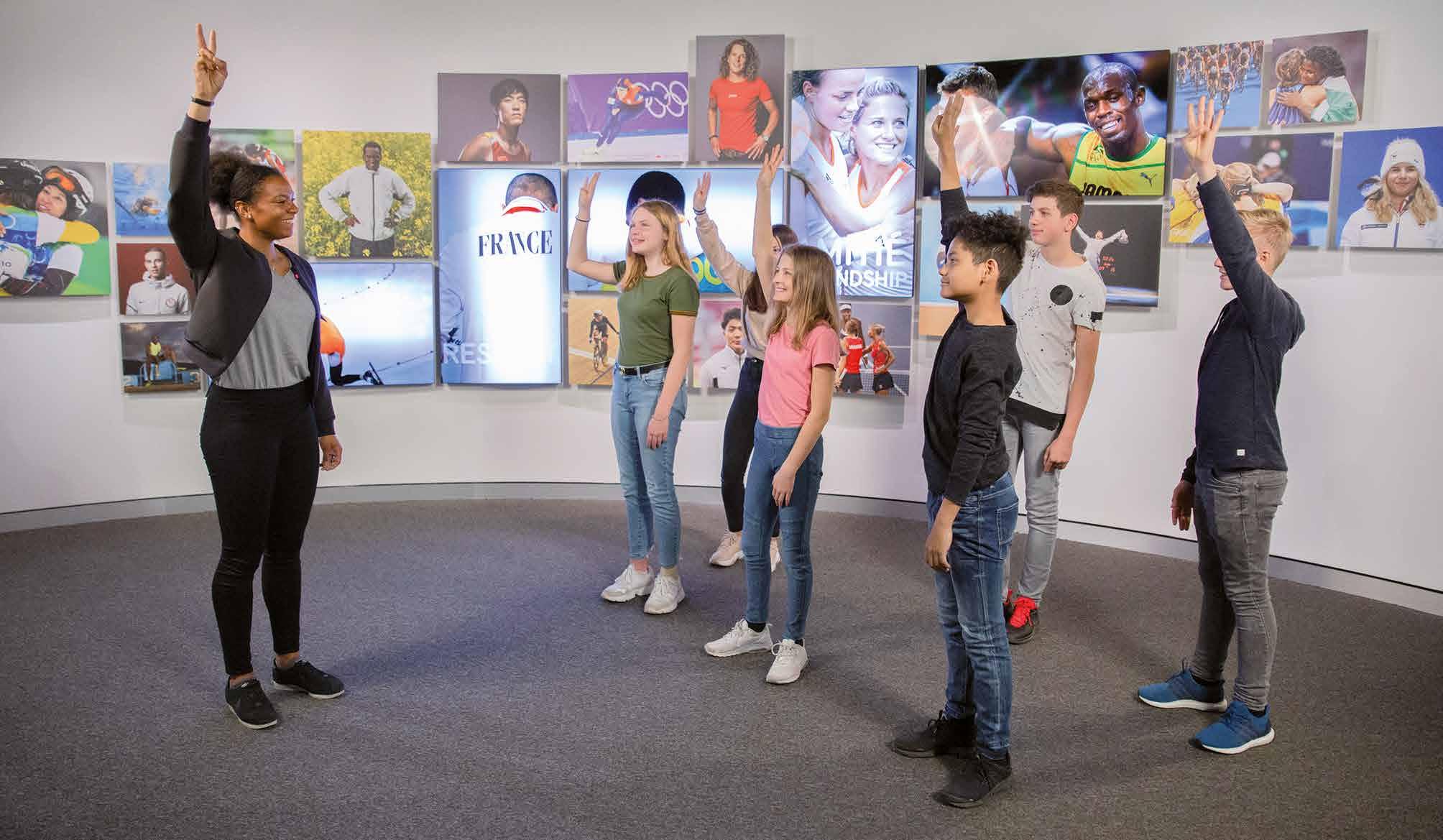
88 – IOA Journal 16
Suisse
Dans une école, quelque part en Suisse, les élèves promettent de respecter les règles de la classe. Pour ce faire, ils regardent les mains de l’enseignant qui indiquent un chiffre, puis lèvent – aussi vite que possible – les doigts nécessaires pour arriver à six. Ce petit jeu, intitulé «Le serment olympique», est un exemple parmi plus d’une centaine d’autres tiré de la plateforme en ligne «L’école bouge». Ce programme, dirigé depuis 2017 par le Comité National Olympique et l’Association du Sport Suisse – propose aux enseignants des idées d’exercices amusants à effectuer avec leurs élèves. Depuis 2019, le site Internet en question s’étend en outre aux enfants avec un trouble ou un handicap.
«L’objectif premier de “L’école bouge” est d’apporter plus de mouvement dans le quotidien scolaire suisse –pour la santé et la motivation des élèves. Swiss Olympic voit cependant plus loin que cela: nous profitons également de ce programme pour tenter de sensibiliser les enfants à certains thèmes, et notamment aux valeurs olympiques», explique Rafael Meier, responsable du programme.
Ainsi, chaque vidéo proposée sur le site Internet présente les valeurs olympiques – excellence, amitié et respect. Une autre série de vidéo tourne autour de thèmes spécifiques, tels que la vidéo réalisée au Musée olympique sur le thème des traditions olympiques.
La prochaine vidéo sera elle dédiée aux Jeux Olympiques de la Jeunesse d’hiver de Lausanne 2020, premier grand événement olympique ayant lieu en Suisse depuis les Jeux Olympiques d’hiver de 1948 à St. Moritz.
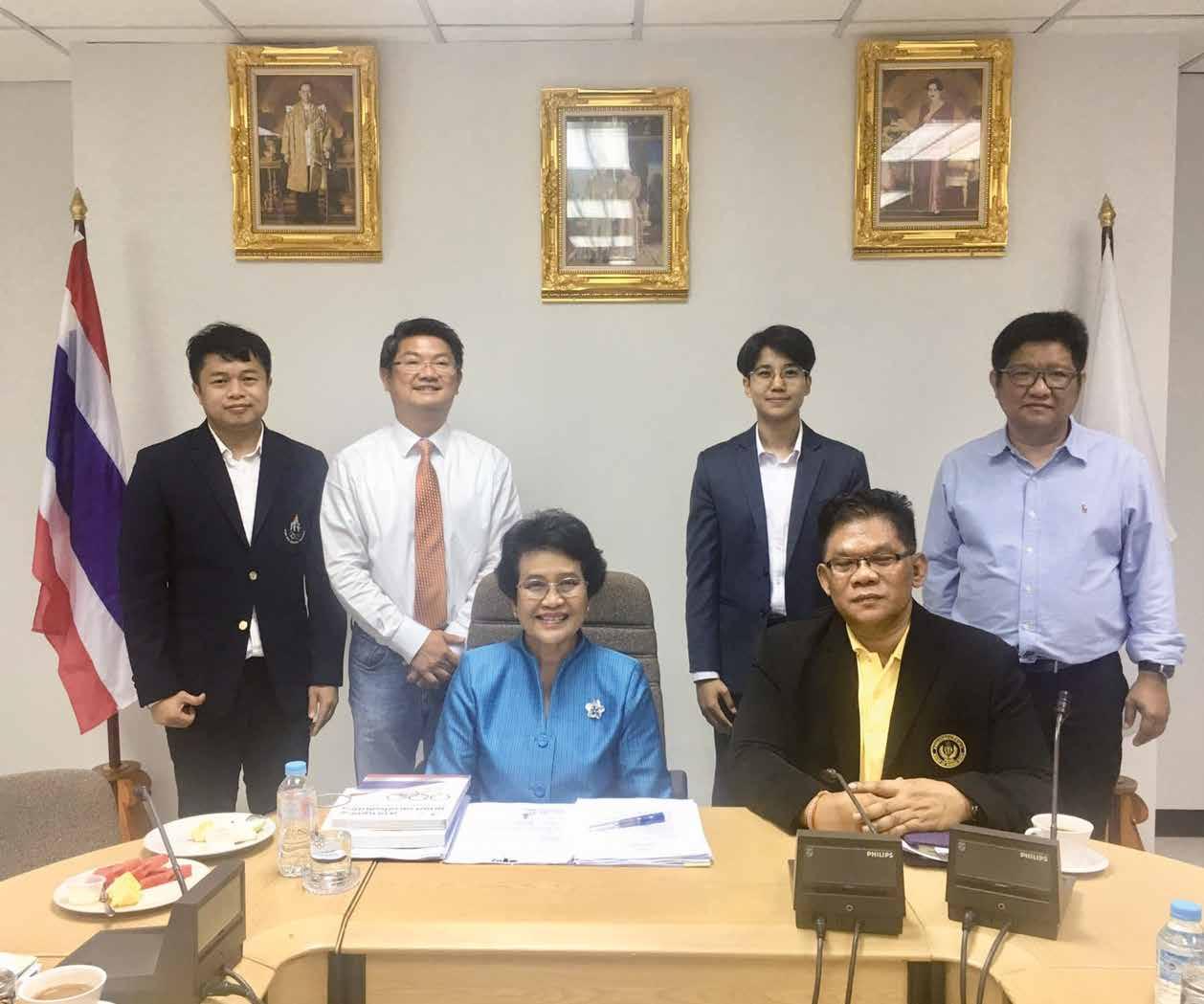

Thailand
Following the new IOC guidelines related to the creation of an Athletes’ Commission within the National Olympic Committees, the Vice-President of the National Olympic Committee of Thailand and Director of the Thailand Olympic Academy, Dr Supitr Samahito, arranged a meeting on August 15, 2019 of Thai Olympians, among whom were Prapawadi Charoenrattanatarakun (Gold Medallist in Weightlifting, Beijing 2008), Tawee Ampornmaha (Silver Medallist in Boxing, Los Angeles 1984) and Chanatip Sonkham (Bronze Medallist in Taekwando, London 2012) for the establishment of the Athletes’ Commission.
In addition, the creation in the near future of a National Olympians Association to be an affiliate of the World Olympians Association, was discussed.
Thaïlande
Conformément aux nouvelles directives du CIO relatives à la création d’une Commission des Athlètes au sein des Comités Nationaux Olympiques, l α viceprésidente du Comité National Olympique de Thaïlande et directrice de l’Académie Olympique de Thaïlande, Dr Supitr Samahito, a organisé une réunion le 15 août 2019 des Olympiens thaïlandais, parmi lesquels Prapawadi Charoenrattanataratarakun (médaillée d’or en haltérophilie, Beijing 2008), Tawee Ampornmaha (médaillé d’argent en boxe, Los Angeles 1984) et Chanatip Sonkham (médaillée de bronze au Taekwando, Londres 2012) pour la création de la Commission des Athlètes.
En outre, il a été
question de la création prochaine d’une Association Nationale des Olympiens qui serait affiliée à l’Association Mondiale des Olympiens.

Chinese Taipei
On August 29, 2019, the opening of the 42nd Session of the Chinese Taipei Olympic Academy took place and the “Athena” award of the Chinese Taipei Olympic Committee was presented.
Last June, the President of the Chinese Taipei Olympic Committee and Olympic Academy, Hong-Dow Lin, was awarded the “Athena” prize by the President of the International Olympic Academy, Isidoros Kouvelos, in recognition of the Academy’s dedication and contribution to the promotion of the Olympic Movement. On the same day, the President of the Hellenic Republic, Mr Prokopios
IOA Journal 16 – 89

Τhe NOAs around the world
Le

Pavlopoulos, the IOC President, Thomas Bach, the President of the Hellenic Olympic Committee, Spyros Capralos, and the IOA Honorary Dean, Professor Konstantinos Georgiadis congratulated President Lin.
During the unveiling ceremony, Mr Hong-Dow Lin awarded the Laurel Medal to IOA President, Mr Kouvelos, in appreciation of the IOA’s continuous support for the Chinese Taipei Olympic Academy. In addition, President Lin awarded Professor Hsiu-Ying Mai and Professor Chun-Lin Cho the Laurel Medal in recognition of their 40 years’ contribution to promoting Olympic education in Chinese Taipei.
Following the establishment of NOAs in Spain, the Republic of Korea and the United States, the Chinese Taipei Olympic Academy, was the fourth to be established, founded in 1978 by the late Professor MingHsin Tang, former Secretary General of the Chinese Taipei Olympic Committee and Chairman of the Education Commission. The Academy Session has taken place for 41 consecutive years, with the aim of promoting the fundamental principles and
values of Olympism. Since its establishment in 1978, as a result of its dedication and hard work, the Session has been attended by a total of 4,100 national and 90 international participants from other Asian countries.
Taipei chinois
Le 29 août 2019, la 42ème session de l’Académie Olympique du Taipei chinois a été ouverte et le prix «Athéna» du Comité Olympique du Taipei chinois a été remis.
En juin dernier, le président du Comité Olympique et de l’Académie Olympique du Taipei chinois, Hong-Dow Lin, a reçu le prix «Athéna» du président de l’Académie Internationale Olympique, Isidoros Kouvelos, en reconnaissance de l’engagement et de la contribution de l’Académie à la promotion du Mouvement olympique. Le même jour, le président de la République hellénique, M. Prokopios Pavlopoulos, le président du CIO, Thomas
l’Éducation. La session de l’Académie se déroule pendant 41 années consécutives, dans le but de promouvoir les principes fondamentaux et les valeurs de l’Olympisme. Depuis sa création en 1978, grâce à son dévouement et à son travail acharné, la session a réuni au total 4100 participants nationaux et 90 participants internationaux d’autres pays asiatiques.

Turkey
Bach, le président du Comité Olympique Hellénique, Spyros Capralos et le doyen honoraire de l’AIO, le professeur Konstantinos Georgiadis ont félicité le président Lin. Au cours de la cérémonie de dévoilement du prix, M. Hong-Dow Lin a remis le trophée “Laurel Medal” au Président de l’AIO, M. Kouvelos, en reconnaissance du soutien continu de l’AIO à l’Académie Olympique du Taipei chinois. En outre, le président Lin a décerné aux professeurs Hsiu-Ying Mai et Chun-Lin Cho le “Laurel Medal” en reconnaissance de leur contribution de 40 ans à la promotion de l’éducation olympique au Taipei chinois. Après la création des ANO en Espagne, en République de Corée et aux États-Unis, l’Académie Olympique du Taipei chinois a été la quatrième à voir le jour, fondée en 1978 par feu le professeur Ming-Hsin Tang, ancien secrétaire général du Comité Olympique du Taipei chinois et président de la Commission de
The Sports, Culture and Olympic Education Programme of the Turkish Olympic Committee (OLI) concludes its activities for the 2018–2019 academic year, having reached over 100,000 students in 400 schools across 15 Turkish cities.
The multi-activity programme allows children to take part in a series of educational classes, focusing on core values such as fair-play, healthy eating and environmental awareness, as well as Turkey’s Olympic history.
The programme, launched in 2006, visits primary schools across Turkey where children aged 9-11 take part in interactive audio-visual presentations. Elite Turkish athletes often participate in the presentations to provide additional inspiration for those in attendance. One of these athletes is young tennis star, Yankı Erel, who won the Boys’ Doubles at Wimbledon in 2018, and was the first tennis player to represent Turkey at the 2018 Youth Olympic Games in Buenos Aires.
The first Olympic Day event took place on March 11, in the city of Kirikhan, with the participation of 300 refugee children from Syria and other children of the region.
At a second event, Turkish athletes met with more than 500 children, half of whom were Syrian refugees, in the
90 – IOA Journal 16
tour du monde avec les ANO
city of Gaziantep, on Saturday 27 April.
A number of high-profile athletes took part, including World Champion wrestler Rıza Kayaalp, European and World Champion karatekas Serap
Özçelik Arapoğlu and Burak Uygur, javelin thrower Eda Tuğsuz, badminton player Aliye Demirbağ, and the Syrian refugee Olympic swimmer Rami Anis. The children enjoyed their time with the athletes, particularly with Rami Anis, who proved to be a role model for many of the Syrian children, having once been a refugee in Turkey himself. Subsequently, Anis was a member of the Refugee Olympic Team at Rio 2016 and is now trying to qualify for Tokyo 2020.
The Turkish Olympic Committee has opened a new sports school for local children and Syrian refugee children living in the Kirikhan district of Hatay in Turkey.
The new school is part of the ‘support through sport’ project of the NOC, which aims to contribute to Syrian children’s physical and social development through greater accessibility to sport and allow them to integrate peacefully into their new communities.
Turquie
Le Programme des sports, de la culture et de l’éducation olympique du Comité Olympique Turc (OLI) termine ses activités pour l’année scolaire 2018–2019, ayant touché plus de 100 000 élèves dans 400 écoles réparties dans 15 villes turques.
Le programme multiactivités permet aux enfants de participer à une série de cours éducatifs axés sur des valeurs fondamentales telles que le fair-play, une alimentation saine et la sensibilisation à l’environnement, ainsi que l’histoire olympique de la Turquie.
Le programme, lancé en 2006, se rend dans les
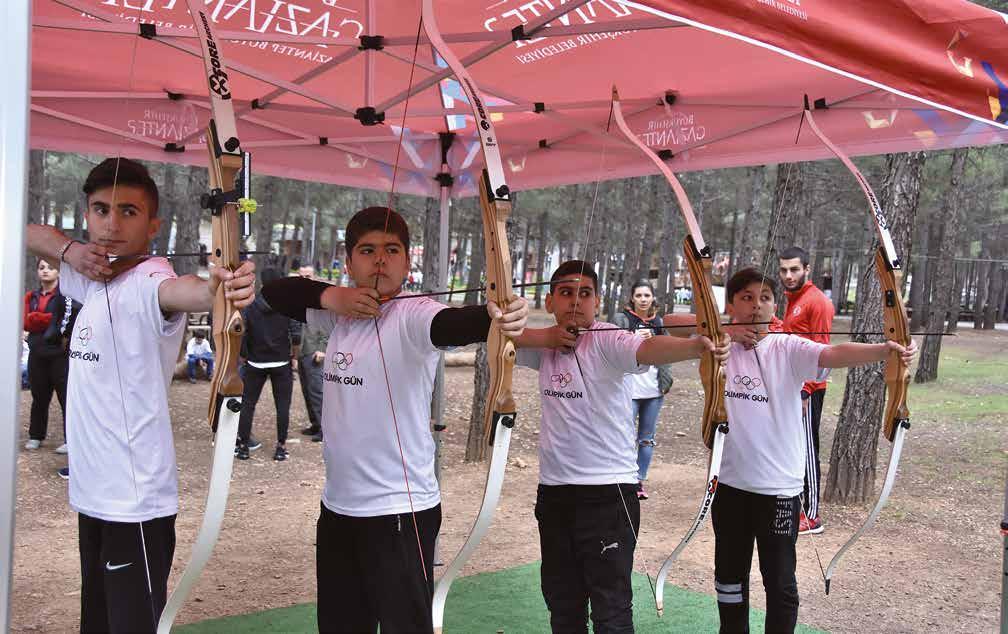
écoles primaires de toute la Turquie où les enfants âgés de 9 à 11 ans participent à des présentations audiovisuelles interactives. Les athlètes turcs d’élite participent souvent aux présentations pour inspirer davantage les personnes présentes. L’un de ces athlètes est la jeune star du tennis Yankı Erel, qui a remporté le double masculin à Wimbledon en 2018 et a été le premier joueur de tennis à représenter la Turquie aux Jeux Olympiques de la Jeunesse 2018 à Buenos Aires.
Le premier évènement de la Journée olympique a eu lieu le 11 mars dans la ville de Kirikhan, avec la participation de 300 enfants réfugiés de Syrie et d’autres enfants de la région.
Lors d’un deuxième événement, les athlètes turcs ont rencontré, le samedi 27 avril, dans la ville de Gaziantep, plus de 500 enfants, dont la moitié étaient des réfugiés syriens.
Un certain nombre d’athlètes de haut niveau y ont participé, dont le champion du monde de
lutte Rıza Kayaalp, les champions d’Europe et du monde de karate Serap Özçelik Arapo ğ lu et Burak Uygur, la lanceuse de javelot Eda Tu ğ suz, la joueuse de badminton Aliye Demirba ğ , et le réfugié syrien nageur olympique Rami Anis. Les enfants ont apprécié le temps passé avec les athlètes, en particulier avec Rami Anis, qui s’est avéré être un modèle pour de nombreux enfants syriens, ayant lui-même été un réfugié en Turquie. Par la suite, Anis a été membre de l’équipe olympique des réfugiés à Rio 2016 et essaie de se qualifier pour Tokyo 2020.
Le Comité Olympique Turc a ouvert une nouvelle école de sport pour les enfants locaux et les enfants syriens réfugiés vivant dans le district de Hatay, dans le Kirikhan, en Turquie.
La nouvelle école s’inscrit dans le cadre du projet «Soutien par le Sport» du C ΝΟ , qui vise à contribuer au développement physique et social des enfants syriens par une plus grande accessibilité au sport, et à leur permettre de s’intégrer pacifiquement dans leurs nouvelles communautés.

United States of America
The United States Olympic and Paralympic Committee (USOPC) embraces its responsibility to serve as the National Olympic Academy in the United States, and to act as a steward and educator of the Olympic Movement and Olympic ideals through a series of programmes.
Olympic Day in the United States was celebrated with more than 500 events across 300 communities with 200,000 participants throughout the month of June. These included sport demonstrations, discussions with athletes, runs and festivals, helping introduce thousands of young people to the Olympic values.
Celebrating its 26th anniversary in 2019, the programme “Finding Leaders Among Minorities Everywhere” (FLAME) introduces college students to the world of elite sport. This eight-day program at the U.S. Olympic Training Center offers an exciting curriculum designed to increase knowledge of the U.S. Olympic and Paralympic Movements. Students participate in personal and
IOA Journal 16 – 91

Τhe NOAs around the world
Le tour du monde avec les ANO
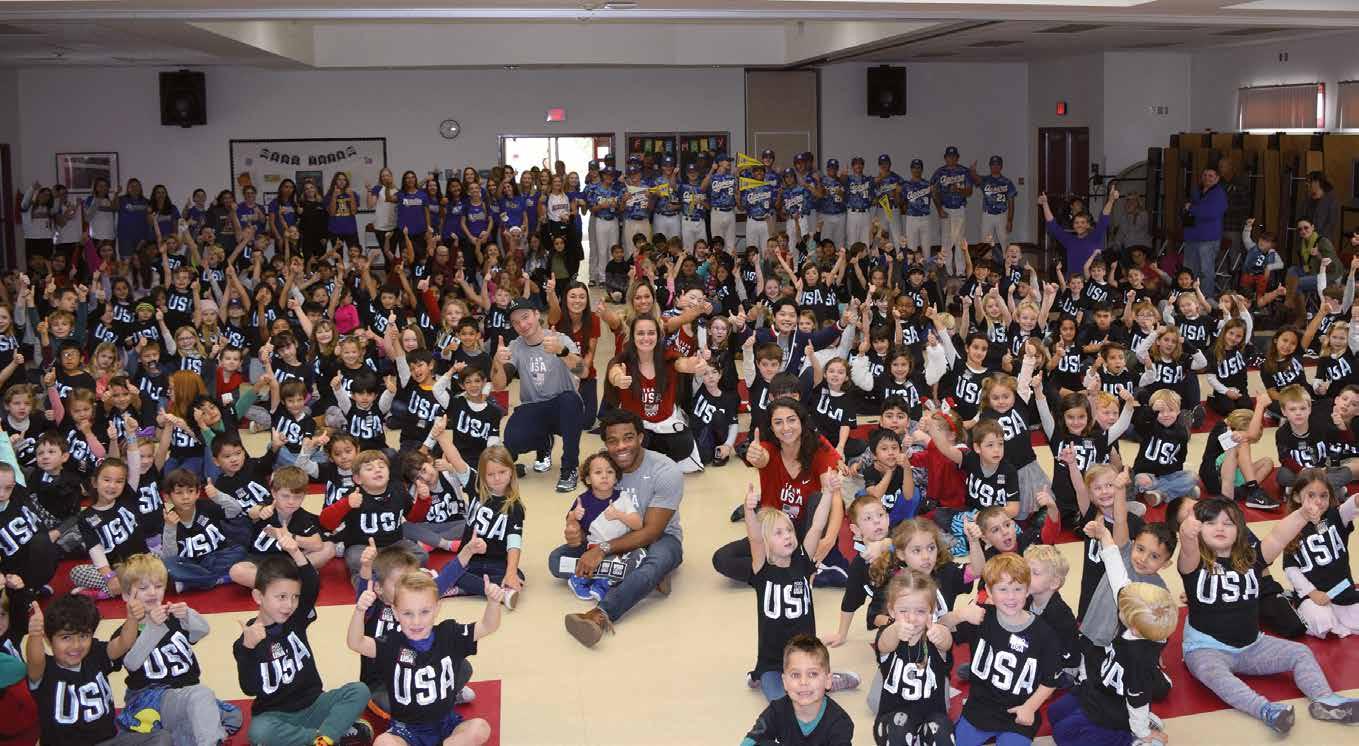
professional development workshops, get to know the Center’s executives and follow lectures by elite athletes.
The “Team USA Ambassador Program” is an educational course intended for US Olympian and Paralympic teams prior to competing at the Games. The program informs athletes about the expectations, roles and responsibilities of representing the United States and the entire Olympic Movement at the Olympic or Paralympic Games.
The program “USA Team for Tomorrow” provides a vehicle through which U.S. athletes offer their assistance and support to those in need. Athlete ambassadors serve in various ways, either volunteering for service organizations or visiting children’s hospitals, schools and sports organizations.
US athletes build and strengthen relationships with the citizens of host cities through multifaceted goodwill campaigns during and after the Games, campaigns such as “We Love Rio” and “Thank You PyeongChang.” The goals of these programs are to demonstrate Team USA’s support for the host country,
promote Olympism, show gratitude towards the hosts, and contribute to the positive legacy of the Olympic and Paralympic Games. The program includes lectures, donations, social campaigns, and transformative projects that leave a legacy and reflect the spirit of the Olympic Movement.
États-Unis d’Amérique
Le Comité Olympique et Paralympique des États-Unis (USOPC) assume sa responsabilité de servir d’Académie Nationale Olympique aux États-Unis et d’agir en tant que garant et agent du Mouvement olympique et des idéaux olympiques par le biais d’une série de programmes.
La Journée olympique aux États-Unis a été célébrée avec plus de 500 événements dans 300 communautés et 200000 participants tout au long du mois de juin. Des démonstrations sportives, des discussions avec des athlètes, des courses et des
festivals ont permis à des milliers de jeunes de s’initier aux valeurs olympiques. Célébrant son 26e anniversaire en 2019, le programme Finding Leaders Among Minorities Everywhere (FLAME) initie les étudiants au monde du sport de haut niveau. Ce programme de huit jours au Centre d’entraînement olympique des États-Unis offre un programme passionnant conçu pour accroître la connaissance des Mouvements olympiques et paralympiques américains. Les étudiants participent à des ateliers de développement personnel et professionnel, apprennent à connaître les dirigeants du Centre et suivent des conférences données par des athlètes d’élite.
Le programme des ambassadeurs du Team USA est un cours éducatif destiné aux équipes olympiques et paralympiques américaines avant de participer aux Jeux. Le programme informe les athlètes sur les attentes, les rôles et les responsabilités de représenter les États-Unis
et l’ensemble du Mouvement olympique aux Jeux Olympiques ou Paralympiques.
Le programme USA Team for Tomorrow est un véhicule par lequel les athlètes américains offrent leur aide et leur soutien aux personnes dans le besoin. Les athlètes-ambassadeurs servent de diverses façons, soit en faisant du bénévolat pour des organismes de service ou en visitant des hôpitaux pour enfants, des écoles et des organismes sportifs.
Les athlètes américains construisent et renforcent leurs relations avec les citoyens des villes hôtes par le biais de campagnes de bonne volonté à multiples facettes pendant et après les Jeux, telles que «We Love Rio» et «Thank You PyeongChang». Les objectifs de ces programmes sont de démontrer le soutien du Team USA au pays hôte, de promouvoir l’Olympisme, de montrer de la gratitude envers les hôtes et de contribuer à l’héritage positif des Jeux Olympiques et Paralympiques. Le
92 – IOA Journal 16
programme comprend des conférences, des dons, des campagnes sociales et des projets de transformation qui laissent un héritage et reflètent l’esprit du Mouvement olympique.

Greece
The year 2019 was a very active one for the Hellenic Olympic Academy, which organised a series of activities and educational programmes. In cooperation with the Hellenic Olympic Committee, it held 15 different events to celebrate the Olympic Day in various Greek cities, from Ancient Olympia and Athens to Pelion and Thessaloniki.
Over 22,000 people participated in these highly successful events, together with athletes, Olympic champions and students, sending the message of including sport in everyday life.
From January to June 2019, the Hellenic Olympic Committee and the Hellenic Olympic Academy implemented the innovative educational programme “I love sport – Kids’ Athletics”, attended by a grand total of 192,900 girls and boys from 2,293 primary schools from all over the country. The programme combines culture and sport in the unique setting of the Panathenaic Stadium, a symbol of our modern history and of world sport.
The HOA has launched, in cooperation with Deutsche Sportjugend, youth exchange programmes and the first exchanges have already been a resounding success.
The HOA, in cooperation with the HOC, the French embassy and the French Institute, have organised the programme “The generation of 2004 in Greece on the road to the Olympic Games Paris 2024”. This programme aims to disseminate the Olympic spirit, Olympic education and
“francophonie” and to create an active network of approximately 1,800 youngsters, a bilingual “2004 generation” capable of disseminating the values of Olympism through annual Olympic seminars in the presence of French and Greek athletes who participated in the Athens 2004 Olympic Games.
Another important project that started in cooperation with the CSI and “Oloi Mazi Boroume” (Altogether We Can) concerns the promotion of the Olympic idea, “Fair play”, the development of volunteering, environmental protection and preventing and solving security issues, as well as correct Internet use.
Grèce
L’année 2019 a été très active pour l’Académie Nationale Olympique de la Grèce qui a organisé une série d’activités et de programmes éducatifs. En coopération avec le Comité Olympique Hellénique, elle a organisé 15 événements différents pour célébrer la Journée olympique dans
différentes villes grecques, de l’Ancienne Olympie et Athènes au Pélion et Thessalonique. Plus de 22000 personnes ont participé à ces événements très réussis, ainsi que des athlètes, des champions olympiques et des étudiants, envoyant le message d’inclusion du sport dans la vie quotidienne.
Le Comité Olympique Hellénique et l’ANO ont mis en œuvre de janvier à juin 2019, le programme éducatif innovant «J’aime le sport – Kids’ Athletics» qui a déjà été suivi par 192000 filles et garçons des écoles primaires. Le programme combine culture et sport dans le cadre unique du stade panathénaïque, symbole de notre histoire moderne et du sport mondial.
L’ANO a lancé, en coopération avec Deutsche Sportjugend, des programmes d’échanges de jeunes et les premiers échanges ont déjà été couronnés de succès.
L’ANO, en collaboration avec le COH, l’ambassade de France et l’Institut français, a organisé le
programme «La génération 2004 en Grèce à l’approche des Jeux Olympiques de Paris 2024». Ce programme vise à diffuser l’esprit olympique, l’éducation olympique et la francophonie et à créer un réseau actif d’environ 1800 jeunes, une «génération 2004» bilingue capable de diffuser les valeurs de l’Olympisme à travers des séminaires olympiques annuels en présence des athlètes français et grecs qui ont participé aux Jeux Olympiques de 2004 à Athènes.
Un autre projet important qui a débuté en coopération avec le CSI et «Oloi Mazi Boroume» (Tous ensemble nous pouvons) concerne la promotion de l’idée olympique, le «Fair-play», le développement du volontariat, la protection de l’environnement et la prévention et la résolution des problèmes de sécurité ainsi que l’utilisation correcte d’Internet.
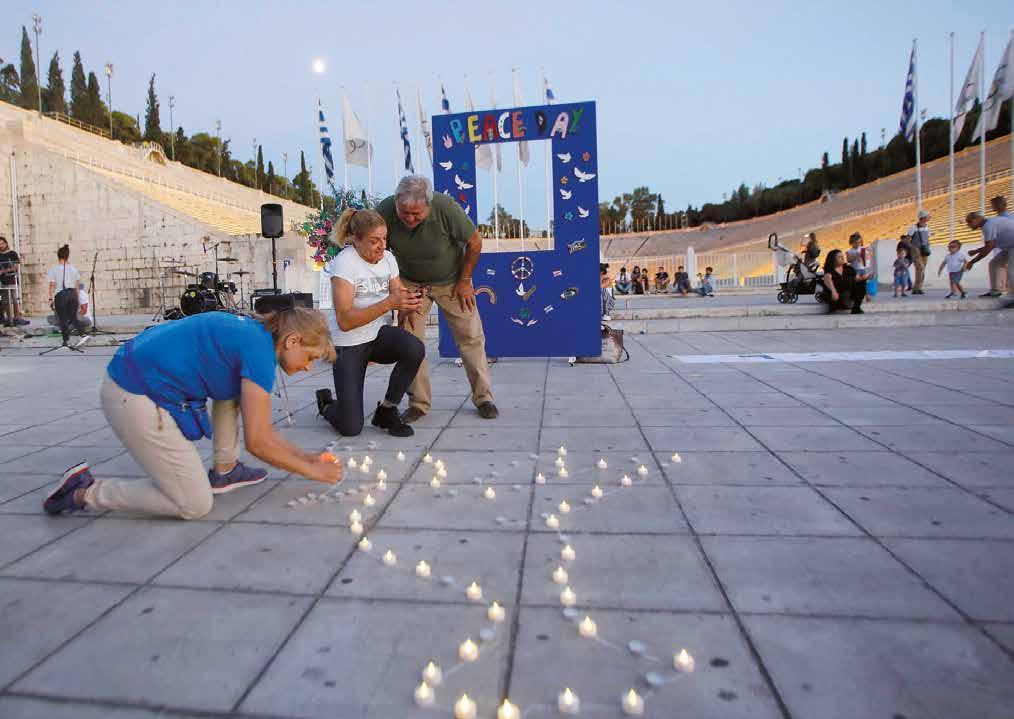
IOA Journal 16 – 93
IOA News
Les nouvelles de l’AIO
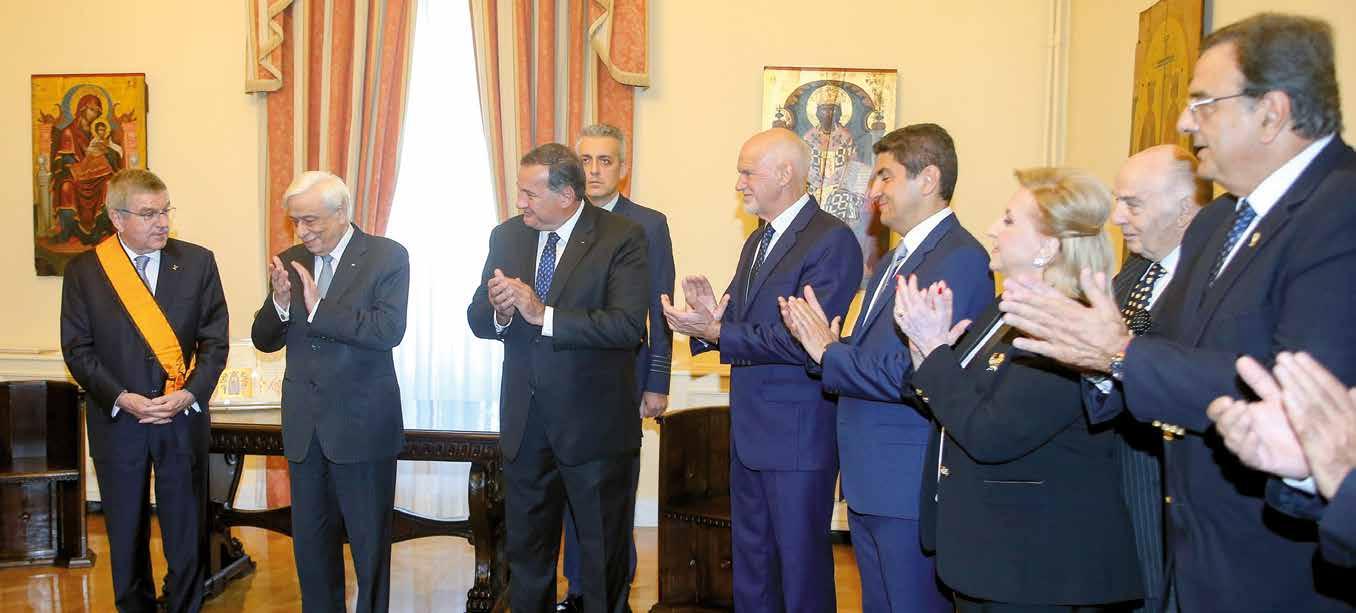
IOC President awarded highest Greek Order
The IOC President, Τhomas Bach, has been honoured with the highest distinction of the Hellenic Republic, the Grand Cross of the Order of the Phoenix, by the President of the Hellenic Republic, Mr Prokopios Pavlopoulos, during a ceremony that took place on the 9th of October 2019 at the Presidential Mansion in Athens, in the presence of the IOA President, Mr Isidoros Kouvelos.
Speaking at the ceremony, Greek President Prokopios Pavlopoulos expressed his appreciation of the IOC President’s “exemplary services in favour of the values and principles of the Olympic spirit and ideals”.
“Your presidency of the International Olympic Committee renders a great service to the whole world and to human beings because you act for the benefit of peace, democracy and civilisation. We Greeks are historical guardians of the ancient traditions of classical Olympism, and we commend your steadfast commitment to the Olympic spirit and the ideals of Olympism. It is a commitment that you demonstrate in everything you do”, he said.
Accepting the award, IOC President Thomas Bach said: “I am particularly touched to receive this distinction knowing that it is an honour that was also bestowed by the Hellenic Republic on my predecessor, the renovator of the Olympic Games, Baron Pierre de Coubertin.
A while back I had the opportunity to participate in a Session of the International Olympic Academy on the Hill of Pnyx, in which you were also present. Delivering a speech in this sacred land – the cradle of Athenian Democracy – facing the Parthenon and the Acropolis, interacting with young people from all over the world and discussing the future of Olympism and the future of

the Values and the Ideals of the Olympic Movement was a moment that I will never forget. It has inspired and moved me and fills me with joy and gratitude for yet another reason. Because I now have the opportunity to share this award with your Excellency.”
The ceremony was attended by members of the Greek Olympic family, headed by Spyros Capralos, IOC Member in Greece and President of the Hellenic Olympic Committee, George Papandreou, former Prime Minister of the Hellenic Republic, and ministers and government officials. The Mayor of Olympia, Georgios Georgiopoulos, was also present during the event.
Le président du CIO reçoit la plus haute distinction grecque
Le président du CIO, Thomas Bach, s’est vu décerner la plus haute distinction grecque, la Grand-Croix de l’Ordre du Phénix, par le président de la République hellénique, Prokopios Pavlopoulos, lors d’une cérémonie qui s’est déroulée le 9 octobre 2019 au Palais présidentiel à Athènes en présence du président de l’AIO, Isidoros Kouvelos.
94 – IOA Journal 16
S’exprimant lors de la cérémonie, le président grec, Prokopios Pavlopoulos, a notamment salué la «contribution exemplaire du président du CIO aux valeurs et principes de l’esprit et de l’idéal olympiques».
«En votre qualité de président du Comité International Olympique, vous rendez des services inestimables à la planète tout entière et à tous les citoyens du monde car vous agissez en faveur de la paix, de la démocratie et de la civilization», a-t-il déclaré.
Et d’ajouter: «Nous, peuple grec, sommes les gardiens historiques des anciennes traditions de l’Olympisme et nous saluons votre engagement indéfectible en faveur de l’esprit et de l’idéal olympiques. C’est un engagement dont vous faites preuve dans tout ce que vous entreprenez.»
En acceptant la Grand-Croix, le président du CIO, Thomas Bach, a confié: «Cette distinction me touche d’autant plus que mon prédécesseur, le rénovateur des Jeux Olympiques, le baron Pierre de Coubertin, a également reçu cet honneur de la République hellénique.
J’ai eu l’occasion de participer il y a quelque temps, sur la colline de la Pnyx, à une session de l’Académie Internationale Olympique et de m’y exprimer en votre présence. Parler en ce lieu sacré, au berceau de la démocratie athénienne, le regard posé sur l’Acropole et le Parthénon, pouvoir converser avec des jeunes du monde entier sur l’avenir de l’Olympisme et le futur des Valeurs et de l’Idéal du Mouvement olympique, cela a été pour moi un moment que je ne saurais oublier. Je dirais que cette expérience m’a inspiré et emporté tout entier. C’est donc empli de joie et de gratitude que je suis ici, pour une autre raison. Car j’ai la chance de partager cette distinction avec votre Excellence.»
La cérémonie s’est déroulée en présence de membres de la famille olympique grecque placés sous la conduite de Spyros Capralos, membre du CIO en Grèce et président du Comité Olympique Hellénique. Étaient également présents lors de cet événement George Papandreou, ancien Premier ministre de la République hellénique, des ministres et responsables gouvernementaux, ainsi que le maire d’Ancienne Olympie, Georgios Georgiopoulos.
The IOA stand at the Tatoi Club
Opened at the Tatoi Club as part of the Davis Cup event, the IOA stand was visited by Prime Minister, Mr Kyriakos Mitsotakis, who was welcomed and guided around by IOA President, Isidoros Kouvelos.
The stand was also visited by Greek tennis champion Stefanos Tsitsipas, as well as by Japan's Ambassador to Greece, Mr Yasuhiro Shimizu, both of whom were impressed by the interactive and educational programme "Discovering the Olympic Movement and its Values". This has been recently upgraded with the help of M/Maritime and aims to provide information to those interested in the history and evolution of the Olympic Movement.
Le kiosque de l’AIO au Tatoï
Club
Le kiosque de l’AIO, ouvert au Tatoï Club dans le cadre de la Coupe Davis, a été visité par le premier ministre, M. Kyriakos Mitsotakis, qui fut accueilli et guidé par le président de l’AIO, Isidoros Kouvelos.
Le kiosque a été également visité par le champion de tennis grec Stefanos Tsitsipas, ainsi que par l’ambassadeur du Japon en Grèce, M. Yasuhiro Shimizu, qui furent impressionnés par le programme interactif et éducatif “Discovering the Olympic Movement and its Values”. Récemment revalorisé, avec le concours de M/Maritime, ce jeu vise à donner des informations aux intéressés à l’histoire et à l’évolution du Mouvement olympique.

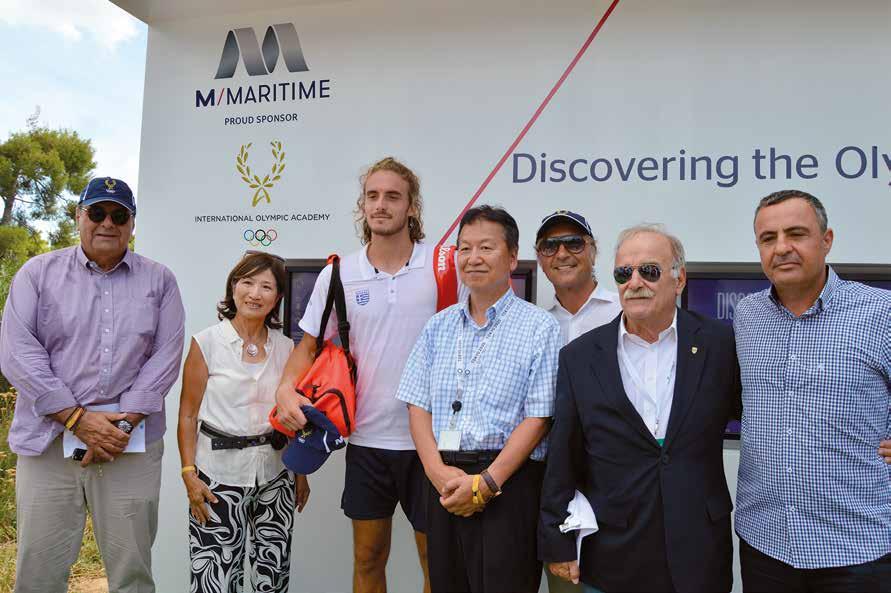
IOA Journal 16 – 95
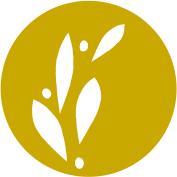
Ephoria of the International Olympic Academy
PRESIDENT
Isidoros KOUVELOS
HOC Member
VICE-PRESIDENT
Michael FYSENTZIDIS
HOC Member
MEMBERS
Spyros CAPRALOS
HOC President – ex ofcio member
Emmanuel KOLYMPADIS
HOC Secretary General – ex ofcio member
Emmanuel KATSIADAKIS
HOC Member
Georgios KARABETSOS
HOC Member
Athanasios KANELLOPOULOS
HOC Member
Georgios GEORGIOPOULOS
Mayor, Ancient Olympia
Gordon TANG
HONORARY PRESIDENT
Jacques ROGGE
IOC Honorary President
HONORARY DEAN
Konstantinos GEORGIADIS Professor, University of Peloponnese
HONORARY MEMBERS
Pere MIRÓ
Deputy Director General for Relations with the Olympic Movement, IOC
Makis MATSAS
Éphorie de l’Académie Internationale Olympique
PRÉSIDENT
Isidoros KOUVELOS
Membre du COH
VICE-PRÉSIDENT
Michael FYSENTZIDIS
Membre du COH
MEMBRES
Spyros CAPRALOS
Président du COH – membre de droit
Emmanuel KOLYMPADIS
Secrétaire général du COH – membre de droit
Emmanuel KATSIADAKIS
Membre du COH
Georgios KARABETSOS
Membre du COH
Athanasios KANELLOPOULOS Membre du COH
Georgios GEORGIOPOULOS Maire, Ancienne Olympie
Gordon TANG
PRÉSIDENT HONORAIRE
Jacques ROGGE
Président honoraire du CIO
DOYEN HONORAIRE
Konstantinos GEORGIADIS
Professeur, Université du Péloponnèse
MEMBRES HONORAIRES
Pere MIRÓ
Directeur général adjoint pour les relations avec le Mouvement olympique, CIO
Makis MATSAS
96 – IOA Journal 16

























































 Prof. Christina Koulouri (GRE)
Professor in Modern and Contemporary History, Head of the Department of Political Science and History, Panteion University of Social and Political Sciences
Prof. Christina Koulouri (GRE)
Professor in Modern and Contemporary History, Head of the Department of Political Science and History, Panteion University of Social and Political Sciences

 George Papandreou (GRE)
George Papandreou (GRE)























































































